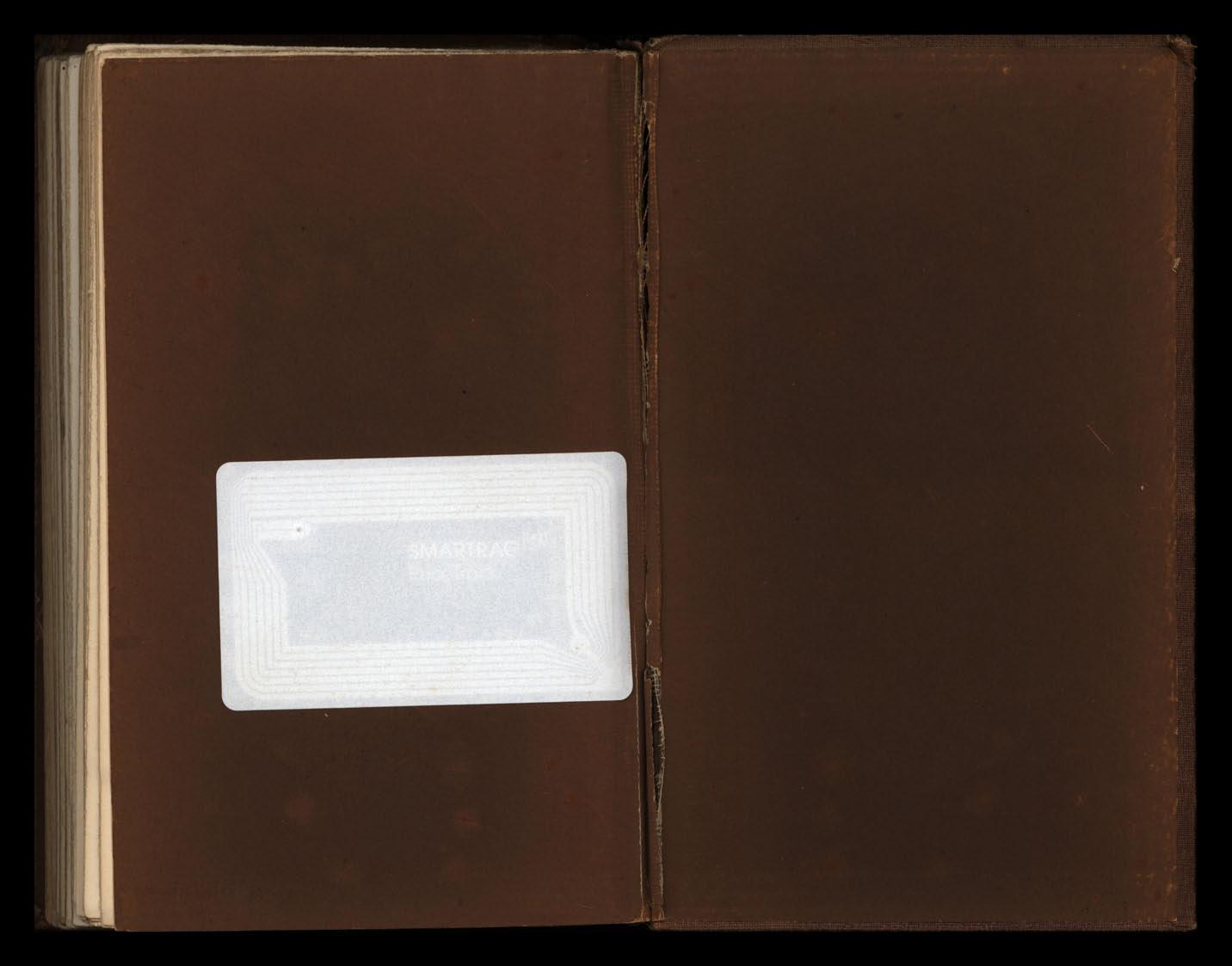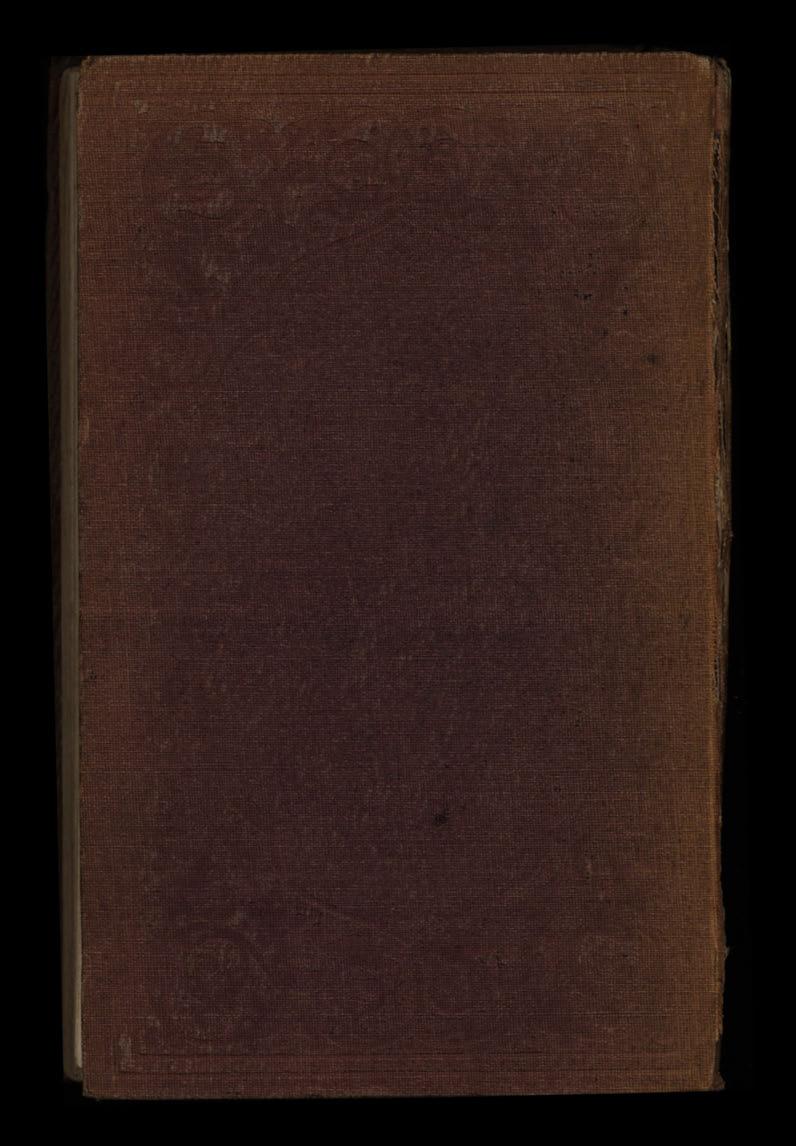








A COLLECTION, IN CLUDING A GR.EAT NUMBER
EDITED BY GIRALDUS.
Std lito _ bo= tr,. di qwrce OIIIbrou, Dot:. ogrwr par cIae Fi/JmteIoa pia!f'Ul; Ch' iA m=o m:ea 1Dl prattl am V1t4!IJ7Il;., E qvinci • qvindi un ,olitariD """,te. ABJOSro, Orl Fur. x. U3

LONDON : BELL AND DALDY, 186, FLEET STREET. 1860.

THE intentio n of this book simply is to delight the lover of poetry. Specimens critical and chronological have their own worth; we desire to present a jewel, aptly arr anged of many stones, various in colour and value, but all precious. Nothing personal or circumstantial, nothing below a pure and loving loyalty to the Muse, has been wittingly suffered to interfere betwixt the idea and its realization. Much, it is true, is perforce omitted; but should the brotherly reader and the judicious critic haply find the little volume, per se, a good th ing, they will scarcely complain that it does but its part. Do we curse the cup of refreshing hand ed us from the well because it is not twic e as largewhen the well its elf, too, remains? Thos e who best know of such things will the most r eadily see that a collection in any sense complete or exhaustive has not been thought of h ere, but an arrangement of a limited numb er of short poems, with some eye to grouping and general effect, and to the end (as said) of delight. But of delight-noble and fruitful. Th e grand word" Po et ry" has its mean associations, -as " organ" may suggest a solemn cathedral, or a Savoyard and monkey. True Po etry, how-
VI PREFACE.
ever, is not, as some suppo e, a kind of verbal confectionery, with cramp fantastic laws that impose great labour to little purpose.
If one has anything to express in words, why go thus roundabout? asks our sternly prosaic friend. The relations of the human mind with the world are not so simple as he takes for granted. Men are not only intellectual and moral, but emotional and imaginative. Sorrow and joy are very real, yet often very illogical; and so also, and often er, are those faint rapid shadows and gleams that pass continually over the mind, composing the multiplex hue of life The moods of the sagest, are they never submissive to the wind in a keyhole, the crackling of the flame, a vernal odour, or the casual brightness or gloom upon a landscape? At the least touch of any sense gates to Infinity are ready to fly open.
Such is man's nature; and since he further finds himself urged to regulate what belongs to him, without and within, and mutually to control the one by the other, so, as he gains industrial, scientific, religious development, he also becomes an Artist-in picture, in sculpture, in architecture, in music, in verse .
Language has music in it; from this Poetry (Yerse-Poetry is always meant) derives its form and quality. It is the most melodious arrangement of language . The prop<Jrtionality necessary for this end excites mystically a desire for proportionality in all other respects, reaching inward to the very spirit of the thought which is

PREFACE. vii
to be expressed. The stimulated and thoroughly alert Imagination requires its pure insight to be shapen forth in the most perfect possible diction-judging all by a fine rapid-glancing logic, peculiar, airy, genuine. In short, Musical Proportionality is the life-principle of Poetry, and the product Poetic Beauty. As for the use of Poetry-I will tell you this accurately, when you can put me Love into a crucible, and Faith into a balance.
Such an attempt being too difficult, let us agree to abide by matter-of-fact. And matterof-fact shows us that Yerse-Poetry (daughter of Language and Music, born at a time of the world whereto History stretches not backward) has been cherished and beloved amongst all the nations, ancient and modern, barbarous and civilized. Babes love the sound of. it, youth passionately delights in it, age remembers it gladly; it helps memory, purifies and steadies language, guards elocution; it gives wings to thought, touches hidden veri ties, can soothe grief, heighten joy, beautify the common world, and blend with the divinest aspirations.
Poetry and Science (rank them as you please) are equally founded on the nature of man in mystic relation with the Universe.
How Poetry manages to evince itself in material form would be hard or impossible to e}.:plain; even if possible, still doubtless the secrets ought to be kept, like those of love. The profane, when they suppose themselves to
comprehend either, have but lost the degree of sympathetic knowledge-of instinctive and genuine feeling, which they inherited as men. lt is difficult ind eed to become a critic and remain a man . Fitly, therefore, to examine even the shortest genuine Poem is th e rarest success of literary judgment. Perhaps it is not venturing too far to say that a true Poem is always conceived by a sort of happy chancedescending, as it were, out of the sky; but, as a finished whole, is the fruit of a most actively attentive condition (yetwith ease-not strained) of the rarest natural endowment.
Every Poet is not a great one; but, whatever his rank in the guild, he is a maker, creator in little, and his successful work fine and true of its kind, possessing (however simple and modest) a secure, determinate, dignified aspect, standing firm with good hold upon the ground, and proving its direct right to exist as much as a healthy human being when he looks into your eye. Every true Poet is such by the same peculiar and inimitable fire that so splendidly beams from the greatest; and is born capable to discover the art of poetry, had it been thitherto unknown. Some poems have soul in a bad body, and are by nature soon for death; many things under the name are only puppets, dolls, mere wax and wood,-finer and prettier, sometimes, and, for a little, more admired than what is alive.
Our Book hopes to please best the most unsectarian worshipper of Song,-one who can equally enjoy the floating charm of" Claribel,"
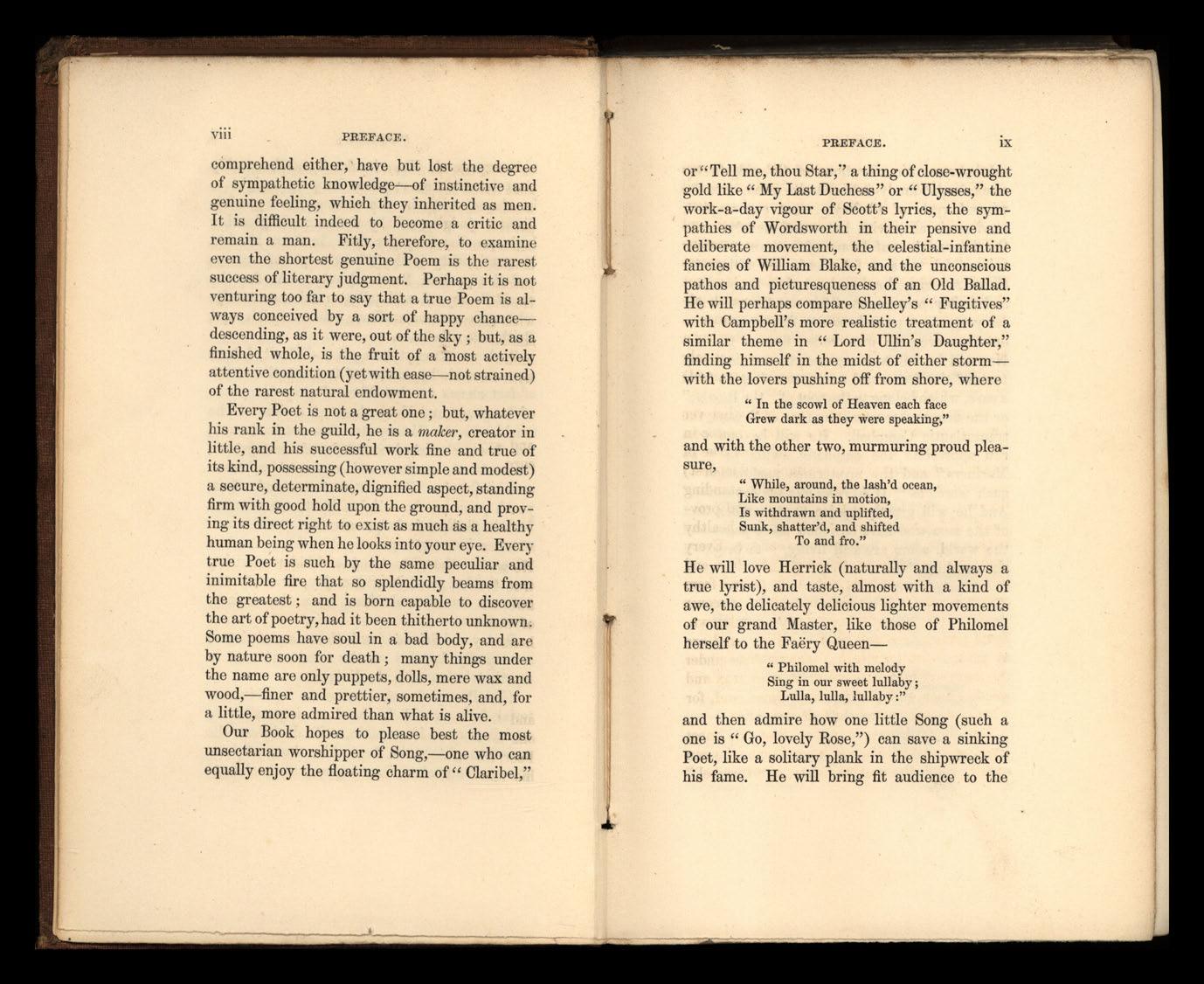
PREFACE. lX
or "Tell me, thou Star;' a thing of close-wrought gold like" My Last Duchess" or "Ulysses," the work-a-day vigour of Scott's lyrics, the sympathies of Wordsworth in their pensive and deliberate movement, the celestial - infantine fancies of William Blake, and the unconscious pathos and picturesqueness of an Old Ballad. He will perhaps compare Shelley's" Fugitives" with Campbell's more realistic treatment of a similar theme in "Lord Ullin's Daughter," finding himself in the midst of either stormwith the lovers pushing off from shore, where
" In the scowl of Heaven each face Grew dark as they were speaking," and with the other two, murmuring proud pleasure,
" While, around, the lash'd ocean, Like mountains in motion, Is withdrawn and upHfted, Sunk, shatter'd, and shifted To and fro."
He will love Herrick (naturally and always a true lyrist), and taste, almost with a kind of awe, the delicately delicious lighter movements of our grand Master, those of Philomel herself to the Faery Queen-
" Philomel with melody Sing in our sweet lullaby; Lulla, lulla, lullaby:" and then admire how one little Song (such a one is " Go, lovely Rose,") can save a sinking Poet, like a solitary plank in the shipwreck of his fame. He will bring fit audience to the
x PREFACE.
subtle, romantic vibrations of Coleridge's too often despondingly-intro pective mind, or to the ,vinged rush of helley' most eager spirit, leaving air alive with billows of melody, or to the rich and dreamful tones of that even younger voice which too soon fell silent . He will gladly claim America for blood-relation in intellect and poetry, on account of her one Great Writer ( as yet), who e prose is so royally precious as to outvalue even his own verse, fine as that i . Nor will he fail to recognize the sad fantastic tune of the few weird note , sounding as from a cave, which belong to the poet of" the Raven;" or the firm and trustworthy tone of Bryant, the transatlantic Campbell. He will be one who can appreciate the emphatic swing of " Ye Mariners," and the mysterious modulation in such words as " Wild 1"Oses and ivy Se71Jentine ." And he will greatly rejoice to remember that of the men who have enriched these pages and the world, some are still living, " to brighten the sunshine."

S ONNET. To the Nightingale Milton Wake, Lady • • • Joanna Bail/ie
Inscription for a Fountain on a Heath
Fair Ines Hood
Sic Vita
A Sonnet upon nnets Woro.worth
Jock 0' Hazeldean Scolt
The Passionate Shepheard to his Love Chr. Marlow••
To-day T. Carlylc
The Seven Sisters Wordswortli
Song. From" The Miller's Danghter" Tennyson
Antumn. A Dirge Slielley
The Amulet Emerson
The Character of a Happy Life Sir H. Wolton
Want of leep JYordmxJrth
Abou Ben Adbem and the Angel Leigh Hunt
Lucy Ashton's Song • Bcatt
A Dream W Allingham
Ode to the Cuckoo John Logan
Coronach From "The Lady of the Lake" • Scott
It is not beautie I demand
The Question Shelley
Barthram's Dirge
The '''orld's Wanderers Shelley
My Last Duchess R. Browning
Song. The Season for Wooiug W C.Bryant
Sonnet. Composed by Grasmere Lake. Woro.worth
Hohenliuden Campbell.
Sonnet. From the Portuguese E. B. Browning
Clerk Saunders . Old Ballad
Xll CONTENTS.
Claribel. A Melody. France seen from the Coast of England
The Sower's Song ' Song. Why so pale and wan I remember, I remember Sonnet. The J dIe Voyager
The Lover of Music to his PianoForte
The Fairies. A Child's Song
The LasL Day of Autumn Ballad. Sigh on, sad hearL To Dianeme
The Bells
To Mary in Heaven
The N orLhern Star
To Lucasta, going to the Warres
A Farewell
Sonnet. Twilight among Mountains
Introduction to " Songs of Innocence"
Song. The Owl
Sonnet. To Mr. Lawrence
The Dream of Eugene Aram To the Virgins, to make much of Time
Protus
Song. J wander'd by the brook-side The Nightingale
The Haunted Palace .
Evening Song of the Priest of Pan
The Fugitives
To a Departed Friend
Song. From" As you like it"
Sonnet. On first looking into Chapman's Homer
The Apology
Tibbie
Choral Song of JIlyrian Peasants
The Raven Flowers
Fable
As I lay a-thinking , A Man's Requirements
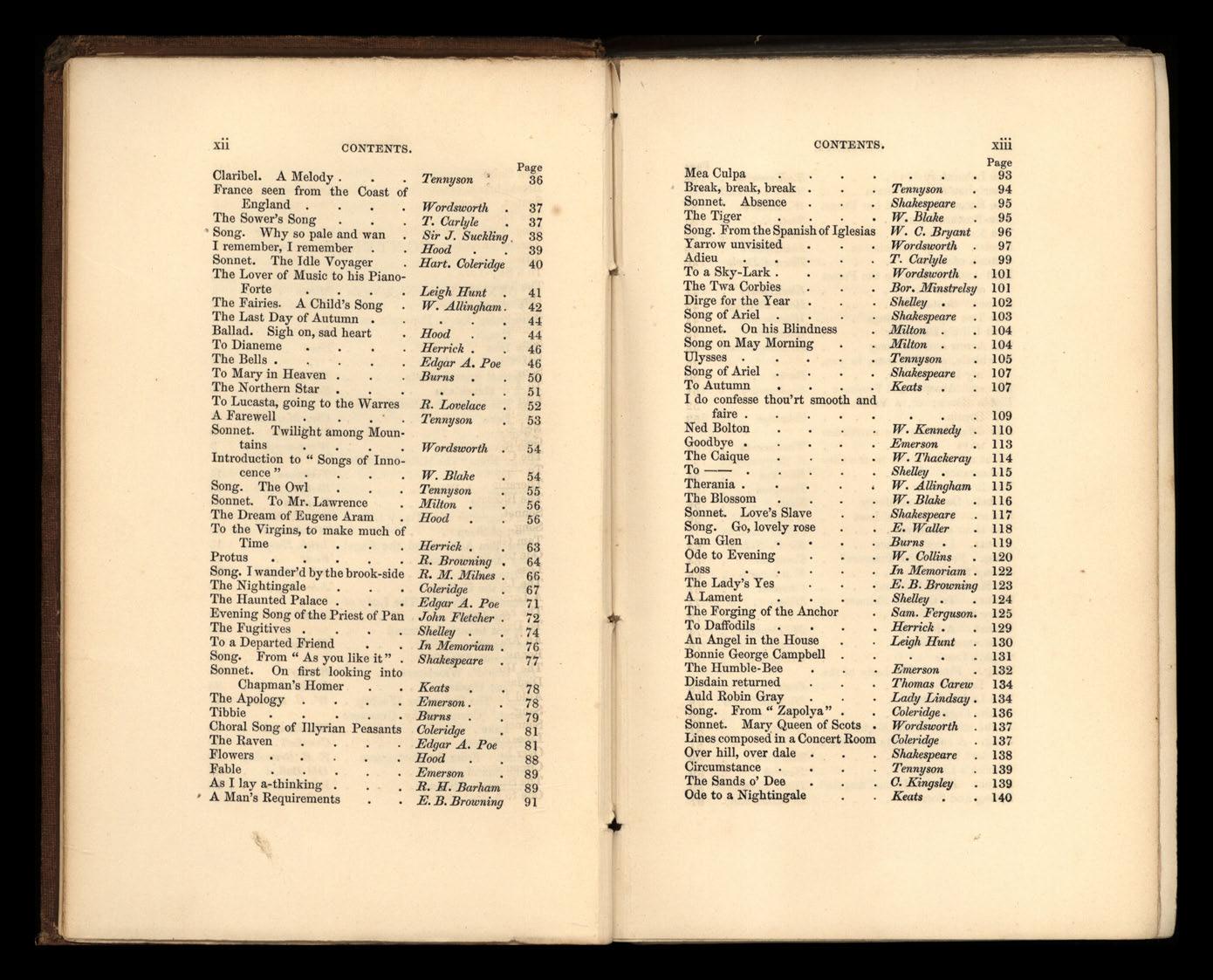
Page
Ten.nyson ' 36
Wordsworth 37
T Carlyle 37
Sir J. Suckling 38
Hood 39
Hart. Coleridge 40
Leigh Hunt 41
W. Allingham. 42 44
Hood 44
Herrick 46
Edgar A. Poe 46
Burns 50 51
R. Lovelace 52
Tennyson 53
Wordsworth 54
W. Blake 54
Ten.nyson 55
Milton 56
Hood 56
Herrick 63
R. Browning 64
R. M. Milnes. 66 Coleridge 67
Edgar A. Poe 71
John Fletcher. 72
Shelley 74 In Memoriam. 76
Shakespeare 77
Keats 78
Emerson. 78
Burns 79
Coleridge 81
Edgar A. Poe 81
Hood 88
Emerson 89
R. H. Barham 89
E. B. Browning 91
CONTENTS.
Mea Culpa
Break, break, break Sonnet. Absence
The Tiger
Song. From the Spanish of Iglesias Yarrow unvisited Adieu
To a Sky-Lark. The Twa Corbies Dirge for the Year Song of Ariel. . Sonnet. On his Blindness
Song on May Morning IDysses
Song of Ariel To Autumn I do confesse thou'rt smooth and faire . Ned Bolton
Goodbye The Caique To--
Therania •
The Blossom Sonnet. Love's Slave Song . Go, lovely rose Tarn Glen Ode to Evening Loss
The Lady's Yes A Lament
The Forging of the Anchor To Daffodils
An Angel in the House Bonuie George CampbeIl
The Humble-Bee Disdain returned Auld Robin Gray Song From" Zapolya" Sonnet. Mary Queen of Scots Lines composed in a Concert Room
Over hill, over dale Circumstance
The Sands 0' Dee Ode to a Nightingale
Tennyson
Shakespeare W. Blake
W . C. Bryant
Wordsworth T. Carlyle
Wordsworth
Bor. Minstrelsy
Shelley
Shakespeare
Milton
Milton
Tennyson
Shakespeare Keats
W. Ke1lnedy
Emerson W Thackeray
Shelley W. Allingham
W. Blake
Shakespeare E. Wailer
Burns
W_ Collins
In Me'InOriam • E. B. Browning
Shelley
Sam. Ferguson. Herrick • Leigh Hunt
Emerson
Thomas Carew
Lady Lindsay • Coleridge. W01'dsworth Cole1idge
Shakespeare
Keal.
The Laboratory R. Browning 143
Inscription for a Fountain Bar,.y Cornwall 146
The Ruose that deck'd ber Breast W. Barnes 146
Fitz-Eustace's Song Beott 148
The Exile Hood 149
Love's Consolation
O'Brien of Arra
Lord Amiens' Song, in tbe Forest

150
Davis 151
of Arden Shakespeare 152
Sonnet. September Hart. Coleridge 153
The Two April Mornings Wordsworth 154
Ullin's Daughter
1!'i6
The Arrow and the Song H. Longfellow 158
o whistle, and I'll come to you,
my lad Burns 158
Sonnet. Absence and Presence . Shakespeare 159
Kubla Khan; or, a Vision in a
Dream Coleridge 160
She dwelt among the untrodden
ways Wordsworth 162
XVi CONTENTS.
Now the hungry lion roars. What Pleasure have great Princes Fair Helen of Kirkconnell . Down on the Shore
The Jovial Beggar Love for no less than Love
The Soldier's Dream . A Lyke-Wake Dirge
Where he would have his Verses read Young Lochinvar
When the World is burning May and Death
Lines to an Indian Air . The Death of the Old Year • Lyrics for Legacies
Notes • Index of First Lilies
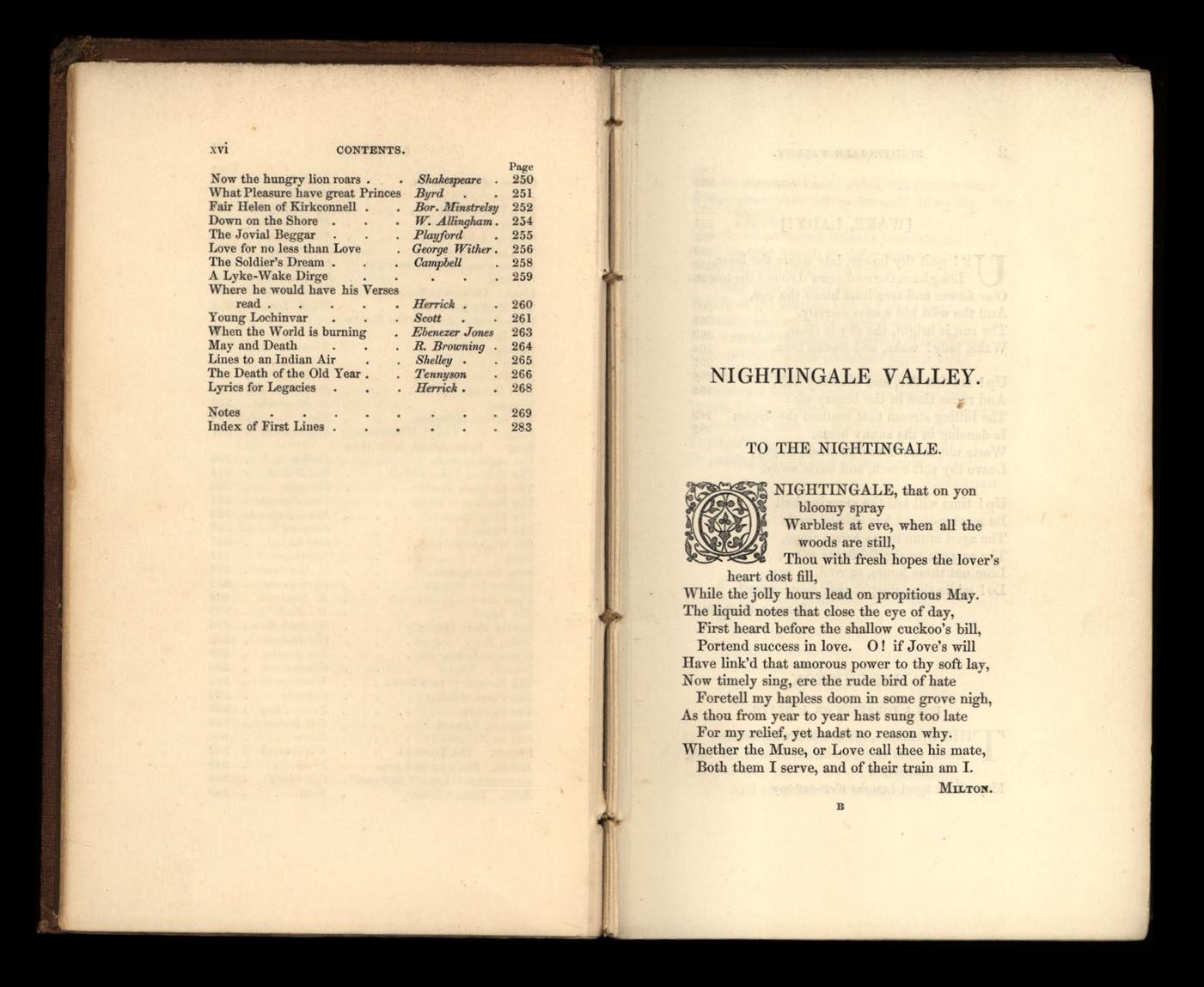
Page
Shakupeare 250
Byrd 251
Bor. Minstrei'1l 252
Wo A.Uingham. 254
Playford 255
George Wither. 256 Campbell 258 259
Herrick • 260 Scott 261
Ehenezer June. 263 R. Browning 264
Shelley . 265
TennYIOR 266 Herrick. 26 269 283
TO THE NIGHTINGALE.
NIGHTINGALE, that on yon
Ij bloomy spray
Warblest at eve, when all the woods are still,
Thou with fresh hopes the lover's heart dost fill,
While the jolly hours lead on propitious May.
The liquid notes that clo e the eye of day, First heard before the shallow cuckoo's bill, Portend success in love. O! if Jove' s will
Have link'd that amorous power to thy soft lay, Now timely sing, ere the rude bird of hate
Foretell my hapless doom in some grove nigh, As thou from year to year hast sung too late
For my relief, yet hadst no reason why.
Whether the Muse, or Love call thee his mate, Both them I serve, and of their train am I.
Mu.TOl'.
B
2

NIGHTINGALE VALLEY. [WAKE, LADY!]
UP! quit thy bower, late wears the hour,
Long have the rooks caw'd round the tower; O'er flower and tree loud hums the bee, And the wild kid sports merrily. The sun is bright, the sky is clear, Wake, lady! wake, and hasten here.
Up! maiden fair, and bind thy hair, And rouse thee in the breezy air:
The lulling stream that soothed thy dream
Is dancing in the sunny beam.
Waste not these hour s, so fresh, so gay , Leave thy soft couch, and haste away.
Up! time will tell the morning bell Its service-sound has chimed well : The aged crone keeps house alone, The reapers to the fields are gone; Lose not these hours, so cool, so gay, Lo! while thou sleep'st they haste away!
JOANNA BAILLIE.
FOR A FOUNTAIN ON A HEATH.
THIS Sycamore, oft musical with bees,-
Such tents the Patriarchs loved! 0 long unharm'd
May all its aged boughs o'er-canopy
NIGHTINGALE VALLEY. 3
The small round basin, which this jutting stone
Keeps pure from falling leaves I Long may the Spring,
Quietly as a sleeping infant's breath,
Send up cold waters to the traveller
With soft and even pulse ! Nor ever cease
Yon tiny cone of sand its soundless dance,
Which at the bottom, like a Fairy'S page,
As merry and no taller, dances still,
Nor wrinkles the smooth surface of the Fount.
Here twilight is and coolness: here is moss,
A soft seat, and a deep and ample shade.
Thou mayst toil far and find no second tree.
Drink, Pilgrim, here; here, rest I and if thy h eart
B e innocent, here too shalt thou refresh
Thy spirit, listening to some gentle so und,
Or passing gale or hum of murmuring b ees !
COLERIDGB
OSAW ye not fair Ines ?
She's gone into the West, To dazzle when the sun is down, And rob the world of rest: She took our daylight with her, The smiles that we love best, With morning blushes on her cheek, .And pearls upon her breast.
o turn again, fair Ines, Before the fall of night, For fear the moon should shine alone, .And stars unrivall'd bright;
4

NIGHTINGALE VALLEY.
And ble sed will the lover be That walks beneath their light, And breathes the love against thy cheek I dare not even write!
Would I had been, fair Ines, That gallant cavalier, Who rode so gaily by thy side, And whisper'd thee so near ! Were there no bonny dames at home, Or no true lovers here, That he should cross the seas to win The dearest of the dear?
I saw thee, lovely Ines, Descend alon g the shore 'Vith bands of noble gentlemen, And banners waved before; And gentle youth and maidens gay, And snowy plumes they wore ;It would have been a beauteous dream,If it had been no more!
Alas, alas, fair Ines, She went away with song, With music waiting on her steps, And shoutings of the throng; But some were sad and felt no mirth, But only music's wrong, In sounds that ang farewell, farewell, To her you've loved so long.
Farewell, farewell, fair Ines, That ve el never bore So fair a lady on its deck, Nor danced so light before,-
NIGHTINGALE VALLEY.
Alas, for pleasure on the sea, And sorrow on the shore!
The smile that blest one lover's heart Has broken many more! HOOD.
SIC VITA.
LIKE to the falling of a star, Or as the llighte of eagles are, Or like the fresh Spring's gaudie hue, Or silver drops of morning dewe, Or like a wind that chafes the llood, Or bubbles which on water stood,E'en such is man-whose borrow'd light Is straight call'd in and paid to-night. The wind blows out, the bubble die, The Spring entomb'd in Autumn lies, The dewe's dried up, the star is shot, The llight is past-=:.-and man forgot.
[A
NUNS fret not at their convent's narrow room; And hermits are contented with their cells; And students with their pensive citadels; Maids at the wheel, the weaver at his loom,
Sit blithe and happy; bees that soar for bloom, High as the highest Peak of Furnes -feUs, Will murmur by the hour in foxglove bells :
6
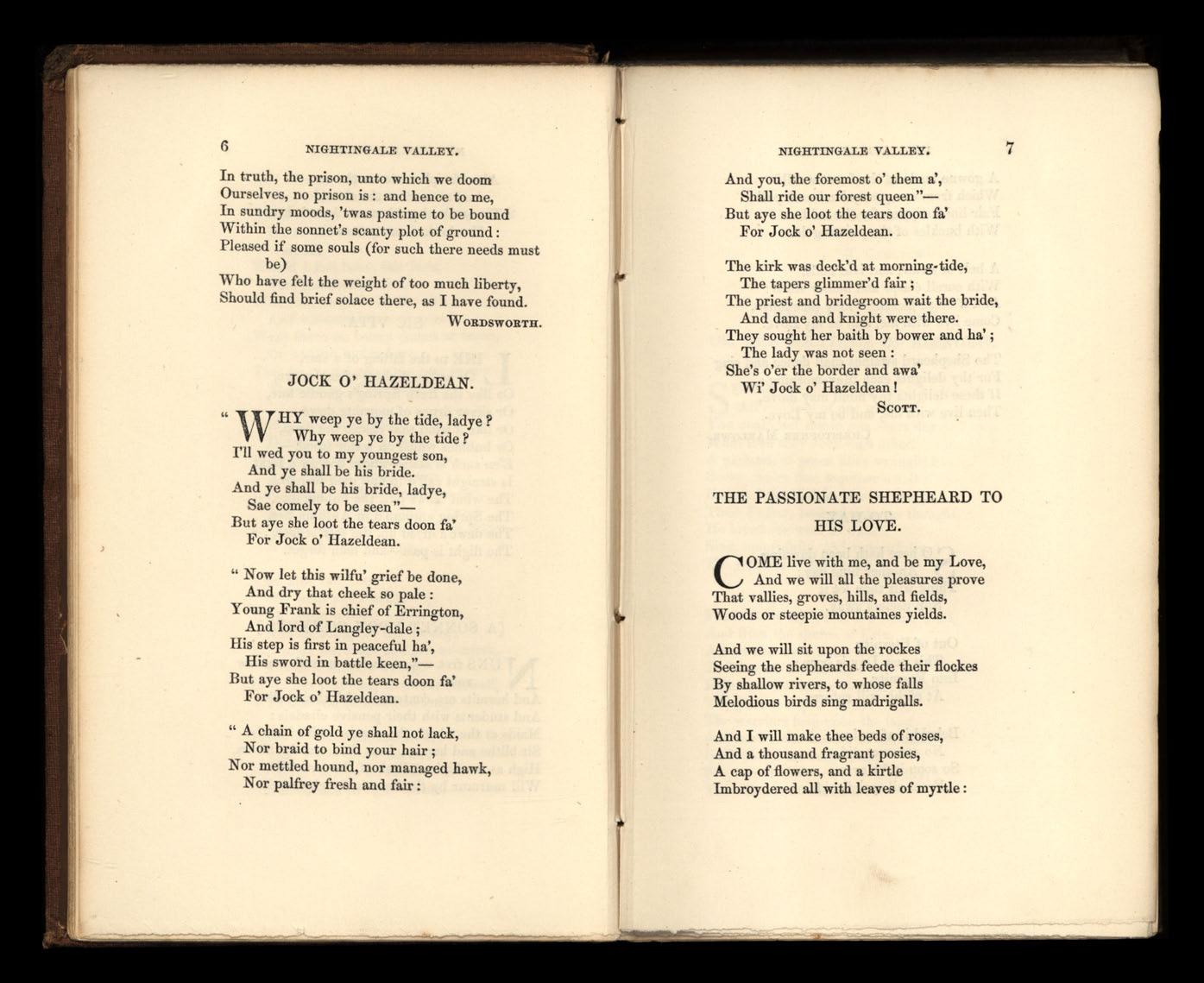
NIGHTINGALE VALLEY.
In truth, the prison, unto which we doom Ourselves, no prison is: and hence to me, In sundry moods, 'twas pastime to be bound Within the sonnet's scanty plot of ground: Pleased if some souls (for such there needs must be)
Who have felt the weight of too much liberty, Should find brief solace there, as I have found .
W ORDSWORTH
" l I J HY weep ye by the tide, ladye ? VV Why weep ye by the tide? I'll wed you to my youngest son, And ye shall be his bride. And ye shall be his bride, ladye, Sae comely to be seen"But aye she loot the tears doon fa' For Jock 0' Haz eldean.
" Now let this wilfu' grief be done, And dry that cheek so pale: Young Frank is chief of Errington, And lord of Langley-dale ; His step is first in peaceful ha', His sword in battle keen,"But aye she loot the tears doon fa' For Jock 0' Hazeldean.
" A chain of gold ye shall not lack, Nor braid to bind your hair; Nor mettled hound, nor managed hawk, Nor palfrey fresh and fair :
NIGHTINGALE VALLEY.
And you, the foremost 0' them a', Shall ride our forest queen"But aye she loot the tears doon fa' For Jock 0' Hazeldean.
The kirk was deck'd at morning-tide, The tapers glimmer'd fair ; The priest and bridegroom wait the bride, And dame and knight were there. They sought her baith by bower and ha' ; The lady was not seen: She's o'er the border and awa' Wi' Jock 0' Hazeldean!
Se OTT.
THE PASSIONATE SHEPHEARD TO illS LOVE .
COME live with me, and be my Love, And we will all the pleasures prove That vallies, groves, hills, and fields, Woods or steepie mountaines yields.
And we will sit upon the rockes Seeing the shepheards feede their flockes By shallow rivers, to whose falls Melodious birds sing madrigalls.
And I will make thee beds of roses, And a thousand fragrant posies, A cap of flowers, and a kirtle Imbroydered all with leaves of myrtle:
8

NIGHTINGALE VALLEY.
A gowne made of the finest wooll
Which from our pretty lambs we pull Fair linM slippers for the cold, . With buckles of the purest gold:
A belt of straw, and ivie buds, With corall clasps and amber studs: And if these pleasures may thee move, Come live with me, and be my Love.
The Shepheard swaines shall dance and sing For thy delights each May-morning: If these delights thy mind may move, Then live with me, and be my Love.
CHRISTOPHER MARLOWE.
TO-DAY.
SO here hath been dawning
Another blue day:
Think wilt thou let it Slip useless away.
Out of Eternity
This new Day is born j Into Eternity, At night, will return.
Behold it aforetime
No eye ever did j
So soon it for ever
From all eyes is hid.
NIGHTINGALE VALLEY.
Here hath been dawning
Another blue Day:
Think wilt thou let it Slip useless away T. CARLYLE.
THE SEVEN SISTERS j
OR, THE SOLITUDE OF BINNORIE.
I.
daughters had Lord Archibald, All children of one mother: .
You could not say in one short day What love they bore each other.
A garland, of seven lilies wrought!
Seven sisters that together dwell
But he, bold Knight as ever fought, Their Father, took of them no thought, He loved the wars so well.
Sing, mournfully, oh! mournfully, The solitude of Binnorie !
II.
Fresh blows the wind, a western wind,
And from the shores of Erin,
Across the wave a Rover brave
To Binnorie is steering:
Right onward to the Scottish strand
The gallant ship is borne j
The warriors leap upon t.he land, And hark! the Leader of the band
Hath blown his bugle horn.
Sing, mournfully, oh! mournfully,
The solitude of Binnorie !
NIGHTINGALE VALLEY.
lli.
Beside a grotto of their own, With boughs above them closing, The seven are laid, and in the shade They lie like fawns reposing. But now, upstarting with affright At noise of man and steed, Away they fly to left, to rightOf your fair household, Father-knight, Methinks you take small heed!
Sing, mournfully, oh! mournfully, The solitude of Binnorie I
IV.
Away t.he seven fair Campbells fly, And, over hill and hollow, With menace proud, and insult loud, The youthful Rovers follow.
Cried they, U Your Father loves to roam:
Enough for him to find The empty house when he comes home For us your yellow ringlets comb, For us be fair and kind!"
Sing, mournfully, oh! mournfully, The solitude of Binnorie I
V.
Some close behind, some side by side, Like clouds in stormy weather, They run, and cry, " Nay, let us die, And let us die together."
A lake was near j the shore was steep There never foot had been; They ran, and with a desperate leap Together plunged into the deep, Nor ever more were seen.
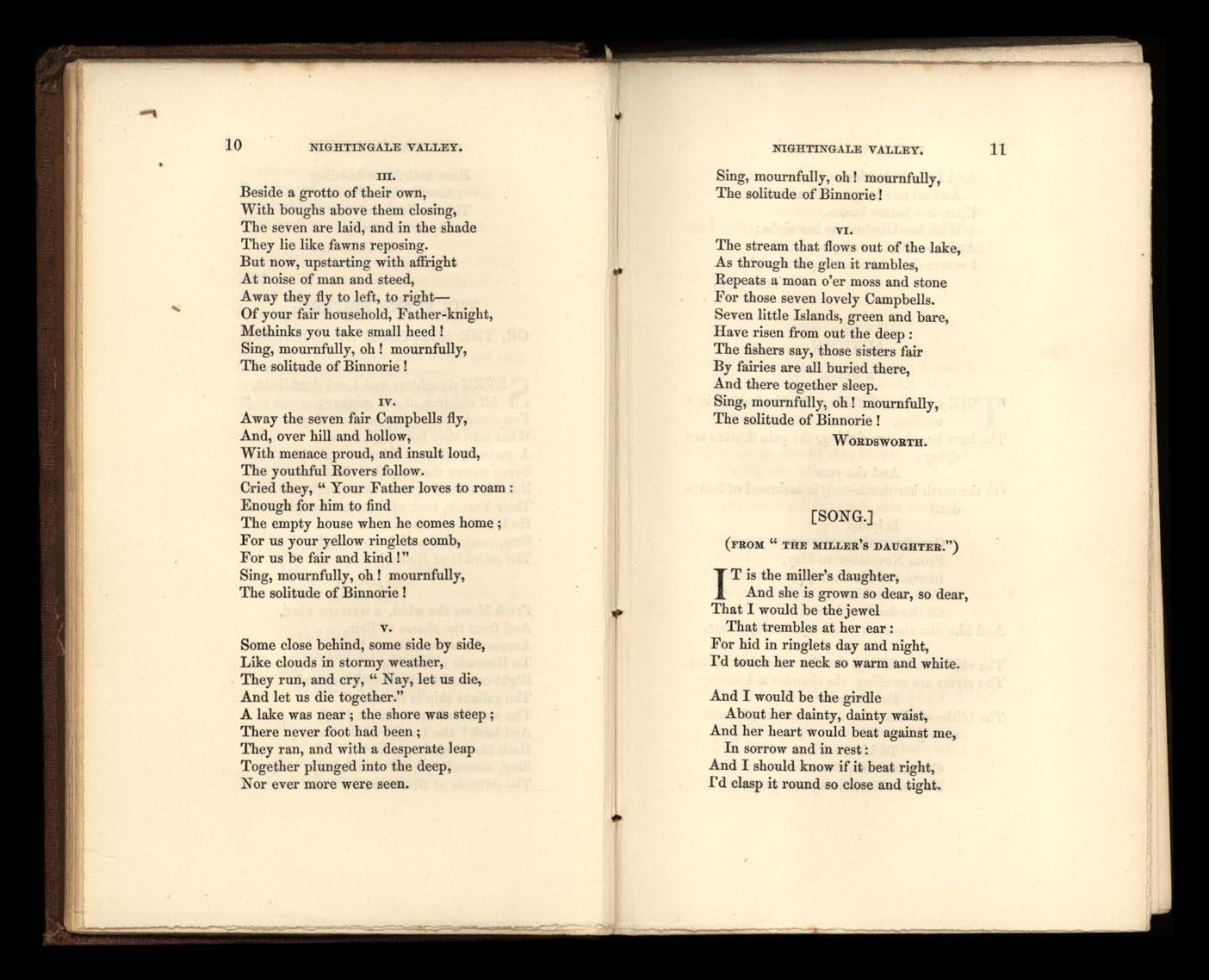
NIGHTINGALE VALLEY.
Sing, mournfully, oh! mournfully, The solitude of Binnorie !
VI.
The stream that flows out of the lake, As through the glen it rambles, Repeats a moan o'er moss and stone
For those seven lovely Campbells. Seven little Islands, green and bare, Have risen from out the deep:
The fishers say, those sisters fair By fairies are all buried there, And there together sleep.
Sing, mournfully, oh! mournfully, The solitude of Binnorie ! W ORDSWORTH.
[SONG.]
(FROM" THE MILLER'S DAUGHTER.")
IT is the miller's daughter, And she is grown so dear, so dear, That I would be the jewel That trembles at her ear: For hid in ringlets day and night, I'd touch her neck so warm and white.
And I would be the girdle
About her dainty, dainty waist, And her heart would beat against me, In sorrow and in rest: And I should know if it beat right, I'd clasp it round so close and tight.
12
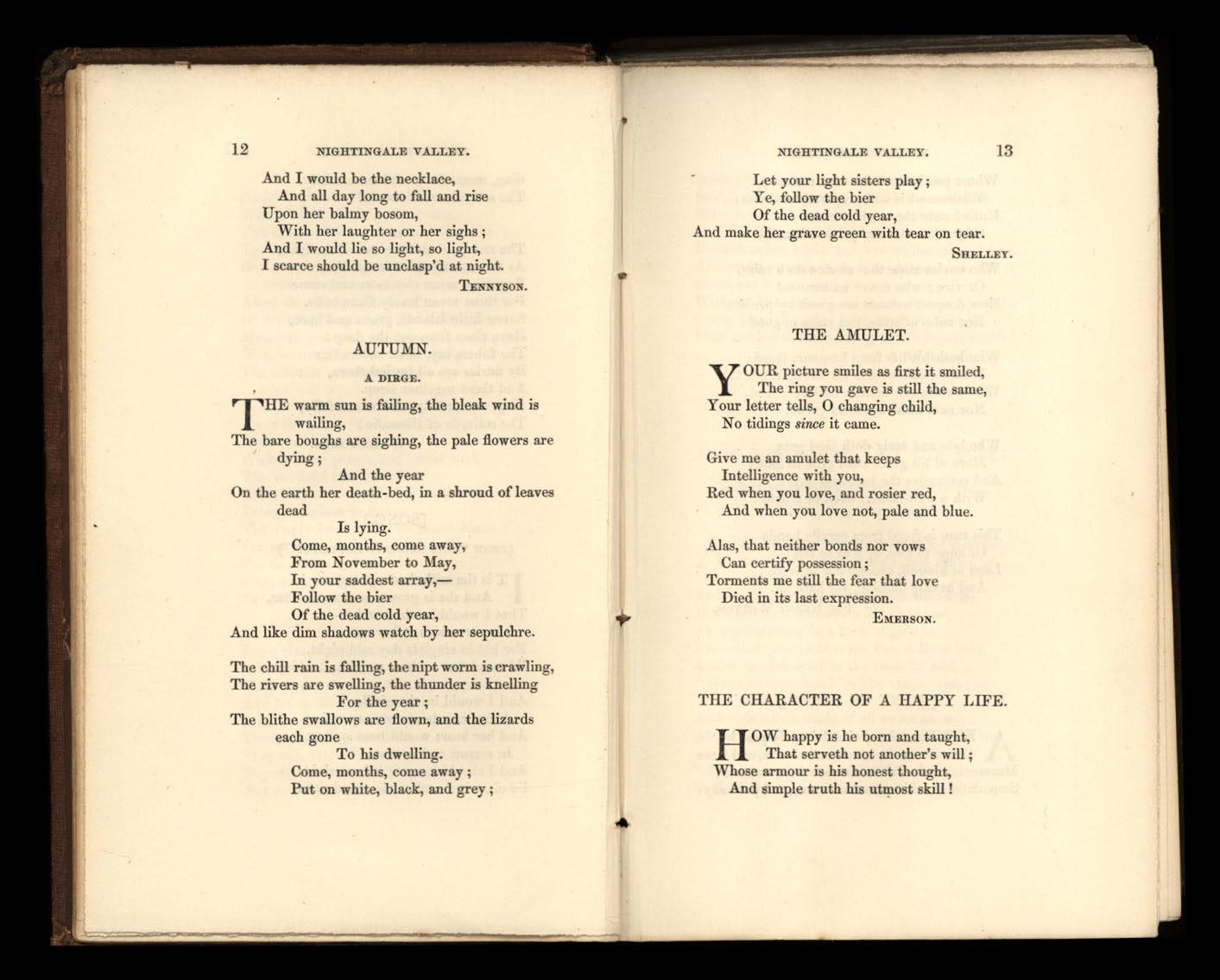
NIGHTINGALE VALLEY.
And I would be the necklace, And all day long to fall and rise
Upon her balmy bosom, With her laughter or he r sighs; And I would lie so light, so light, I scarce should be unclasp'd at night.
ThNNY ON.
AUTUMN.
A. DmGE.
THE warm sun is failing, the bleak wind is wailing,
The bare boughs are sighing, the pale flowers are dying;
And the year
On the eartb her death-bed, in a shroud of leaves dead
Is lying.
Come, months, come away, From November to May, In your saddest array,Follow the bier Of the dead cold year, And like dim shadows watch by her sepulchre.
The chill rain is falling, the nipt worm is crawling, The rivers are swelling, the thunder is knelling
For the year ; The blithe swallows are flown, and the lizards each gone
To his dwelling.
Come, months, come away; Put on white, black, and grey; , ..
NIGHTINGALE VALLEY.
Let your light sisters play; Ye, follow the bier Of the dead cold year, And make her grave green with tear on tear. 13 SRELLEY.
YOUR picture smiles as first it smiled, The ring you gave is still the same, Your letter tells, 0 changing child, No tidings since it came
Give me an amulet that keeps Intelligence with you, Red when you love, and rosier red, And when you love not, pale and blue.
Alas, that neither bonds nor vows Can certify po ession; Torments me still the fear that love Died in its last expression.
EMERSON.
THE CHARACTER OF A HAPPY LIFE.
HOW happy is he born and taught, That serveth not another's will ; Who e armour is his honest thought, And simple truth his utmost skill !
14
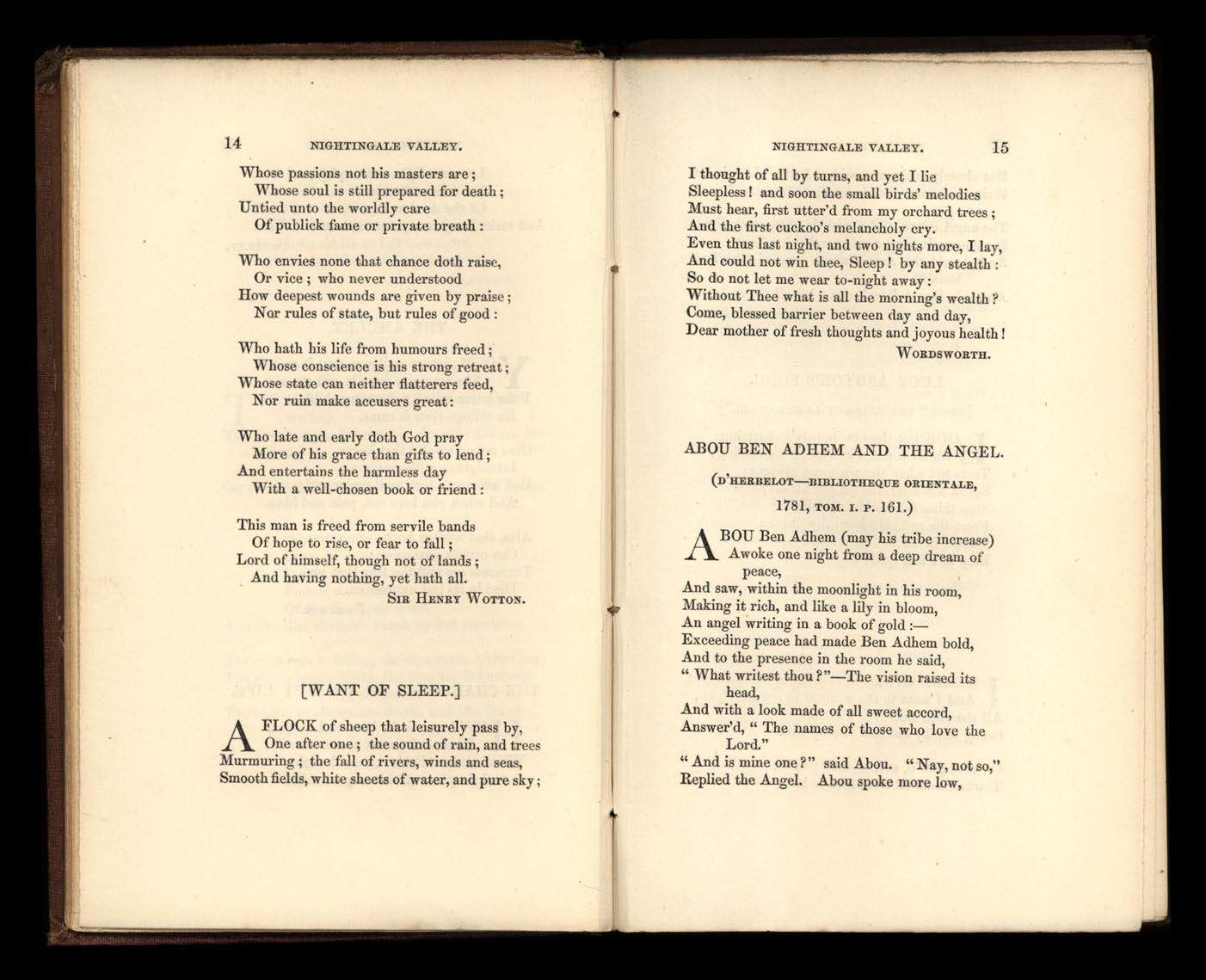
NIGHTINGALE VALLEY.
Whose pass ions not his masters are j
Who se so ul is still prepared for death j
Unti ed unto the worldly care
Of pub lick fame or private breath:
Who envies none that chance doth rais e,
Or vice j who never understood
How deepest wounds are given by prais e j
Nor rules of state, but rules of good:
Who hath his life from humours freed j
Whose conscience is his strong retreat
Whose state can n e ither flatterers feed,
Nor ruin make accusers great:
Who late and early doth God pray
More of his grace than gifts to lend j
And entertains the harml ess day
With a well-chosen book or friend:
This man is freed from servile bands
Of hope to ri se, or fear to fall j
Lord of himself, though not of lands j
And having nothing, yet hath all.
SIR HENRY WOTTON.
[WANT OF SLEEP.]
AFLOCK of sheep that leisurely pass by,
One after one j the sound of rain, and tr ees
Murmuring j the fall of rivers, winds and seas,
Smoot.h fields, white sheets of water, and pure sky j
NIGHTINGALE VALLEY. 15
I t.hought of all by turns, and yet I lie
Sleepless! and soon the small birds' melodies
Must hear, first utter'd from my orchard trees
And the first cuckoo's melancholy cry.
Even thus last night, and two nights more, I lay,
And could not win thee, Sleep! by any stealth:
So do not let me wear to-night away:
Without Thee what is all the morning's wealth?
Come, blessed barrier be tween day and day,
Dear mother of fresh thoughts and joyous health I W ORDSWORTH.
ABOU BEN ADHEM AND THE ANGEL.
(D'HERnELOT-nmLIOTHEQUE ORIENTALE, 1781, TOM. I. P. 161.)
ABOU Ben Adhem (may his tribe increase)
Awoke one night from a deep dream of peace,
And saw, within the moonlight in his room,
Making it rich, and like a lily in bloom,
An angel writing in a book of gold :-
Exceeding peace had made Ben Adhem bold,
And to the prese nce in the room h e said,
" What writest thou ?"-The vision raised its head,
And with a look made of all sweet accord,
Answer'd, " The names of those who love the Lord."
" And is mine one?" said Abou. " Nay, not so,"
Replied the Angel. Abou spoke more low,
16
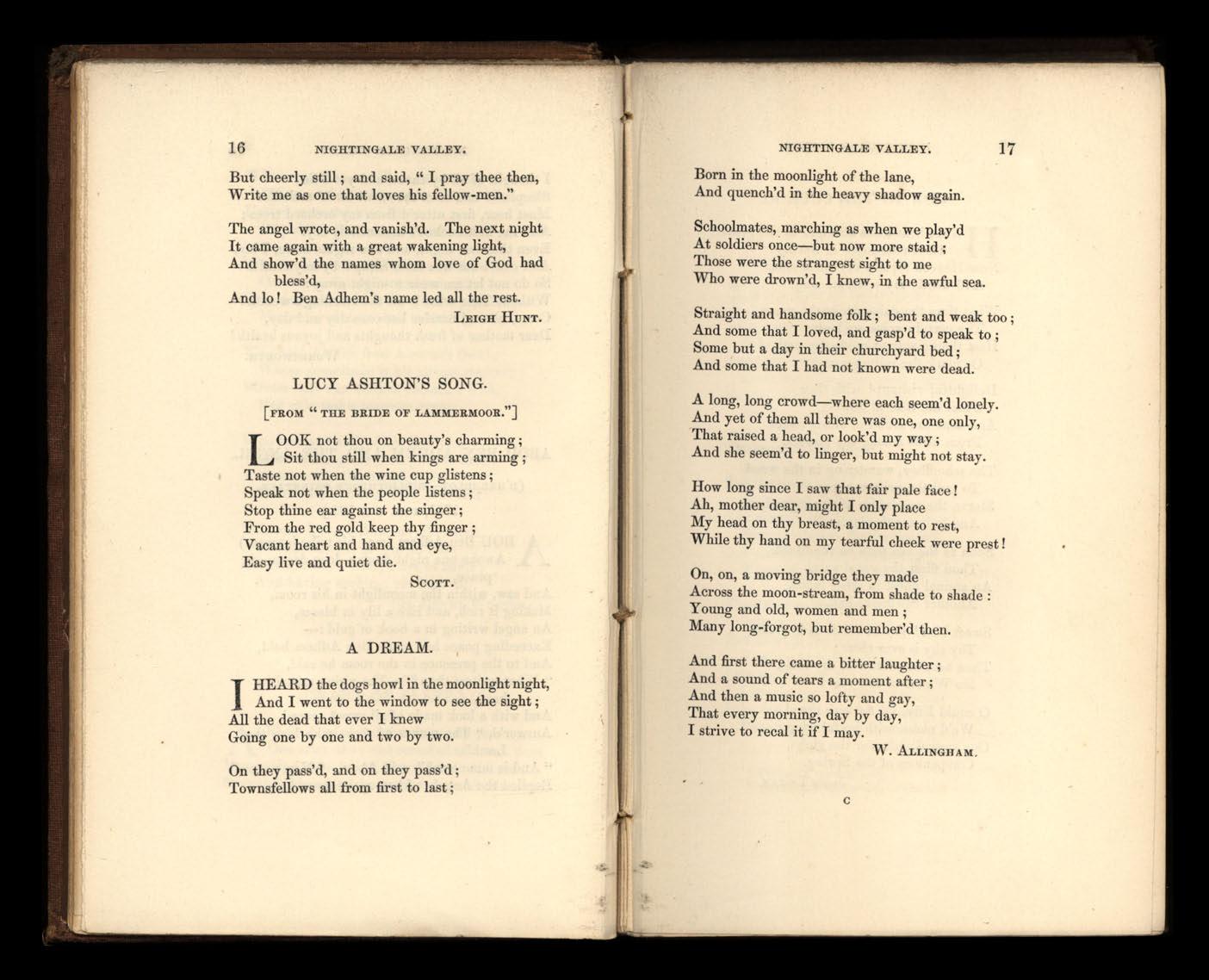
NIGHTINGALE VALLEY.
But cheerly still; and said, " I pray thee then, Write me as one that loves his fellow-men."
The angel wrote, and vanish'd. The next night It came again with a great wakening light, And show'd the names whom love of God had bless'd, And lo! Ben Adhem's name led all the rest.
LEIGH HUNT.
LUCY ASHTON'S SONG.
[FROM" THE BRIDE OF LAMMERMOOR."]
LOOK not thou on beauty's charming; Sit thou still when kings are arming; Taste not when the wine cup glistens; Speak not when the people listens; Stop thine ear against the singer; From the red gold keep thy finger; Vacant heart and hand and eye, Easy live and quiet die.
SCOTT. A DREAM.
IHEARD the dogs howl in the moonlight night, And I went to the window to see the sight; All the dead that ever I knew Going one by one and two by two.
On they pass'd, and on they pass'd; Townsfellows all from first to last;
NIGHTINGALE VALLEY.
Born in the moonlight of the lane, And quench'd in the heavy shadow again.
SchoolI?ates,marching as when we play'd At soldiers once-but now more staid·
Those were the stranO"e t si".ht to me '
Who were drown'd, in the awful sea.
Straight and handsome folk; bent and weak too'
And some that I.loved, and gasp'd to speak to; ,
Some but a day ID their churchyard bed;
And some that I had not known were dead.
A long, long crowd-where each seem'd lonely.
And of them all there was one, one only,
That raIsed a head, or look'd my way;
And she seem'd to linger, but might not stay.
How long since I saw that fair pale face!
Ah, mother dear, might I only place
My head on thy breast, a moment to rest
While thy hand on my tearful cheek prest!
On, on, a moving bridge they made
Across the moon-stream, from shade to shade:
Young and old, women and men;
Many long-forgot, but remember'd then.
And first there came a bitter laughter; And a sound of tears a moment after'
And then a music so lofty and gay, '
That every morning, day by day, I strive to recal it if I may.
1<Y. ALLINGHAM
18

NIGHTINGALE VALLEY.
HAIL, beauteous stranger of the grove! Thou messenger of Spring!
Now Heaven repairs thy rural seat, And woods thy welcome sing.
What time the daisy decks the green, Thy certain voice we hear : Hast thou a star to guide thy path, Or mark the rolling year?
Delightful visitant I with thee
I hail the time of flowers, And hear the sound of music sweet From birds among the bowers.
The schoolboy, wandering in the wood
To pull the primrose gay, Starts, the new voice of Spring to hear, And imitates thy lay.
Soon as the pea puts on the bloom, Thou fiiest thy vocal vale, An annual guest in other lands, Another Spring to hail.
Sweet bird! thy bower is ever green, Thy sky is ever clear j Thou hast no sorrow in thy song, No Winter in thy year!
o could I fly, I'd fly with thee!
We'd make, with joyful wing, Our annual visit o'er the globe, Companions of the Spring.
JOHN LOGAN.
NIGHTINGALE VALLEY.
CORONACH.l
[FROM" THE LADY OF THE LAKE."]
HE is gone on the mountain, He is lost to the forest j
Like a summer-dried fountain, When our need was the sorest.
The font, reappearing, From the rain-drops shall borrow j But to us comes no cheering, No Duncan to-morrow.
The hand of the reaper
Takes the ears that are hoary
But the voice of the weeper Wails manhood in glory j
The autumn winds rushing Waft the leaves that are serest, But our flower was in flushing When blighting was nearest.
Fleet foot on the correi,2
Sage counsel in cumber, Red hand in the foray, How sound is thy slumber!
Like the dew on the mountain, Like the foam on the river, Like the bubble on the fountain, Thou art gone, and for ever!
SCOTT.
I Coronae", funeral song.
o Oorrti, the hollow side of the hill.
20
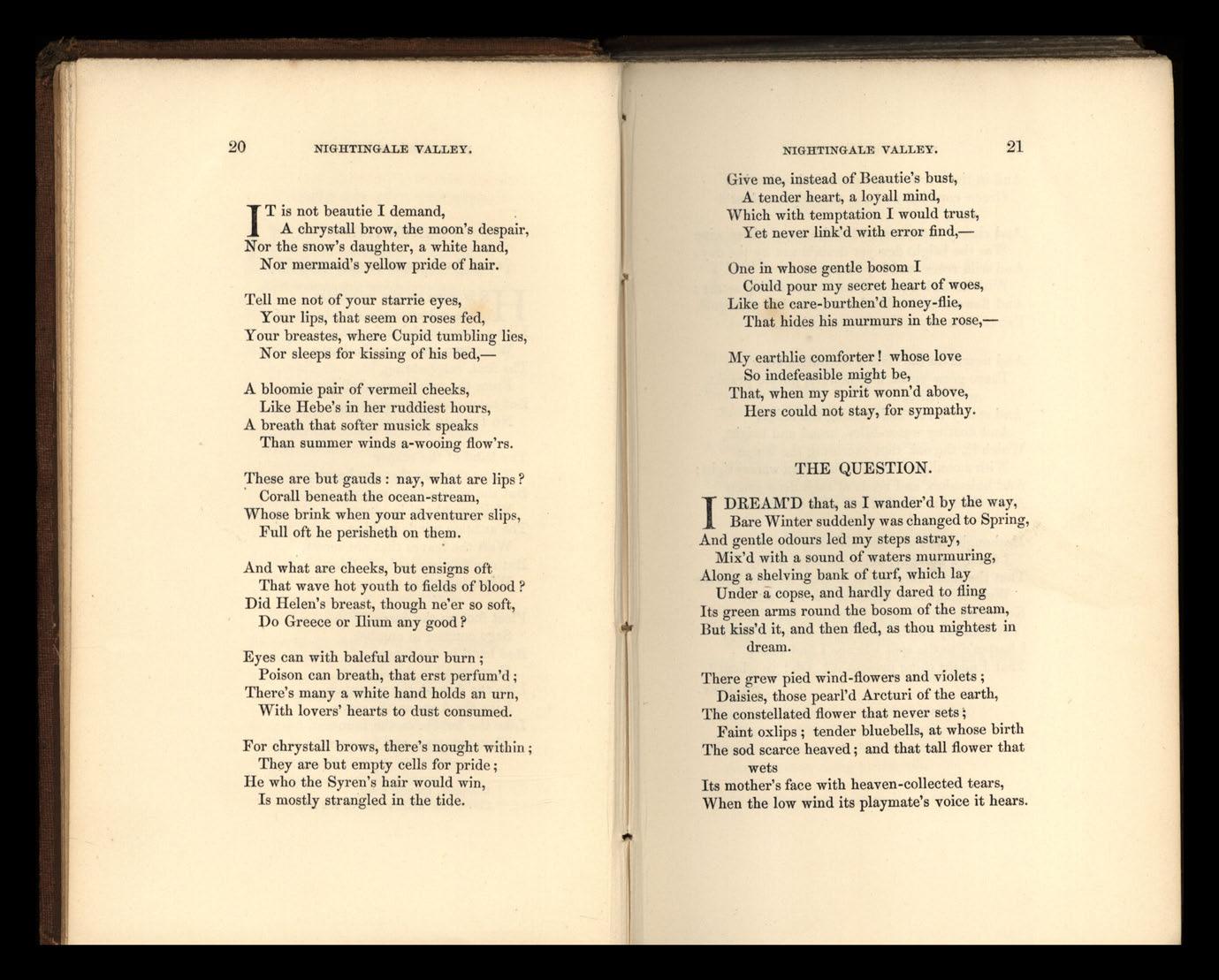
NIGHTINGALE VALLEY.
IT is not beautie I demand, .
A chrystall brow, the moon's despair, Nor the snow's daughter, a white hand, Nor mermaid's yellow pride of hair.
Tell me not of your starrie eyes, Your lips, that seem on roses fed, Your breastes, where Cupid tumbling lies, Nor sleeps for kissing of his bed,-
A bloomie pair of vermeil cheeks, Like Hebe's in her ruddiest hours, A breath that softer musick speaks Than summer winds a-wooing flow'rs.
These are but gauds: nay, what are lips?
. Corall beneath the ocean-stream, Whose brink when your adventurer slips, Full oft he perisheth on them.
And what are cheeks, but ensigns oft That wave hot youth to fields of blood? Did Helen's breast, though ne'er so soft, Do Greece or llium any good?
Eyes can with baleful ardour burn; Poison can breath, that erst perfum'd ; There's many a white hand holds an urn, With lovers' hearts to dust consumed.
For chrystall brows, there's nought within; They are but empty cells for pride; He who the Syren's hair would win, Is mostly strangled in the tide.
NIGHTINGALE VALLEY.
Give me, instead of Beautie's bust,
A tender heart, a loyal! mind, Which with temptation I would trust, Yet never link'd with error find,-
One in whose gentle bosom I
Could pour my secret heart of woes, Like the care-burthen'd honey-fHe, That hides his murmurs in the rose,-
My earthlie comforter! whose love So indefeasible might be, That, when my spirit wonn'd above, Hers could not stay, for sympathy.
IDREAM'D that, as I wander'd by the way, Bare Winter suddenly was changed to Spring, And gentle odours led my steps astray, Mix'd with a sound of waters murmurmg, AlonO' a shelvinO' bank of turf, which lay I:> <> • Under a copse, and hardly dared to flmg Its !1reen arms round the bosom of the stream, But\iss'd it, and then fled, as thou mightest in dream.
There grew pied wind-flowers and violets; Daisies, those pearI'd Arcturi of the earth, The constellated flower that never sets; Faint oxlips; tender bluebells, at whose birth
The sod scarce heaved; and that tall flower that wets
Its mother's face with heaven-collected tears, When the low wind its playmate's voice it hears.
22

NIGHTINGALE VALLEY.
And in the warm hedge grew lush eglantine, Green cowbind and the moonlight-colour'd may,
And cherry blossoms, and white cups, whose wine Was the bright dew yet drain'd not by the day; And wild roses, and ivy serpentine, With its dark buds and leaves, wandering astray; And flowers azure, black, and streak'd with "'old F . b alrer than any waken'd eyes behold.
And nearer to the river's trembling edge There grew broad flag-flowers, purple prankt with white,
And starry river-buds among the sedge, And floating water-lilies, broad and bright, lit the oak that overhung the hedge With moonlight beams of their own watery light; And bulrushes, and reeds of such deep green As soothed the dazzled eye with sober sheen.
Methought. that of these visionary flowers
I made a nosegay, bound in such a way That the same hues which in their natural bowers Were mingled or opposed, the like array Kept these imprison'd children of t.he Hours
Within my hand,-and then, elate and gay, I hasten'd to the spot whence I had come, That I might. there present it! Oh! to whom?
SHELLEY.
NIGHTINGALE VALLEY. 23 ·
BARTIIRAM'S DIRGE.
(FROM" MINSTRELSY OF THE SCOTTISH BORDER.")
THEY shot him on the Nine-Stane Rig, Beside the Headless Cross; And they left him lying in his blood, Upon the muir and moss.
They made a bier of the broken bough, The saugh 1 and the aspen grey; And they bore him to the Lady Chapel, And waked him there all day.
A lady came to that lonely bower, And threw her robes aside, She tore her 2ling-long yellow hair, And knelt at Barthram's side.
She bathed him in the Lady-Well, His wounds sae deep and sair ; And she plaited a garland for his breast, And a garland for his hair.
They row'd him in a lily sheet, And bare him to his earth, And the Grey Friars sung the dead man's mass, As they pass'd the Chapel-Garth.
They buried him at the mirk midnight, When the dew fell cold and still, When the aspen grey forgot to play, And the mist clung to the hill.
I Saugh, " sally," willow. 2 Ling, heather.
24
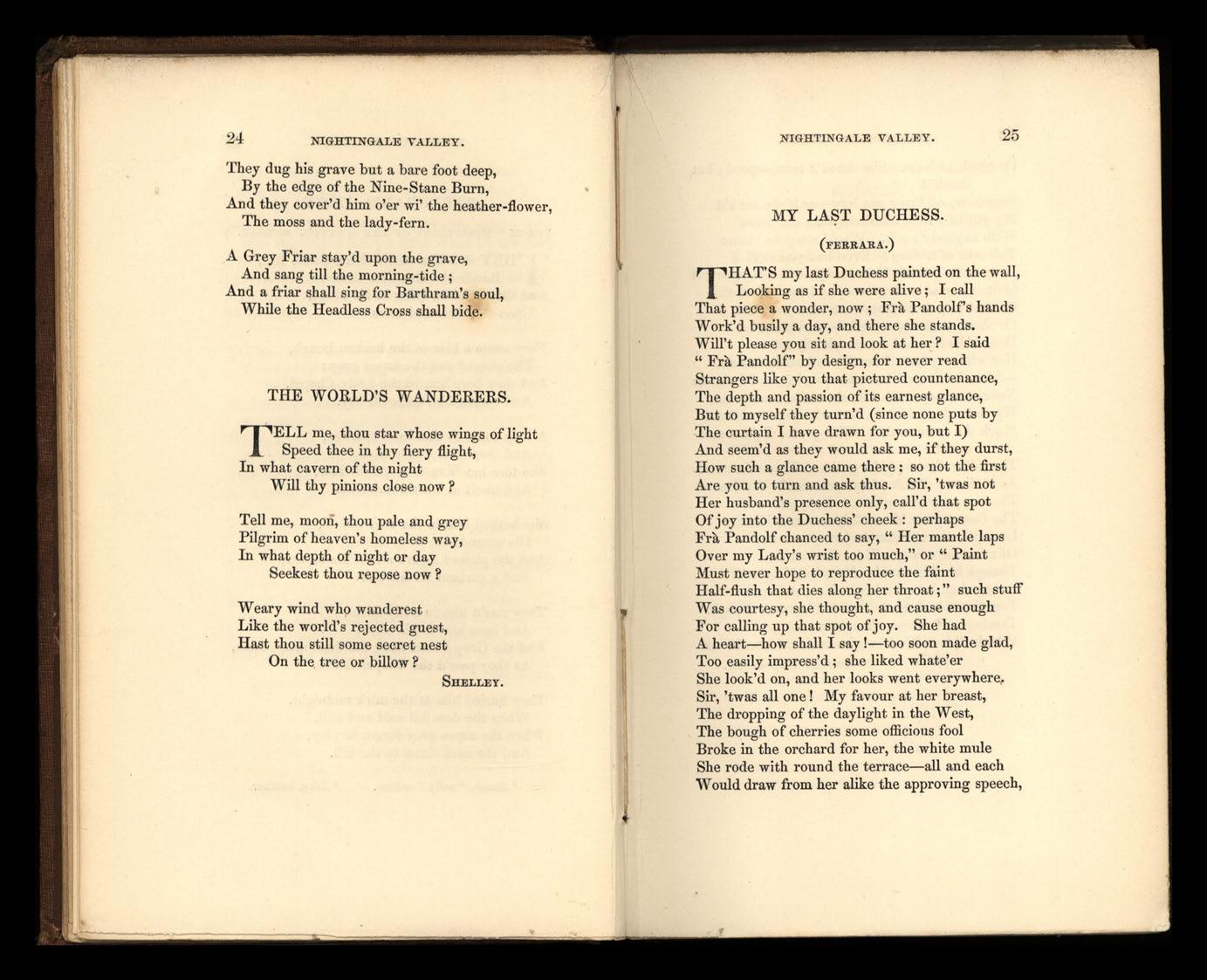
NIGHTINGALE "'ALLEY.
They dug hi s grave but a bare foot deep, By the edge of the Nine-Stane Burn, And they cover'd him o'er wi' the heather-llower, The moss and the lady-fern.
A Grey Friar stay'd upon the grave, And sang till the morning-tide; And a friar shall sing for Barthram's soul, While the Headless Cross shall bide.
TELL me, thou star whose wings of light Speed thee in thy fiery llight, In what cavern of the night Will thy pinions close now?
Tell me, moon, thou pale and grey Pilgrim of heaven's homeless way, In what depth of night or day Seekest thou repose now?
Weary wind who wanderest Like the world's rejected guest, Hast thou still some secret nest On the tree or billow?
SHELLEY.
NIGHTINGALE VALLEY. 25 MY LAST DUCHESS. (FERRARA.)
THAT'S my last Duchess painted on the wall, Looking as if she were alive; I call
That piece a wonder, now; Fra PandoIrs hands Work'd busily a day, and there she st.ands.
WiU't please you sit and look at her? I said " Fra Pandolf" by design, for never read
Strangers like you that pictured countenance,
The depth and passion of its earnest glance,
But to myself they turn'd (since none puts by
The curtain I have drawn for you, but I)
And seem'd as they would ask me, if they durst, How such a g lance came there: so not the first Are you to turn and ask thus. Sir, 'twas not
Her husband's presence only, call'd that spot
Of joy into the Duchess' cheek: perhaps Fra Pandolf chanced to say, " Her mantle laps
Over my Lady's wrist too much," or " Paint
Must never hope to reproduce the faint Half-llush that <lies along her throat;" such stuff
Was courtesy, she thought, and cause enough For calling up that spot of joy. She had
A heart-how shall I say I-too soon made glad, Too easily impress'd; she lik ed whate'er
She l ook'd on, and her looks went everywhere, Sir, 'twas all one! My favour at her breast,
The dropping of the daylight in the West,
The bough of cherries some officious fool
Broke in the orchard for her, the white mule
She rode with round the terrace-all and each
Would draw from her alike the approving speech,
26
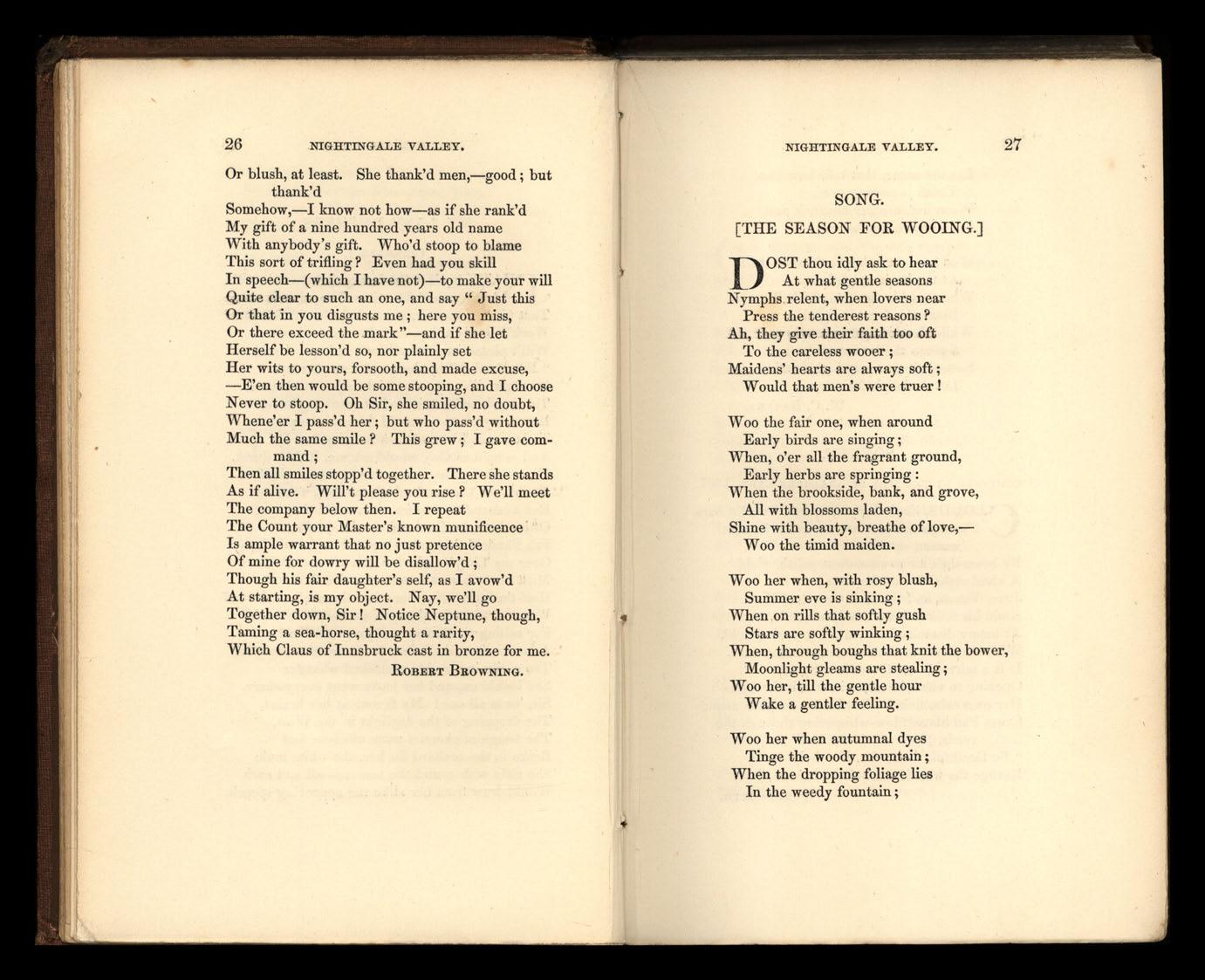
NIGHTINGALE VALLEY.
Or blush, at least. She thank'd men,-good; but thank'd
Somehow,-I know not how-as if she rank'd
My gift of a nine hundred years old name With anybody's gift. Who'd stoop to blame This sort of trifling? Even had you skill In speech-(which I have not)-to make your will Quite clear to such an one, and say" Just this Or that in you disgusts me; here you miss, Or there exceed the mark "-and if she let Herself be lesson'd so, nor plainly set Her wits to yours, forsooth, and made excuse, -E'en then would be some stooping, and I choose Never to stoop. Oh Sir, she smiled, no doubt, "Whene'er I pass'd her; but who pass'd without Much the same smile? This grew; I gave command;
Then all smiles stopp'd together. There she stands As if alive. Will't please you rise ? We'll meet The company below then. I repeat The Count your Master's known munificence Is ample warrant that no just pretence Of mine for dowry will be disallow'd ;
Though his fair daughter's self, as I avow'd At starting, is my object. Nay, we'll go Together down, Sir! Notice Neptune, though, Taming a sea-horse, thought a rarity, Which Claus of Innsbruck cast in bronze for me.
ROBERT BROWNING.
NIGHTINGALE VALLEY.
[THE SEASON FOR WOOING.]
DOST thou idly ask to hear
At what gentle seasons Nymphs relent, when lovers near Press the tenderest reasons? Ab, they give their faith too oft To the careless wooer; Maidens' hearts are always soft; W ouId that men's were truer!
Woo the fair one, when around Early birds are singing; "When, o'er all the fragrant ground, Early herbs are springing: When the brookside, bank, and grove, All with blossoms laden, Shine with beauty, breathe oflove,Woo the timid maiden.
Woo her when, with rosy blush, Summer eve is sinking; "When on rills that softly gush Stars are softly winking;
"When, through boughs that knit the bower, Moonlight gleams are stealing; Woo her, till the gentle hour Wake a gentler feeling.
Woo her when autumnal dyes Tinge the woody mountain; When the dropping foliage lies In the weedy fountain;
28
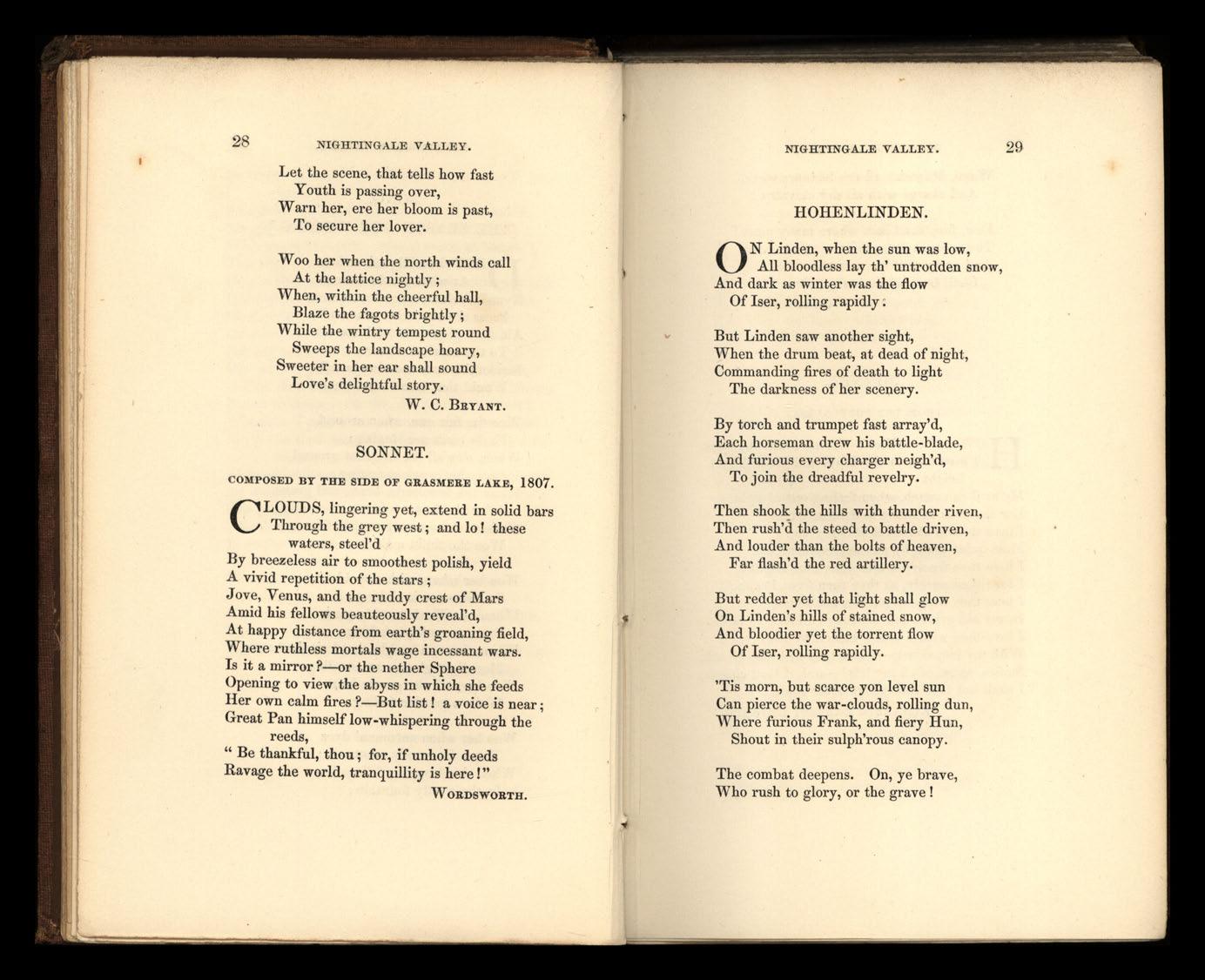
NIGHTINGALE VALLEY.
Let the scene, that tells how fast Youth is passing over, Warn her, ere her bloom is past, To secure her lover.
Woo her when the north winds call At the lattice nightly; When, within the cheerful hall, Blaze the fagots brightly; While the wintry tempest round Sweeps the landscape hoary, Sweeter in her ear shall sound Love's delightful story.
W. C. BRYANT.
COMPOSED BY THE SIDE OF GRASMERE LAKE, 1807.
CLOUDS, lingering yet, extend in solid bars Through the grey west; and lo! these wat,ers, steel'd
By breezeless air to smoothest polish, yield A vivid repetition of the stars; Jove, Venus, and the ruddy crest of Mars Amid his fellows beauteously reveal'd, At happy distance from earth's groaning field, Where ruthless mortals wage incessant wars. Is it a mirror ?-or the nether Sphere
Opening to view the abyss in which she feeds Her own calm fires ?-But list! a voice is near' Great Pan himself low -whispering through the ' reeds,
" Be thankful, thou; for, if unholy deeds
Ravage the world, tranquillity is here '"
W ORDSWORTH.
NIGHTINGALE VALLEY.
HOHENLINDEN.
ON Linden, when the sun was low, All bloodless lay th' untrodden snow,
And dark as winter was the flow Of Iser, rolling rapidly;
But Linden saw another sight, When the drum beat, at dead of night, Commanding fires of death to light The darkness of her scenery.
By torch and trumpet fast array'd, Each horseman drew his battle-blade, And furious every charger neigh'd, To join the dreadful revelry.
Then shook the hills with thunder riven, Then rush'a. the st.eed to battle driven, And louder than the bolts of heaven, Far flash'd the red artillery.
But redder yet that light shall glow On Linden's hills of stained snow, And bloodier yet the torrent flow Of Iser, rolling rapidly.
'Tis morn, but scarce yon level sun Can pierce the war-clouds, rolling dun, W'here furious Frank, and fiery Hun, Shout in their sulph'rous canopy.
The combat deepens On, ye brave, Who rush to glory, or the grave!
30

NIGHTINGALE VALLEY.
Wave, Munich! all thy banners wave, And charge with all thy chivalry!
Few, few, shall part where many meet! The snow shall be their winding-sheet, And every turf beneath their feet Shall be a soldier's sepulchre.
CA Ml'BELL.
SONNET.
FROM THE PORTUGUESE.
HOW do I love thee P Let me count the ways. I love thee to the depth and breadth and height
My soul can reach, when feeling out of sight For the ends of Being and Ideal Grace. I love thee to the level of every day's Most quiet need, by sun and cand lelight.
I love thee freely, as men strive for Right; I love thee purely, as they turn from Praise; I love thee with the passion put to use In myoid griefs, and with my childhood's faith; I love thee with a love I seem'd to lose With my lost saints,-I love thee with the breath, Smiles, te3.rs, of all my life I-and, if God choose, I shall but love thee better after death.
ELIZABETH BARRETT BROWNING.
NIGHTINGALE VALLEY.
CLERK SAUNDERS.
[OLD BALLAD.]
CLERK Saunders and may Margaret W alk'd ower yon garden green; And deep and heavy was the love That fell thir twa between.
" A bed, a bed," Clerk Saunders said, " A bed for you and me !"
" Fye na, fye na," said may Margaret, " Till anes we married be."
" Th en I'll take the sword frae my scabb:uu, And slowly lift the pin; And you may swear, and save your aitb, Ye never let me in.
" Take you a napkin in your hand, Tie up your bonnie e'en, And you may swear and save your aitb, Ye saw me na since yestreen."
It was about the midnight hour When they asleep were laid, When in and came her seven brothers Wi' torches burning red:
When in and came her seven brothers Wi' torches burning bright; They said, "We hae but one sister, And behold her lying with a knight!"
32
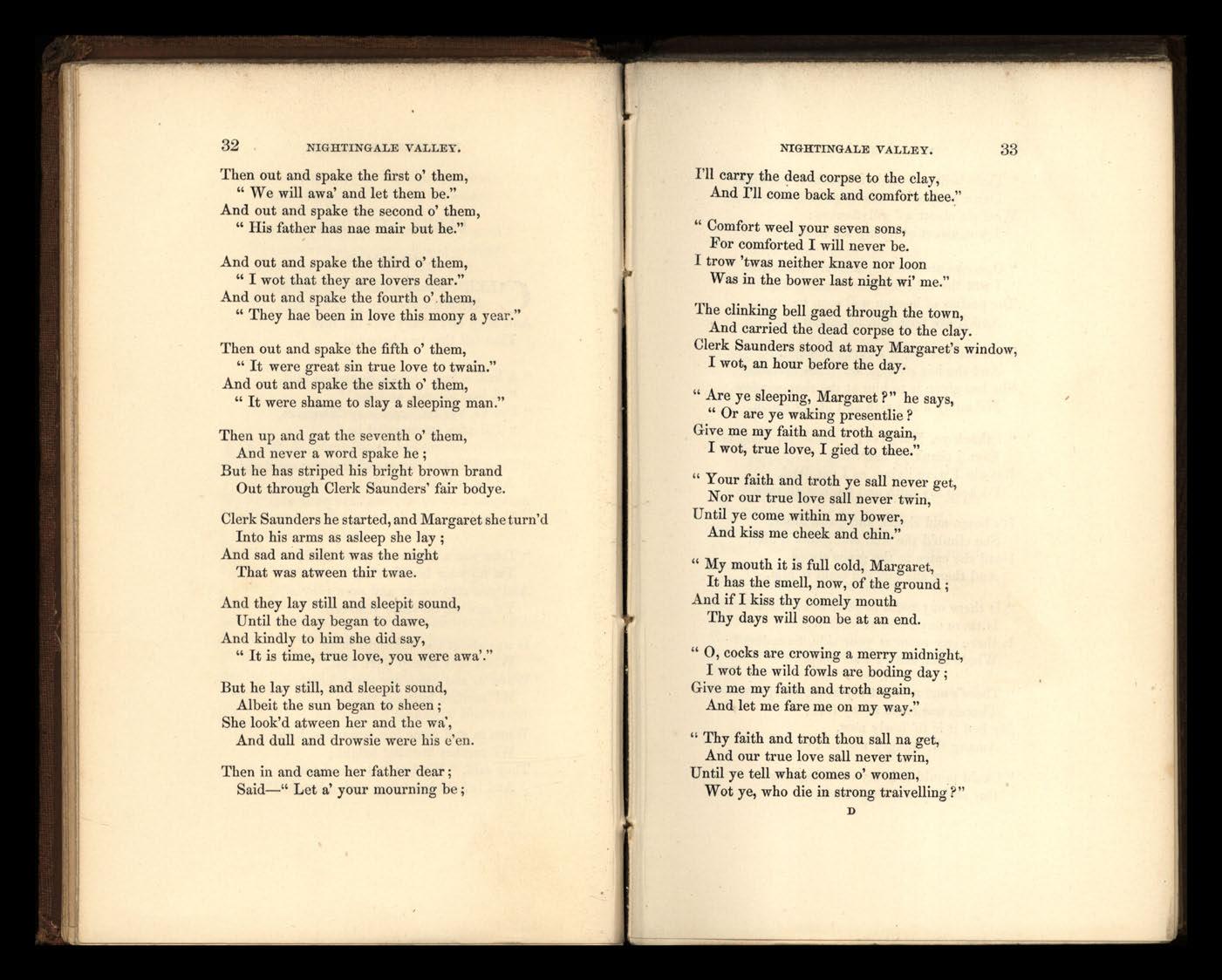
NIGHTINGALE VALLEY.
Then out and spake the fir st 0' them,
" We will awa' and let them be."
And out and spake the second 0' them, " His father has nae mail' but he."
And out and spake the third 0' th em,
" I wot tha t they are lov ers dear."
And out and spake the fourth 0' th em,
" Th ey hae been in lov e this mony a year."
Then out and spake the fifth 0' them,
" It were great sin true lov e to twain."
And out and spak e the sixth 0' them,
" It were sham e to slay a sleeping man."
Th en up and gat the seventh 0' th em, And never a word spake h e ;
But he has striped his bright brown brand Out through Clerk Saunders' fair bodye.
Clerk Saunders h e started, and Margaret sheturn'd
Int o his arms as asleep she lay ; And sad and sil ent was the night Th at was atween thir twae.
And they l ay st ill and sl eepit sound , Until the day began to dawe, And kindly to him sh e did say, " It is tim e, true love, you wer e awa'."
But h e l ay st ill, and sl eep it sound, Albeit the sun began to sheen; She lo ok'd atween her and the wa', And dull and drowsie were his e'en.
Th en in and came h er father dear ; Said-" L et a' your mourning be;
NIGHTINGALE VALLEY.
I'll carry the dead corpse to the clay, And I'll come back and comfort thee."
" Comfort weel your seven sons, For comforted I will nev er be.
I trow 'twas neither knave nor loon Was in the bow er last night wi' me."
The clinking bell gaed through the town, And carried th e dead corpse to th e clay.
Clerk Saunders stood at may Margaret's window , I wot, an hour before the day.
" Are ye sleeping, Margaret?" he says, " Or are ye waking presentlie ?
Give me my faith and troth again, I wot, true love, I gied to thee,"
" Your faith and troth ye sall never get, Nor our true love sail never twin, U ntil ye come within my bower, And kiss me cheek and chin."
" My mouth it is full cold, Margaret, It has the smell, now, of the g round; And if I ki ss thy comely mouth Thy days will so on be at an end.
" 0, cocks are crowing a merry midni g ht, I wot th e wild fowls are boding day;
G ive me my faith and troth again, And let me fare me on my way."
" Thy faith and troth thou saIl na get, And our true love sall never twin, Until ye tell what comes 0' women, Wot ye, who die in strong traivelling?"
34
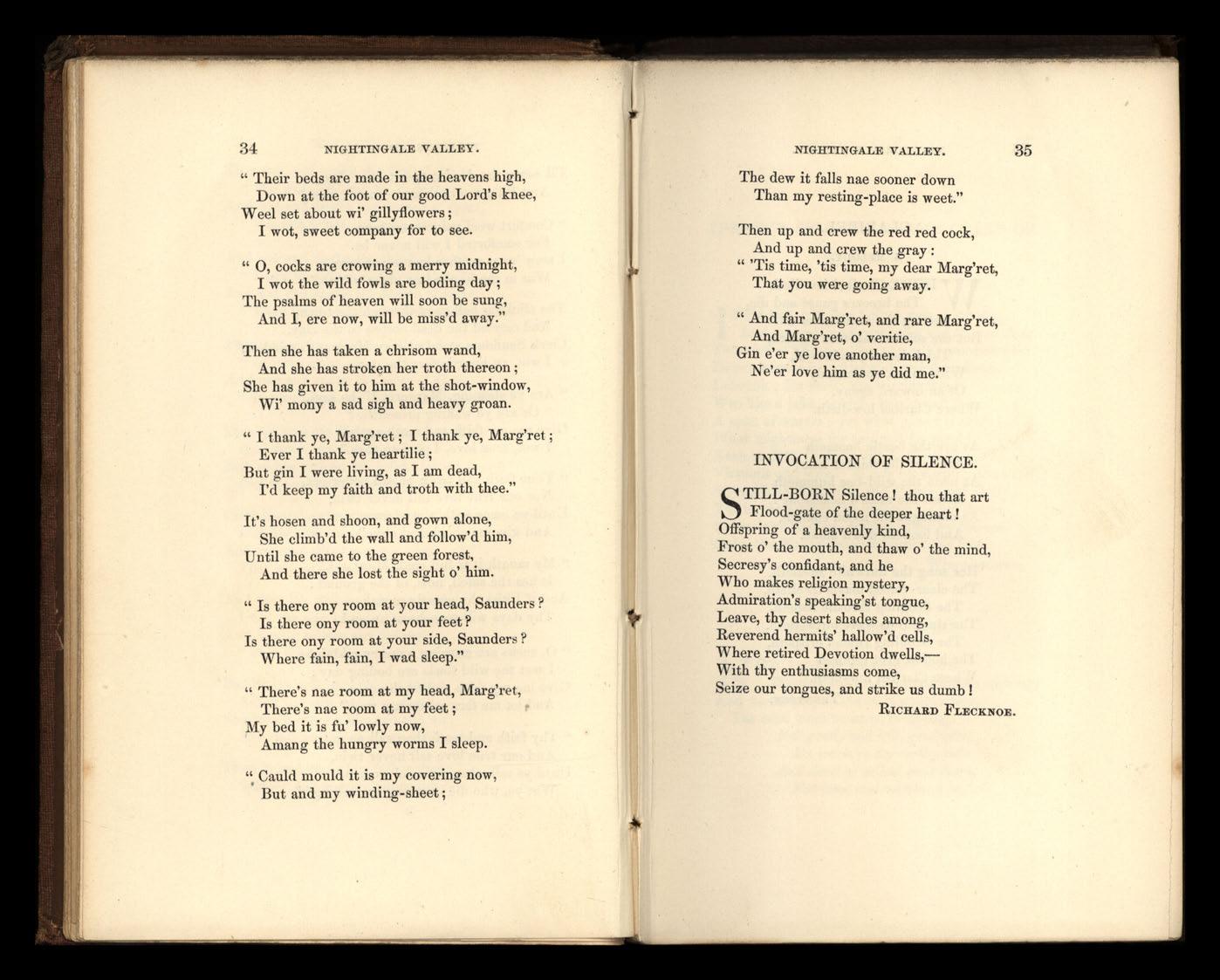
NIGHTINGALE VALLEY.
" Their beds are made in the heavens high, Down at the foot of our good Lord's knee, Weel set about wi' gillyflowers j I wot, sweet company for to see.
" 0, cocks are crowing a merry midnight, I wot the wild fowls are boding day
The psalms of heaven will soon be sung, And I, ere now, will be miss'd away."
Then she has taken a chrisom wand, And she has stroken her troth thereon She has given it to him at the shot -window, Wi' mony a sad sigh and heavy groan.
" I thank ye, Marg'ret j I thank ye, Marg'ret Ever I thank ye heartilie
But gin I were living, as I am dead, I'd keep my faith and troth with thee."
It's hosen and shoon, and gown alone, She climb'd the wall and follow'd him, Until she came to the green forest, And there she lost the sight 0' him.
" Is there ony room at your head, Saunders?
Is there ony room at your feet?
Is there ony room at your side, Saunders? Where fain, fain, I wad sleep."
" There's nae room at my head, Marg'ret, There's nae room at my feet
My bed it is fu' lowly now, Amang the hungry worms I sleep.
" Cauld mould it is my covering now,
• But and my winding-sheet;
NIGHTINGALE VALLEY.
The dew it falls nae sooner down Than my resting-place is weet."
Then up and crew the red red cock, And up and crew the gray:
" 'Tis time, 'tis time, my dear Marg'ret, That you were going away.
" And fair Marg'ret, and rare Marg'ret, And Marg'ret, 0' veritie,
Gin e'er ye love another man, Ne'er love him as ye did me."
-BORN Silence I thou that art
Flood-gate of the deeper heart I Offspring of a heavenly kind, Frost 0' the mouth, and thaw 0' the mind, Secresy's confidant, and he Who makes religion mystery, Admiration's speaking'st tongue, Leave, thy desert shades among, Reverend hermits' hallow'd cells, Where retired Devotion dwells,With thy enthusiasms come, Seize our tongues, and strike us dumb!
RICHARD FLECKNOE.
NIGHTINGALE VALLEY.
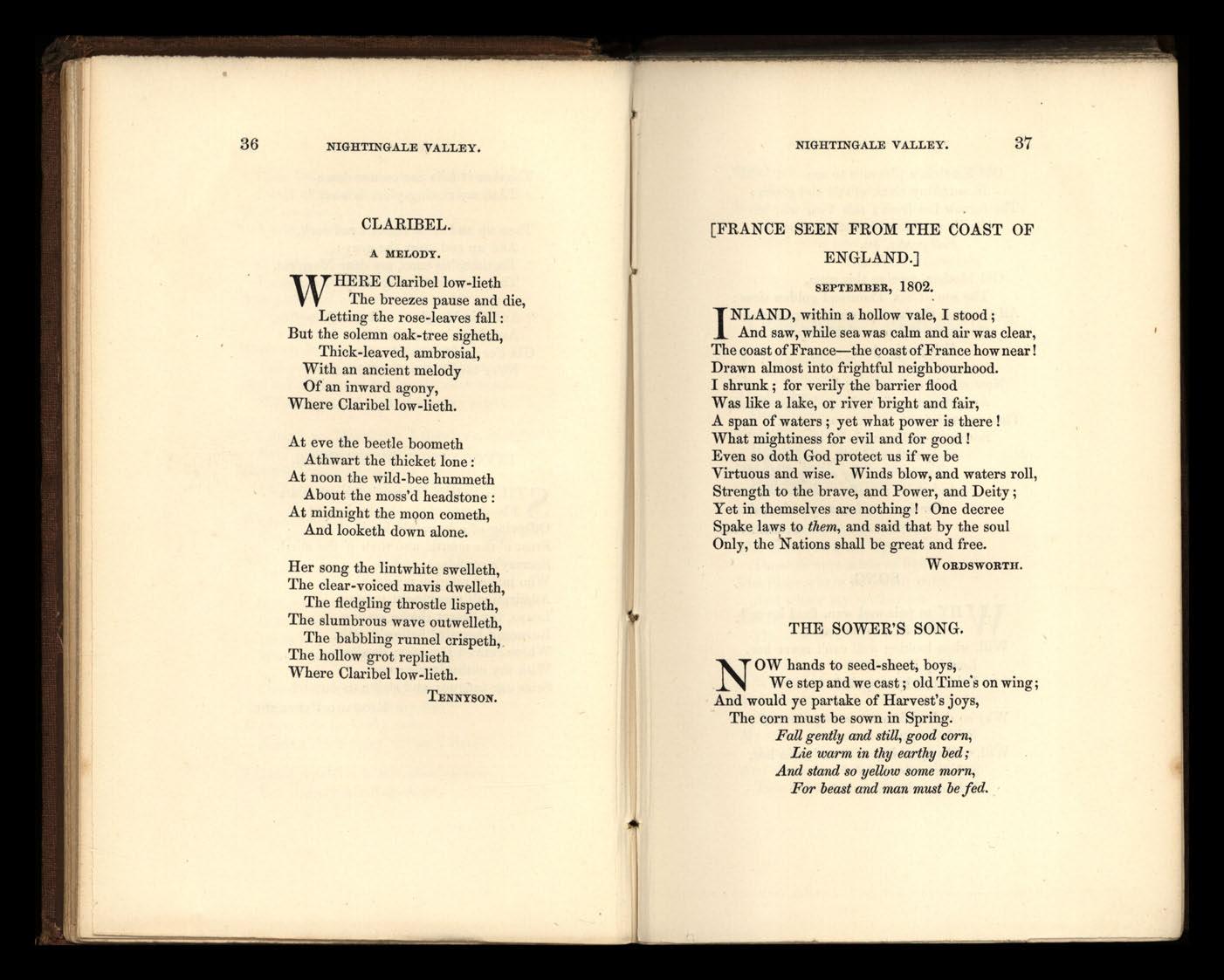
CLARIBEL.
A MELODY.
WHERE
Claribellow-lieth
The breezes pause and die, Letting the rose-leaves fall : But the solemn oak-t.ree sigheth, Thick-leaved, ambrosial, With an ancient melody Of an inward agony, Where Claribellow-lieth.
At eve the beet.le boometh Athwart the thicket lone: At noon the wild-bee hummeth About the moss'd headstone: At midnight the moon cometh, And looketh down alone.
Her song the lintwhite swelleth, The clear-voiced mavis dwelleth The fledgling throstle lispeth, ' The slumbrous wave outwelleth, The babbling runnel crispeth, The hollow grot replieth Where Claribellow-lieth.
TENNYSON.
NIGHTINGALE VALLEY. 37
SEPTEMBER, 1802.
I NLAND, within a hollow vale, I stood; And saw, while sea was calm and ail' was clear, The coast of France-the coast of France how near! Drawn almost into frightful neighbourhood. I shrunk; for verily the barrier flood Was like a lake, or river bright and fair, A span of waters; yet what power is there! What mightiness for evil and for good! Even so doth God protect us if we be Virtuous and wise. Winds blow, and waters roll, Strength to the brave, and Power, and Deity; Yet in themselves are nothing! One decree Spake laws to them, and said that by the soul Only, the Nations shall be great and free.
W ORDSWORTH.
THE SOWER'S SONG.
NOW hands to seed -sheet, boys, We step and we cast; old Time's on wing; And would ye partake of Harvest's joys, The corn must be sown in Spring. Fall gently and still, good corn, Lie warm in thy earthy bed; And stand so yellow some morn, For beast and man must be fed.
38

NIGHTINGALE VALLEY.
Old Earth is a pleasure to see
In sunshiny cloak of red and green; The furrow lies fresh; this Year will be
As Years that are past h ave been.
Fall gently,
Old Mother, receive th is corn,
The son of Six Thousand golden sir es: All these on thy kindly breast were born; One more thy poor child requires.
Fall gently,
Now steady and sure again, , And measure of stroke and step we keep; Thus up and down we cast our grain:
Sow well and you gladly reap.
Fall gently and still, good corn, Lie warm in thy earthy bed; And stand so yellow some morn, For beast and man must be fed.
T. CARLYLE.
SONG.
WHY so pale and wan, fond lover?
Prithee, why so pale?
Will, when looking well can't move her, Looking ill prevail?
Prithee, why so pale?
Why so dull and mute, youner sinner . "" Prlthee, why so mute?
Will, when speaking well can't win her, Saying nothing do't ?
Prithee, why so mute?
NIGHTINGALE VALLEY.
Quit, quit for shame; this will not move, This cannot take her: If of herself she will not love, Nothing can make her. The devil take her!
SIR JOHN SUCKLING.
II REMEMBER, I REMEMBER.
REMEMBER, I remember,
The house where I was born, The little window where the sun Came peeping in at morn ; He never came a wink too soon, N 9r brought too long a day, But now, I often wish the night Had borne my breath away!
I remember, I remember, The roses, red and white, The violets and the lily-cups, Those flowers made of light!
The lilacs where the robin built, And where my brother set The laburnum on his birth-day,The tree is li ving yet,
I remember, I remember, Where I was used to swing, And thought the air must rush as fre sh
To swallows on the wing; My spirit flew in feathers then, That is so heavy now, And summer pools could hardly cool This fever on my brow!
40 NIGHTINGALE VALLEY.
I remember, I remember, The fir-trees dark and high; I used to think their slender tops, Were close against the sky: It was a childish ignorance, But now 'tis little joy
To know I'm farther off from heav'n Than when I was a boy.
HOOD.
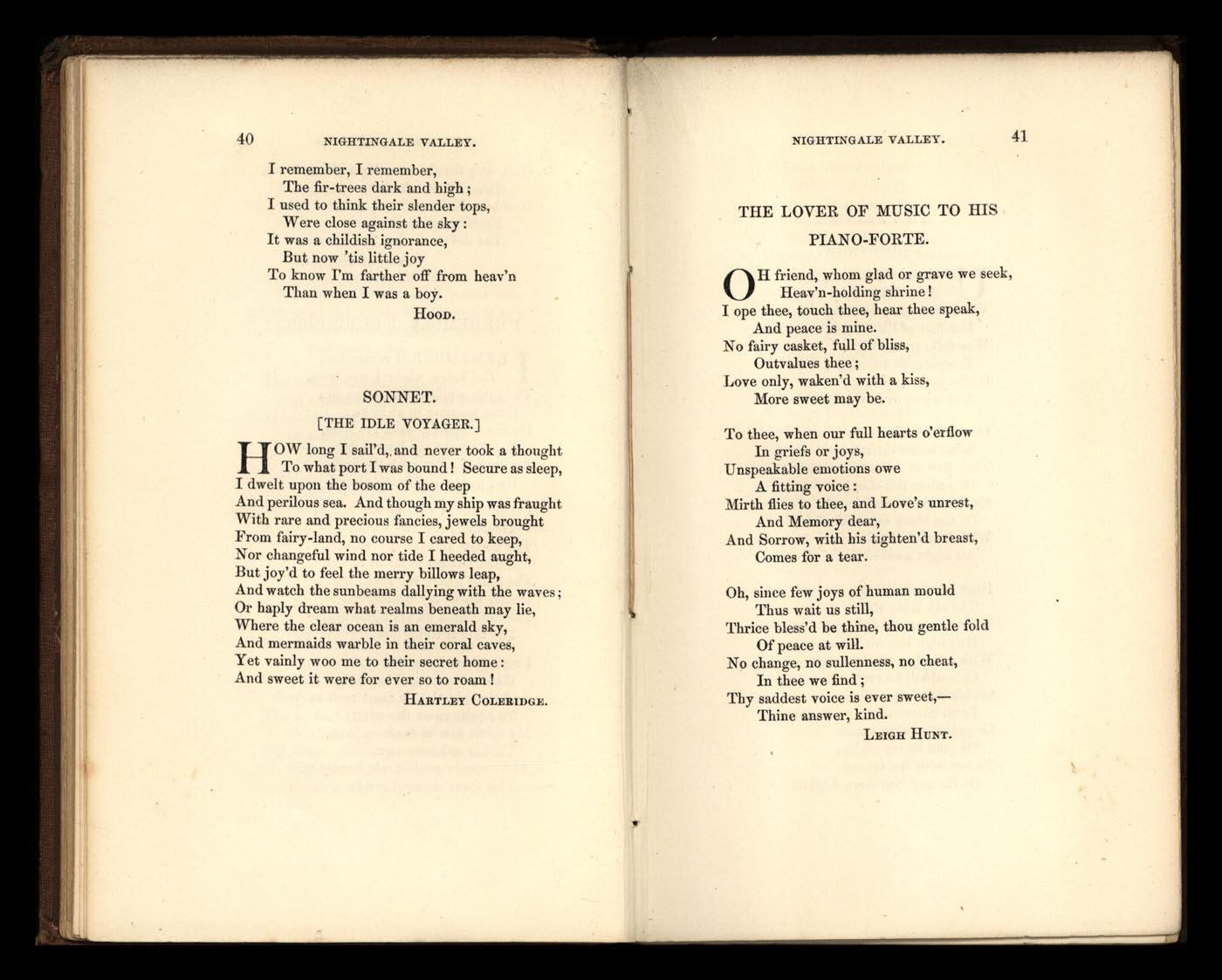
[THE IDLE VOYAGER.]
HOW long I sail'd, . and never took a thought
To what port I was bound! Secure as sleep, I dwelt upon the bosom of the deep And perilous sea. And though my ship was fraught With rare and precious fancies, jewels brought From fairy-land, no course I cared to keep, Nor changeful wind nor tide I heeded aught, But joy'd to feel the merry billows leap, And watch the sunbeams dallying with the waves; Or haply dream what realms beneath may lie, Where the clear ocean is an emerald sky, And mermaids warble in their coral caves, Yet vainly woo me to their secret home: And sweet it were for ever so to roam!
HARTLEY COLERIDGE.
NIGHTINGALE VALLEY.
THE LOVER OF MUSIC TO HIS PIANO·FORTE.
OH friend, whom glad or grave we seek, Heav'n - holding shrine!
I ope thee, touch thee, hear thee speak, And peace is mine.
No fairy casket, full of bliss, Outvalues thee; Love only, waken'd with a kiss, More sweet may be.
To thee, when our full hearts o'erflow In griefs or joys, Unspeakable emotions owe A fitting voice:
Mirth flies to thee, and Love's unrest, And Memory dear, And Sorrow, with his tighten'd breast, Comes for a tear.
Oh, since few joys of human mould Thus wait us still, Thrice bless'd be thine, thou gentle fold Of peace at will. No change, no sullenness, no cheat, In thee we find; Thy saddest voice is ever sweet,Thine answer, kind.
LEIGH HUNT.
THE FAIRIES.
A CHILD'S SONG.
UP the airy mountain, Down the rushy glen, We daren't go a-hunting
For fear of little men; Wee folk, good folk, Trooping all together; Green jacket, red cap, And white owl's feather!
Down along the rocky shore
Some make their home, They live on crispy pancakes Of yellow tide-foam; Some in the reeds Of the black mountain-lake, With frogs for their watch-dogs, All night awake.
High on the hill-top
The old King sits; He is now so old and gray He's nigh lost his wits. With a bridge of white mist Columbkill he crosses, On his stately journeys
From Slieveleague to Rosses ; Or going up with music On cold starry night s, To sup with the Queen Of the gay Northern Lights.
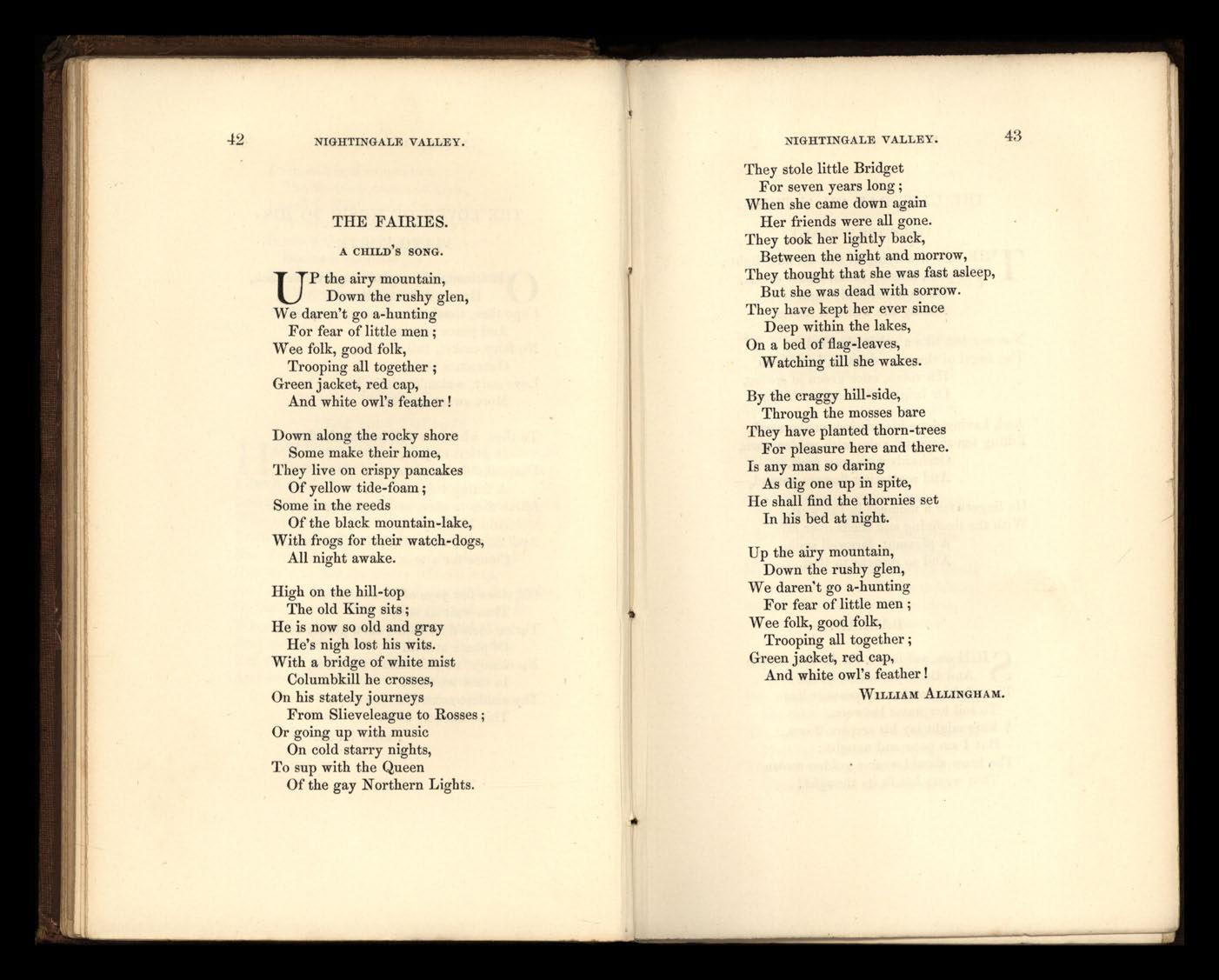
NIGHTINGALE VALLEY.
They stole little Bridget For seven years long; When she came down again Her friends were all gone. They took her lightly back, Between the night and morrow, They thought that she was fast asleep, But she was dead with sorrow. They have kept her ever since D eep within the lakes, On a bed of flag-leaves, Watching till she wakes.
By the craggy hill-side, Through the mosses bare They have planted thorn-trees For pleasure here and there. Is any man so daring As dig one up in spite, He shall find the thornies set In his bed at night.
Up the airy mountain, Down the rushy glen, We daren't go a-hunting For fear of little men; Wee folk, good folk, Trooping all together; Green jacket, red cap, And white owl's feather!
'VILLIAM ALLINGHAM.
NIGHTINGALE VALLEY.
THE year lies dying in this evening light;
The poet, musing in autumnal woods, Hears melancholy sighs
Among the wither'd leaves.
Not so: but like a spirit glorified
The angel of the year departs, lays down His robes, once green in spring, Or bright with blue;
And, having done his mission on the earth, Filling ten thousand vales with golden corn, Orchards with rosy fruit, And scattering flowers around,-
He lingers for a moment in the west, With the declining sun sheds over all A pleasant, farewell smile, And so returns to God.
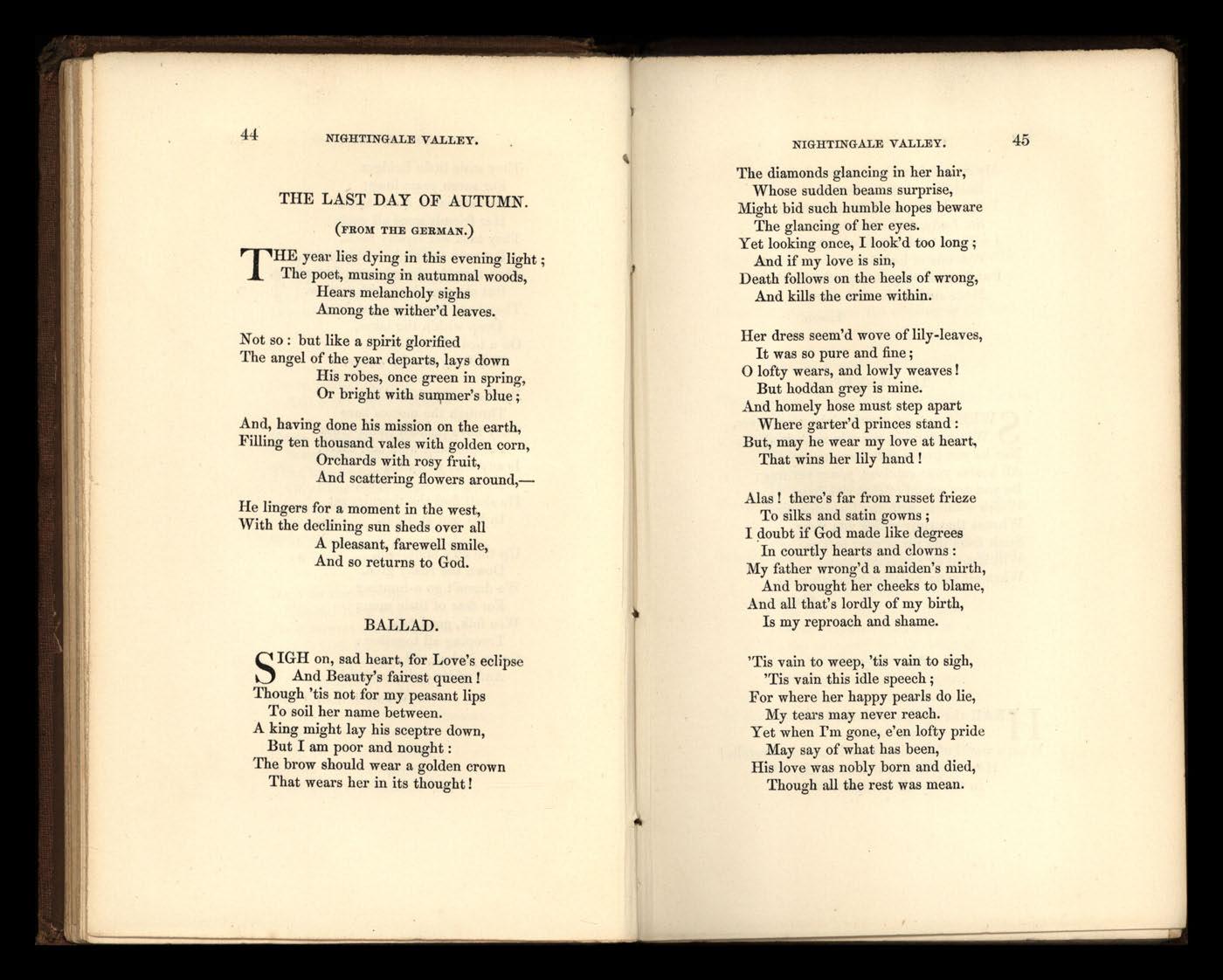
SIGH on, sad heart, for Love's eclipse And Beauty's fairest queen !
Though 'tis not for my peasant lips
To soil her name between.
A king might lay his sceptre down, But I am poor and nought: The brow should wear a golden crown That wears her in its thought!
NIGHTINGALE VALLEY.
The diamonds glancing in her hair, Whose sudden beams surprise, Might bid such humble hopes beware
The glancing of her eyes
Yet looking once, I look'd too long; And if my love is sin, Death follows un the heels of wrong, And kills the crime within.
Her dress seem'd wove of lily-leaves, It was so pure and fine; o lofty wears, and lowly weaves! But hoddan grey is mine. And homely hose must step apart Where garter'd princes stand: But, may he wear my love at heart, That wins her lily hand!
Alas! there's far from russet frieze To silks and satin gowns; I doubt if God made like degrees .In courtly hearts and clowns: My father wrong'd a maiden's mirth, And brought her cheeks to blame, And all that's lordly of my birth, Is my reproach and shame.
'Tis vain to weep, 'tis vain to sigh, 'Tis vain this idle speech; For where her happy pearls do lie, My tears may never reach.
Yet when rm gone, e'en lofty prid e May say of what has been, His love was nobly born and died, Though all the rest was mean.
46

NIGHTINGALE VALLEY.
My speech is rude, but speech is weak
Such love as mine to tell ;
Yet, had I words, I dare not speak : So, Lady, fare thee well!
I will not wish thy better state
Was one oflow degree, But I must weep that partial fat e
Made such a churl of me.
HOOD.
NIGHTINGALE YALLEY.
While the stars that over-sprinkle
All the heavens, seem to twinkle With a crystalline delight; Keeping time, time, time, In a sort of Runic rhyme,
To the tintinabulation that so musically wells
From the bells, bells, bells, bells, Bells, bells, bells,
From the jingling and the tinkling of the bells.
ll.
be not proud of those two eyes,
Which star-like sparkle in their skies; Nor be you proud that you can see All hearts your captives, yours yet free ; Be you not proud of that rich hair
Which wantons with the love-sick air : Whenas that ruby which you wear, Sunk from the tip of your soft ear, Will last to be a precious stone
When all your world of beauty's gone . HERRICK.
THE BELLS. I
HEAR the sledges with the bellsSilver bells!
What a world of merriment their melody foretells!
How they tinkle, tinkle, tinkle, In the icy air of night!
47
Hear the mellow wedding bells, Golden bells!
What a world of happiness their harmony fortell s !
Through the balmy air of night
How they ring out their delight!
From the molten -golden notes, And all in tune, What a l iquid ditty floats
To the turtle-dove that listens, while she gloat s On the moon!
Oh, from out the sounding cells,
"What a gush of euphony voluminously well s !
How it swells!
How it dwells
On the Future! how it tells Of the rapture that impels
To the swinging and the ringing
Of the bells, bells, bells, Of the bells, bells, bells, bells, Bells, bells, bells,-
To the rhyming and the chiming of the b ell s !
Ill.
Hear the lOud alarum bellsBrazen bells!
4-8
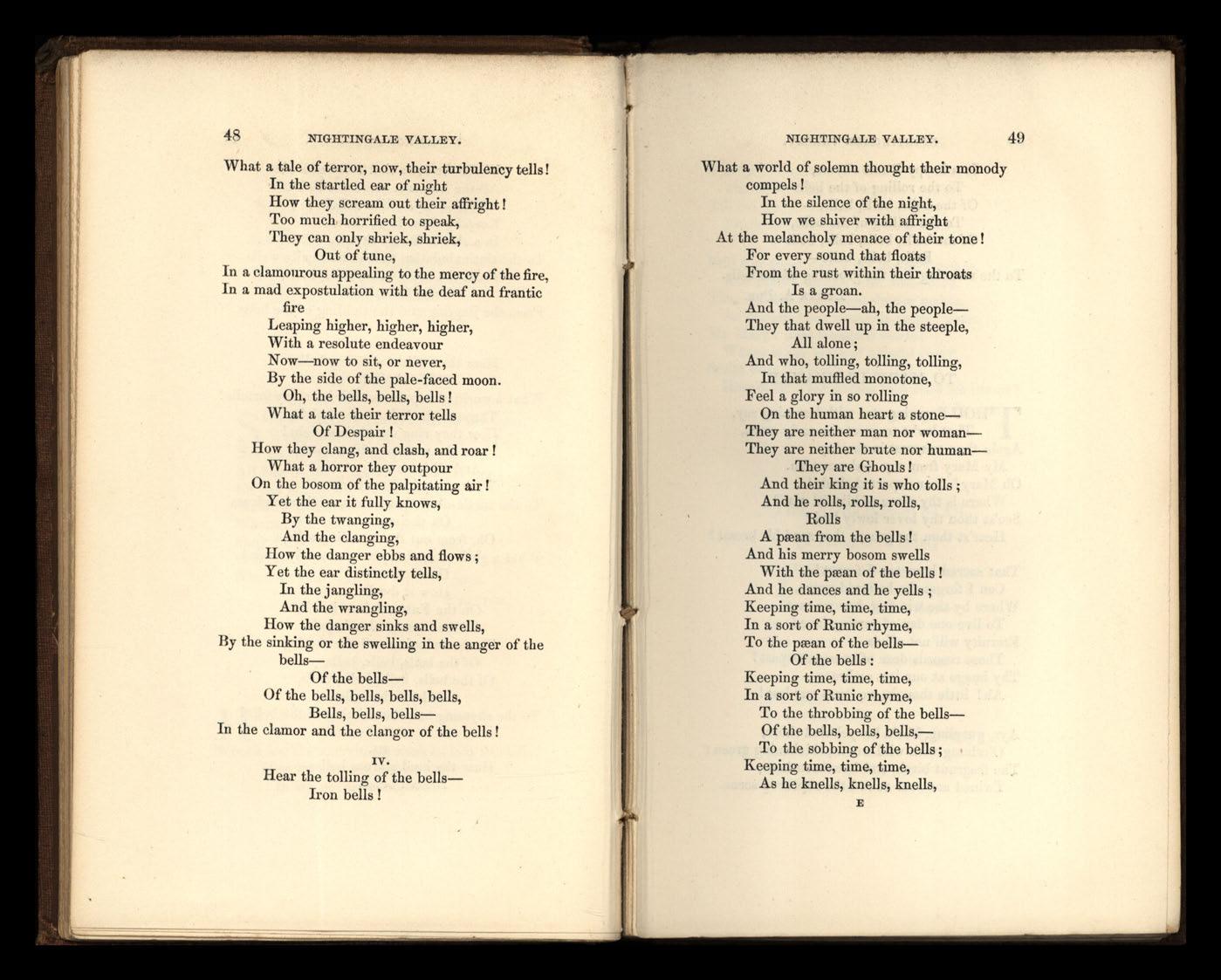
NIGHTINGALE VALLEY.
What a tale of terror, now, their turbulency tells!
In the startled ear of night
How they scream out their affright I
Too much horrified to speak,
They can only shriek, shriek, Out of tune,
!n a clamollrous appealing to the mercy of the fire,
In a mad expostulation with the deaf and frantic fire
Leaping higher, higher, higher, 'Vith a resolute endeavour
Now-now to sit, or never,
By the side of the pale-faced moon.
Oh, the bells, bells, bells!
What a tale their terror tells
Of Despair I
How they clang, and clash, and roar I
What a horror they outpour
On the bosom of the palpitating air!
Yet the ear it fully knows,
By the twanging,
And the clanging,
How the danger ebbs and flows;
Yet the ear distinctly tells,
In the jangling,
And the wrangling,
How the danger sinks and swells,
By the sinking or the swelling in the anger of the bells-
Of the bells-
Of the bells, bells, bells, bells, Bells, bells, bells-
In the clamor and the clangor of the bells!
IV.
Hear the tolling of the belJsIron bells!
NIGHTINGALE VALLEY.
What a world of solemn thought their monody compels!
In the silence of the night,
How we shiver with affright
At the melancholy menace of their tone!
For every sound that floats
From the rust within their throats
Is a groan.
And the people-ab, the peopleThey that dwell up in the steeple, All alone;
And who, tolling, tolling, tolling,
In that muffled monotone,
Feel a glory in so rolling
On the human heart a stone-
They are neither man nor womanThey are neither brute nor human-
They are Ghouls!
And their king it is who tolls;
And he rolls, rolls, rolls, Rolls
A plllan from the bells!
And his merry bosom swells
With the plllan of the bells!
And he dances and he yells ;
Keeping time, time, time, In a sort of Runic rhyme,
To the plllan of the bells-
Of the bells:
Keeping time, time, time,
In a sort of Runic rhyme,
To the throbbing of the bells-
Of the bells, bells, bells,-
To the sobbing of the bells;
Keeping time, time, time,
As he knells, knells, knells, E
50 NIGHTINGALE VALLEY.
In a happy Runic rhyme,
To the rolling of the bells-
Of the bells, bells, bells,-
To the toning of the bells,
Of the bells, bells, bells, bellsBells, bells, bells'l'o the moaning and the groaning of the bells.
EDGAR A. POE.
THOU lingering star with lessening ray,
That lov'st to greet the early morn, Again thou usherest in the day
My Mary from my soul was torn.
Oh Mary I dear departed shade!
Where is thy place of blissful rest jl
See'st thou thy lover lowly laid? thou the groans that rend his breast?
That sacred hour can I forget !-
Can I forget the hallow'd grove, Where by the Ayr we met
To live one day of parting love!
Eternity will not efface
Those records dear of transports past!
Thy image at our last embrace-
Ah! little thought we 'twas our last!
Ayr, gurgling, kiss'd his pebbled shore, O'erhung with wild woods, thickening green; The fragrant birch, and hawthorn hoar, Twined amorous round the raptured scene.
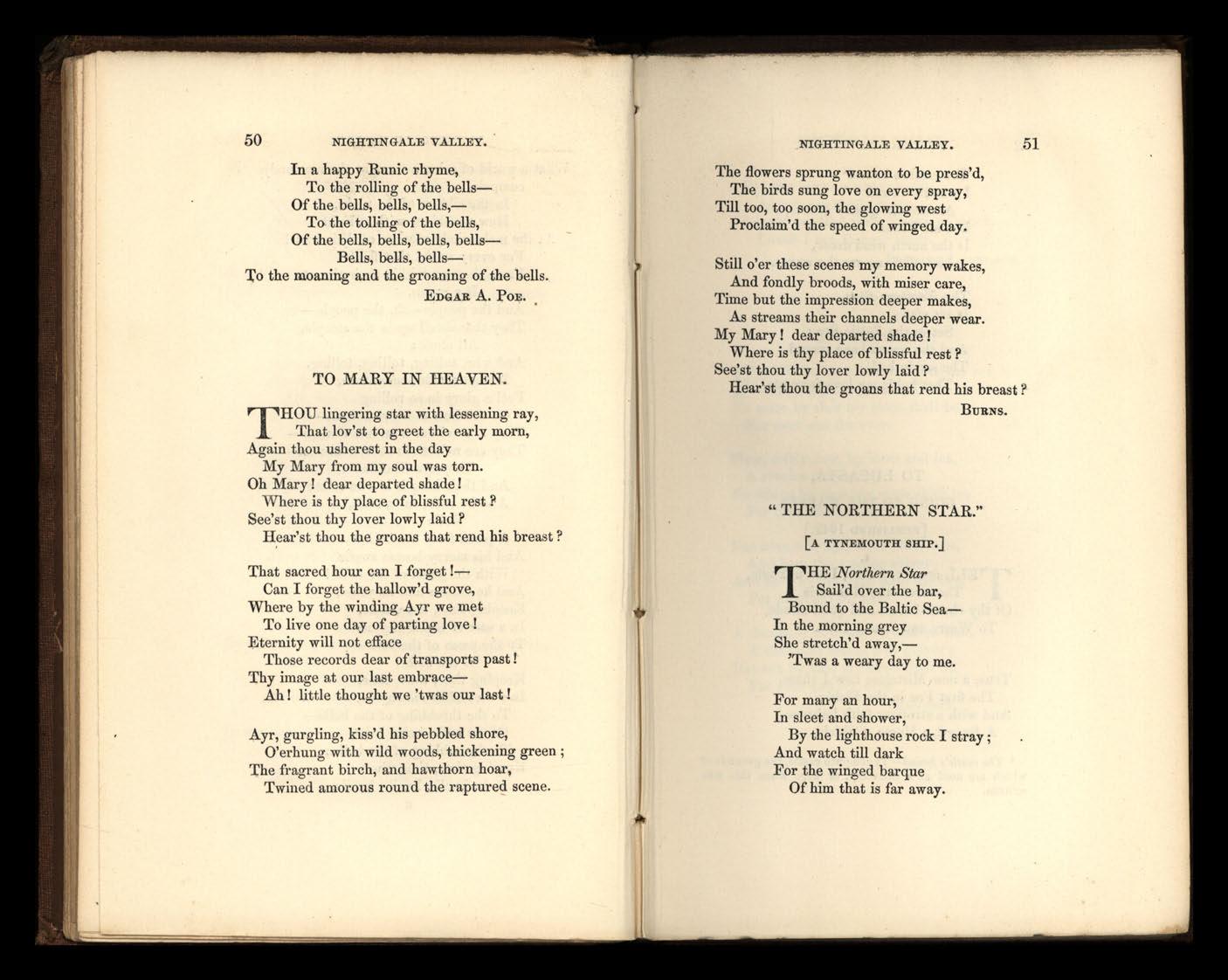
NIGHTINGALE VALLEY.
The flowers sprung wanton to be press'd,
The birds sung love on every spray, Till too, too soon, the glowing west
Proc1aim'd the speed of winged day.
Still o'er these scenes my memory wakes,
And fondly broods, with miser care, Time but the impression deeper makes,
As streams their channels deeper wear.
My Mary! dear departed shade!
Where is thy place of blissful rest l'
See'st thou thy lover lowly laid l'
Hear'st thou the groans that rend his breast l' BURNS.
"THE NORTHERN STAR."
[A TYNEMOUTH SHIP.]
THE Northern Star
SaiI'd over the bar,
Bound to the Baltic SeaIn the morning grey
She stretch'd away,'Twas a weary day to me.
For many an hour, In sleet and shower, By the lighthouse rock I stray; And watch till dark
For the winged barque
Of him that is far away.
52 NIGHTINGALE VALLEY.
The castle's bound 1 I wander round Amidst the grassy graves , But all I hear Is th e north wind drear, And all I see are the waves.
Th e North ern Star I s set afar S et in the Baltic Sea; And the wave s have spread The sandy bed That hold s my love from me.
GOIN G TO THE W ARRES . [PUBLISHED 1649.J
I.
TELL me not, Sweet, I am unkinde, Th at from th e N unnerie
Of thy chast e bre as t and quiet minde, T o VV' arre and Armes I flie.
11.
True, a new Mi stresse now I chase, The fir st Foe in the Field j And with a stronger fa it.h imbrace A Sword, a Horse, a Shield.
I. The ca stle's bound-Tyn emouth castle, the ground s of whIch are used as a cemetery, or were when thi s wa s wr itte n.
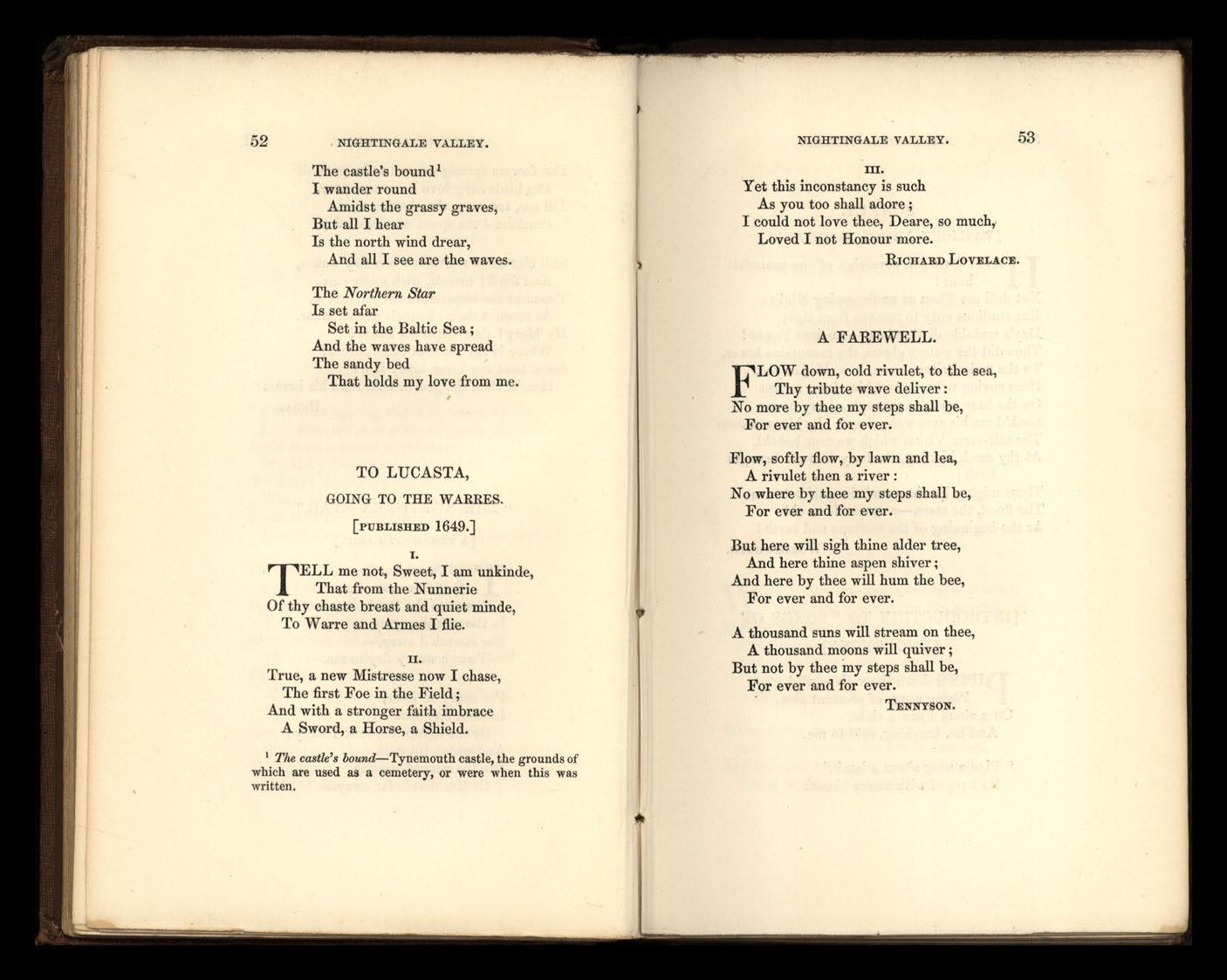
NIGHTINGALE VALLEY.
Ill.
Yet this inconstancy is such As you too sh all adore j I could not love thee, Deare, so much , Loved I not Honour more.
RICHARD
LOVELACE . A FAREWELL.
FLOW down, cold rivulet, to th e sea, Thy tribute wave deliver: No more by thee my steps shall be, For ever and for ever.
Flow, softly flow, by lawn and lea, A rivulet then a river: Nowhere by thee my steps sh all b e, For ever and for ever.
But here will si gh thine alder tree, And h ere thine aspen shiv er; And here by thee will hum the bee, For ever and for ever
A thousand suns will stream on thee, A thousand moons will quiv er j But not by thee my steps shall be, For ever and for ever.
TENNysoN.
54
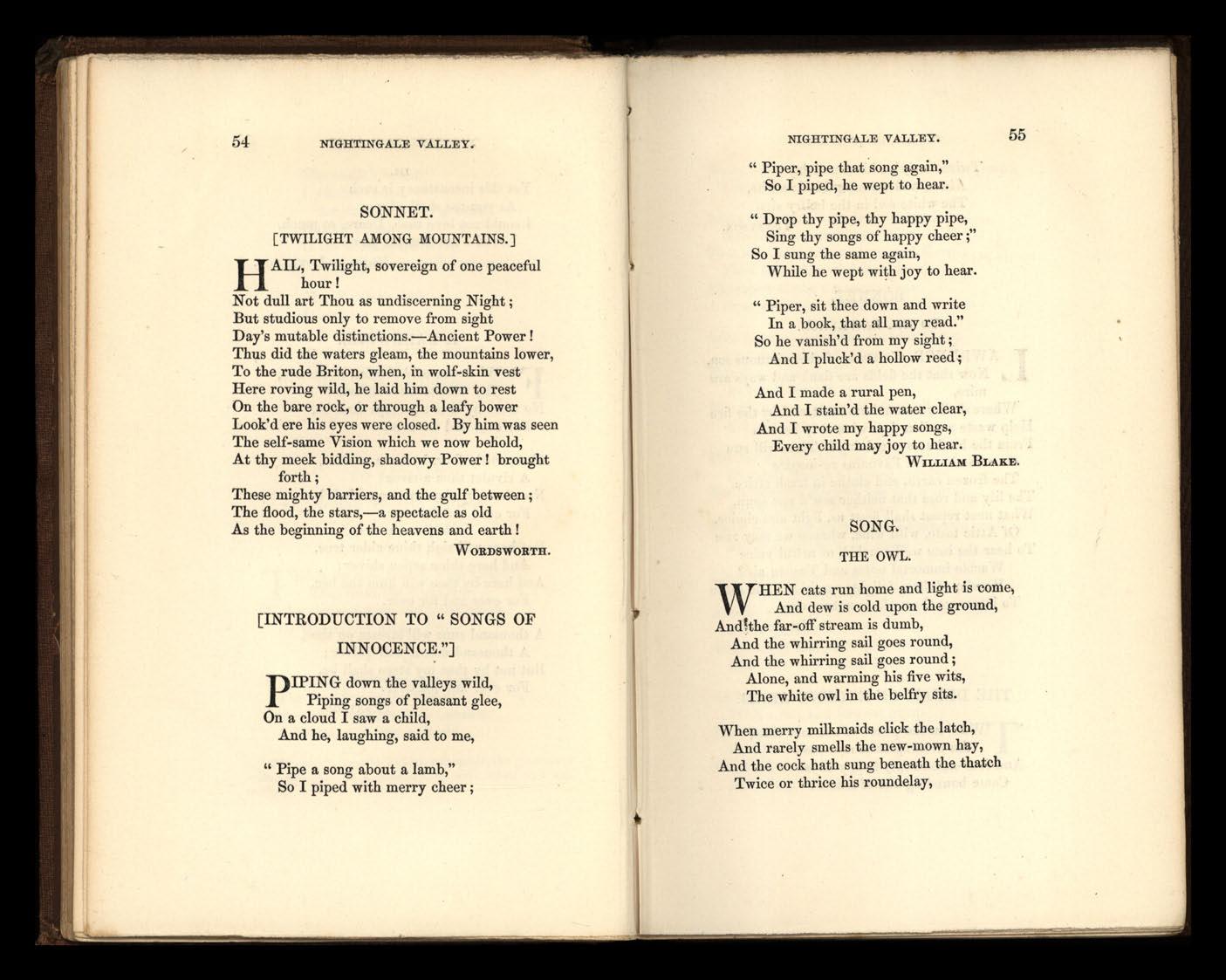
NIGHTINGALE VALLEY. SONNET.
[TWILIGHT AMONG MOUNTAINS.]
HAIL, Twilight, sovereign of one peaceful hour!
Not dull art Thou as undiscerning Night; But studious only to remove from sight Day's mutable distinctions.-Ancient Power!
Thus did the waters gleam, the mountains lower,
To the rude Briton, when, in wolf-skin vest
Here roving wild, he laid him down to rest
On the bare rock, or through a leafy bower
Look'd ere his eyes were closed. By him was seen
The self-same Vision which we now behold, At thy meek bidding, shadowy Power! brought forth;
These mighty barriers, and the gulf between; The flood, the stars,-a spectacle as old
As the beginning of the heavens and earth!
W ORDSWORTH
[INTRODUCTION TO " SONGS OF INNOCENCE."]
down the valleys wild, Piping songs of pleasant glee,
On a cloud I saw a child, And he, laughing, said to me,
" Pipe a song about a lamb," So I piped with merry cheer;
NIGHTINGALE VALLEY.
" Piper, pipe that ·song again," So I piped, he wept to hear.
" Drop thy pipe, thy happy pipe, Sing thy songs of happy cheer ;" So I sung the same again, While he wept with joy to hear.
" Piper, sit thee down and write In a book, that all may read." So he vanish'd froin my sight; And I pluck'd a hollow reed,
And I made a rural pen, And I stain'd the water clear, And I wrote my happy songs, Every child may joy to hear.
WILLIAM BLAKE
WSONG.
THE OWL.
HEN cats run home and light is come\ And dew is cold upon the ground, Andhhe far-off stream is dumb, the whirring sail goes round, And the whirring sail goes round; Alone, and warming his five wits, The white owl in the belfry sits.
When merry milkmaids click the latch, And rarely smells the new-mown hay, And the cock hath sung beneath t.he thatch Twice or thrice his roundelay,
56
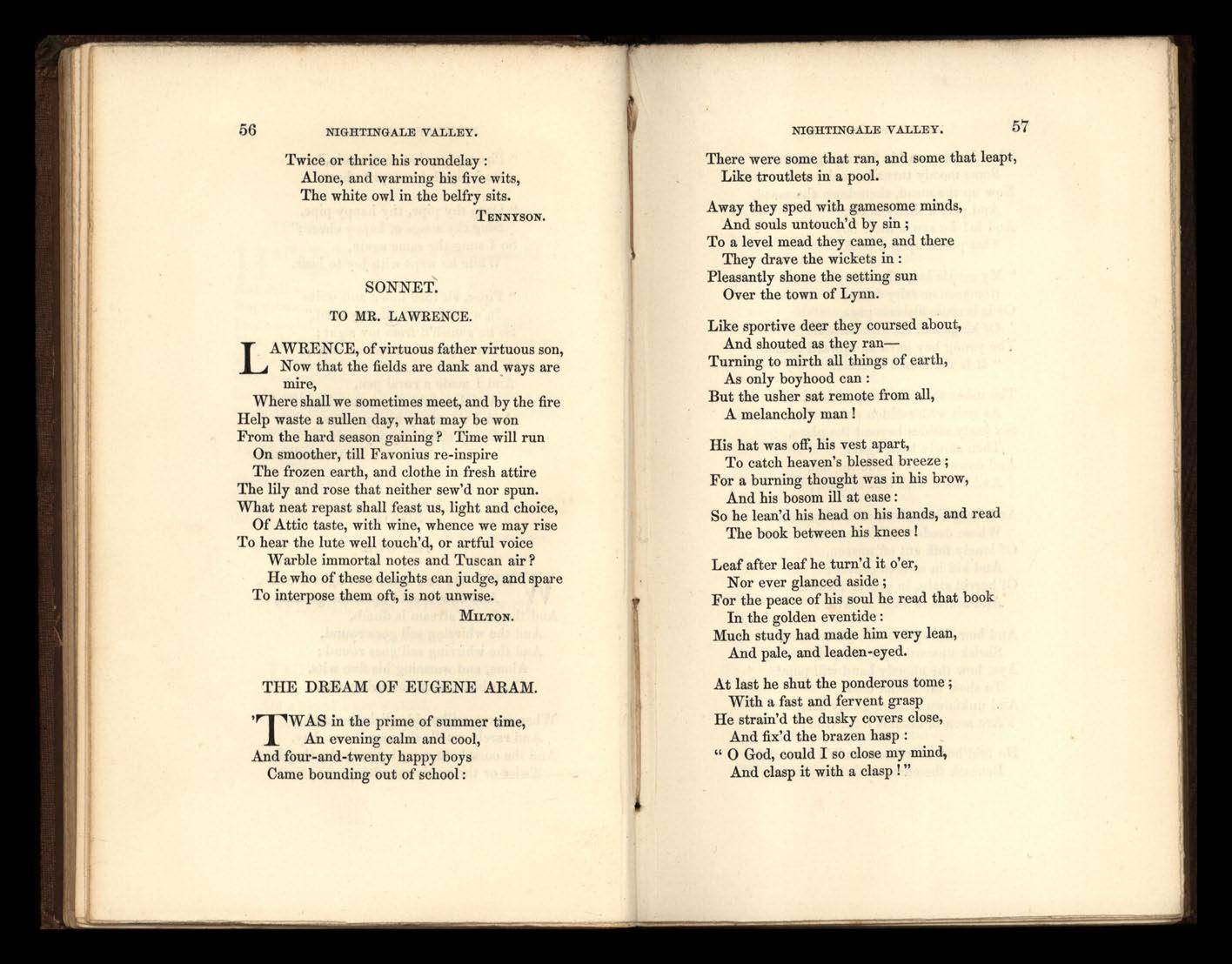
NIGHTINGALE VALLEY.
Twice or thrice his roundelay : Alone, and warming his five wits, The white owl in the belfry sits.
TENNysoN.
TO MR. LAWRENCE.
LAWRENCE, of virtuous father virtuous son,
Now that the fields are dank and ways are mire, .
Where shall we sometimes meet, and by the fire
Help waste a sullen day, what may be won
From the hard season gaining? Time will run On smoother, till Favonius re-inspire
The frozen earth, and clothe in fresh attire
The lily and rose that neither sew'd nor spun. What neat repast shall feast us, light and choice, Of Attic taste, with wine, whence we may rise
To hear the lute well touch'd, or artful voice
Warble immortal notes and Tuscan air?
He who of these delights can judge, and spare To interpose them oft, is not unwise.
MILTON.
THE DREAM OF EUGENE ARAM.
AS in the prime of summer time, An evening calm and cool, And four-and-twenty happy boys Came bounding out of school:
NIGHTINGALE VALLEY. 57
There were some that ran, and some that leapt, Like troutlets ill a pool.
Away they sped with gamesome minds, And souls untouch'd by sin; To a level mead they came, and there
They drave the wickets in :
Pleasantly shone the setting sun
Over the town of Lynn.
Like sportive deer they coursed about, And shouted as they ran-
Turning to mirth all things of earth,
As only boyhood can:
But the usher sat remote from all, A melancholy man!
His hat was off, his vest apart,
To catch heaven's blessed bre eze; For a burning thought was in his brow, And his bosom ill at ease:
So he lean'd his head on his hands, and read
The book between his knees!
Leaf after leaf he turn'd it o'er, Nor ever glanced aside; For the peace of his soul he read that book
In the golden eventide:
Much study had made him very lean, And pale, and leaden-ey ed
At last he shut the ponderous tome; With a fast and fervent grasp
He strain'd the dusky covers close, And fix'd the brazen hasp:
" 0 God, could I so close my mind, And clasp it with a clasp! ..
NIGHTINGALE VALLEY.
Then leaping on his feet upright, Some moody turns he took; Now up the mead, then down the mead, And past a shady nook: And lo! he saw a little boy That pored upon a book!
" My gentle lad, what is't you readRomance or fairy fable?
Or is it some hist.oric page, Of kings and crowns unstable?"
The young boy gave an upward glance" It is the Death of Abel."
The usher took six hasty strides, As smit with sudden pain; Six hasty strides beyond the place. Then slowly back again: And down he sat beside the lad, And talk'd with him of Cain;
And, long since then, of bloody men, Whose deeds tradition saves; Of lonely folk cut off unseen, And hid in sudden graves; Of horrid stabs, in groves forlorn, And murders done in caves;
And how the sprites of injured men Shriek upward from the sodAye, how the ghostly hand will point To show the burial clod; And unknown facts of guilty acts Are seen in dreams from God!
He told how murderers walk'd the earth Beneath the curse of Cain-
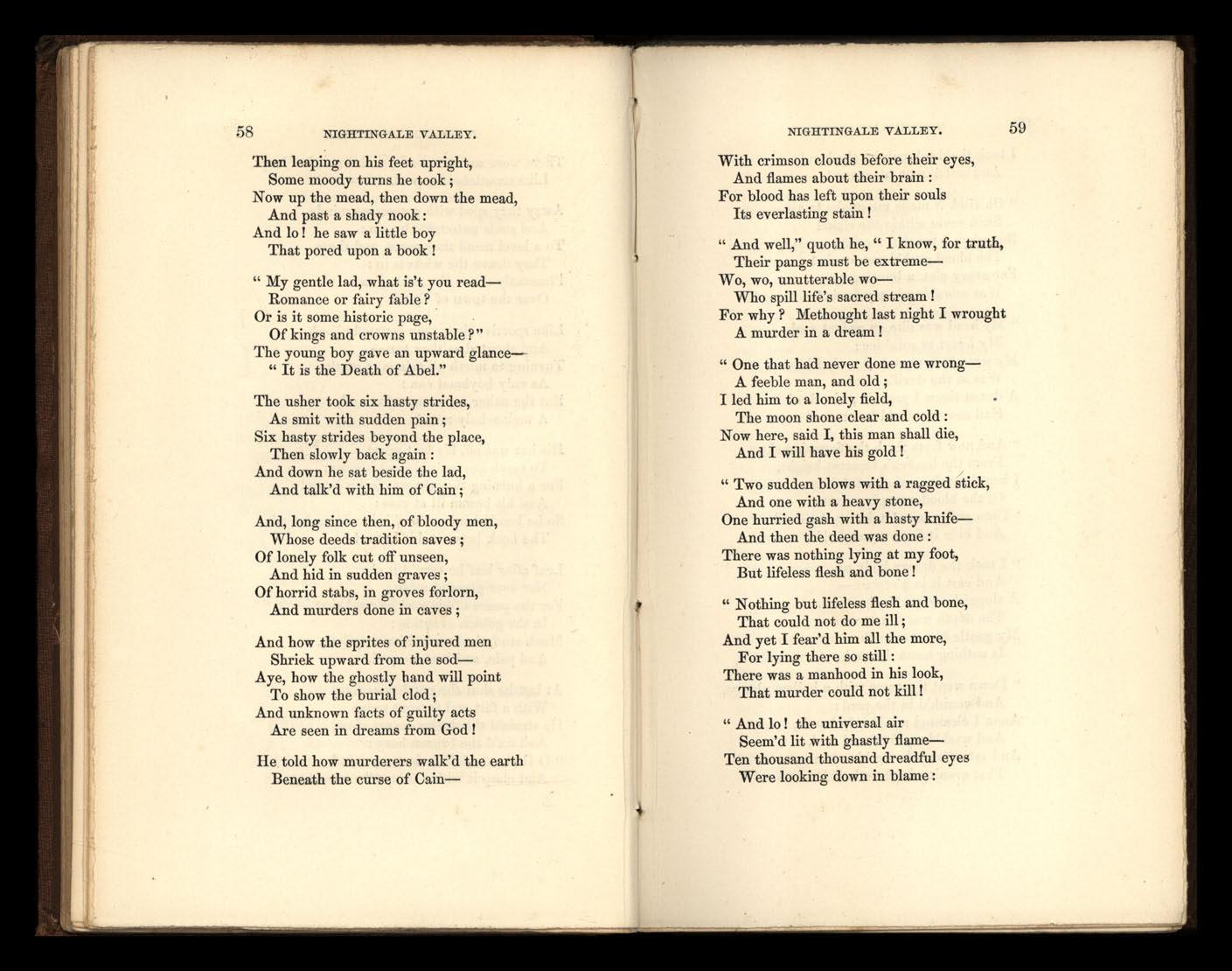
NIGHTINGALE VALLEY.
With crimson clouds before their eyes, And flames about their brain: For blood has left upon their souls Its everlasting stain!
" And well," quoth he, " I know, for truth, Their pangs must be extremeWo, wo, unutterable woWho spill life's sacred stream ! For why? Methought last night I wrought A murder in a dream!
" One that had never done me wrongA feeble man, and old; I led him to a lonely field, The moon shone clear and cold: Now here, said I, this man shall die, And I will have his gold!
" Two sudden blows with a ragged stick, And one with a heavy stone, One hurried gash with a hasty knifeAnd then the deed was done: There was nothing lying at my foot, But lifeless flesh and bone!
" Nothing but lifeless flesh and bone, That could not do me ill; And yet I fear'd him all the more, For lying there so still : There was a manhood in his look, That murder could not kill !
" And lo! the universal air Seem'd lit with ghastly flameTen thousand thousand dreadful eyes Were looking down in blame:
NIGHTINGALE VALLEY.
I took the dead man by the hand, And call'd upon his name!
" Oh God, it made me quake to see Such sense within the slain ! But when I touch'd the lifeless clay, The blood gush'd out amain! For every clot, a burning spot Was scorching in my brain!
" My head was like an ardent coal, My heart as solid ice; My wretched, wretched soul, 1; knew, Was at the devil's price: A dozen times I groan'd; the dead Had never groan'd but twice!
" And now from forth the frowning sky, From the heaven's topmost height, I heard a voice-the awful voice Of the blood-avenging sprite: , Thou guilty man! take up thy dead, And hide it from my sight! '
" I took the dreary body up, And cast it in a streamA sluggish water, black as ink, The depth was so extreme. My gentle boy, remember this Is nothing but a dream I
" Down went the corse with a hollow plunge, And vanish'd in the pool; Anon I cleansed my bloody hands, And wash'd my forehead cool, And sat among the urchins young That evening in the school!
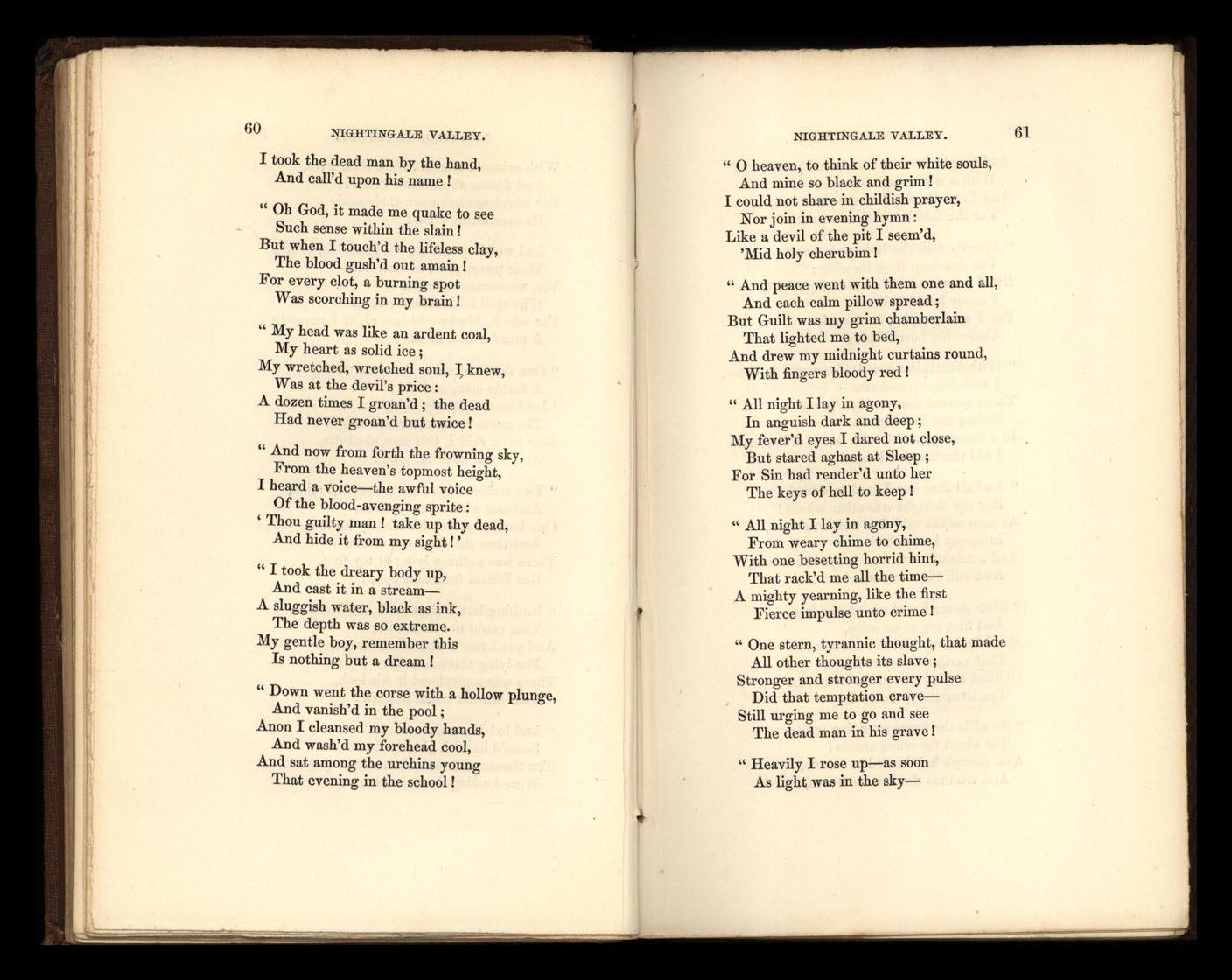
NIGHTINGALE VALLEY.
" 0 heaven, to think of their white souls, And mine so black and grim ! I could not share in childish prayer, Nor join in evening hymn: Like a devil of the pit I seem'd, 'Mid holy cherubim!
" And peace went with them one and all, And each calm pillow spread; But Guilt was my grim chamberlain That lighted me to bed, And drew my midnight curtains round, With fingers bloody red!
" .All night I lay in agony, In anguish dark and deep; My fever'd eyes I dared not close, But stared aghast at Sl eep; For Sin had render'd unto her The keys of hell to keep!
" All night I lay in agony, From weary chime to chime, With one besetting horrid hint, That rack'd me all the timeA mighty yearning, like first Fierce impulse unto crIme I
" One stern, tyrannic thought, that made .All other thoughts its slave; Stron!Yer and stronger every pulse Did that temptation craveStill urging me to go and see The dead man in his grave!
" Heavily I rose up-as soon As light was in the sky-
62
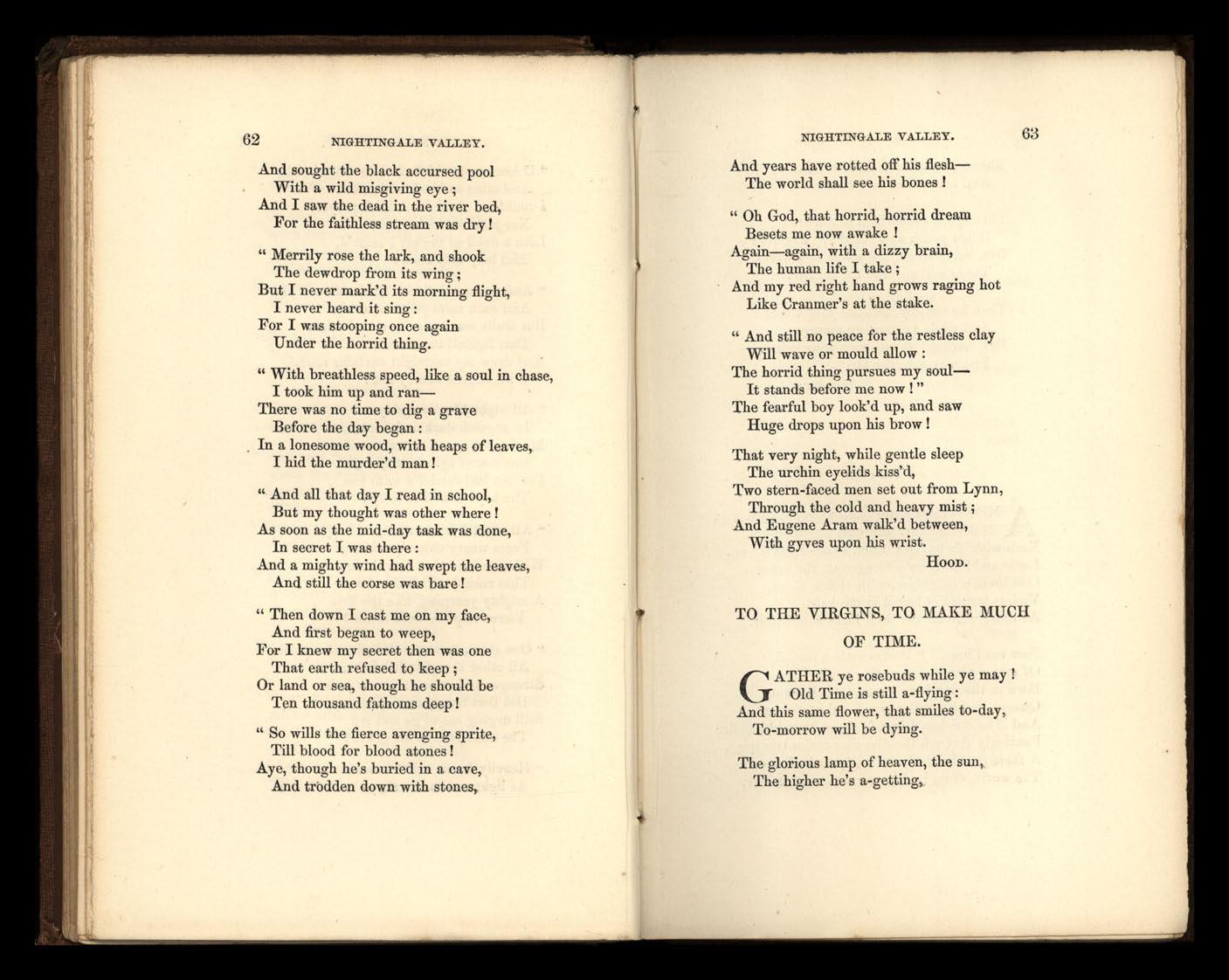
NIGHTINGALE VALLEY.
And sought the black accursed pool
With a wild misgiving eye;
And I saw the dead in the river bed For the faithless stream was dry! '
" Merrily rose the lark, and shook The dewdrop from its wing;
But I never mark'd its morning flight, I never heard it sing: For I was stooping once again
Under the horrid thing.
" With speed, like a soul in chase, I took hun up and ran-
There was no time to dig a grave
Before the day began:
In a lonesome wood, with heaps of leaves I hid the murder'd man! '
" And all that day I read in school, But my thought was other where!
As soon as the mid-day task was done, In secret I was there:
And a mighty wind had swept the l eaves, And still the corse was bare!
" Then down I cast me on my face, And first began to weep, For I knew my secret then was one That earth refused to keep; Or land or sea, though he should be Ten thousand (athoms deep!
" So wills the fierce avenging sprite, Till blood for blood atones!
Aye, though he's buried in a cave, And trodden down with stones.
NIGHTINGALE VALLEY.
And years have rotted off his fleshThe world shall see his bones !
" Oh God, that horrid, horrid dream Besets me now awake ! Again-again, with a dizzy brain, The human life I take; And my red right hand grows raging hot Like Cramner's at the stake.
" And still no peace for the restless clay
Will wave or mould allow:
The horrid thing pursues my souIIt stands before me now! n
The fearful boy look'd up, and saw Huge drops upon his brow!
That very night, while gentle sleep
The urchin eyelids kiss'd,
Two stern -faced men set out from Lynn, Through the cold and heavy mist; And Eugene Aram walk'd between, With gyves upon his wrist. HOOD.
GATHER ye rosebuds while ye may t Old Time is still a-flying:
And this same flower, that smiles to-day, To-morrow will be dying.
The glorious lamp of heaven, the sun"
The higher he's
64-
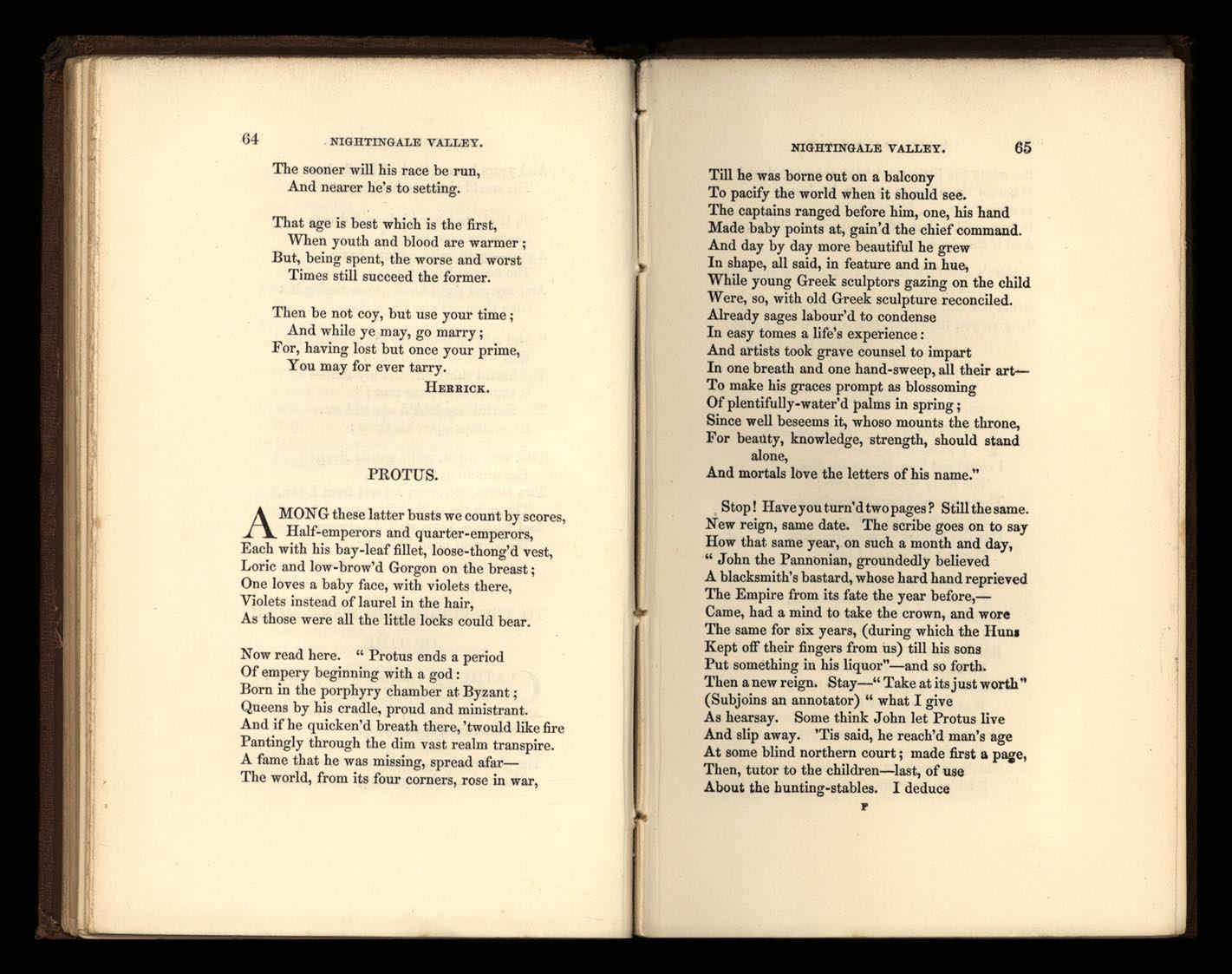
NIGHTINGALE VALLEY.
The sooner will his race be run , And nearer h e's to setting.
That age is best which is the first, When youth and blood ar e warmer; But, being spent, the worse and worst Times still succeed the former.
Then be not coy, but use your time; And while ye may, go marry; For, having lost but once your prime, You may for ever tarry.
HERRICK.
AMON G these latter busts we count by scores, Half-emperors and quarter-emperors, Each with his bay -l eaf fillet, loo se -thong'd vest, Loric and low-brow'd Gorgon on the breast; One loves a baby face, with violets there, Violets instead of l aurel in the hair, As t hose were all the littl e lo cks could bear.
Now read here. "Protu s end s a period Of empery beginning with a god : Born in the porphyry chamber at Byzant ; Queens by his cradle, proud and ministrant. And if he quicken'd breath there, 'twould like fire Pantingly through the dim vast realm transpire. A fame that he was missing, spread afarThe world, from its four corners, rose in war,
NIGHTINGALE VALLEY.
Till he was borne out on a balcony
To pacify the world when it should see.
The captains ranged before him, one, his hand
Made baby points at, gain'd the chief command.
And day by day more beautiful he grew
In shape, all said, in feature and in hue,
While young Gre ek sculptors gazing on the child
Were, so, with old Greek sculpture reconcil ed.
Already sages labour'd to condense
In easy tome s a life's experience:
And artists took grave counsel to impart
In one breath and one hand-swe ep, all their art-
To make his graces prompt as blossoming
Of plentifully-water'd palms in spring;
Since well beseems itl whoso mounts the throne,
For beauty, knowledge, strength, should stand alon e,
And mortals love the letters of his name."
Stop! Have you turn' d two pages? Still the same.
New reign, same date. The scribe goes on to say
How that same year, on such a month and day,
" John the Pannonian, groundedly believed
A blacksmith's bastard, whose hard hand reprieved
The Empire from its fate the year before,-
Came, had a mind to take the crown, and wore
The same for six years, (during which the Hun.
Kept off their fingers from us) till his sons
Put something in his liquor"-and so forth .
Then a new reign Stay-" Take at its just worth"
(Subjoins an annotator) " what I give
As hearsay. Some think John let Protus live
And slip away. 'Tis said, he reach'd man's age
At some blind northern court; made first a
Then, tutor to the children-last, of use
About the bunting-stables. I deduce p
VALLEY.
He wrote the little tract' On worming dogs,' Whereof the name in sundry catalogues Is extant yet. A Protus of the Race Is rumour'd to have died a monk in Thrace,And if the same, he reach'd senility."
Here's John the smith's rough-hammer'd
Great eye, Gross jaw and griped lips do what granite can To give yOU the crown-grasper. What a man!
ROBERT
BROWNING.
IWANDER'D by the brook-side, I wander'd by the mill,-
I could not hear the brook flow, The noisy wheel was still ; There was no burr of grasshopper, No chirp of any bird;
But the beating of my own heart
Was all the sound I heard.
I sat beneath the elm-tree, I watch'd the long, long shade, And as it grew still longer - I did not feel afraid; For I listen'd for a footfall, I listen'd for a word,-
. But the beating of my own heart
Was all the sound I heard.
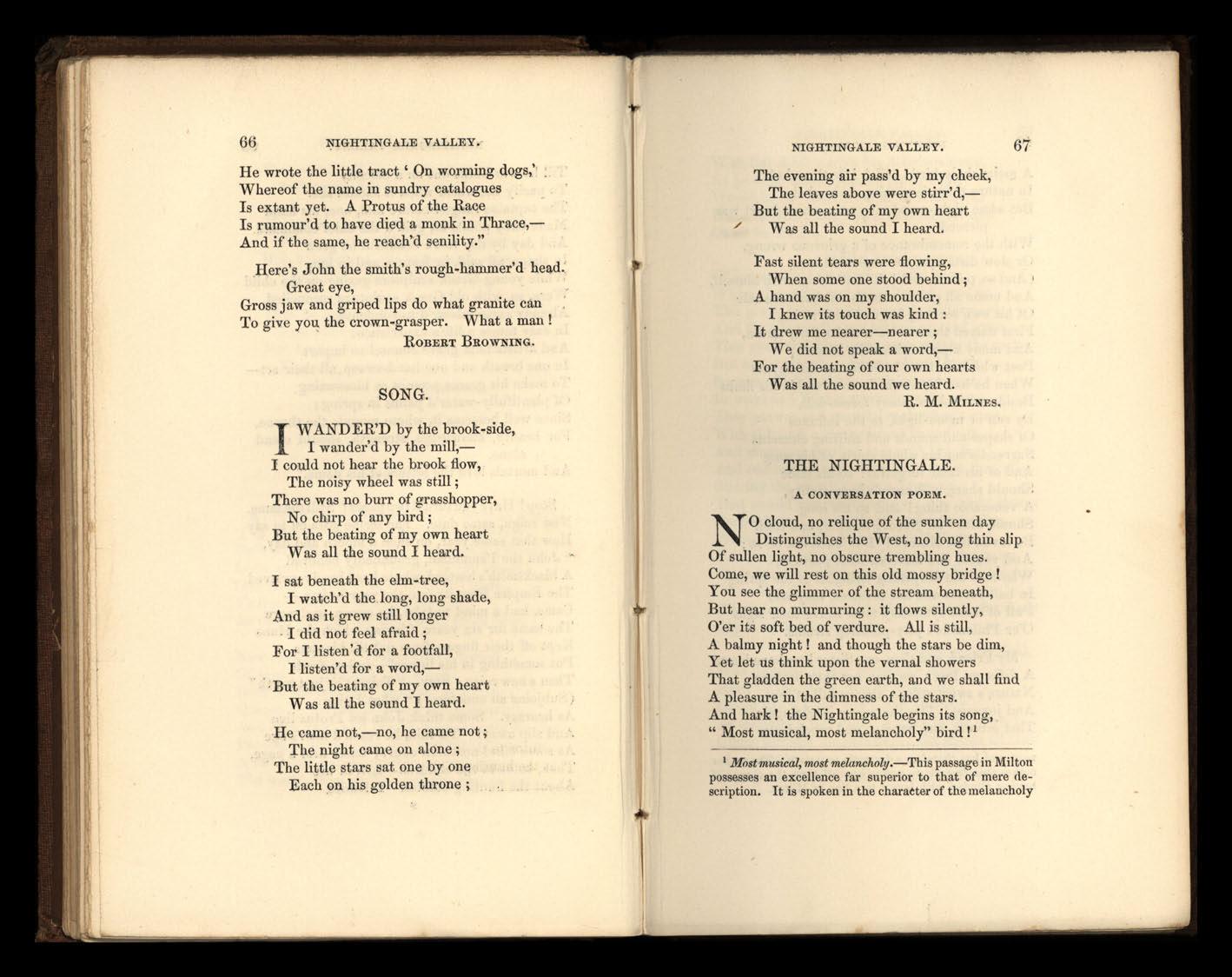
NThe evening air pass'd by my cheek, . The leaves above were stirr'd,-
But the beating of my own heart
Was all the sound I heard.
Fast silent tears were flowing, When some one stood behind;
A hand was on my shoulder, I knew its touch was kind : It drew me nearer-nearer; We did not speak a word,-
For the beating of our own hearts
Was all the sound we heard.
R. M. MILNES.
A CONVERSATION POEM.
H;e came not,-no, he came not; rhe night came on alone; The little stars sat one by one Each on his. golden throne ; / NIGHTINGALE VALLEY.
o cloud, no relique of the sunken day
Distinguishes the West, no long thin slip
Of sullen light, no obscure trembling hues.
Come, we will rest on this old mossy bridge!
You see the glimmer of the stream beneath,
But hear no murmuring: it flows silently, O'er its soft bed of verdure. All is still,
A balmy night! and though the stars be dim, Yet let us think upon the vernal showers
That gladden the green earth, and we shall find
A pleasure in the dimness of the stars.
And hark! the Nightingale begins its song, " Most musical, most melancholy" bird! 1
1 Most musical, most melancholy.-This passage in Milton possesses an excellence far superior to that of mere description. It is spoken in the character of the melaucholy
68
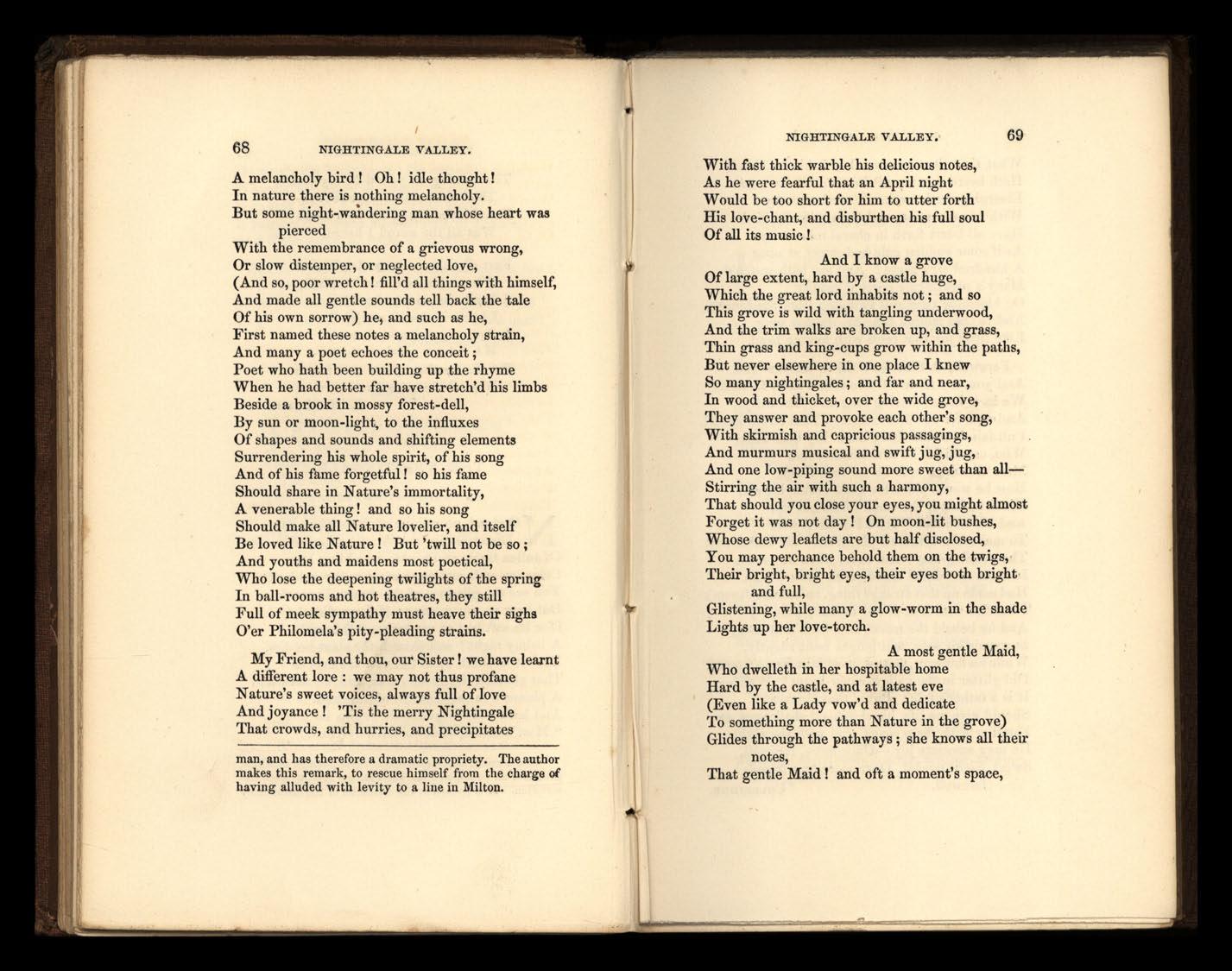
NIGHTINGALE VALLEY.
A melancholy bird! Oh! idle thought! In nature there is nothing melancholy.
But some night-wandering man whose heart was pierced
With the remembrance of a grievous wrong, Or slow distemper, or neglected love,
(And so, poor wretch! fill'd all things wit.h himself, And made all gentle sounds tell back the tale
Of his own sorrow) he, and such as he,
First named these notes a melancholy strain,
And many a poet echoes the conceit; Poet who hath been building up the rhyme
When he had better far have stretch'd his limbs
Beside a brook in mossy forest-dell, By sun or moon-light, to the influxes
Of shapes and sounds and shifting elements
Surrendering his whole spirit, of his song
And of his fame forgetful! so his fame
Should share in Nature's immortality,
A venerable thing! and so his song
Should make all Nature lovelier, and itself
Be loved like Nature! But 'twill not be so ;
And youths and maidens most poetical,
Who lose the deepening twilights of the spring
In ball-rooms and hot theatres, they still
Full of meek sympathy must heave their sighs
O'er Philomela's pity-pleading strains.
My Friend, and thou, our Sister! we have learnt
A different lore: we may not thus profane Nature's sweet voices, always full of love And joyance! 'Tis the merry Nightingale That crowds, and hurries, and precipitates
man, and has therefore a dramatic propriety. The author this remark, to rescue himself from the charge of havmg alluded with levity to a line in Milton.
NIGHTINGALE VALLEY.
With fast thick warble his delicious notes,
As he were fearful that an April night
Would be too short for him to utter forth
His love-chant, and disburthen his full soul
Of all its music I
And I know a grove
Of large extent, hard by a castle huge,
Which the great lord inhabits not; and so
This grove is wild with tangling underwood,
And the trim walks are broken up, and grass,
Thin grass and king-cups grow within the paths,
But never elsewhere in one place I knew
So many nightingales; and far and near, In wood and thicket, over the wide grove, They answer and provoke each other's song, With skirmish and capricious passagings, And murmurs musical and swift jug, jug, And one low-piping sound more sweet than allStirring the air with such a harmony,
That should you close your eyes, you might almost Forget it was not day! On moon-lit bushes, Whose dewy leaflets are but half disclosed, You may perchance behold them on the twigs, Their bright, bright eyes, their eyes both bright and full,
Glistening, while many a glow-worm in the shade
Lights up her love-torch.
A most gentle Maid, Who dwelleth in her hospitable home
Hard by the castle, and at latest eve
(Even like a Lady vow'd and dedicate
To something more than Nature in the grove)
Glides through the pathways; she knows all their notes,
That gentle Maid! and oft a moment's space,
70

NIGHTINGALE VALLEY.
What time the moon was lost behind a
Hath heard a pause of silence; till the moon
Emerging, hath awaken'd earth and sky
Wit.h one sensation, and these wakeful birds
Have all burst forth in choral minstrelsy,
As if some sudden gale had sw ept at once
A hundr ed airy harps I And she hath w:ltch'd
Many a nightingale perch'd giddily
On blossomy twig still swinging from the breeze, And to that motion tune his wanton song
Like tipsy joy that reels with tossing head.
Farewell, 0 Warbler! till to-morrow eve,
And you, my friends! farewell, a short farewell !,
We have been loitering long and pleasantly,
And now for our dear homes.-That st.rain again!
Full fain it would delay me! My dear babe,
Who, capable of no articulate sound,
Mars all things with his imitative lisp,
How he would place his hand beside his ear,
His little hand, the small forefinger up,
And bid us listen! And I deem it wise
To make him Nature's playmate. He knows well
The evening-star; and once, when he awoke
In most distressful mood (some inward pain
Had made up that strange thing, an infant's dream)
I hurried with him to our orchard-plot,
And he beheld the moon, and, hush'd at once, Suspends his sobs, and laughs most silently,
While his fair eyes, that swam with undropp'd tears, Did glitter in the yellow moon-beam! Well!-
It is a father's tale: But if that Heaven Should give me life, his childhood shall grow up Familiar with these songs, that with the night
He may associate joy.-Once more, farewell, Sweet Nightingale! Once more, my friends! farewell.
IN the gre!!nest of valleys, By good angels tenanted, Once a fair and stately palaceRadiant palace-rear'd its head.
In the monarch Thouuht's dominionIt stood there! "
Never seraph waved a pinion Over fabric half so fair.
Banners yellow, glorious, golden, On its roof did float and flow, (This-all this-was in the olden Time long ago,)
And every gentle air that dallied In that sweet day, Along the ramparts plumed and pallid . A winged odour went away.
Wanderers in that happy valley, Through two luminous windows, .saw . Spirits moving musically, To a lute's well-tuned law, Round about a throne, where sitting , (Porphyrogene !) .
In state his glory well befitting, The ruler of the realm was seen.
And all with pearl and ruby glowing Was the fair palace door,
Through which came flowing, flowing, flowing, And sparkling evermore, _
72 NIGHTINGALE VALLEY.
A troop of Echoes, whose sweet duty Was but to sing, In voices of surpassing beauty, The wit and wisdom of their king.
But evil t.hings, in robes of sorrow, Assail'd the monarch's high estate.
(Ah, let us mourn I-for never morrow Shall dawn upon him desolate !) And round about his home the glory That blush'd and bloom'd, Is but a dim-remember'd story Of the old time entomb'd.
And travellers, now, within that valley, Through the red-litten windows see Vast forms, that move fantastically To a discordant melody, While, like a ghastly rapid river, Through the pale door
A hideous throng rush out for ever, And laugh-but smile no more.
EDGAR A. POE.
(FROM" THE FAITHFUL SHEPHERDESS.")
all, and maidens fair,
Fold your flocks up, for the air 'Gins to thicken, and the sun
Already his great course hath run. See the dew-drops how they kiss Every little flower that is ;

NIGHTINGALE VALLEY.
Hanging on their velvet heads
Like a rope of crystal beads; See the heavy clouds low-falling, And bright Hesperus down calling The dead Night from underground, At whose rising, mists unsound, Damps and vapours, fly apace
Hovering o'er the wanton face
Of these pastures; where they come
Striking dead both bud and bloom. Therefore from such danger, lock
Everyone his loved flock, And let your dogs lie loose without, Lest the wolf come as a scout
From the mountain, and, e'er day, Bear a lamb or kid away, Or the crafty thievish fox:
Break upon your simple flocks. To secure yourselves from these, Be not too secure in ease; Let one eye his watches keep, While the other eye doth sleep; So shall you good shepherds prove, And for ever hold the love
Of our great God. Sweetest slumbers And soft silence fall in numbers
On your eyelids: so farewell ; Thus I end my evening's knell.
JOHN FLETCHEB.
THE FUGITIVES.

And from isle, tower, and rock, The blue beacon-cloud broke, Though dumb in the blast,
The red cannon flash'd fast From the lee.
waters are flashing, lIT.
The white hail is dashing,
The lightnings are glancing,
The hoar spray is dancing,-
" And fear'st thou, and fear'st thou?
And see'st thou, and hear'st thou?
And drive we not free Away!
0 1 er the terrible sea, I and thou?"
.The whirlwind is rolling,
One boat-cloak did cover The thunder is toiling,
The loved and the loverThe forest is swinging,
Their blood beats one measure, The minster bells ringing,Come away!
They murmur proud pleasure Soft ·and low j-
The Earth is like Ocean,
While around, the lash'd Ocean, Wreck-strewn and in motion; Like mountains in motion, Bird, beast, man, and worm, Is withdrawn and uplifted, Have crept out of the storm- Sunk, shatter'd, and shifted, Come away! To and fro.
" Our boat has one sail,
In the court of the fortress And the helmsman is pale j-
Beside the pale portress, A bold pilot, I trow, .
Like a bloodhound well beaten Who should follow us now,"-
The bridegroom stands, eaten Shouted he- By shame;
And she cried: "Ply the oar;
On the topmost watch-turret, Put off gaily from shore! "
As a death-boding spirit, As she spoke, bolts of death
Stands the grey tyrant father,Mix'd with hail, speck'd their path
To his voice the mad weather O'er the sea. Seems tame;
76 NIGHTINGALE VALLEY.
And with curses as wilt!
As e'er cling to child, He devotes to the blast
The best, loveliest, and last Of his name.
SHELLET.
DOST thou look back on what hath been,
As some divinely gifted man, Whose life in low estate began And 'on a simple village green;
Who breaks his birth's invidious bar, And grasps the skirts of happy chance, And breasts the blows of circumstance, And grapples with his evil star;
Who makes by force his merit known And lives to clutch the golden keys, To mould a mighty state's decrees, And shape the whisper of the throne;
And moving up from high to higher, Becomes on Fortune's crowning slope
The pillar of a people's hope, The centre of a world's desire;
Yet feels as in a pensive dream, When all his active powers are still, A distant dearness in the hill, A secret sweetness in the stream,

NIGHTINGALE VALLEY.
The limit of his narrow fate, While yet beside its vocal springs He play'd at counsellors and kings, With one that was his earliest mate;
Who ploughs with pain his native lea And reaps the labour of his hands, Or in the furrow musing stands; Does myoid friend remember me?
In Memoria1ll.
USONG.
[FROM" AS TOU LIKE IT."]
NDER the greenwood tree Who loves to lie with me, And tune his merry note Unto the sweet bird's throat, Come hither, come hither, come hither: Here shall he see No enemy
But winter ILnd rough weather.
Who doth ambition shun, And loves to live i'the sun; Seeking the food he eats, And pleased with what he gets, Come hither, come hither, come hither : Here shall he see No enemy
But winter and rough weather.
SHAKESPli:AIlK.
78
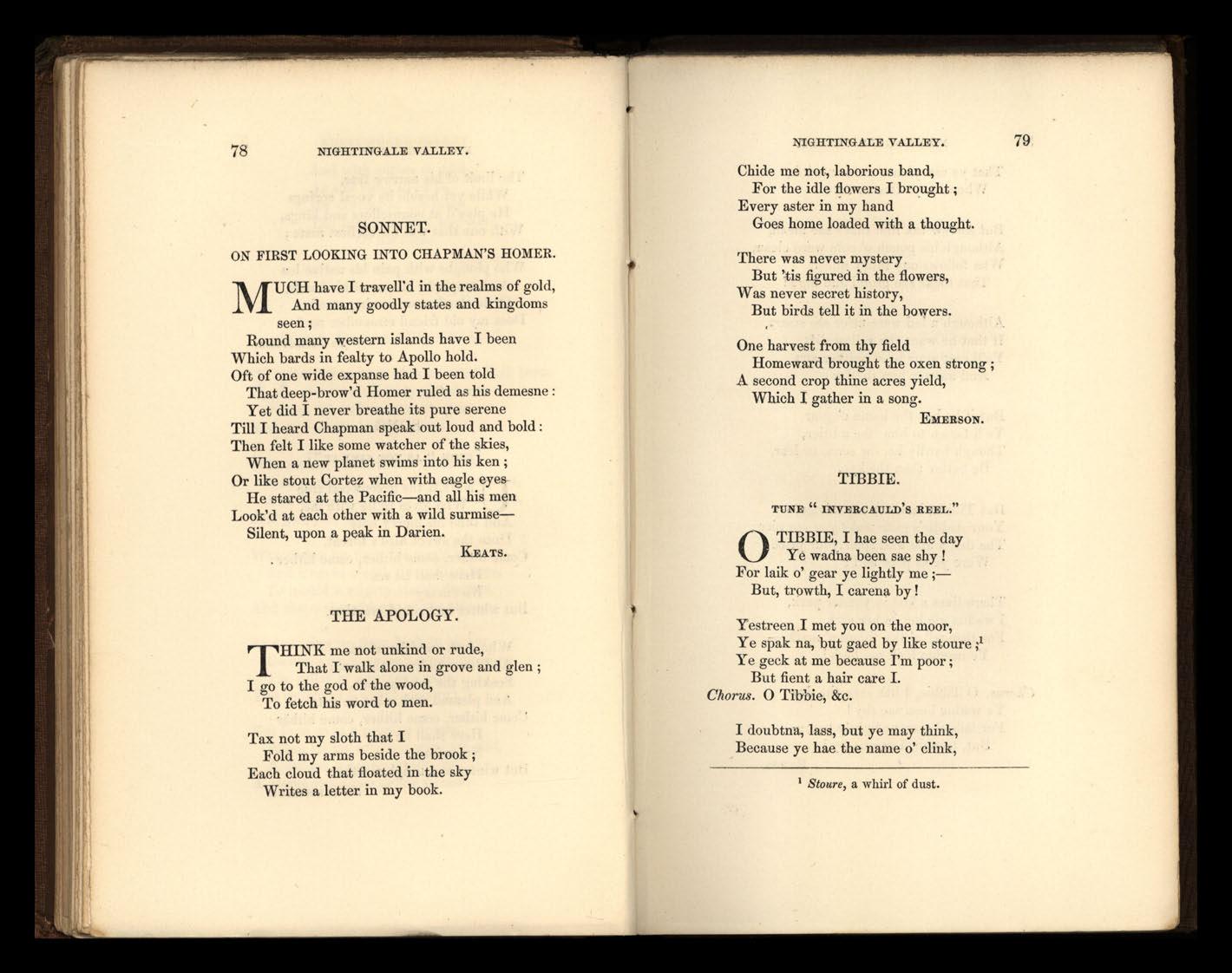
NIGHTINGALE VALLEY. SONNET.
ON FIRST LOOKING INTO CHAPMAN'S HOMER.
MUCH have I travell'd in the realms of gold, And many goodly states and kingdoms seen; Round many w:estern islands have I been Which bards in fealty to Apollo hold, Oft of one wide expanse had I been told That deep-brow'd Homer ruled as his demesne: Yet did I never breathe its pure serene Till I heard Chapman speak out loud and bold: Then felt I like some watcher of the skies, When a new planet swims into his ken; Or like stout Cortez when with eagle eyes· He stared at the Pacific-and all his men Look'd at each other with a wild Silent, upon a peak in Darien.
KEATS.
THE APOLOGY.
THINK me not unkind or rude, That I walk alone in grove and glen; I go to the god of the wood, To fetch his word to men.
Tax not my sloth that I Fold my arms beside the brook; Each cloud t.hat floated in the sky Writes a letter in my book.
NIGHTINGALE VALLEY.
Chide me not, laborious band, For the idle I bro,ught ; Every aster in my hand Goes home loaded with a thought.
There was n'ever mystery . But '-tis figured in the flowers, Was never secret history, But birds tell it in the bO"\fers.
One harvest from thy :field Homeward brouuht the oxen strong' A second crop acres yield, ' Which I gather in a song.
EMERSON.
TIBBIE.
TUNE" INVERCAULD'S REEL."
OTIBBIE, I hae seen the day Ye wadha been sae shy! For laik 0' gear ye lightly me jBut, trpwth, I carena by!
Yestre en.I met you on the moor, Ye spak na, 'but gaed by like stoure 1 -.er ' ... e ge ck at me because I'm poor; But :fient a hair care I. Chorus. 0 Tibbie, &c.
I doubtnn., lass, but ye may think, Because ye hae the name 0' clink,
I Stoure, a whirl of dust.
NIGHTINGALE VALLEY.
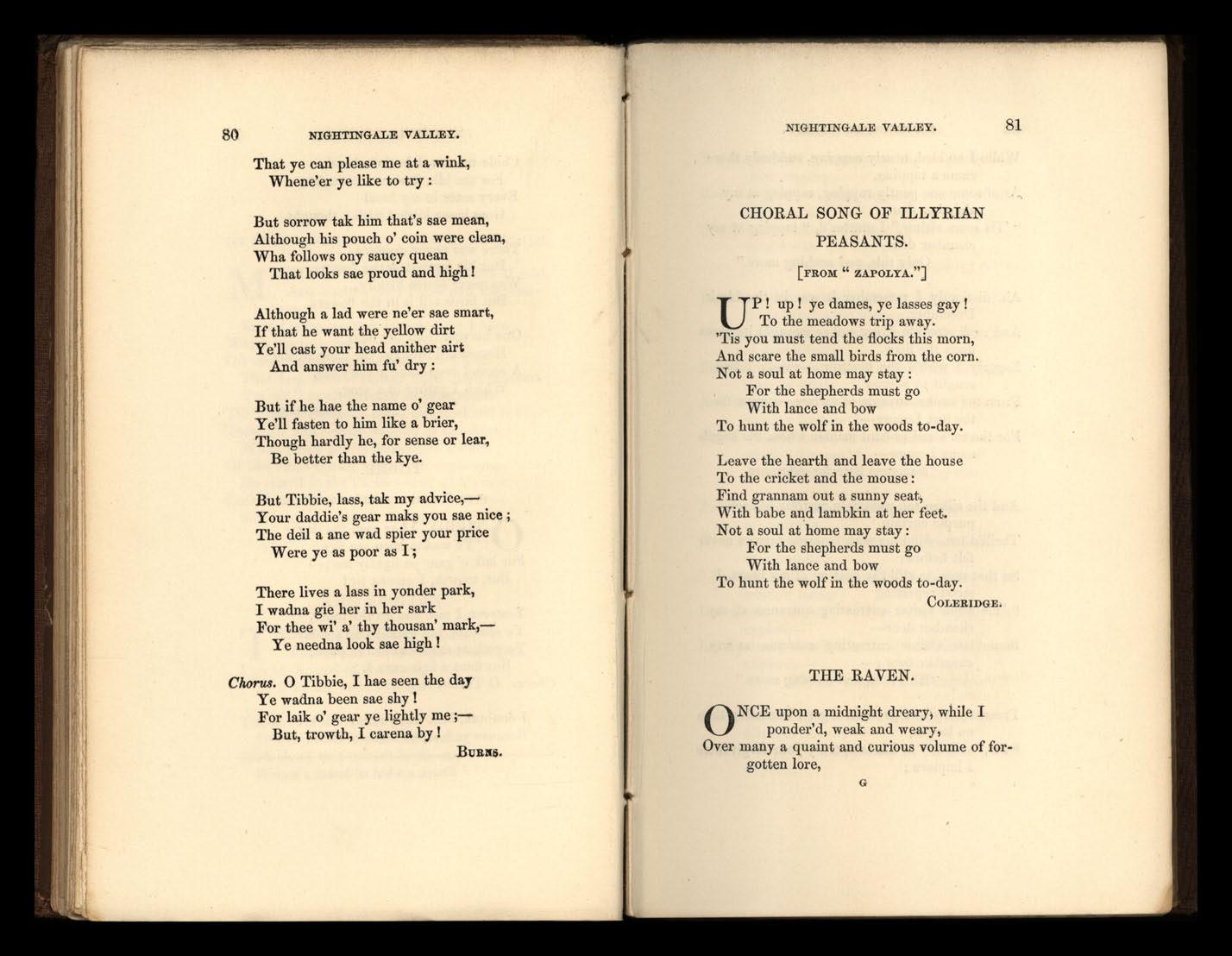
80
NIGHTINGALE VALLEY.
That ye can please me at a wink, Whene'er ye like to try:
But sorrow tak him that's sae mean,
Although his pouch 0' coin were clean,
Wha follows ony saucy quean
That looks sae proud and high!
Although a lad were ne'er sae smart, If that he want the >yellow dirt
Ye'll cast your head anither airt
And an swer him fu' dry :
But if he hae th e name 0' gear
Ye'll fasten to him like a brier,
Though hardly he, for sense or lear,
Be better than the kye.
But Tibbi e, lass, tak my advice,-
Your daddi e's gear maks you sae nice ;
The deil a ane wad spier your price
Were ye as poor as I;
There liv es a l ass in yonder park, I wadna gie her in her sark
For thee wi' a' thy thousan' mark,-
Ye needna look sae high!
Chorus. 0 Tibbie, I hae seen the day
Ye wadna been sae shy!
For laik 0' gear ye li ghtly me ;-
But, trowth, I carena by ! BURIIS.
[FROM" ZAPOLYA."]
P! up! ye dames, ye laBses gay!
To the meadows trip away.
'Tis you must tend the flocks this morn,
And scare the small bh'ds from the corn.
Not a soul at home may stay :
For the shep herds must go
With lance and bow
To hunt the wolf in the woods to-day.
Leave the hearth an d leave the house
To t he cricket and the mouse:
Find grannam out a sunny seat,
With babe and l ambkin at h er feet.
Not a soul at hom e may stay :
For the shepherds must go
With l ance and bow
To hunt the wolf in the woods to -d ay.
COLE RID GE.
ONCE upon a midnight dreary, while I ponder'd, weak and weary,
Over many a quaint and curious volume of forgotten lore, G
NIGHTINGALE VALLEY.
While l nodded, nearly napping, suddenly there came a tapping,
AJJ of some one gently rapping, rapping at my chamber door.
" 'Tis some visitor," I mutter'd, '1 tapping at my chamber door-
Only this, and nothiPg more."
Ab, distinctly I remember it was in the bleak December,
And each separate dying ember wrought its ghost upon the floor.
Eagerly I the morrow;-vainly I had sought to borrow
Ji'rom my books surcease of for the lost Lenore-
For the rare and radiant maiden whom the angels name Lenore-
N !J,meless here for evermore.
And the silken sad u,ncertain of each purple
Thrill'd me-fiU'd me with fanta.stic terrors never felt before;
So that now, to still the beating of my heart, I stood repeating .
" 'Tis some visitor entreating entrance at my chamber door-
Some late visitor entreating entrance at my chamber door ;-
This it is, and nothing more."
Presently my soul grew stronger; hesitating then no longer,
" Sir," said I, " or Madam, truly your forgiveness I implore;

NIGHTINGALE VALLEY. 83
But the fact is I was napping, and so gently you came rapping,
And so faintly you came tapping, tapping at my chamber door,
That I scarce was sure I heard you"-here I open'd wide the Darkness there, and nothing more.
Deep , into that darkness peering, long I stood there wondering, fearing,
Doubting, dreaming dreams . no mortal ever dared to m'eam before;
But the silence was unbroken, and the darkness gave. no token,
Xnd the only word there spoken was the whisper'd word, " Lenore! "
This I whisper'd, and an echo murmur'd back the word, " Lenore ! "
Merely. this,. and nothing more.
Back into the chamber turning, all my soul. within me burning,
Soon I heard again a tapping somewhat louder than before,
" Surely," said I, "surely that is something at my window lattice;
Let me see, then, what thereat is, and this mystery explore-
Let my heart be still a moment and this mystery explore;-
'Ti the wind, and nothing more! ..
Open here I flung a shutter, when, with. many a flirt and flutter,
In there stepp'd a stately raven of the saintly days of yore;
84

NIGHTINGAL:E VALLEY.
Not the least obeisance made he; not an instant stopp'd or stay'd he ;
But, with mien of lord or lady, perch'd above my chamber door-
Perch'd upon a bust of Pallas just above my chamber door-
Perch'd, and sat, and nothing more.
Then this ebony bird beguiling my sad fancy into smiling,
By the grave and stern decorum of the countenance it wore,
" Though thy crest be shorn and shaven, thou," I said, " art sure no craven,
Ghastly, grim, and ancient raven wandering from the Nightly shore-
Tell me what thy lordly name is on the Night's Plutonian shore! "
Quoth the raven, " Nevermore."
Much I marvell'd this ungainly fowl to hear discourse so plainly,
Though its answer little meaning-little relevancy bore;
For we cannot help agreeing that no living human being
Ever yet was blest with seeing bird above his chamber door-
Bird or beast upon the sculptured bust above his chamber door,
With such name as " Nevermore."
But the raven, sitting lonely on the placid bust, spoke only
That one word, as if his soul in that one word he did outpour.
NIGHTINGALE VALLE;Y. 85
Nothing farther then he a feather then he flutter'd-
Till I scarcely more than mutter'd " Other friends havr- flown before-
On the morrow he will leave me, as my hopes have flown before."
Then the bird said " Nevermore."
Startled at the stillness broken by reply so aptly spoken, " Doubtless," said I, " what it utters is its only stock and store
Caught from some unhappy master whom unmerciful Disaster
Follow'd fast, and follow'd faster, till his songs one burden bore-
Till the dirges of his Hope that melancholy burden bore
Of ' Never-nevermore.' "
But the raven still beguiling all my sad soul into smiling,
Straight I wheel'd a cushion'd seat in front of bird, and bust, and door;
Then, upon the velvet sinking, I betook myself to linking
Fancy unto fancy, thinking what this ominous bird of yore-
W}J.at this grim, ungainly, ghastly, gaunt, and ominous bird of yore
Meant in croaking" Nevermore."
This I sat engaged in guessing, but no syllable expressing
To the fowl whose fiery eyes now burnt into my bosom's core;
SG
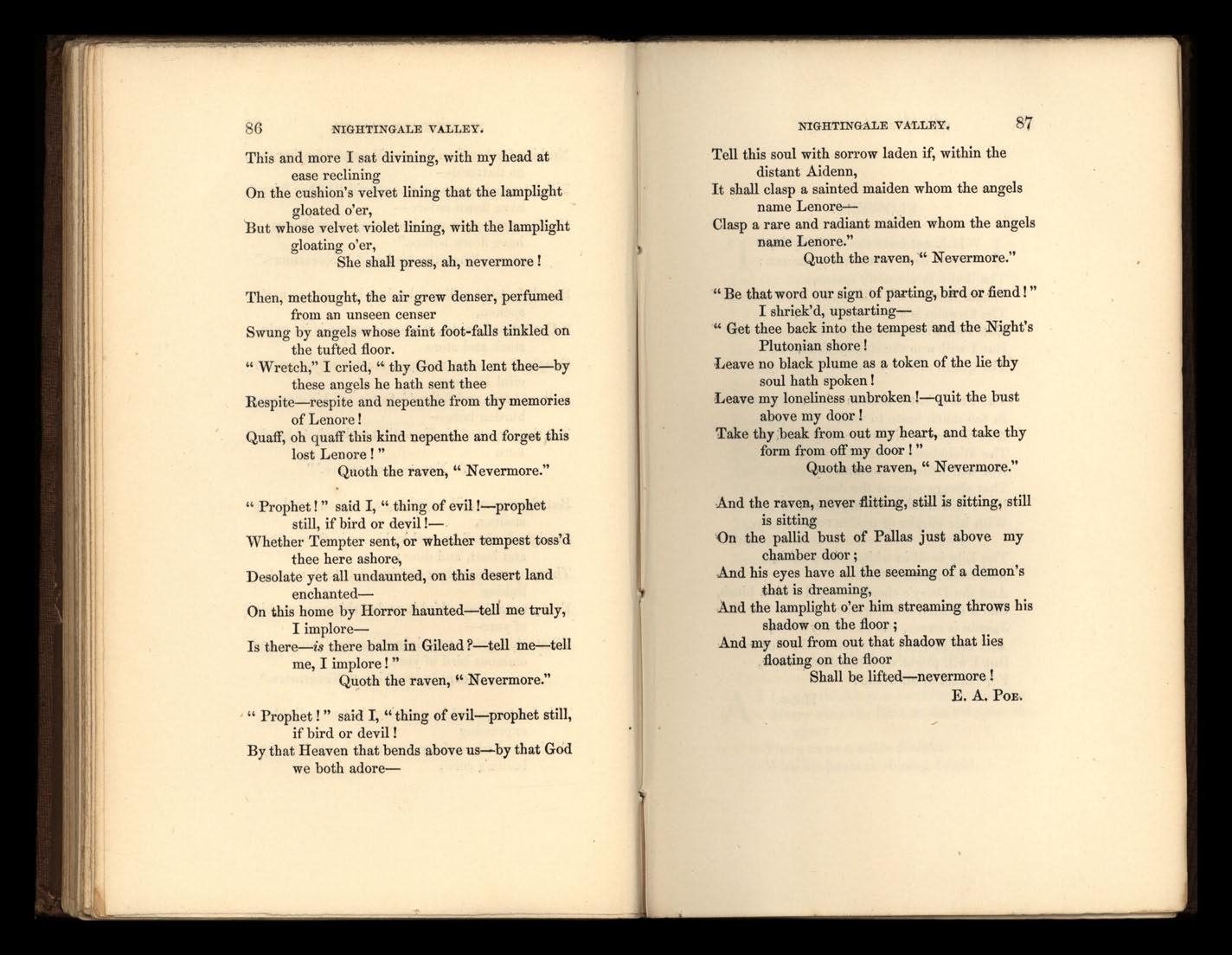
NIGHTINGALE VALLEY.
Thi s and mor e I sa t divining, with my head at ease r eclin ing
On the cushion's velvet lining that the lamplight gloated o'er,
But whose velv et violet lining, with the lamplight gloating o'er,
She shall press, ah, nevermore!
Then, methought, the air grew denser, perfumed from an un seen censer
Swung by angels whose faint foot-falls tinkled on the tufted floor.
"Wretch," I cr ied , "thy God hath lent thee-by these angels he hath sent thee
Respite-respite and nepeuthe from thy memories of L enore !
Quaff, oh quaff this kind nepenthe and forget this lost L enore ! "
Qlloth the raven, " Nevermore."
" Prophet!" sa id I, " thing of evil I-prophet still, if bird or devil !-
Whether Tempter se nt, or whether tempest toss'd th ee her e ashore,
D eso late yet all undaunted, on this desert land enchanted-
On this home by Horror haunted-teli me truly, I implore-
I s th er e-is there balm in Gilead ?-tell me-tell me, I implore! "
Quoth the raven, " Nevermore."
" Proph et!" said I, "thing of evil-prophet still, if bird or dev il !
By that H eaven that bends above us-by that God we both adore-
Tell this soul with sorrow laden if, within the di stant Aidenn,
It shall clasp a sainted maiden whom the angels name Lenore-
87
Clasp a rare and radiant maiden whom the angels name Lenore."
Quoth the raven, Cl Nevermore."
" Be that word our sign of parting, bird or ·fiend ! " I shriek'd, upstarting-
" Get thee back into the tempest and the Night's Plutonian shore!
,Leave no black plume as a tok en of th e lie thy soul hath spoken!
Leave my lon eliness unbroken I-quit the bust above my door I
Take thy 'beak from out my heart, and take thy form from off my door! "
Quoth the raven, " Nevermore."
And the never 4l.itting, still is sitting, still is sitting
'On the pallid bust of Pallas just above my chamber door j
.And his eyes have all the seeming of a demon's that is dreaming,
And the lamplight o'er him streaming throws his shadow on tbe floor j
And my soul from out that shadow that lies floating on the floor
Shall be lifted-nevermore!
E. A. POE.
88 NIGHTINGALE VALLEY.

NIGHTINGALE VALLEY.
89
IWILL not have t.he mad Clytie, Whose head is turn'd by the sun;
The Tulip is a courtly quean, Whom therefore I will shun;
The Cowslip is a country wench, The Violet is a nun ;-
But I will woo the dainty Rose, The queen of everyone.
The Pea is but a wanton witch, In too much haste to wed, And clasps her rings on every hand;
The W I should dread;
Nor will I dreary Rosemarye, That always mourns the dead ;-
But I will woo the dainty Rose, With her cheeks of tender red.
The Lily is all in white, like a saint, And so is no mate for me-
And the Daisy's cheek is tipp'd with a blush, She is of such low degree; Jasmin is sweet, and has many loves, And the Broom's betroth'd to the Bee ;-
But I will plight with the dainty Rose, F or fairest of all is she!
HOOD.
TFABLE.
HE Mountain and the Squirrel
Had a quarrel,
And the former call'd the latter" Little Prig :"
Bun replied, " You are doubtless very big, But all sorts of things and weather
Must be taken in together
To make up a year, And a sphere. And I think it no disgrace
To occupy my place. If I'm not so large as you, You are not so small as l, And not half so spry: I'll not deny you make
A very pretty squirrel-track;
Talents differ; all is well and wisely put; If I cannot carry forests on my back, Neither can you crack a nut."
EMERSON.
As I lay a-thinking, a-thinking, a -thinking, Merry sang the Bird as she sat upon the spray;
There came a noble Knight
With his hauberk shining bright,
90
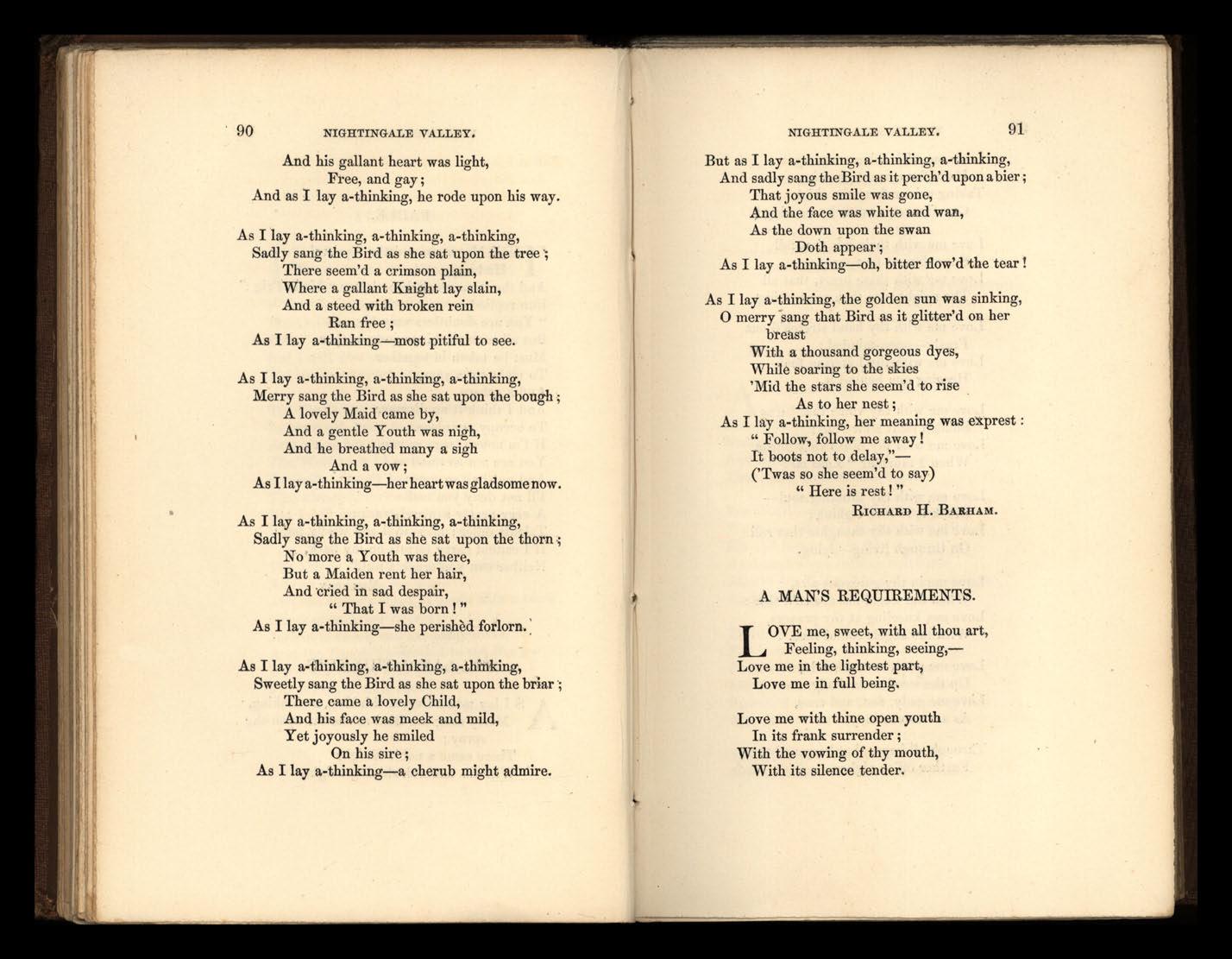
NIGHTINGALE VALLEY.
And his gallant heart was light, Free, and gay;
And as I lay a-thinking, he rode upon his way.
As I lay a-thinking, a-thinking, a -thinking, Sadly sang the Bird as she sat upon the tree
There seem'd a crimson plain, Where a gallant Knight lay slain, And a steed with broken rein Ran free;
As I lay a-thinking-most pitiful to see.
As I lay a-thinking, a -thinking, a -thinking, Merry sang the Bird as she sat upon the bough ; A lovely Maid came by,
And a gentle Youth was nigh, And he breathed many a sigh
And a vow;
As I lay a-thinking-her heart was gladsome now.
As I lay a-thinking, a-thinking, a-thinking, Sadly sang the Bird as she sat upon the thorn
No more a Youth was there, But a Maiden rent her hair, And 'cried in sad despair, " That I was born! "
As I lay a-thinking-she perished forlorn. :
As I lay a-thinking, :a-thinking, a-thinking, Sweetly sang the Bird as she sat upon the briar ';
There came a lovely Child, And his face was meek and mild, Yet joyously he smiled On his sire;
As I lay a-thinking-a cherub might admire.
NIGHTINGALE VALLEY. 91
But as I lay a-thinking, a-thinking, a-thinking, And sadly sang the Bird as it perch'd upon a bier; That joyous smile was gone, 4nd the face was white and wan, As the down upon the swan
Doth appear;
As I lay a-thinking-oh, bitter flow'd the tear!
As I lay a-thinking, the golden sun was sinking, °merry -sang that Bird as it glitter'd on her breast
With a thousand gorgeous dyes, While soaring to the skies 'Mid the stars she seem'd to rise
As to her nest;
As I lay a-thinking, her meaning was exprest : " Follow, follow me away! It boots not to delay,"CTwas so she seem'd to say) " Here is rest! "
RICHARD H. BARHAM
LOVE me, sweet, with all thou art, Feeling, thinking, seeing,Love me in the lightest part, Love me in full being.
Love me with thine open youth
In its frank surrender; With the vowing of thy mouth, With its silence tender.
92
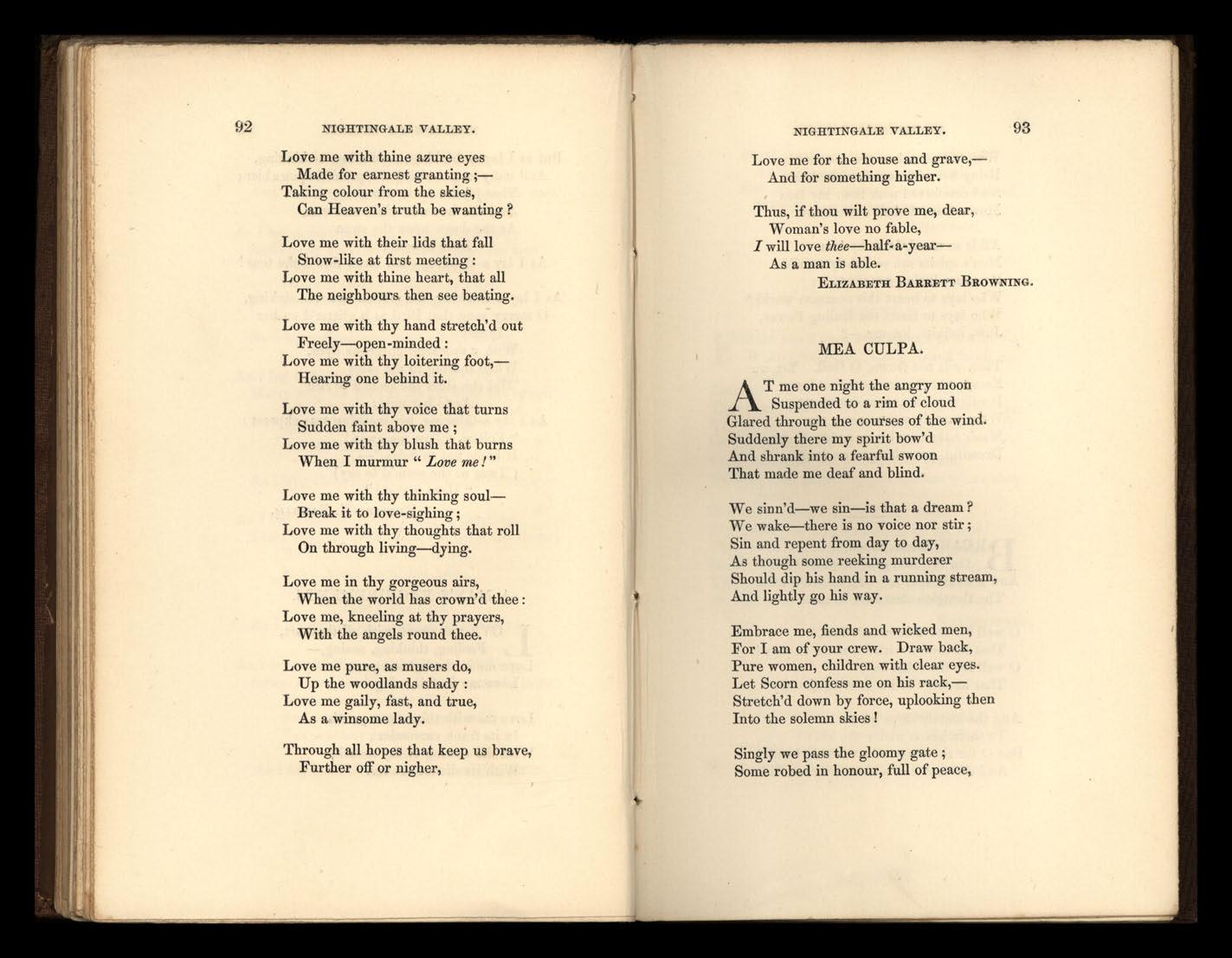
NIGHTINGALE VALLEY.
Love me with thine azure eyes Made for earnest granting jTaking colour from the skies, Can Heaven's truth be wanting?
Love me with their lids that fall Snow-like at first meeting:
Love me with thine heart, that all The neighbours. then see beating.
Love me with thy hand stretch'd out Freely-open-minded:
Love me with thy loitering foot,Hearing one behind it.
Love me with thy voice that turns Sudden faint above me j
Love me with thy blush that burns When I murmur" Love me!"
Love me with thy thinking soulBreak it to love-sighing
Love me with thy thoughts that roll On through living-dying.
Love me in thy gorgeous airs, When the world has crown'd thee:
Love me, kneeling at thy prayers, With the angels round thee.
Love me pure, as musers do, Up the woodlands shady:
Love me gaily, fast, and true, As a winsome lady.
Through all hopes that keep us brave, Further off or nigher,
NIGHTINGALE VALLEY.
Love me for the house and grave,And for something higher.
Thus, if thou wilt prove me, dear , Woman's love no fable, I will love thlie-half.a-yearAs a man is able.
ELIZABETH BARRETT BROWNIN G. MEA CULPA.
AT me one night the angry moon
Suspended to a rim of cloud
Glared through the courses of the wind Suddenly there my spirit bow'd And shrank into a fearful swoon That made me deaf and blind.
We sinn'd-we sin-is that a dream?
We wake-there is no voice nor stir j Sin and repent from day to day, As though some reeking murderer Should dip his hand in a running stream, And lightly go his way.
Embrace me, fiends and wicked men, For I am of your crew. Draw back, Pure women, children with clear eyes Let Scorn confess me on his rack,Stretch'd down by force, uplooking then Into the solemn skies!
Singly we pass the gloomy gate j Some robed in honour, full of peace,
94
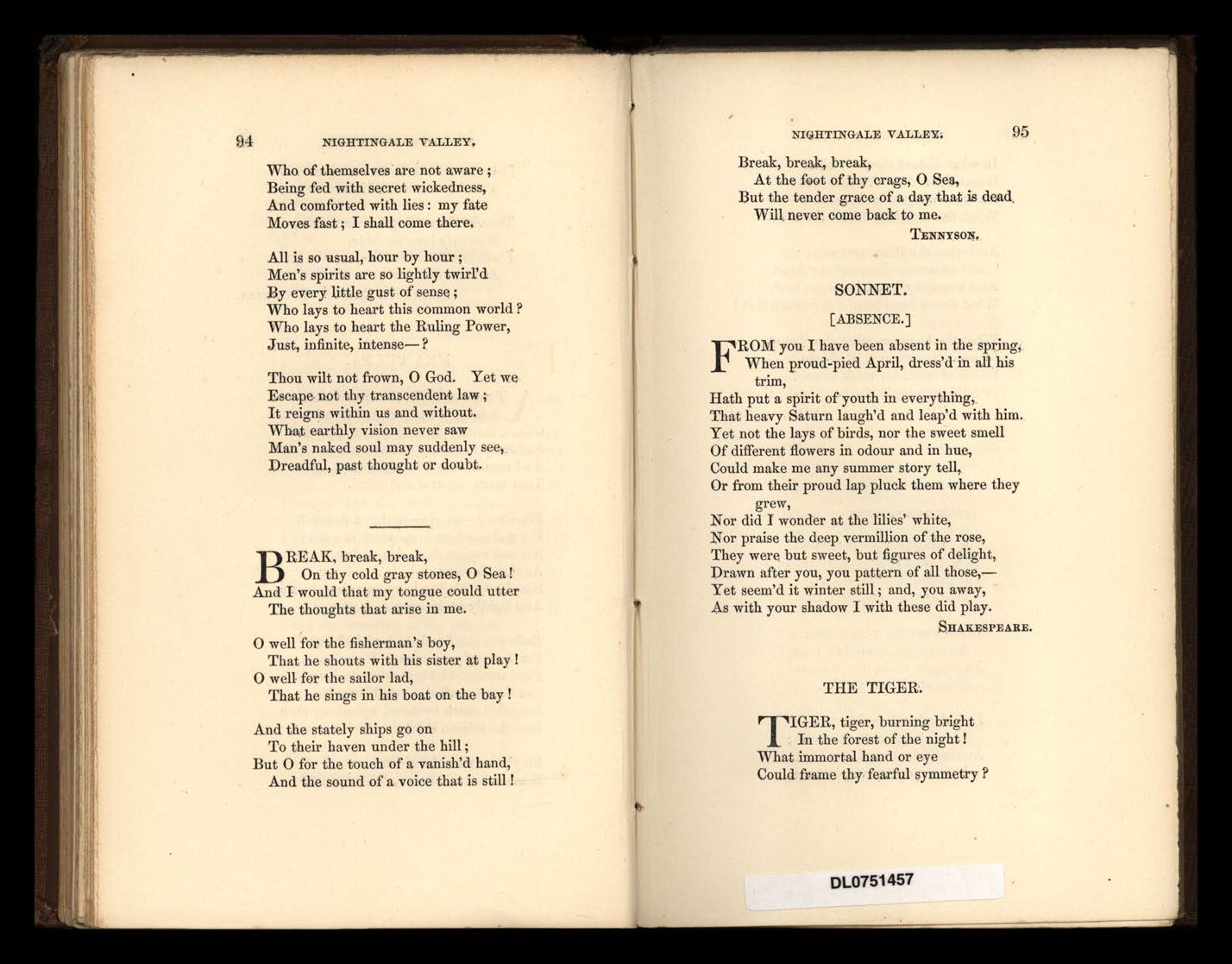
NIGHTINGALE VALLEY.
Who of themselves ' are not aware; Being fed with secret wickedness, And comforted with lies: my fate
Moves fast; I shall come there.
All is so 11sual, hour by hour; Men's spirits are so lightly twiri'd
By every little gust of senS!l ; Who lays to heart this common world?
Who lays to heart the Ruling Power, Just, infinite, intense- ?
Thou wilt not frown, 0 God. Yet we Escape-not thy transcendent law; It reigns within us and without.
What earthly vision never saw Man's naked soul may suddenly see, Dreadful, past thought or doubt.
BREAK. break, break,
On thy cold gray stones, 0 Sea!
And I would that my tongue could utter
The thoughts that arise in me.
o well for the fisherman's boy,
That he shouts with his sister at play!
o weU for the sailor lad,
That he sings in his boat on the bay!
And the stately ships go on
To their haven under the hill ;
But 0 for the touch of a vanish'd hand, And the sound of a voice that is still !
NIGHTINGALE V.ALLE1t. 95
Break, break, break, At the foot of thy crags, 0 Sea., But the tender grace of a day that is dead. Wilt never come back to me. TENNYSOli".
SONNET.
[ABSENCE.]
FROM you I hav: been in
When p'roud'-pled April, dress'd ' m all hIS trim,
Hath put a spirit of youth in everything, That heavy Saturn laugh'd and leap'd with him.
Yet not the lays of birds, nor t.he sweet smell
Of different flowers in odour and in hue,
Could make me any summer story tell, Or from their proud lap pluck them where they grew,
Nor did I wond-er at the lilies' white, Nor praise the deep vermillion of the rose, They were but sweet, but figures of delight, Drawn after you, you pattern of all those,Yet seem'd it winter still; and, you away, As with your shadow I with these did play.
SHAKESPEARE.
TTHE TIGER'.
IGER, tiger, burning bright
In the forest of the night! What immort.al hand or eye Could fl1ame thy fearful symmetry?
96
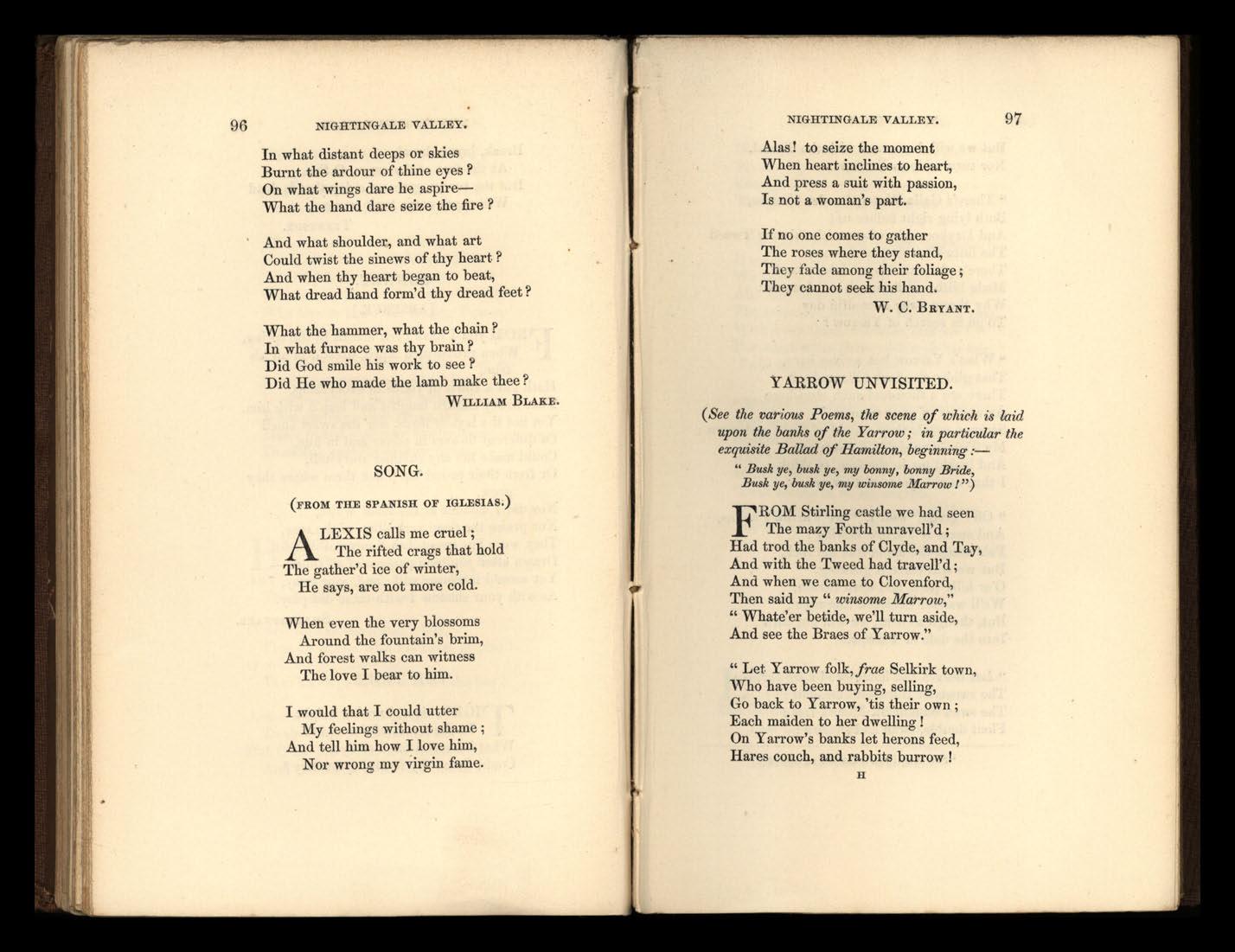
NIGHTINGALE VALLEY.
In what distant deeps or skies
Burnt the ardour of thine eyes?
On what wings dare he aspire-
What the hand dare seize the fire?
.And what shoulder, and what art
Could twist the sinews of thy heart?
.And when thy heart began to beat, What dread hand form'd thy dread feet?
What the hammer, what the chain?
In what furnace was thy brain?
Did God smile his work to see?
Did He who made the lamb make thee?
BLAKE.
(FROM TIIE SPANISH OF IGLESIAS.)
ALEXIS calls me cruel; The rifted crags that hold The gather'd ice of winter, He says, are not more cold.
When even the very blossoms Around the fountain's brim, .And forest walks can witness The love I bear to him.
I would that I could utter My feelings witbout shame; .And tell him how I love him, Nor wrong my virgin fame.
NIGHTINGALE VALLEY.
.Alas! to seize the moment When heart inclines to heart, .And press a suit with passion, Is not a woman's part.
If no one comes to gather
The roses where they st,and, Th y fade among their foliage; They cannot seek his hand.
W. C. BRYANT.
Y.ARROW UNVISITED.
(See the various Poems, the scene of which is laid upon the banks of the Yarrow; in particular the exquisite Ballad of Hamilton, beginniTtg :-
Busk ye, busk ye, my bonny, bonny Bride Busk ye, busk ye, my winsome Marrow I")
FROM Stirling castle we had seen
The mazy Forth unravell'd; Had trod the banks of Clyde, and Tay .And with the Tweed had traveIl'd' ' .And when we came to Clovenford ', Then said my" winsome Marrow," " Whate'er betide, we'll turn aside, .And see the Braes of Yarrow."
"Let Yarrow folk,frae Selkirk town, Who have been buying, selling, Go back to Yarrow, 'tis their own; Eacb maiden to ber dwelling!
On Yarrow's banks let herons feed, Hares couch, and rabbits burrow! H
NIGHTINGALE VALLEY.
But we will downward with the Tweed, Nor turn aside t.o Y arrow.
" There's Galla Water, Leader Haughs, Both lying right before us; And Dryborough, where with chiming Tweed
The lintwhites sing in chorus;
There's pleasant Tiviot-dale, a land
Made blithe with plough and harrow: Why throwaway a needful day
To go in search of Yarrow ?
'J What's Yarrow but a river bare, That glides the dark hills under?
There are a thousand such elsewhere worthy ofyou,r wonder."
Strange words they seem'd of slight and scorn; My True-love sigh'd for so,row; And look'd me in the face, to think I could speak of Yarrow !
" Oh I green," said I, " are Yarrow's holms, And sweet is Yarrow flowing!
Fair hangs the apple frae the rock,!
But we will leave it growing.
O'er hilly path, and open Strath, We'Il wander Scotland thorough; But, though so near, we will not turn Into the dale ofYarrow.
" Let beeves and home-bred kine partake
The sweets of Burn-mill meadow; The swan on still St. Mary's Lake Float double, swan and shadow t
I See Hamilton's Ballad as above,
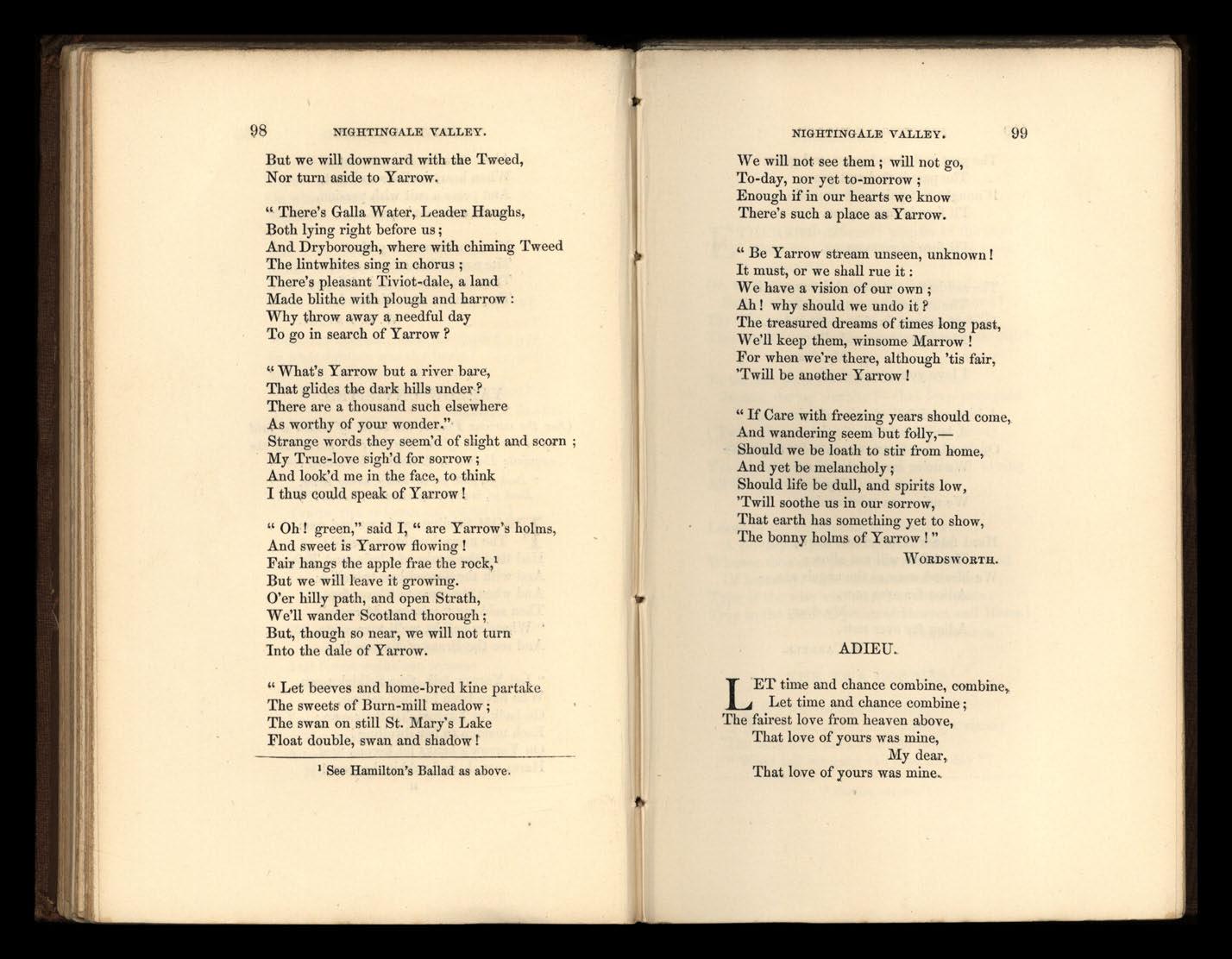
NIGHTINGALE VALLEY.
We will not see them; will not go, To - day, nor yet to-morrow; Enough if in our hearts we know There's such a place as Yarrow
" Be Yarrow stream unseen, unknown! It must, or we shall rue it :
We have a vision of our own; Ab! why should we undo it ?
The treasured dreams of times long past, We'll keep them, winsome Marrow!
For when we're there, although 'tis fair, 'Twill be another Yarrow !
" If Care with freezing years should come, And wandering seem but folly,Should we be loath to stir from home, And yet be melancholy; Should life be dull, and spirits low, 'Twill soothe us in our sorrow, That earth has something yet to show, The bonny holms of Yarrow ! "
"\VOltDSWORTll.
ADIEU.
LET time and chance combine, combine.
. Let time and chance combine; The fairest love from heaven above, That love of yours was mine, My dear,
That love of yours was mine.
100

NIGHTINGALE VALLEY.
The past is fled and gone, and gone, The past is fled and gone; If nought but pain to me remain, I'll fare in memory on, My dear, I'll fare in memory on.
The saddest tears must fall, must fall, The saddest tears must fall ; In weal or woe, in this world below, I love you ever and all, My dear, I love you ever and all.
A long road full of pain, of pain,
A long road full of pain; One soul, one heart, sworn ne'er to part,We ne'er can meet again, My dear, We ne'er can meet again.
Hard fate will not allow, allow, Hard fate will not allow; We blessed were as the angels are,Adieu for ever now, My dear, Adieu for ever now.
T. CARLYLE.
ENIGHTINGALE VALLEY. 101
THEREAL minstrel! pilgrim of the sky!
Dost thou despise the earth where cares abound?
Or, while the wings aspire, are heart and eye
Both with tby nest upon the dewy ground?
Thy nest which thou canst drop into at will, Those quivering wings composed, that music still ! il.
To the last point of vision, and beyond, Mount, daring warbler I-that love-prompted strain
CTwixt thee and thine a never-failing bond)
Thrills not the less the bosom of the plain: Yet might'st thou seem, proud privilege! to sing All independent of the leafy spring. ill.
Leave to the nightingale her shady wood;
A privacy of glorious light is thine; Whence thou dost pour upon the world a flood Of harmony, with instinct more divine; Type of the wise who soar, but never roam ; True to the kindred points of Heaven and Home! W ORDSWORTH.
As I was walking all alane, I heard twa corbies making a mane; The tane unto the t'ither did say, " Whar saIl we gang and dine the day?
I Corbies, fa. yens.
102
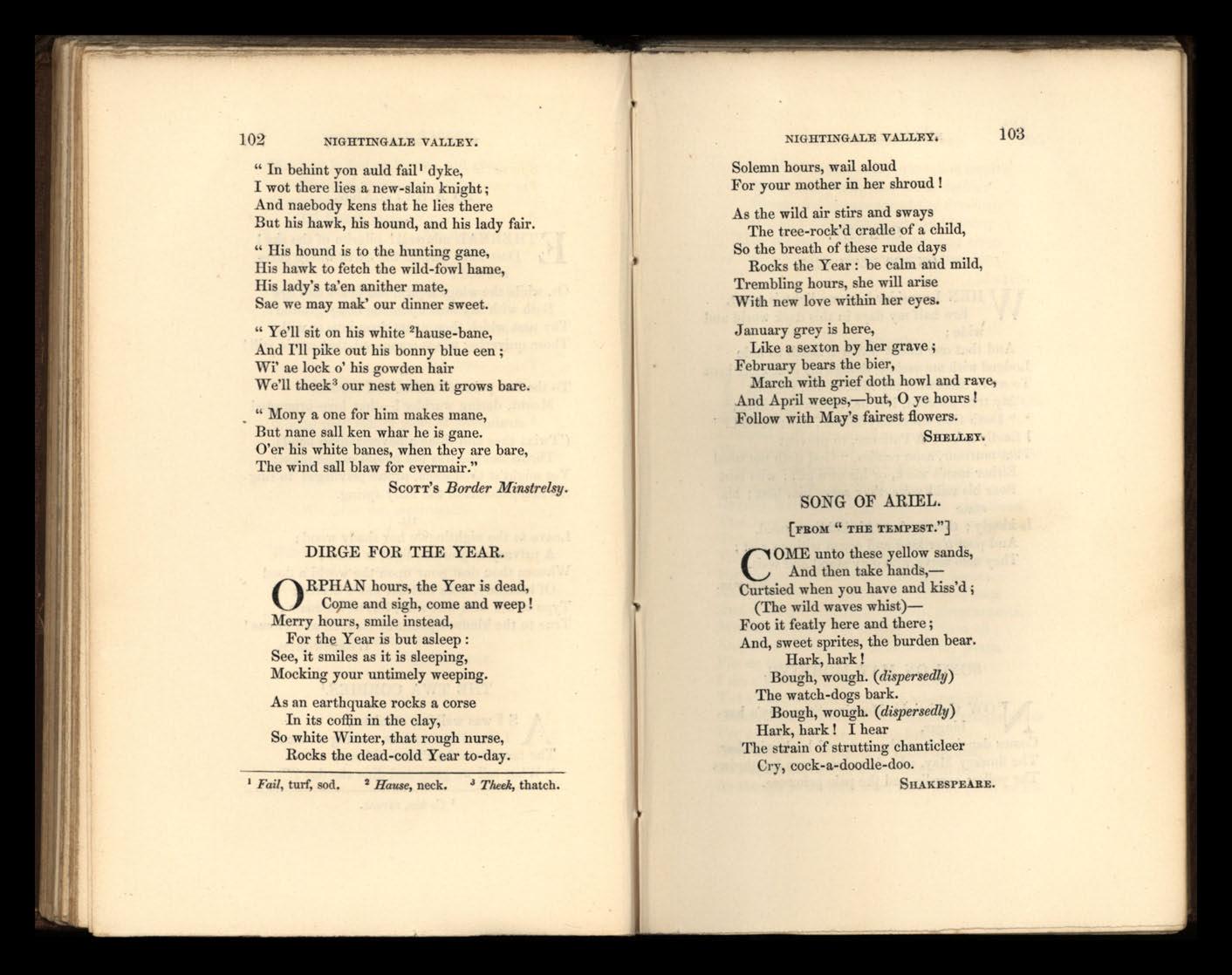
NIGHTINGALE VALLEY.
" In behint yon auld fail I dyke, I wot there lies a new-slain knight; And naebody kens that he lies there But his hawk, his hound, and his lady fair.
" His hound is to the hunting gane, His hawk to fetch the wild-fowl hame, His lady's ta'en anither mate, Sae we may mak' our dinner sweet.
" Ye'll sit on his white 2hause-bane, And I'll pike out his bonny blue een ; Wi' ae lock 0' his gowden hair
We'll theek 3 our nest when it grows bare.
" Mony a one for him makes mane, But nane Ball ken whar he is gane. O'er his white banes, when they are bare, The wind sail blaw for evermair."
SCOTT'S Border MimtrelS!J.
DIRGE FOR THE YEAR.
ORPHAN hours, the Year is dead, COJIle and sigh, come and weep!
Merry hours, smile instead, For the Year is but asleep: See, it smiles as it is sleeping, Mocking your untimely weeping.
As an earthquake rocks a corse
In its coffin in the clay, So white Winter, that rough nurse, Rocks the dead-cold Year to-day.
I Fail, turf, sod. • Hause, neck. J ThetA, thatch.
NIGHTINGALE VALLRY.
Solemn hours, wail aloud
For your mother in her shroud!
As the wild air stirs and sways
The tree-rock'd cradle of a child, So the breath these rude days Rocks the Year: be calm and mild, Trembling hours, she will arise With new love within her eyes.
January grey is here, Like a sexton by her grave; February bears the bier, March with grief doth howl and rave, And Ap"il weeps,-but, 0 ye hours I Follow with May'S fairest flowers. SHELLEY.
SONG OF ARIEL.
{FROM" THE TEMPEST."]
COME unto these yellow sands, And then take hands,Curtsied when you have and kiss'd i (The wild waves whist)Foot it featly here and there; And, sweet sprites, the burden bear. Hark,hark!
Bough, wough. (dispersedly)
The watch-dogs bark.
Bough, wough. (dispersedly)
Hark, hark! I hear The strain of strutting chanticleer Cry, cock-a-doodle-doo.
SHAKE PEAllE.
104
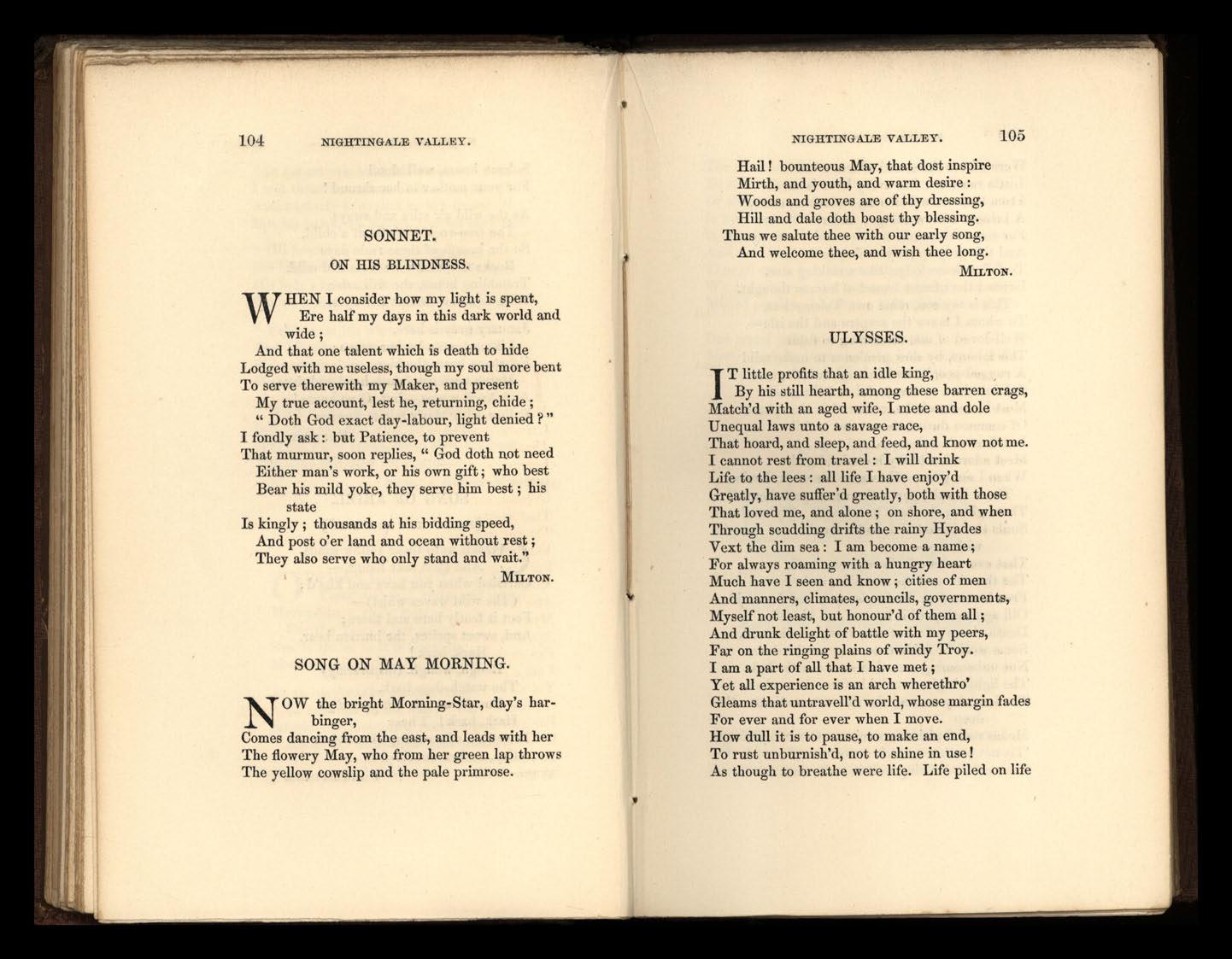
NIGHTINGALE VALLEY.
WSONNET.
ON HIS BLINDNESS.
HEN I consider how my light is spent, Ere half my days in this dark world and wide;
And that one talent which is death to hide Lodged with me useless, though my soul more bent To serve therewith my Maker, and present
My true account, lest he, returning, chide; " Doth God exact day-labour, light denied?"
I fondly ask: but Patience, to prevent That murmur, soon replies, " God doth not need Either man's work, or his own gift; who best Bear his mild yoke, they serve him best; hi s state
Is kingly; thousands at his bidding speed, And post o'er land and ocean without rest; They also serve who only stand and wait."
MILTON.
NOW the bright Morning-Star, day's harbinger, Comes dancing from the east, and leads with her The flowery May, who from her green lap throws The yellow cowslip and the pale primrose.
NIGHTINGALE VALLEY.
Hail! bounteous May, that dost inspire Mirth, and youth, and warm desire: Woods and groves are of thy dressing, Hill and dale doth boast thy blessing. Thus we salute thee with our early song, And welcome thee, and wish thee long.
105 MILTON.
ULYSSES.
IT little profits that an idle king, , By his still hearth, among these barren crags, Match'd with an aged wife, I mete and dole
Unequal laws unto a savage race, That hoard, and sleep, and feed, and know not me.
I cannot rest from travel: I will drink Life to the lees: all life I have enjoy'd have suifer'd greatly, both with those That loved me, and alone; on shore, and when Through scudding drifts the rainy Hyades Vext the dim sea: I am become a name; For always roaming with a hungry heart Much have I seen and know; cities of men And manners, climates, councils, governments, Myself not least, but honour'd of them all; And drunk delight of battle with my peers, Far on the ringing plains of windy Troy.
I am a part of all that I have met;
Yet all experience is an arch wherethro' Gleams that untravell'd world, whose margin fades
For ever and for ever when I move.
How dull it is to pause, to make an end, To rust unburnish'd, not to shine in use!
As though to breathe were life. Life piled on life
106
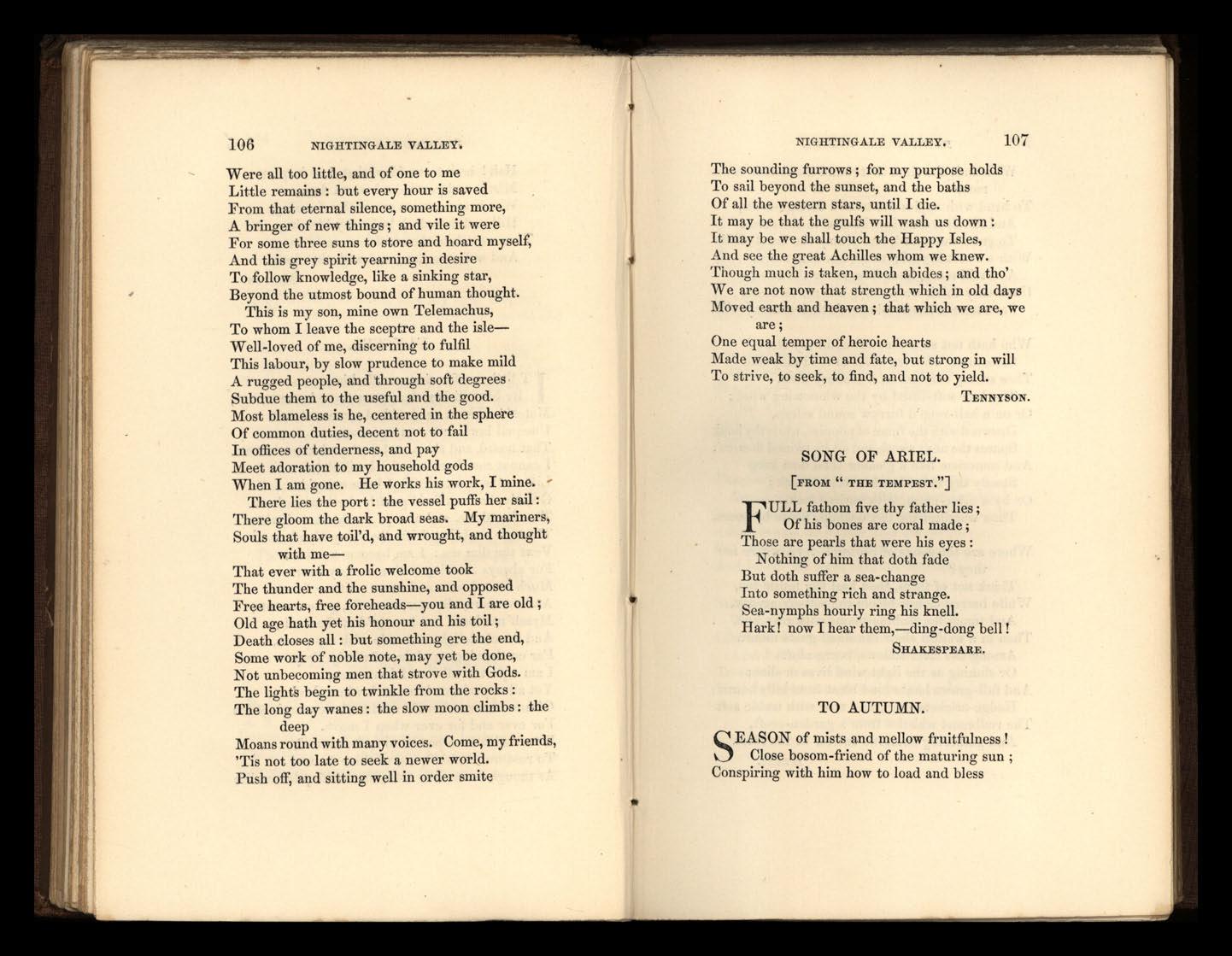
NIGHTINGALE VALLEY.
Were all too little, and of one to me
Lit.tle remains: but every hour is saved
From that eternal silence, something more, A bringer of new things; and vile it were For some three suns to store and hoard myself, And this grey spirit yearning in desire
To follow knowledge, like a sinking star,
Beyond the utmost bound of human thought. This is my son, mine own Telemachus,
To whom I leave the sceptre and the isle-
Well-loved of me, discerning to fulfil
This labour, by slow prudence to make mild
A rugged people, and through ' soft degrees
Subdue them to the useful and the good.
Most blameless is he, centered in the sphere Of common duties, decent not to fail
In offices of tenderness, and pay
Meet adoration to my household gods
When I am gone. He works his work, I mine. '
There lies the port: the vessel puffs her sail : There gloom the dark broad seas. My mariners, Souls that have toil'd, and wrought, and thought with me-
That ever with a frolic welcome took
The thunder and the sunshine, and opposed Free hearts, free foreheads-you and I are old; Old age hath yet his honour and his toil ; Death closes all: but something ere the end, Some work of noble note, may yet be done, Not unbecoming men that strove with Gods. The lights begin to twinkle from the rocks:
The long day wanes: the slow moon climbs: the deep
Moans round with many voices. Come, my friends, 'Tis not too late to seek a newer world.
Push off, and sitting well in order smite
The sounding furrows; for my purpose holds
To sail beyond the sunset, and the baths
Of all the western stars, until I die.
It may be that the gulfs will wash us down:
It may be we shall touch the Happy Isles,
And see the great Achilles whom we knew.
Though much is taken, much abides; and tho'
We are not now that strength which in old days
Moved earth and heaven; that which we are, we are;
One equal temper of heroic hearts
Made weak by time and fate, but stron" in will
To strive, to seek, to find, and not to yield.
TENNYSON.
[FROM" THE TEMPEST."]
FULL fathom five thy father lies; Of his bones are coral made; Those are pearls that were his eyes: Nothing of him that doth fade
But doth suffer a sea- change Into something rich and strange.
Sea-nymphs hourly ring his knell.
Hark! now I hear them,-ding-dong bell!
SHAKESPEARE.
TO AUTUMN.
of mists and mellow fruitfulness!
Close bosom-friend of the maturing sun; Conspiring with him how to load and bless
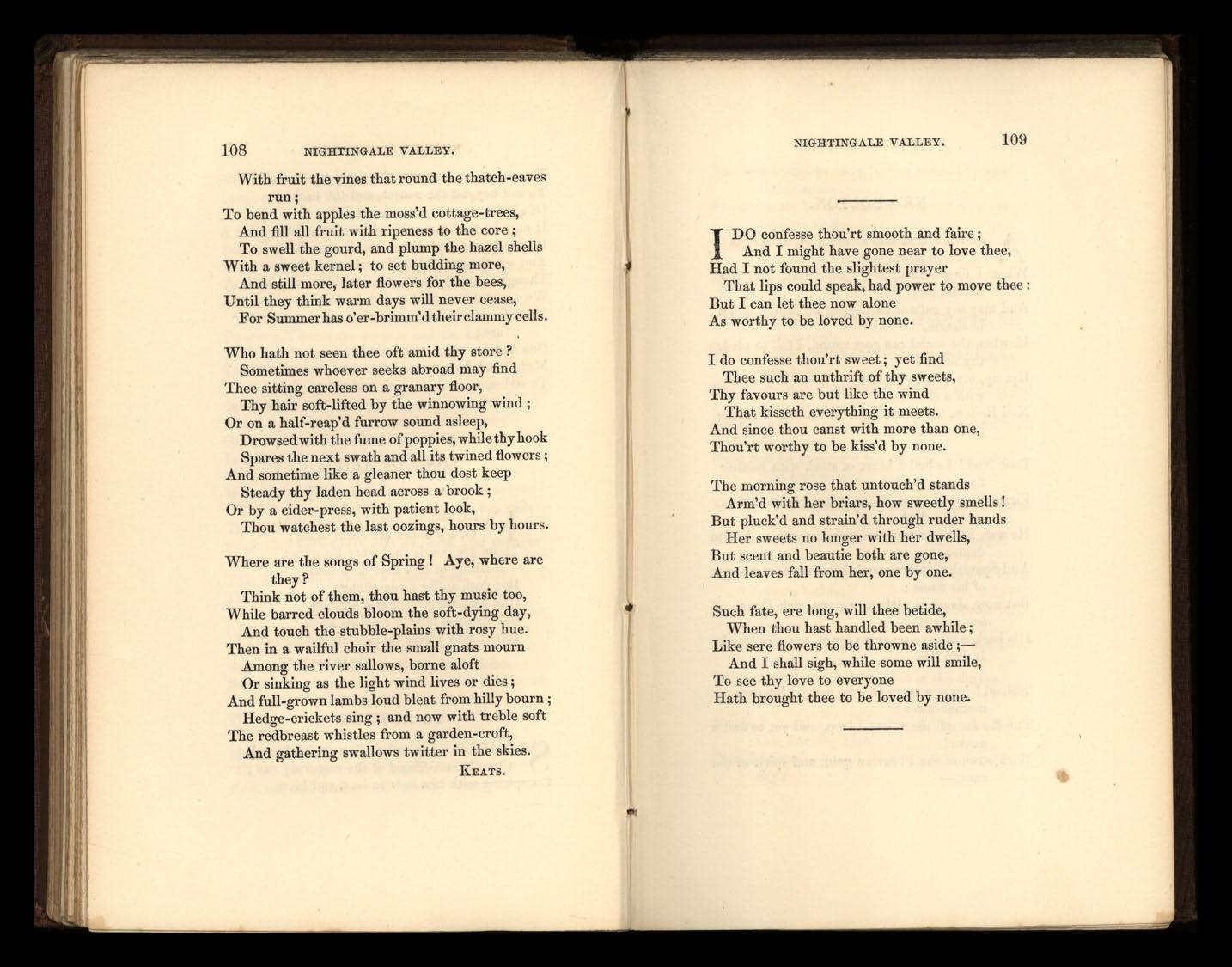
108
NIGHTINGALE VALLEY.
With fruit the vines that round the thatch-eaves run;
To bend with apples the moss'd cottage-trees, And fill all fruit with ripeness to the core; To swell the gourd, and plump the hazel shells
With a sweet kernel; to set budding more, And still more, later flowers for the bees,
Until they think warm days will never cease, For Summer has o'er-brimm'd their clammy cells.
Who hath not seen thee oft amid thy store?
Sometimes whoever seeks abroad may find
Thee sitting careless on a granary floor, Thy hair soft-lifted by the winnowing wind; Or on a hl1lf-reap'd furrow sound asleep, Drowsed with the fume of poppies, while thy hook Spares the next swath and all its twined flowers; And sometime like a gleaner thou dost keep
Steady thy laden head across a brook;
01' by a cider-press, with patient look, Thou watchest the last oozings, hours by hours.
Where are the songs of Spring! Aye, where are they?
Think not of them, thou hast thy music too, While barred clouds bloom the soft - dying day, And touch the stubble-plains with rosy hue.
Then in a wailful choir the small gnats mourn
Among the river sallows, borne aloft
Or sinking as the light wind lives or dies; And full-grown lambs loud bleat from hilly bourn; Hedge - crickets sing; and now with treble soft The redbreast whistles from a garden-croft, And gathering swallows twitter in the skies.
KEATS.
IDO confesse thou'rt smooth and faire; And I might have gone near to love thee,
Had I not found the slightest prayer
That lips could speak, had power to move thee:
But I can let thee now alone
As worthy t.o be loved by none.
I do confesse thou'rt sweet; yet find
Thee such an unthrift of thy sweets,
Thy favours are but like the wind
That kisseth everything it meets.
And since thou canst with more than one,
Thou'rt worthy to be kiss'd by none.
The morning rose that untouch'd stands
Arm'd with her briars, how sweetly smells!
But plu ck'd and strain'd through ruder hands
Her sweets no longer with her dwells,
But scent and beautie both are gone, And leaves fall from her, one by one.
Such fate, ere long, will thee betide,
When thou hast handled been awhile;
Like sere flowers to be throwne aside ;-
And I shall sigh, while some will smile,
To see thy love to everyone
Hath brought thee to be loved by none.
110
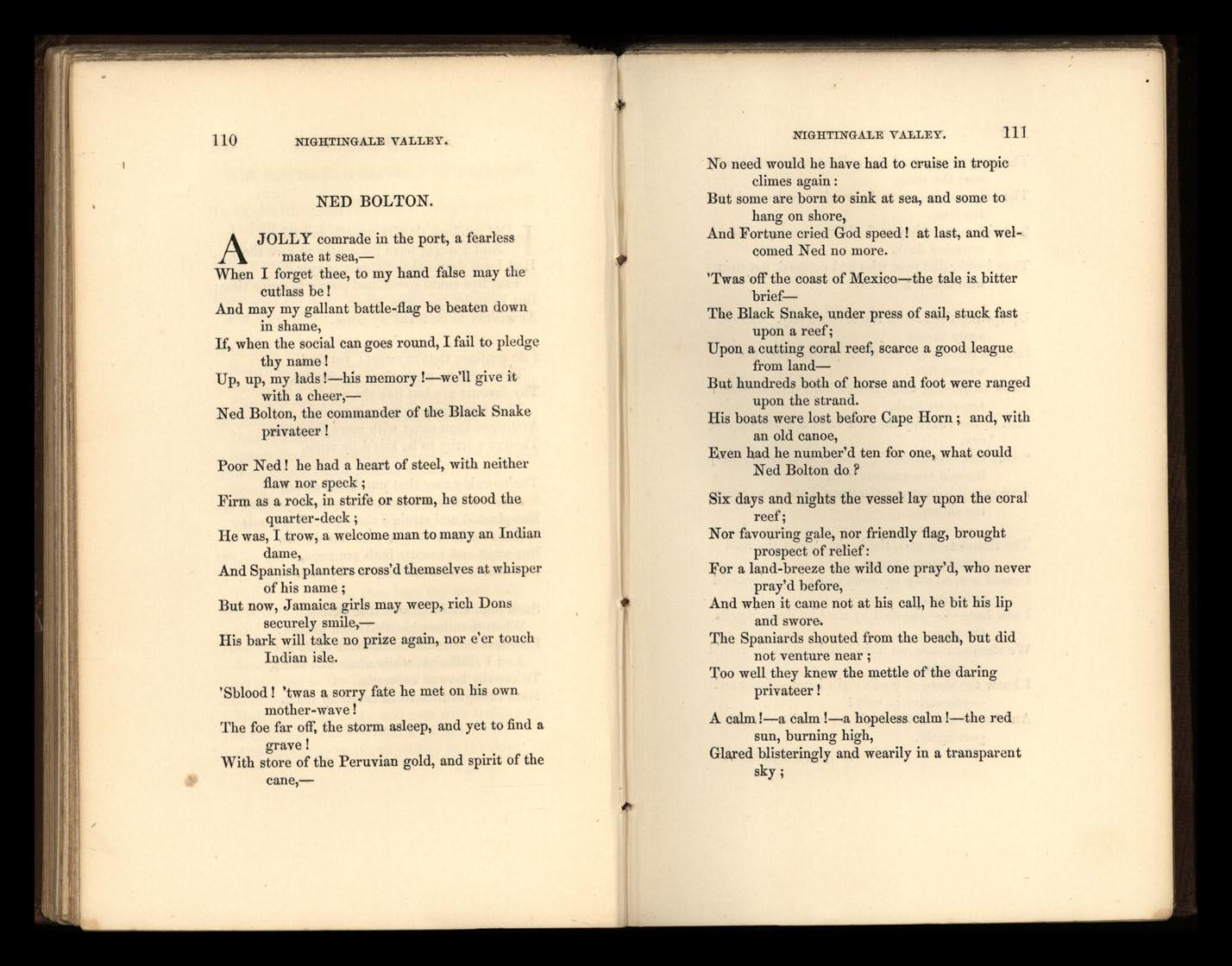
NIGHTINGALE VALLEY.
AJOLLY comrade in the port, a fearless mate at sea,-
When I forg et thee, to my hand false may the cutlass be I
And may my gallant battle-flag be beaten down in shame,
If, when the social can goes round, I fail to pl edge thy name!
Up, up, my lads I-his memory !-we'll give it with a cheer,-
N ed Bolton, the commander of the Black Snake privateer!
Poor N ed! he had a heart of steel, with neither flaw nor speck;
Firm as a rock, in strife or storm, he stood the quart er-de ck;
He was, I trow, a welcome man to many an Indian dame,
And Spanish planters cross'd themselves at whisp er of his name;
But now, Jamaica girls may weep, rich Dons securely smile,-
His bark will take no prize again, nor e'er touch Indian isle.
'Sblood! 'twas a sorry fate he met on his own moth er -wave!
The foe far off, the storm asleep, and yet to find a grave!
With store of the Peruvian gold, and spirit of the cane,-
NIGHTINGALE VilLEY. 11J
No need would he have had to cruise in tropic climes again :
But some are born to sink at sea, and some to hang on shore,
And Fortune cried God speed! at last, and welcomed N ed no more.
'Twas off the coast of Mexico-the tale is. bitter brief-
The Black Snake, under press of sail, st.uck fast upon a reef;
Upon a cutting coral reef, scarce a good league from land-
But hundreds both of horse and foot were ranged upon the strand.
His boats were lost before Cape Horn; and, with an old canoe,
Even had he number'd ten fol' one, what could N ed Bolton do. ?
Six days and nights the vessel lay upon the coral reef;
Nor favouring gale, nor friendly flag, brought prospect of relief:
:!for a land-breeze the wild one pray'd, who never pray'd before,
And when it came not at his call, he bit his lip and swore.
The Spaniards shouted from the beach, but did not venture near;
Too well they kn.ew the mettle of the daring privateer!
A calm I-a calm I-a hopeless calm I-the red sun, burning high,
Gla,red blisteringly and wearily in a transparent sky;
112
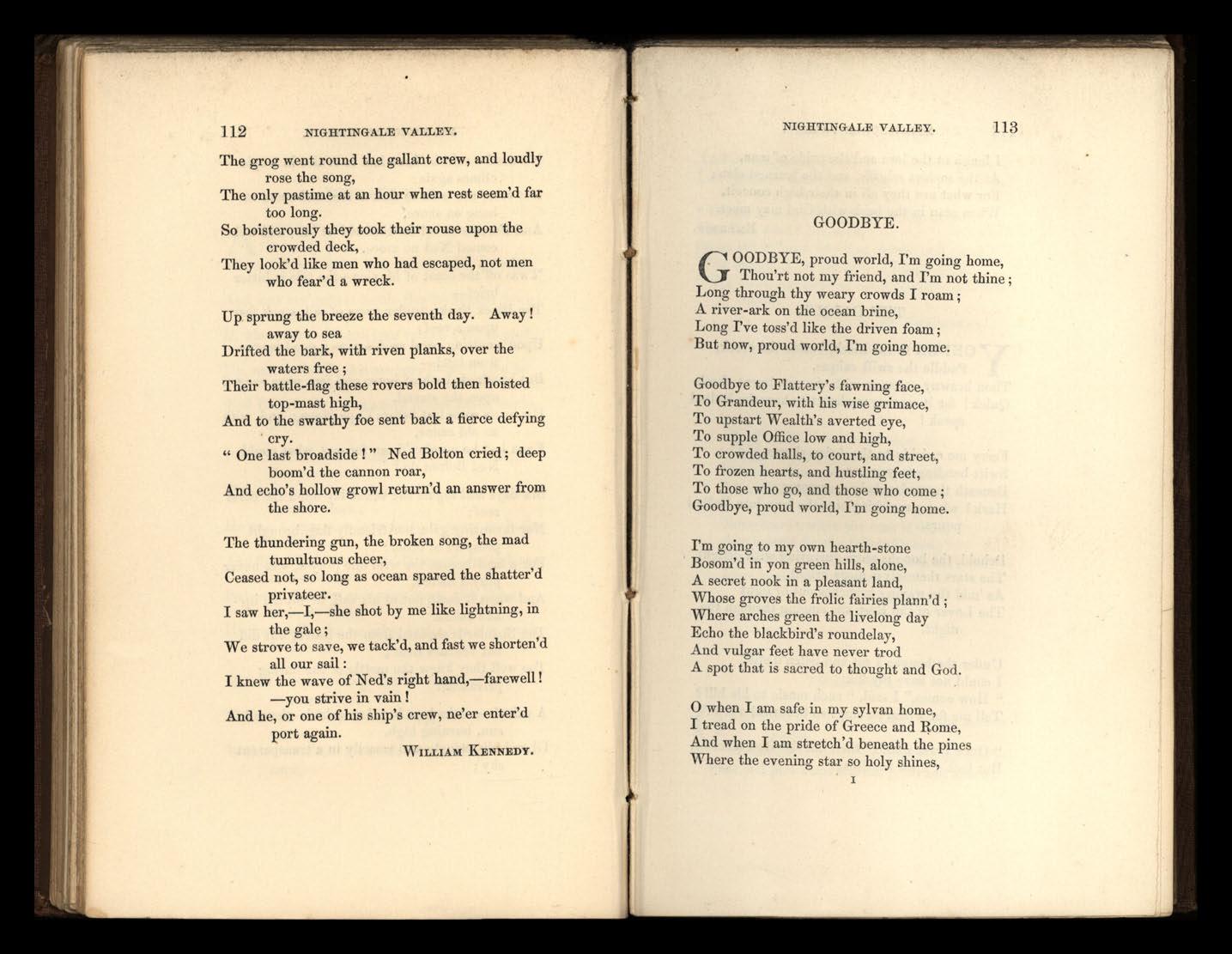
NIGHTINGALE VALLEY. 113
NIGHTINGALE VALLEY.
The grog went round the gallant crew, and loudly rose the song,
The only pastime at an hour when rest seem'd far too long.
So boisterously they took their rouse upon the crowded deck, They look'd like men who had escaped, not men who fear'd a wreck.
Up sprung the breeze the seventh day. Away! away to sea
Drifted the bark, with riven planks, over the waters free j
Their battle-flag these rovers bold then hoisted top-mast high,
And to the swarthy foe sent back a fierce defying cry.
" One last broadside!" N ed Bolton cried deep boom'd the cannon roar, And echo's hollow growl return'd an answer from the shore.
The thundering gun, the broken song, the mad tumultuous cheer, Ceased not, so long as ocean spared the shatter'd privateer.
I saw her,-I,-she shot by me like lightning, in the gttle;
We strove to save, we tack'd, and fast we shorten'd all our sail :
I knew the wave of N ed's right hand,-farewell ! -you strive in vain!
And he, or one of his ship's crew, ne'er enter'd {lort again.
WILLlAM KENNEDY.
GOODBYE.
GOODBYE, proud world, I'm going home, Thou'rt not my friend, and I'm not thine; through thy weary crowds I roam ; A rlver-ark on the ocean brine
Long I've toss'd like the foam; But now, proud world, I'm going home.
Goodbye to Flattery's fawning face, To Grandeur, with his wise grimace, To upstart Wealth's averted eye, To supple Office low and high, To crowded halls, to court, and street, To frozen hearts, and hustling feet, To those who go, and those who com e ; Goodbye, proud world, I'm going hom e.
I'm going to my own hearth-stone Bosom'd in yon green hills, alone, A secret nook in a pleasant land, Whose groves the frolic fairies plann'd ; Where arches green the livelong day Echo the blackbird's roundel ay, And vulgar feet have never trod A spot that is sa cred to thought and God.
o when I am safe in my sylvan home, I tread on the pride of Greece and And when I am stretch'd beneath the pin es Where the evening star so holy shines,
114

NIGHTINGALE VALLEY.
I lau<Yh at the lore and the pride of man, At the sophist schools, and the learned cl.Rn ; For what are they all in their high concelt, Wben man in the bush with God may meet EMERSON.
YONDER to the kiosk, beside the creek, Paddle the swift caique, I Thou brawny oarsman with the sun-burnt cheek, Quick! for it soothes my heart to hear the Bulbul speak!
Ferry me quickly to the Asian shores, Swift bending to your oars.
Beneath the melancholy sycamores Hark! what a ravishing note the love-lorn Bulbul pours.
Behold, the boughs seem quiv.erhin g with delight, The stars them selves more brig t, As 'mid the waving branches out of sight The Lover of the Rose sits singing through the night.
Under the boughs I sat and listen'd still, I could not have my fill. " Ho," comes" I said "such music to his bill?
" " I '11 "
Tell me for whom he sings so beautlfu a trl
" Once I was dumb," then did the Bird disclose, But look'd upon the Rose;
NIGHTINGALE VALLEY. 115
And in the garden where the loved-one grows I straightway did begin sweet music to compose."
" 0 bird of song, there's one in this caique The Rose would also seek, So he might learn like you to love and speak." Then answer'd me the bird of dusky beak, " The Rose, the Rose of Love blushes on Leilah 's cheek."
W. M. THACKERAY.
MUSIC, when soft voices die, Vibrates in the memory; Odours, when sweet violets sicken, Live within the sense they quicken.
Rose-leaves, when the rose is dead, Are heaped for the beloved's bed; And so thy thoughts, when thou art rrone Love itself shall slumber on. ."
SHELLEY.
OUNKNOWN Belov'd One! to the mellow season
Branches in the lawn make drooping bow'rs; Vase and plot burn scarlet, gold, and azure;
116

NIGHTINGALE VALLEY.
Honeysuckles wind the tall grey turret, And pale passion-flow'rs.
Come thou, come thou to my lonely thought, o Unknown One.
Now at evening twilight, dusky dew down-wavers, Soft stars crown the grove-encircled hill ;
Breathe the new-mown meadows, broad and misty; Through the heavy grass the rail is talking; All beside is still.
Trace with me the wandering avenue, o Unknown Belov'd One.
In the mystic realm, and in the time of visions, I thy lover have no need to woo; There I hold thy hand in mine, thou dearest, And thy soul in mine, and feel its throbbing, Tender, deep, and true: Then my tears are love, and thine are love, o Unknown Belov'd One.
I s thy voice a wavelet on the listening darkness? Are thine eyes unfolding from their veil ?
Wilt thou come before the signs of winterDays that shred the bough with trembling fingers, Nights that weep and wail?
Art thou Love indeed, or art thou Death, o Unknown Belov'd One?
WlLLIAM ALLINGBAM.
THE BLOSSOM.
MERRY, merry Sparrow!
Under leaves so green
A happy Blossom
NIGHTINGALE VALLEY. 117
Sees you, swift as arrow, Seek your cradle narrow, Near my bosom.
Pretty, pretty Robin! Under leaves so green A happy Blossom
Hears you sobbing, sobbing, Pretty, pretty Robin, Near my bosom.
WlLLlAlI1 BLAKE.
SONNET. [LOVE'S SLAVE.]
your slave, what should I do but tend
Upon the hours and times of your desire?
I have precious time at all to spend, Nor serViCes to do, till you require. Nor dare I chide the world-without-end hour Whilst. I, my Sovereign, watch the clock for ;ou, Nor thmk the bitterness of absence sour, When you have bid your servant once adieu; Nor dare I question with my jealous thought Wher? you may be, or your affairs suppose, But, hke a sad slave, stay and think of nought, Save, where you are how happy you make those: So true a fool is love, that in your will (Though you do anything) he thinks no ill.
SHAKESPEARE.
1]8 NIGHTINGALE VALLEY. SONG.
GO, lovely rose!
Tell her, that wastes her time and me, That now she knows, When I resemble her to thee, How sweet and fair she seems to be.
Tell her, that's young And shuns to have her graces spy'd, That hadst thou sprung In deserts where no men abide, Thou must have uncommended dy'd.
Small is the worth Of beauty from the light retired: Bid her come forth, Suffer herself to be desired, And not blush so to be admired.
Then die I that she The common fatc of all things rare May read in thee: How small a part of time they share That are so wondrous sweet and fair.
EDMuND
W ALLER.
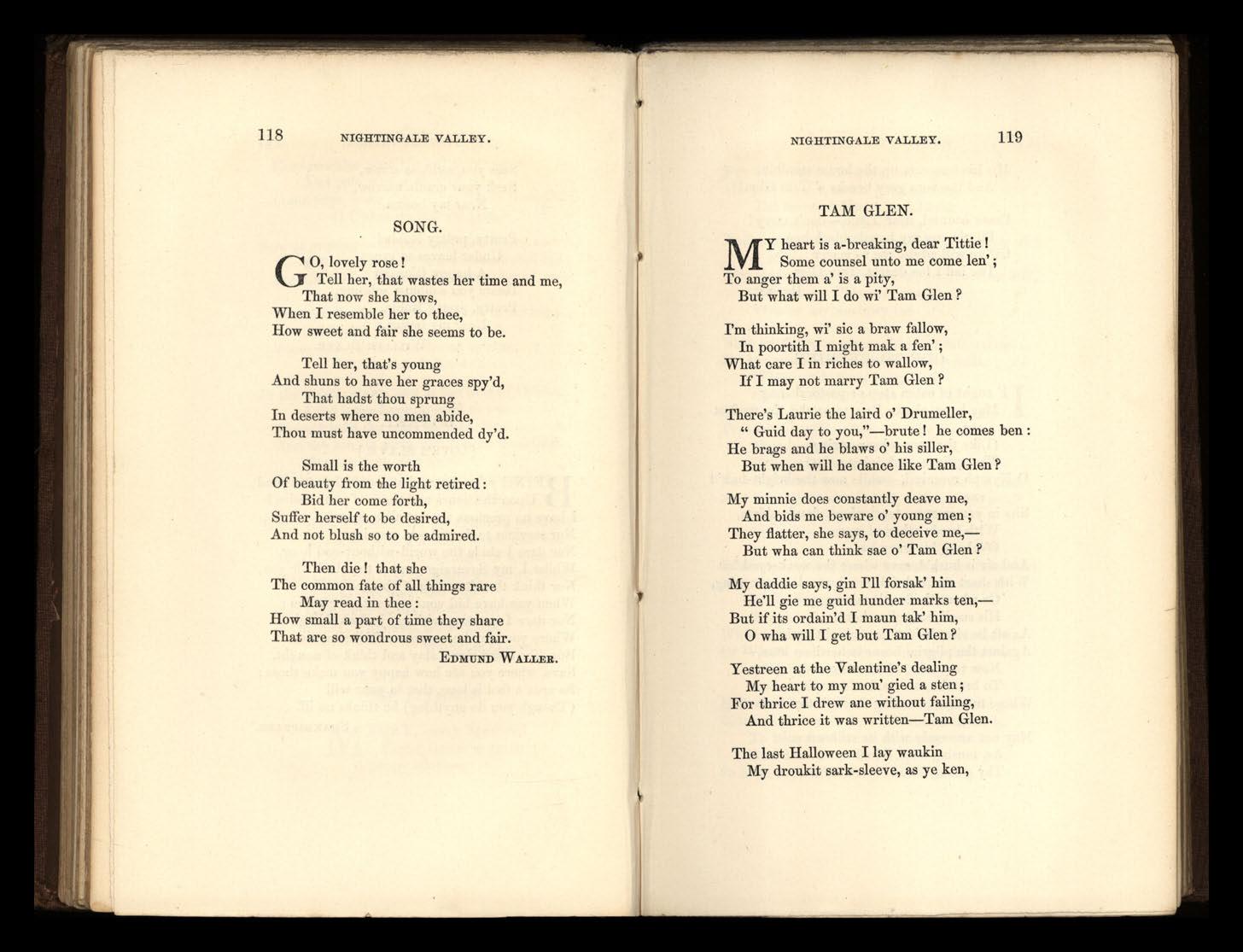
NIGHTINGALE VALLEY. TAM GLEN.
My heart is a-breaking, dear Tittie ! Some counsel unto me come len' ; To anger them a' is a pity, But what will I do wi' Tarn Glen?
I'm thinking, wi' sic a braw fallow, In poortith I might mak a fen' ; What care I in riches to wallow, If I may not marry Tarn Glen?
There's Laurie the laird 0' Drumeller,
" Guid day to you,"-brute! he comes ben: He brags and he blaws 0' his siller, But when will he dance like Tarn Glen?
My minnie does constantly deave me, And bids me beware 0' young men; They flatter, she says, to deceive me,But wha can think sae 0' Tarn Glen?
My daddie says, gin I'll forsak' him He'll gie me guid hunder marks ten,But if its ordain'd I maun tak' him, o wha will I get but Tarn Glen?
Yestreen at the Valentine's dealing
My heart to my mou' gied a sten; For thrice I drew ane without failing, And thrice it was written-Tarn Glen.
The last Halloween I lay waukin
My droukit sark-sleeve, as ye ken,
County Library Service
120

NIGHTINGALE VALLEY.
His likeness cam up the house staulkin,
And the vera grey breeks 0' Tam Glen!
Come counsel, dear Tittie,-don't tarry!
I'll gie you my bonnie black hen
Gif ye will advise me to marry
The lad I loe dearly, Tam Glen.
IF aught of oaten stop or pastoral song
May hope, chaste Eve, to soothe thy modest ear
(Like thy own solemn springs,
Thy springs, and dying gales);
o Nymph reserved,-while now the bright-hair'd sun
Sits in yon western tent, whose cloudy skirts,
With brede ethereal wove,
O'erhang his wavy bed,
And air is hush'd, save where the weak-eyed bat
With short shrill shriek flits by on leathern wing,
Or where the beetle winds
His small but sullen horn,
As oft he rises 'midst the twilight path,
Against the pilgrim borne in heedless hum,-
Now teach me, Maid composed,
To breathe some soften'd strain,
Whose numbers, stealing through thy darkening vale,
May not unseemly with its stillness suit,
As, musing slow, I hail
Thy genial, loved return!
NIGHTINGALE VALLEY.
For when thy folding-star arising shows
His paly circlet, at his warning lamp
The fragrant Hours, and Elves
Who slept in buds the day,
And many a Nymph who wreathes her brow with sedge
And sheds the freshening dew, and, lovelier still,
The pensive Pleasures sweet,
Prepare thy shadowy car.
Then let me rove some wild and heathy scene;
Or find some ruin 'midst its dreary dells,
Whose walls more awful nod
By thy religious gleams.
Or if chill blustering winds or driving rain
Prevent my willing feet, be mine the hut
That from the mountain-side
Views wilds, and swelling floods,
And hamlets brown, and dim-discover'd spires,
And hears their simple bell, and marks o'er all
Thy dewy fingers draw
The gradual dusky veil.
While Spring shall pour his showers, as oft he wont, And bathe thy breathing tresses, meekest Eve!
While Summer loves to sport
Beneath thy lingering light:
While sallow Autumn fills thy lap with leaves, Or Winter, yelling through the troublous air, Atfrights thy shrinking train,
And rudely rends thy robes,
[Till thou hast refuged where the cheerful glow
Bids welcome, and the wind-unshaken lamp,
To household mirth and song,
And dear domestic joy :]
So long, regardful of thy quiet rule,
122

NIGHTINGALE VAr,LEY.
Shall Fancy, Friendship, Science, smiling Peace, Thy gentlest influence own, And love thy favourite name!
W lLLIAM COLLINS.
YOU thought my heart too far diseased; You wonder when my fancies play
To find me gay among the gay, Like one with any trifle pleased.
The shade by which my life was crost, Which makes a desert in the mind, Has made me kindly with my kind, And like to him whose sight is lost;
'Whose feet are guided t.hrough the land, Whose jest among his friends is free, Who takes the children on his knee, And winds their about his hand:
He plays with threads, he beats his chair For pastime, dreaming of the sky; His inner day can never die, His night of loss is always there. In Memoriam.
NIGHTINGALE VALLEY.
THE LADY'S YES.
" Y ES!" I answer'd you last night; "No!" this morning, Sir, I say. Colours, seen by candle-light, Will not look the same by day.
When the tabors play'd their best, Lamps above, and laughs belowLove me sounded like a jest, Fit for Yes or fit for No !
Call me false, or call me freeVow, whatever light may shine, No man on thy face shall see Any grief for change on mine.
Yet the sin is on us bothTime to dance is not to wooWooer light makes fickle trothScorn of me recoils on you!
Learn to win a lady'S faith Nobly, as the thing is high; Bravely, as for life and deathWith a loyal gravity.
Lead her from the festive boards, Point her to the starry skies, Guard her, by your faithful words, Pure from courtship's flatteries.
NIGHTINGALE VALLEY. 125

124
NIGHTINGALE VALLEY.
By your truth she shall be true-
Ever true, as wives of yore-
And her Yes, once said to you, SHALL be Yes for evermore
ELIZABETH BARRETT BROWNING.
far than summer's flight,
Swifter far than youth's delight,
Swifter far than happy night,
Art thou come, art thou gone:
As the earth when leaves are dead,
As the night when sleep is sped,
As the heart when joy is fled, I am left lone, alone.
The swallow Summer comes again,
The owlet Night resumes her reign,
But the wild swan Youth is fain
To fly with thee, false as thou .
My heart each day desires the morrow,
Sleep itself is turn'd to sorrow,
Vainly would my winter borrow
Sunny leaves from any bough.
Lilies for a bridal bed,
Roses for a matron's head,
Violets for a maiden dead,-
Pansies let my flowers be :
On the living grave I bear
Scatter them without a tear;
Let no friend, however dear, Waste one hope, one fear for me.
SHELLEY.
COME, see the Dolphin's anchor forged-'tis at a white heat now:
The bellows ceased, the flames decreased-though on the forge's brow
The little flames still fitfully play through the sable mound,
And fitfully you still may see the grim smiths ranking round,
All clad in leathern panoply, their broad hands only bare-
Some rest upon their sledges here, some work the windlass there .
The windlass strains the tackle chains, the black mound heaves below,
And red and deep a hundred veins burst out at every throe :
It rises, roars, rends all outright-O, Vulcan, what a glow!
'Tis blinding white, 'tis blasting bright-the high sun shines not so !
The high sun sees not, on the earth, such fiery fearful show;
The roof-ribs swarth, the candent hearth, the ruddy lurid row
Of smiths that stand, an ardent band, like men before the foe.
As, quivering through his fleece of flame, the sailing monster, slow
Sinks on the anvil-all about the faces fiery grow.
126
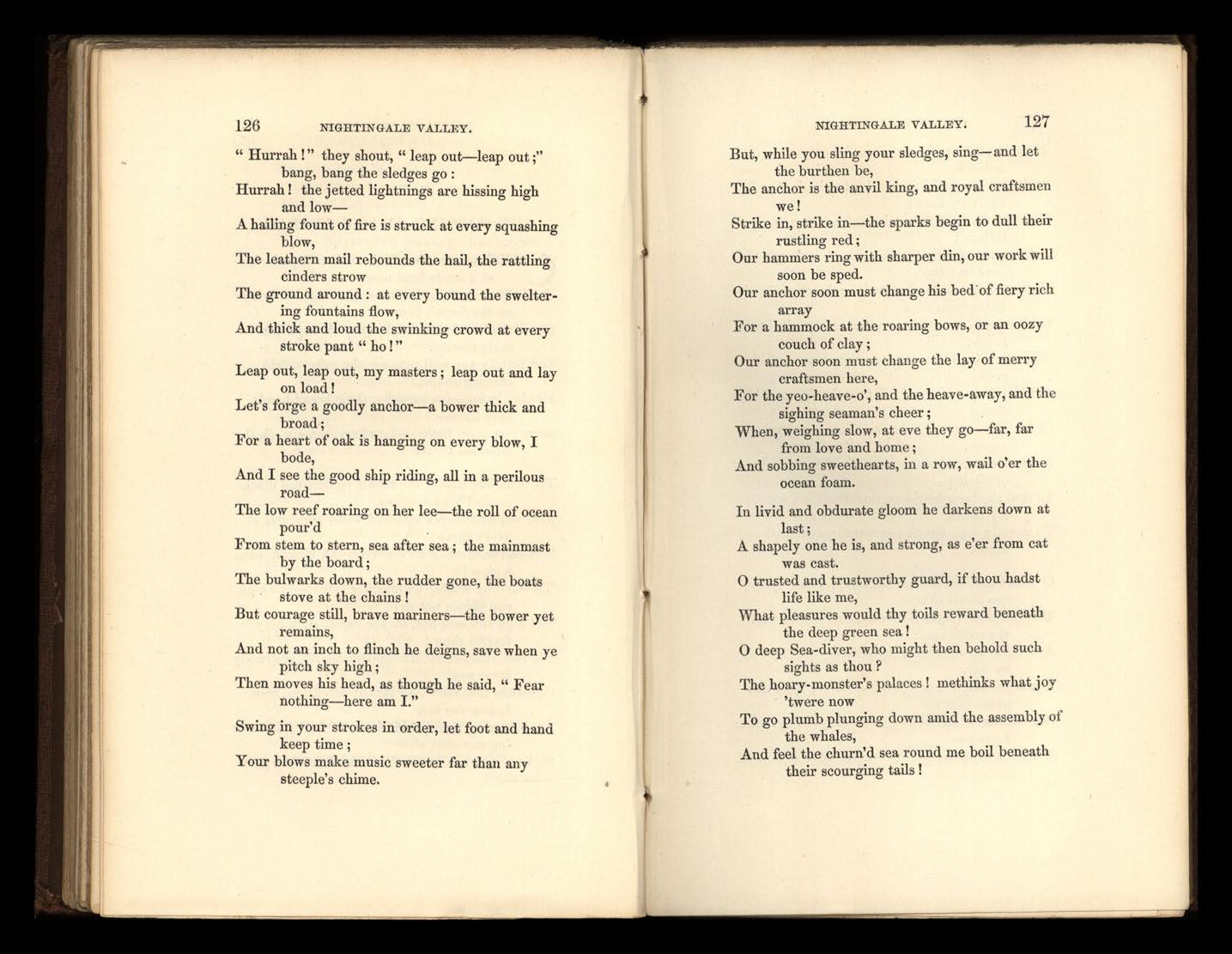
NIGHTINGALE VALLEY.
" Hurrah!" they shout, " leap out-leap out;" bang, bang the sledges go :
Hurrah! the jetted lightnings are hissing high and Iow-
A hailing fount of fire is struck at every squashing blow,
The leath ern mail rebounds the hail, the rattling cinders strow
The ground around: at every bound the sweltering fountains flow,
And thick and loud the swinking crowd at every stroke pant" ho ! "
Leap out, leap out, my masters; leap out and lay on lo ad !
Let's forge a goodly anchor-a bower thick and broad;
For a heart of oak is hanging on every blow, I bode,
And I see the good ship riding, all in a perilous road-
The low reef roaring on her lee-the roll of ocean pour'd .
From stem to stern, sea after sea; the mainmast by the board;
The bulwarks down, the rudder gone, the boats stove at the chains!
But courage still, brave mariners-the bower yet remains,
And not an in ch to flinch he deigns, save when ye pitch sky high;
Then moves his head, as though he said, " Fear nothing-here am 1."
Swing in your strokes in order, let foot and hand keep time;
Your blows make music sweeter far than any steeple's chime.
NIGHTINGALE VALLEY. 127
But, while you sling your sledges, sing-and let the burthen be,
The anchor is the anvil king, and royal craftsmen we!
Strike in, strike in-the sparks begin to dull their rustling red;
Our hammers ring with sharper din, our work will soon be sped.
Our anchor soon must change his bed ' of fiery rich array
For a hammock at the roaring bows, or an oozy couch of clay;
Our anchor soon must change the lay of merry craftsmen here,
For the yeo-heave-o', and the heave-away, and th e sighing seaman's cheer ;
When, weighing slow, at eve they go-far, far from love and home;
And sobbing sweethearts, in a row, wail o'er the ocean foam.
In livid and obdurate gloom he darkens down at last;
A shapely one he is, and strong, as e'er from cat was cast.
o trusted and trustworthy guard, if thou hadst life like me,
What pleasures would thy toils reward beneath the deep green sea !
o deep Sea-diver, who might then behold such sights as thou?
The hoary-monster's palaces! methinks what joy 'twere now
To go plumb plunging down amid the assembly of the whales,
And feel the chllrn'd sea round me boil beneath their scourging tails!
128
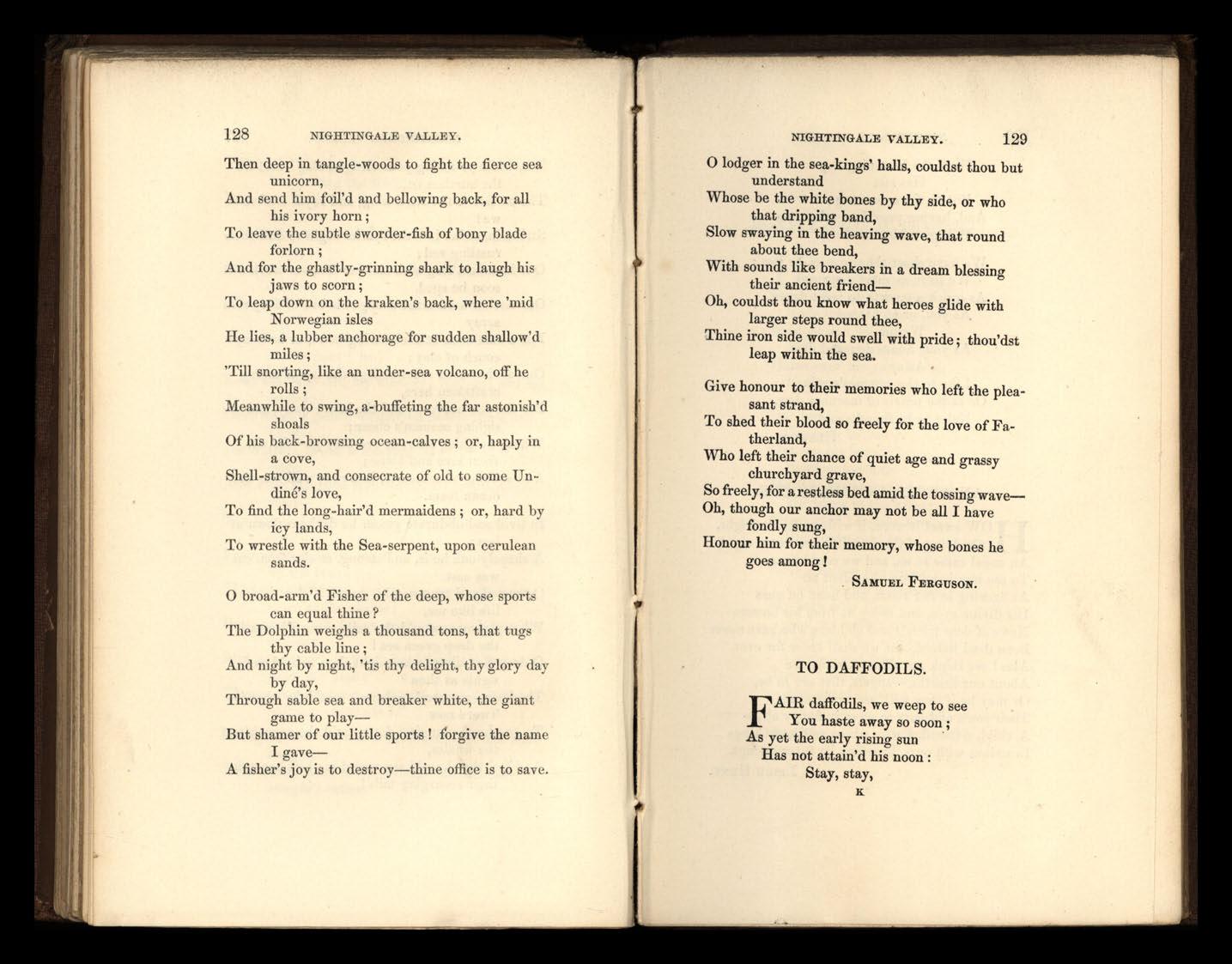
NIGHTINGALE VALLEY.
Then deep in tangle-woods to fight the fi erce sea unicorn,
And send him foil'd and bellowing back, for all hi s ivory horn ;
To l eave the subtle sworder -fish of bony blade forlorn;
And for the ghastly -grinning shark to laugh hi s jaws to scorn ;
To l eap down on the kraken's back , where 'mid Norwegian isles
He li es, a lubber anchorage for sudden shallow ' d miles;
'Till snorting, lik e an under -sea volcano, off he rolls;
Meanwhile to swing, a -buffeting the far astonish'd shoals
Of his back-browsing ocean-calves; or, haply in a cove,
Shell-strown, and consecrate of old to some Undin e' s l ove,
To find the long-hair'd mermaidens; or, hard by icy land s,
To wrestl e with the Sea-serpent, upon cerulean sands .
o broad- arm'd Fish er of the deep, whose sports can equal thine?
The Dolphin weighs a thousand tons, that tugs thy cable line;
And ni g ht by night, 'tis thy delight, thy glory day by day,
Through sable sea and breaker white, the giant game to play-
But shamer of our little spor t s! forgive the nam e I gave-
A fisher's j oy is to destroy-thine office is to save.
NIGHTINGALE VALLEY. 129
o lodger in the sea-kings' halls, couldst thou but understand
Whose be the white bones by thy side, or who that dripping band,
Slow swaying in the heaving wave, that round about thee bend,
With sounds like breakers in a dream blessing their ancient friend-
Oh, couldst thou know what heroes glide with larger steps round thee,
Thine iron side would swell with pride; thou'dst leap within the sea.
Give honour to their memories who left the pleasant strand,
To shed their blood so freely for the love of F atherland,
Who left their chance of quiet age and grassy churchyard grave,
So freely, for a restless bed amid the tos sing wave-
Oh, though our anchor may not be all I have fondly sung,
Honour him for their memory, whose bones he goes among!
SAMUEL FERGUSON.
FAIR daffodils, we weep to see
You haste away so soon; As yet the early rising sun . Has not attain'd his noon : Stay, stay, K
130
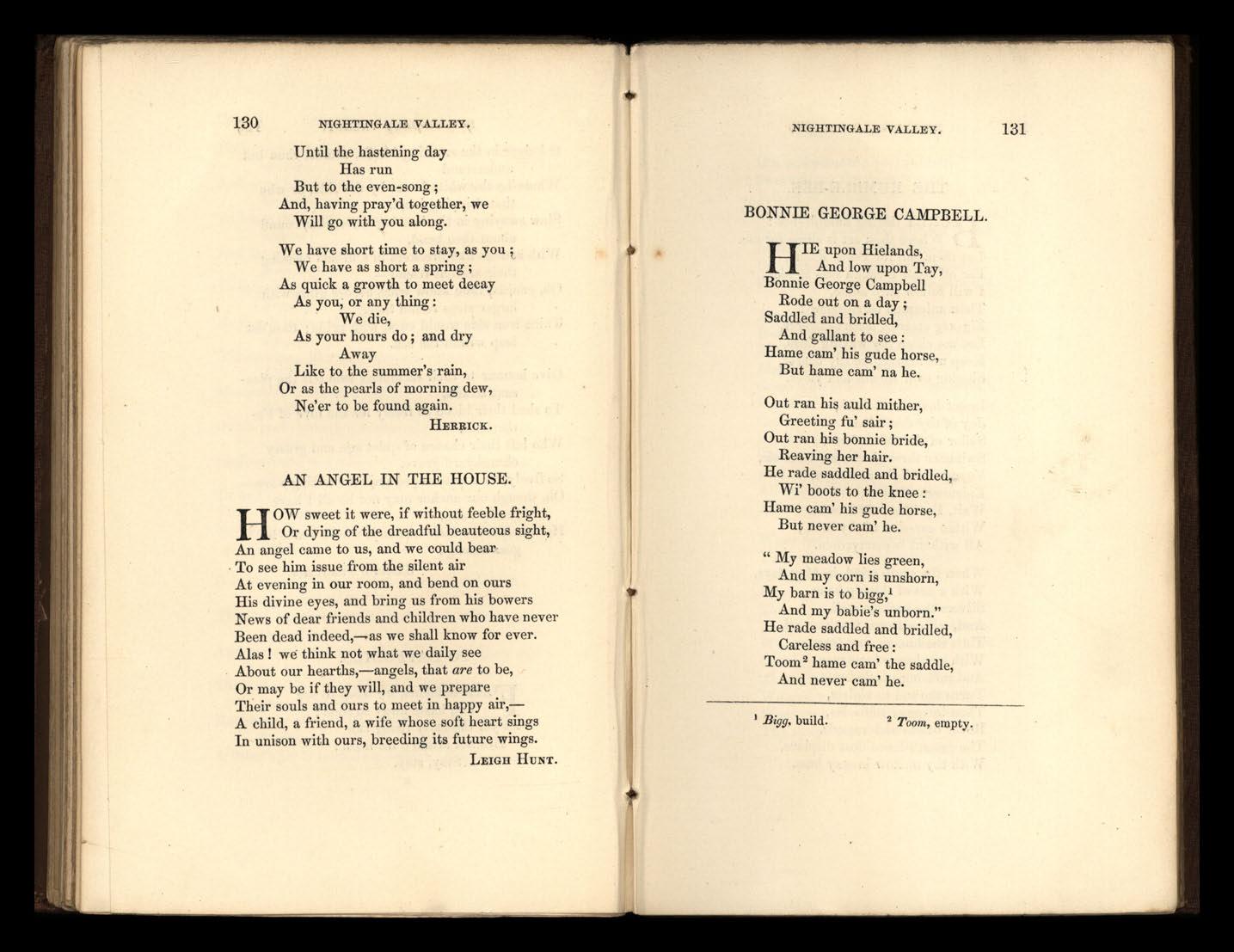
NIGHTINGALE VALLEY.
Until the hastening day Has run
But to the even-song;
And, having pray'd together, we Will go with you along.
We have short time to stay, as you i
We have as short a spr ing;
As quick a growth to meet decay
As you, or any thing: We die,
As your hours do; and dry
Away
Like to the summer's rain,
Or as th e pearls of morning dew,
Ne'er to be found again.
HERRI CK.
AN ANGEL IN THE HOUSE.
HOW sweet it were, if without feeble fright,
Or dying of the dreadful beauteous sight,
An angel came to us, and we could bear
. To see him issue from the silent air
At evening in our room, and bend on ours
His divine eyes, and bring us from his bowers
News of dear friends and children who have nev er
Been d ea d indeed,-as we shall know for ev er.
Ala.s! we' think not what we ' daily see
About our hearths,-angels, that are to be,
Or may be if they will, and we prepare
Th eir souls and ours to meet in happy air,-
A child, a friend, a wife whose soft heart sings
In uni son with ours, breeding its future wings.
LEIGH HUNT.
NIGHTINGALE VALLEY.
BONNIE GEORGE CAMPBELL.
HIE upon Hielands, And low upon Tay
Bonnie George Ca.mpbell '
Rode out on a day; Saddled and bridled
And gallant to se: :
Hame cam' hi s gude hors e, But hame cam' na he.
Out ran his auld mither, Greeting fu' sair; Out ran his bonnie bride
Reaving her hair. '
He rade saddled and bridled
Wi' boots to the kne e: ' Hame cam' his gude horse, But never cam' he.
" My meadow lie s green, And my corn is unshorn, My barn is to bigg,1 And my babie's unborn."
He rade saddled and bridled, Careless and free:
Toom 2 hame cam' the saddl e And never cam' he. '
I Bigg. build. 2 Toom, empty.
NIGHTINGALE VALLEY.
dozing humble-bee!
Where thou art is clime for me.
Let them sail for Porto Rique, Far off heats through seas to seek, I will follow thee alone, Thou animated torrid-zone 1 Zig-zag steerer, desert-cheerer, Let me chase thy waving lines, Keep me nearer, me thy hearer, Singing over shrubs and vines.
Insect-lover of the sun, Joy of thy dominion!
Sailor of the atmosphere, Swimmer through the waves of air, Voyager of light and noon, Epicurean of June, ''Vait, I prithee, till I come Within ear-shot of thy hum j All without is martyrdom.
When the south wind, in May days, With a net of shining haze
Silvers the horizon wall, And, with softness touching all, Tints the human countenance With a colour of romance, And infusing subtle heats, Turns the sod to violets, Thou in sunny solitudes, Rover of the underwoods, The green silence dost displace, With thy mellow breezy bass.

NIGHTINGALE VALLEY.
Hot midsummer's petted crone, Sweet to me thy drowsy tone, Telling of countless sunny hours, Long days, and solid banks of flowers, Or gulfs of sweetness without bound In Indian wildernesses found, Of Syrian peace, immortal leisure, Firmest cheer and bird-like pleasure.
Aught unsavoury or unclean, Hath my insect never seen, But violets and bilberry bells, Maple sap and daffodels, Grass with green flag half-mast high, Succory to match the sky, Columbine with horn of honey, Scented fern, and agrimony, Clover, catch-fly, adder's-tongue; And briar-roses dwelt among j All beside was unknown waste, All was picture as he pass'd.
Wiser far than human seer, Yellow-breech'd philosopher!
Seeing only what is fair, Sipping only what is sweet, Thou dost mock at fate and care. Leave the chaff and take the wheat.
When the fierce north-western blast
Cools sea and land so far and fast, Thou already slumberest deep,Wo and want thou canst outsleep,Want and wo which torture us, Thy sleep makes ridiculous. EMERsoN.
134

NIGHTINGALE VALLEY.
DISDAIN RETURNED.
HE that loves a rosie cheeke, Or a coralllip admires,
Or from star-like eyes doth seeke Fuel to maintain his fires'
As old Time makes these de'cay
So his flames must waste away.'
But a smooth and stedfast minde
Gentle thoughts and calm desh-es
Hearts with equal love combined ' Kindle never-dying fires. '
Where these are not, I despise
Lovely cheekes, or lips, or eyes.
No tears, Celia, now shall win
My resolved hearte to return'
I have search'd thy soul within,'
And find nought but pride and scorn ' I have learn'd thy arts, and now '
Can disdain as much as thou.
THOMAS CAREW.
AULD ROBIN GRAY.
WHEN the sheep are in the fauld and the kye at hame,
And a' the weary warld to sleep are gane, The. waes 0' my heart fa' in showers frae my e'e; WhIle my gudeman lies sound by me.
135
NIGHTINGALE VALLEY.
Young Jamie lo'ed me weel, and sought me for his bride;
But saving a crown he had naething else beside.
To mak' the crown a pound, my J amie gaed to sea; And the crown and the pound were baith for me.
He hadna been gane a year and a day,
When my father brake his arm, and our cow was stown away;
My mither she fell sick, and J amie at the sea j
And Auld Robin Gray cam' a - courting me.
My father couldna' work, and my mither doughtna spin,
I toil'd day and night, but their bread I couldna win;
Auld Rab maintain'd them baith, and wi' tears in his e'e,
Said, " Jenny, for their sakes, 0 marry me!"
My heart it said na j I look'd for J amie back j
But the wind it blew high, and the ship it was a wrack;
His ship it was a wrack,-why didna Jenny dee?
o why do I live, to cry, Wae's me !
My father urgit sair, my mither didna speak, But she lookit in my face till my heart was like to break.
They gied him my hand, though my heart was at the sea
Sae Auld Robin Gray he is gudeman to me.
I hadna been a wife a week but only four, When sitting sae mournfully ae night at the door, I saw my J amie's wraith, for I couldna think it he, Till he said, " I'm come back, love. to marry thee."
136

NIGHTINGALE VALLEY.
o sair did we greet, and muckle did we say; We took but ae kiss, and we tore ourselves away.
I wish that I wet.e dead, but I'm no like to dee.
o why do , I live, to say, Wae's me!
I gang like a ghaist, and I carena to spin.
I darena think on Jamie, for that 'wad be a sin.
But I'll do my best a gude wife to be; For Auld Robin Gray is kind to me.
LADY ANNE LINDSAY.
SONG.
[FROM" ZAPOLYA."]
ASUNNY shaft did I behold,
From sky to earth it slanted,
And poised therein a bird so bold,-
Sweet bird, thou wert enchanted!
He sank, he rose, he twinkled, he troll'd
Within that shaft of sunny mist; His eyes of fire, his beak of gold, All else of amethyst.
And thus he sang, " Adieu! adieu!
Love's dreams prove seldom true. The blossoms they make no delay, The sparkling deWdrops will not stay.
Sweet month of May, We must away, Far, far away!
To-day! to-day!"
COLERlDGE. . ,
NIGHTINGALE VALLEY. 137 SONNET.
MARY QUEEN OF SCOTS.
(LANDING AT THE MOUTH OF THE DERWENT, WORKINGTON.)
D
E AR to the Loves and to the Graces vow'd, The Queen drew back the wimple that she wore;
And to the throng, that on the Cumbrian shore
Her landing hail'd, how touchingly she bow'd!
And like a Star (that, from a heavy cloud
Of pine-tree foliage poised in air, forth darts,
When a soft summer gale at evening parts
The gloom that did its loveliness enshroud)
She smiled; but Time, the old Saturnian Seer, Sigh'd on the wing as her foot press'd the strand, With step prelusive to a long array
Of woes and degradations hand in hand-
Weeping captivity, and shuddering fear
Still'd by the ensanguined block of Fotheringay.
W ORDSWORTH.
LINES COMPOSED IN A CONCERT ROOM.
• • * * *
O
GIVE me, from this heartless scene released,
To hear our old musician, blind and gray, (Whom stretching from my nurse's arms I kiss 'd)
138

NIGHTINGALE VALLEY.
His Scottish tunes and warlike marches play, By moonshine, on the balmy summer -ni ght,
The while I dance amid the tedded hay With merry maids, whose ringlets toss in light.
Or lies the purple evening on the bay Of the calm glossy lake, 0 let me hide
Unheard, unseen, behind the alder-trees, For round their roots the fisher's boat is tied, On whose trim seat doth Edmund stretch at ease, And while the lazy boat sways to and fro,
Breathes in his flute sad airs, so wild and slow,
That cheek is wet with quiet tears.
But 0, dear Anne! when midnight wind careers, And the gust pelting on the out -house shed
Makes the cock shrilly on the rain-storm crow,
To hear thee sing some ballad full of woe, Ballad of ship-wreck'd sailor floating dead
Whom his own true-love buried in the sands!
Thee, gentle woman, for thy voice re-measures
Whatever tones and melancholy pleasures
The things of Nature utter; birds or trees
Or moan of ocean-gale in weedy caves, Or, when the stiff grass 'mid the heath-plant waves, Murmur and music thin of sudden breeze.
COLERIDGE.
[FROM" A MIDSUMMER NIGHT'S DREAM."]
Fairy. OVER hill, over dale, Thorough bush, thorough briar,
Over park, over pale, Thorough flood, thorough fire,
I do wander everywhere, Swifter than the moone's sphere; And I serve the Fairy Queen
To dew her orbs upon the green:
The cowslips tall her pensioners be
In their gold coats spots you see, , These be rubies, fairy favours,
In those freckles live their savours:
I must go seek some dewdrops here,
And hang a pearl in every cowslip's ear.
SHAKESPEARE.
TWO children in two neighbour villages
Playing mad pranks aIong the heathy l eas;
Two strangers meeting at a festival ;
Two lovers whispering by an orchard wall,
Two lives bound fast in one with 'golden e;se;
Two graves grass -green beside a gray churchtower,
Wash'd with still rains and daisy-blossomed'
Two children in one hamlet born and bred;'
So runs the round of life from hour to hour.
TENNYSON.
I.
MARY, go and call the cattle home, And call the cattle home, And call the cattle home, Across the sands 0' Dee :"
140
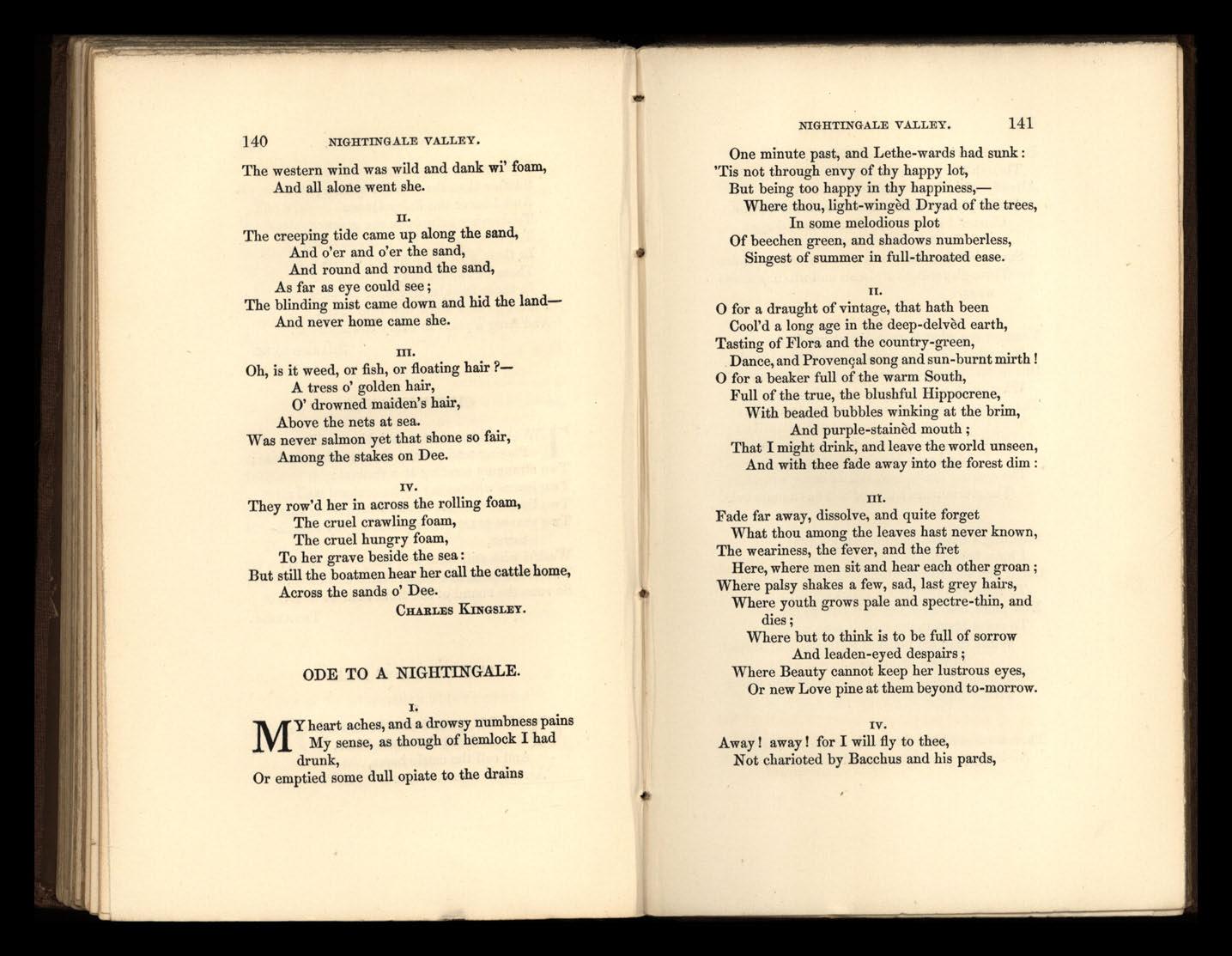
NIGHTINGALE VALLEY.
The western wind was wild and dank wi' foam, And all alone went she.
n.
The creeping tide came up along the sand, And o'er and o'er the sand, And round and round the sand,
As far as eye could see; The blinding mist came down and hid the landAnd never home came she.
III.
Oh, is it weed, or fish, or floating hair ?-
A tress 0' golden hair, 0' drowned maiden's hair, Above the nets at sea.
Was never salmon yet that shone so fair, Among the stakes on Dee.
IV.
They row'd her in across the roIling foam, The cruel crawling foam, The cruel hungry foam, To her grave beside the sea: But still the boatmen hear her call the cattle home, Across the sands 0' Dee.
CHARLES KINGSLEY.
MODE TO A NIGHTINGALE.
I.
Yh eart aches, and a drowsy numbness pains
My sense, as though of hemlock I had drunk, Or emptied some dull opiate to the drains
NIGHTINGALE VALLEY.
141
One minute past, and Lethe-wards had sunk : 'Tis not through envy of thy happy lot, But being too happy in thy happiness,Where thou, light-winged Dryad of the trees, In some melodious plot Of beechen green, and shadows numberless, Singest of summer in full-throated ease.
1I.
o for a draught of vintage, that hath been Cool'd a long age in the deep-delved earth, Tasting of Flora and the country-green, Dance, and Proven<;al song and sun-burnt mirth! o for a beaker full of the warm South, Full of the true, the blushful Hippocrene, With beaded bubbles winking at the brim, And purple-stained mouth; That I might drink, and leave t.he world unseen, And with thee fade away into the forest dim:
lIt.
Fade far away, dissolve, and quite forget What thou among the leaves hast never known, The weariness, the fever, and the fret Here, where men sit and hear each other groan ; Where palsy shakes a few, sad, last grey hairs, Where youth grows pale and spectre-thin, and dies;
Where but to think is to be full of sorrow And leaden-eyed despairs; Where Beauty cannot keep her lustrous eyes, Or new Love pine at them beyond to-morrow.
IV.
Away! away! for I will fly to thee, Not charioted by Bacchus and his pards,
142
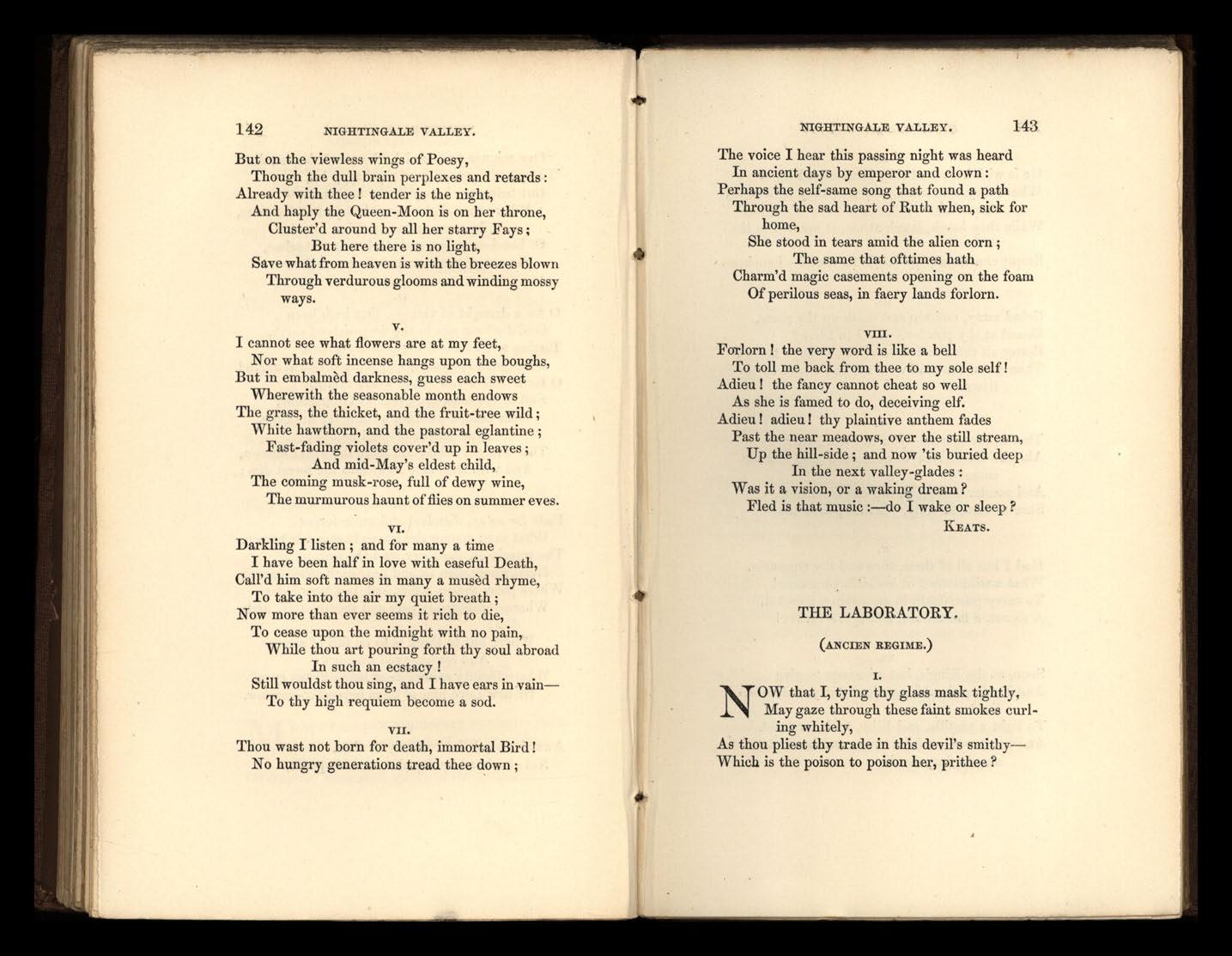
NIGHTINGALE VALLEY.
But on the viewless wings of Poesy, Though the dull brain perplexes and retards: Already with thee! tender is the night, And haply the Queen-Moon is on her throne, Cluster'd around by all her starry Fays; But here there is no light, Save what from heaven is with the breezes blown Through verdurous glooms and winding mossy ways.
v.
I cannot see what flowers are at my feet, Nor what soft incense hangs upon the boughs, But in embalmed darkness, guess each sweet Wherewith the seasonable month endows
The grass, the thicket, and the fruit-tree wild; White hawthorn, and the pastoral eglantine ; Fast-fading violets cover'd up in leaves; And mid-M ay's eldest child, The coming musk-rose, full of dewy wine, The murmurous haunt of flies on summer eves.
VI.
Darkling I listen; and for many a time
I have been half in love with easeful Death, Call'd him soft names in many a mused rhym e, To take into the air my quiet breath; Now more than ever seems it rich to die, To cease upon the midnight with no pain, While thou art pouring forth thy soul abroad
In such an ecstacy !
Still wouldst thou sing, and I have ears in vain-
To thy high requiem become a sod.
VII.
Thou wast not born for death, immortal Bird!
No hungry generations tread thee down;
The voice I hear this passing night was heard
In ancient days by emperor and clown:
Perhaps the self-same song that found a path
Through the sad heart of Ruth when, siek for home,
She stood in tears amid the alien corn; The same that ofttimes hath
Charm'd magic casements opening on the foam
Of perilous seas, in faery lands forlorn.
VIII.
Forlorn! the very word is like a bell
To toll me back from thee to my sole self!
Adieu! the fancy cannot cheat so well
As she is famed to do, deceiving elf.
Adieu! adieu I thy plaintive anthem fades
Past the near meadows, over the still stream, Up the hill-side; and now 'tis buried deep
In the next valley-glades:
Was it a vision, or a waking dream?
Fled is that music :-do I wake or sle ep? KEATS.
NTHE LABORATORY.
(ANCIEN REGIME.)
I.
ow that I, tying thy glass mask tightly, May gaze through these faint smokes curling whitely,
As thou pliest thy trade in this devil's smitbyWhich is the poison to poison her, prithee ?
144
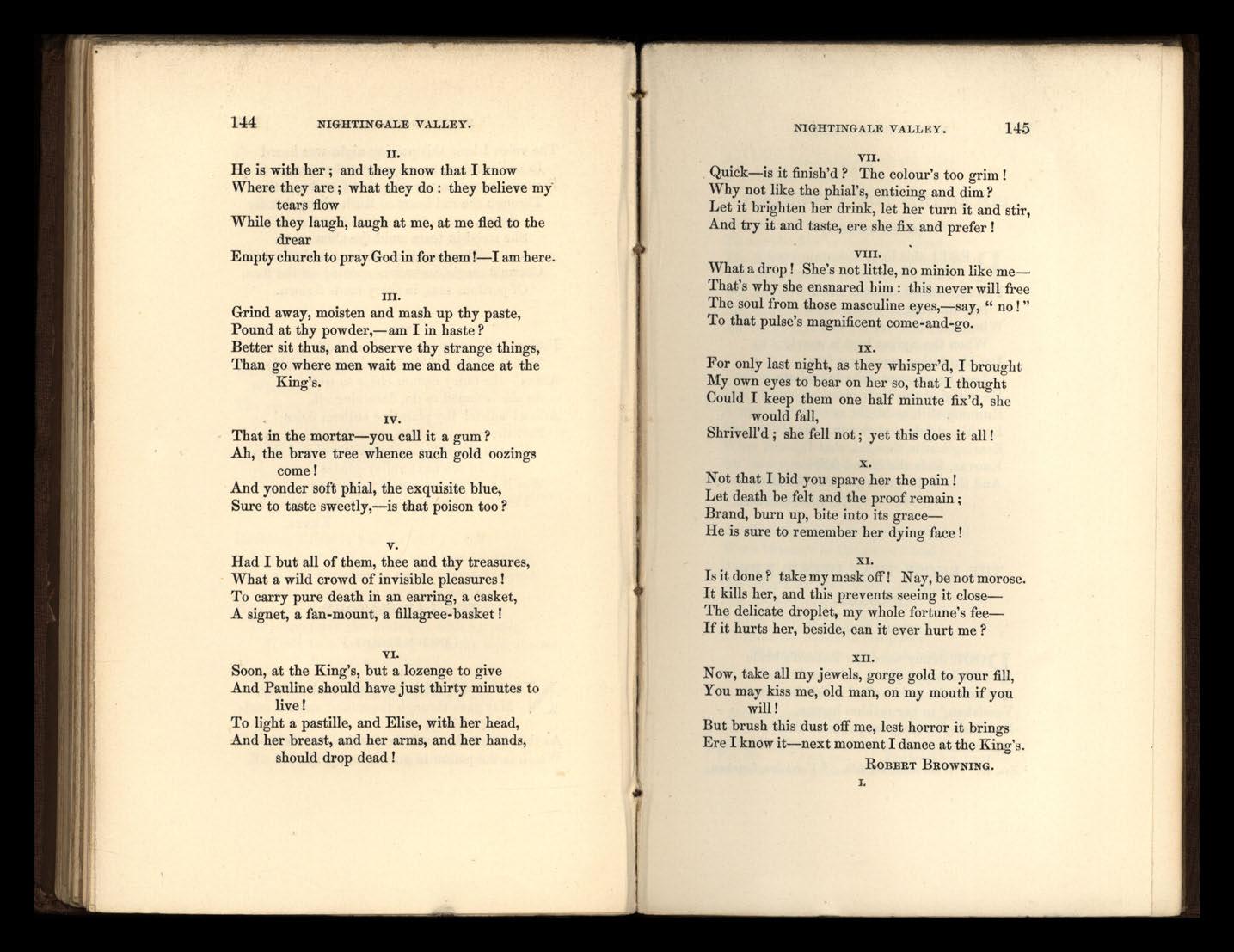
NIGHTINGALE VALLEY.
11.
He is with her; and they know that I know Where they are; what they do: they believe my" tears flow
While they laugh, laugh at me, at me fled to the drear
Empty church to pray God in for them I-I am here.
Ill.
Grind away, moisten and mash up thy paste, Pound at thy powder,-am I in haste?
Better sit thus, and observe thy strange things, Than go where men wait me and dance at the King's.
IV.
That in the mortar-you call it a gum?
Ah, the brave tree whence such gold oozing! come I
And yonder soft phial, the exquisite blue, Sure to taste sweetly,-is that poison too?
V.
Had I but all of them, thee and thy treasures, What a wild crowd of invisible pleasures!
To carry pure death in an earring, a casket, A signet, a fan-mount, a fillagree-basket!
VI.
Soon, at the King's, but a lozenge to give And Pauline should have just thirty minutes to live I
To light a pastille, and Elise, with her head, And her breast, and her arms, and her hands, should drop dead!
NIGHTINGALE VALL E Y. 145
VII.
Quick-is it finish'd? The colour's too grim!
Why not like the phial's, enticing and dim?
Let it brighten her drink, let her turn it and stir,
And try it and taste, ere she fix and prefer!
VIII.
What a drop! She's not little, no minion like me-
That's why she ensnared him: this never will free
The soul from those masculine eyes,-say, " no!"
To that pulse's magnificent come-and-go.
IX.
For only last night, as they whisper'd, I brought
My own eyes to bear on her so, that I thought
Could I keep them one half minute fix'd, she would fall, Shrivell'd; she fell not; yet this does it all !
x.
Not that I bid you spare her the pain!
Let death be felt and the proof remain; Brand, burn up, bite into its grace-
He is sure to remember her dying face!
Xl.
Is it done? take my off! Nay, be not morose. It kills her, and this prevents seeing it close-
The delicate droplet, my whole fortune's feeIf it hurts her, beside, can it ever hurt me ?
XII.
Now, take all my jewels, gorge gold to your fill, You may kiss me, old man, on my mouth if you will!
But brush this dust off me, lest horror it brings
Ere I know it-next moment I dance at the King' s
ROBERT BROWNING.
L
146
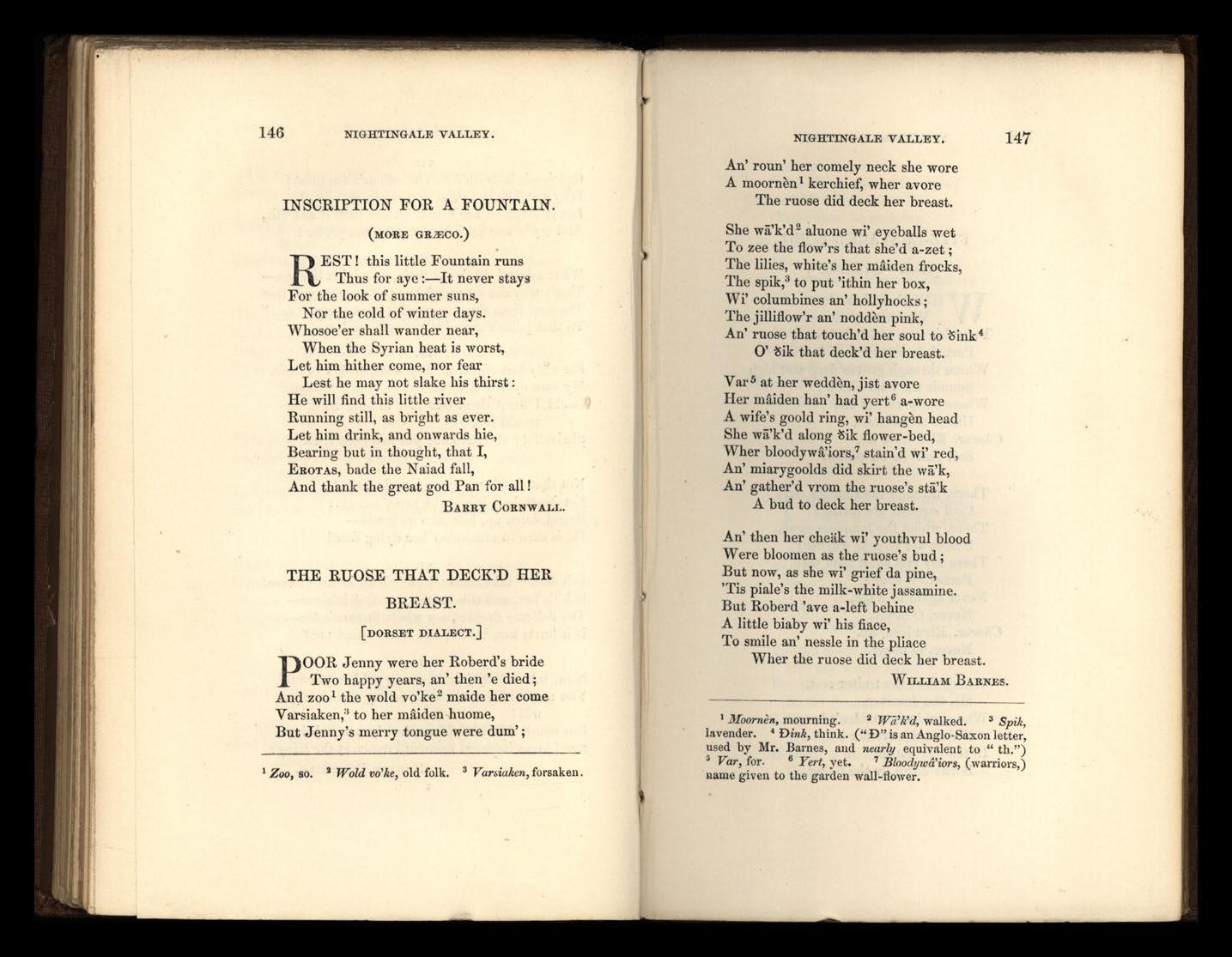
NIGHTINGALE VALLEY.
INSCRIPTION FOR A FOUNTAIN.
(MORE GRlECO.)
REST! this little Fountain runs
Thus for aye :-It never stays
For the look of summer suns, Nor the cold of winter days. Whosoe'er shall wander near,
When the Syrian heat is worst,
Let him hither come, nor fear
Lest he may not slake his thirst:
He will find this little river
Running still, as bright as ever.
Let him drink, and onwards hie,
Bearing but in thought, that I, EROTAS, bade the Naiad fall,
And thank t.he great god Pan for all ! BARRY CORNWALL.
THE RUOSE THAT DECK'D HER BREAST.
[DORSET DIALECT.]
POOR Jenny were her Roberd's bride
Two happy years, an' then 'e died; And ZOOl the wold vo'ke 2 maide her come Varsiaken," to her maiden huome, But Jenny's merry tongue were dum';
I Zoo, BO. 1 Wold vo'ke, old folk. 3 Varsiaken, forsaken
NIGHTINGALE VALLEY.
An' roun' her comely neck she wore
A moornen 1 kerchief, wher avore
The ruose did deck her breast.
She wa'k'd 2 aluone wi' eyeballs wet
To zee the flow'rs that she'd a-zet ;
The lilies, white's her maiden frocks,
The Spik,3 to put 'ithin her box, Wi' columbines an' hollyhocks;
The jilliJlow'r an' nodden pink,
An' ruose that touch'd her soul to 0' that deck'd her breast.
Var 5 at her wedden, jist avore
Her maiden han' had yert 6 a-wore
A wife's goold ring, wi' hangen head
She wa'k'd along flower-bed,
Wher bloodywa'iors,' stain'd wi' red,
An' miarygoolds did skirt the wa'k,
An' gather'd vrom the ruose's sta'k
A bud to deck her breast.
An' then her cheiik: wi' youthvul blood
Were bloomen as the ruose's bud;
But now, as she wi' grief da pine, 'Tis piale's the milk-white jassamine.
But Roberd 'aye a-left behine
A little biaby wi' his fiace,
To smile an' nessle in t.he pliace
)Vher the ruose did deck her breast.
WILLIAM BARNE!.
I Moornen, mourning. 2 Wa'k'd, walked. 3 Spill, lavender. • Dink, think. (U D" is an Anglo-Saxon letter, used by Mr. Barnes, and nearly equivalent to U th.")
5 Var, for. 6 y",·t, yet. ' Blnodywa'iors, (warriors,) name given to the garden wall-flower.
[FROM" MARMION."]
WHERE shall the lover rest, Whom the fates sever
From his true maiden's breast, Parted for ever?
Where through groves deep and high Sounds the loud billow; Where early violets die, Under the willow; Chorus. Eleu loro, &c. Soft shall be his pillow.
There, through the summer day, Cool streams are laving; There, whilst the tempests sway, Scarce are boughs waving; There thy rest shalt thou take, Parted for ever; Never again to wake, Never, 0 never.
Chorus. Eleu loro, &c. Never, 0 never.
Where shall the traitor rest, He, the deceiver, Who could win maiden's breast, Ruin and leave her?
In the lost battle, Borne down by the flying,
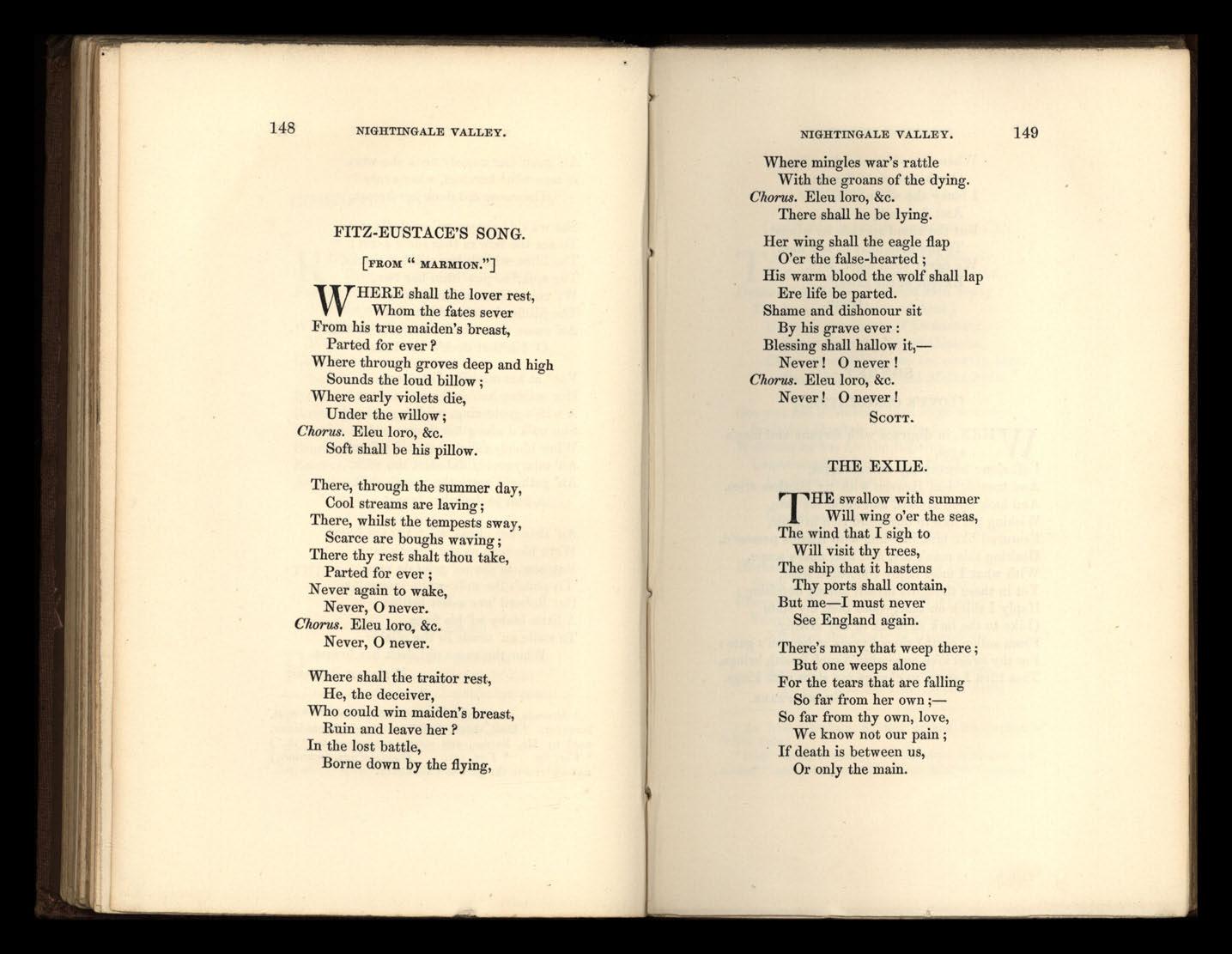
NIGHTINGALE VALLEY.
Where mingles war's rattle
With the groans of the dying.
Chorus. Eleu loro, &c. There shall he be lying.
Her wing shall the eagle flap
O'er the false-hearted; His warm blood the wolf shall lap
Ere life be parted.
Shame and dishonour sit
By his grave ever:
Blessing shall hallow it,Never! 0 never!
Chorus. Eleu loro, &c. Never! 0 never! SCOTT.
rI-'HE swallow with summer Will wing o'er the seas, The wind that I sigh to Will visit thy trees, The ship that it hastens Thy ports shall contain, But me-I must never See England again.
There's many that weep there; But one weeps alone
For the tears that are falling
So far from her own ;So far from thy own, love, We know not our pain; If death is between us, Or only the main.
150
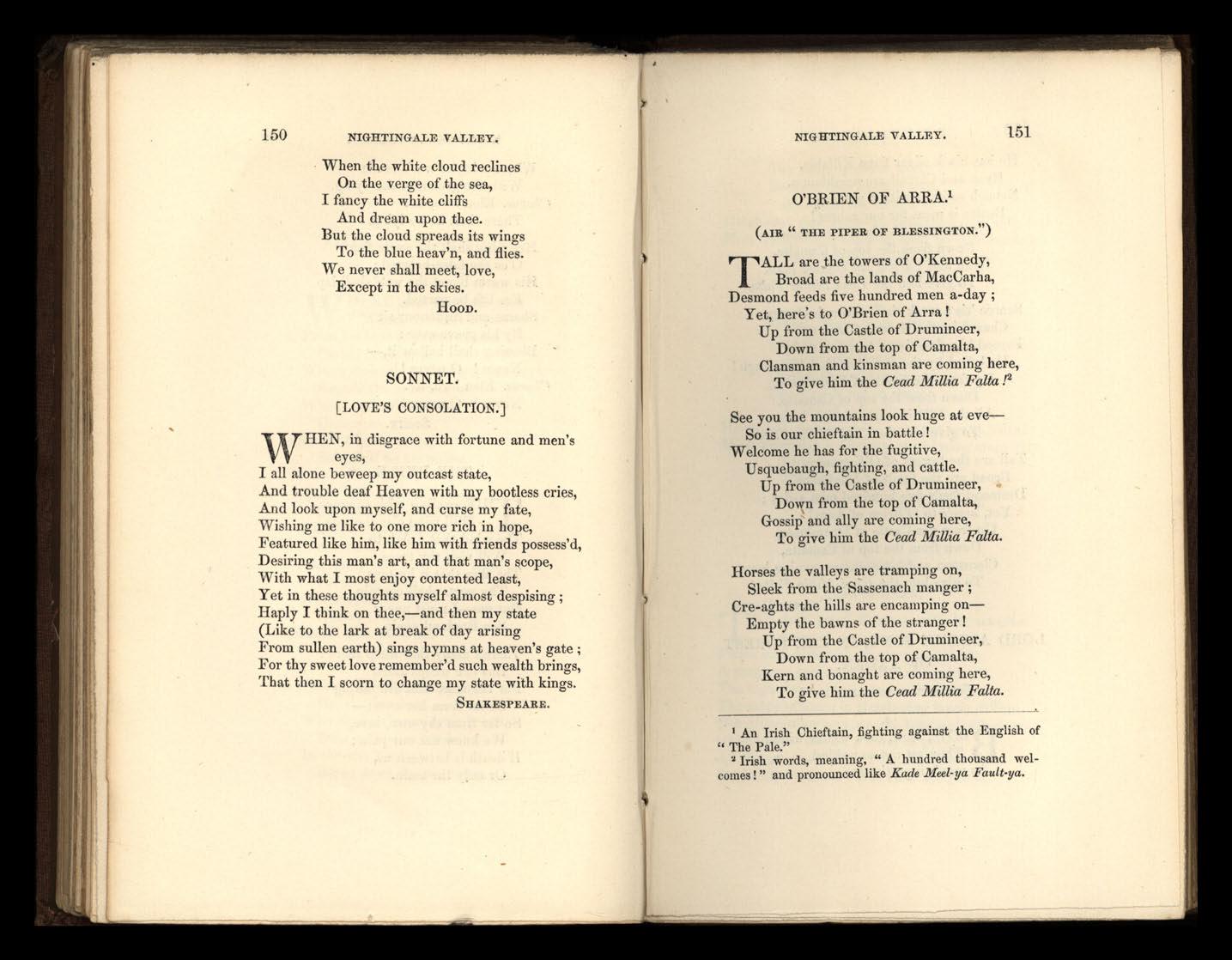
NIGHTINGALE VALLEY.
When the white cloud reclines On the verge of the sea, I fancy the white cliffs And dream upon thee. But the cloud spreads it s wings To the blue heav'n, and flies. W e nev er shall meet, love, Except in the skies.
HooD.
SONNET.
[LOVE'S CONSOLATION.]
WHEN, in disgrace with fortune and men's ey es , I all alon e b ewe ep my outcast state, And trouble deaf H eaven with my bootless cries, upon my self, and curse my fate, Wl shmg me lik e to one more rich in hope, him, like him with friends possess'd, thIS man's art, and that man's scope, WIth what I mo st enjoy contented least Y et in th es e thoughts myself almost ; I think on thee,-and then my state (Lik e to the lark at break of day arising From sullen earth) sings hymns at heaven's gate; For thy sweet love remember'd such wealth brinIYS 'I'h b' at th en I scorn to change my state with kings. SHAKESPEARE.
NIGHTINGALE VALLEY.
O'BRIEN OF ARRA.I
(AIR" THE PIPER OF DLESSINGTON.")
TALL are the towers of O'Kennedy, Broad are the lands of MacCarha, Desmond feeds five hundred men a-day; Yet, here's to O'Brien of Arra !
Up from the Castle of Drumineer, Down from the top of Camalta, Clansman and kinsman are coming here, To give him the Cead Millia Falta J2
See you the mountains look huge at eveSo is our chieftain in battle! Welcome he has for the fugitive, U squebaugh, fighting, and cattle. Up from the Castle of Drumineer, Down from the top of Camalta, Gossip and ally are coming here, To give him the Cead Millia Folta.
Horses the valleys are tramping on, Sleek from the Sassenach manger; Cre-aghts the hills are encamping onEmpty the bawns of the stranger!
Up from the Castle of Drumineer, Down from the top of Camalta, Kern and bonaght are coming here, To give him the Cead Millia Falta.
1 An Iri sh Chieftain, fighting against the English of "The Pale."
"Irish word s, meaning, "A hundred thou sand welcomes!" and pronounced like Kade Meel-ya Fault-ya .
NIGHTINGALE VALLEY.
He has black silver from Kill aloe, Ryan and Carroll are neighbours, N enagh submits with a piIIaleu, Butler is meat for our sabres !
Up from the Castle of Drumineer, Down from the top of Camalta, Ryan and Cm-roll are coming here, To give him the Cead Millia
Scarce 'tis a week since through Ossory
Chased he the Baron of Durrow, Forced him five rivers to cross, or he Had died by the sword of Red Murrough !
Up from the Castle of Drumineer, Down from the top of Camalta, All the O'Briens are coming here, To give him the Cead Millia Falta.
Tall are the towers of O'Kennedy, Broad are the lands of MacCarha, Desmond feeds five hundred men a-day; Yet, here's to O'Brien of Arra!
Up from the Castle of Drumineer, Down from the top of Camalta, Clansman and kinsman are coming here, To give him the Cead Millia Falta!
ThOMAS DAVIS.
LORD AMIENS' SONG, IN THE FOREST OF ARDEN.
[FROM" AS YOU LIKE IT."]
I.
BLow, blow, thou winter wind!
Thou art not so unkind
As man's ingratitude;

NIGHTINGALE VALLEY.
Thy tooth is not so keen,
Because thou art not seen,
Although thy breath be rude.
153
Heigh-ho! sing heigh-ho unto the green holly!
Most friendship is feigning, most lovin g mere folly.
Then heigh-ho the holly!
This life is most jolly.
n.
Freeze, freeze, thou bitter sky!
That dost not bite so nigh
As benefits forgot:
Though thou the waters warp
Thy sting is not so sharp
As friend remember'd not.
Heigh-ho! sing heigh-ho unto the green holly!
Most friendship is feigning, most loving mere folly.
Then heigh-ho the holly!
This life is most jolly.
SHAKESPEARE.
SONNET.
SEPTEMBER.
THE dark green Summer with its massive hues
Fades into Autumn's tincture manifold;
A gorgeous garniture of fire and gold
The high slope of the ferny hill in dues ;
The mists ofmorn in slumbering layers diffuse
O'er glimmering rock, smooth lake, and spiked array
Of hedgerow thorns, a unity of grey;
All things appear their tangible form to lose
In ghostly vastness. But anon the gloom
154
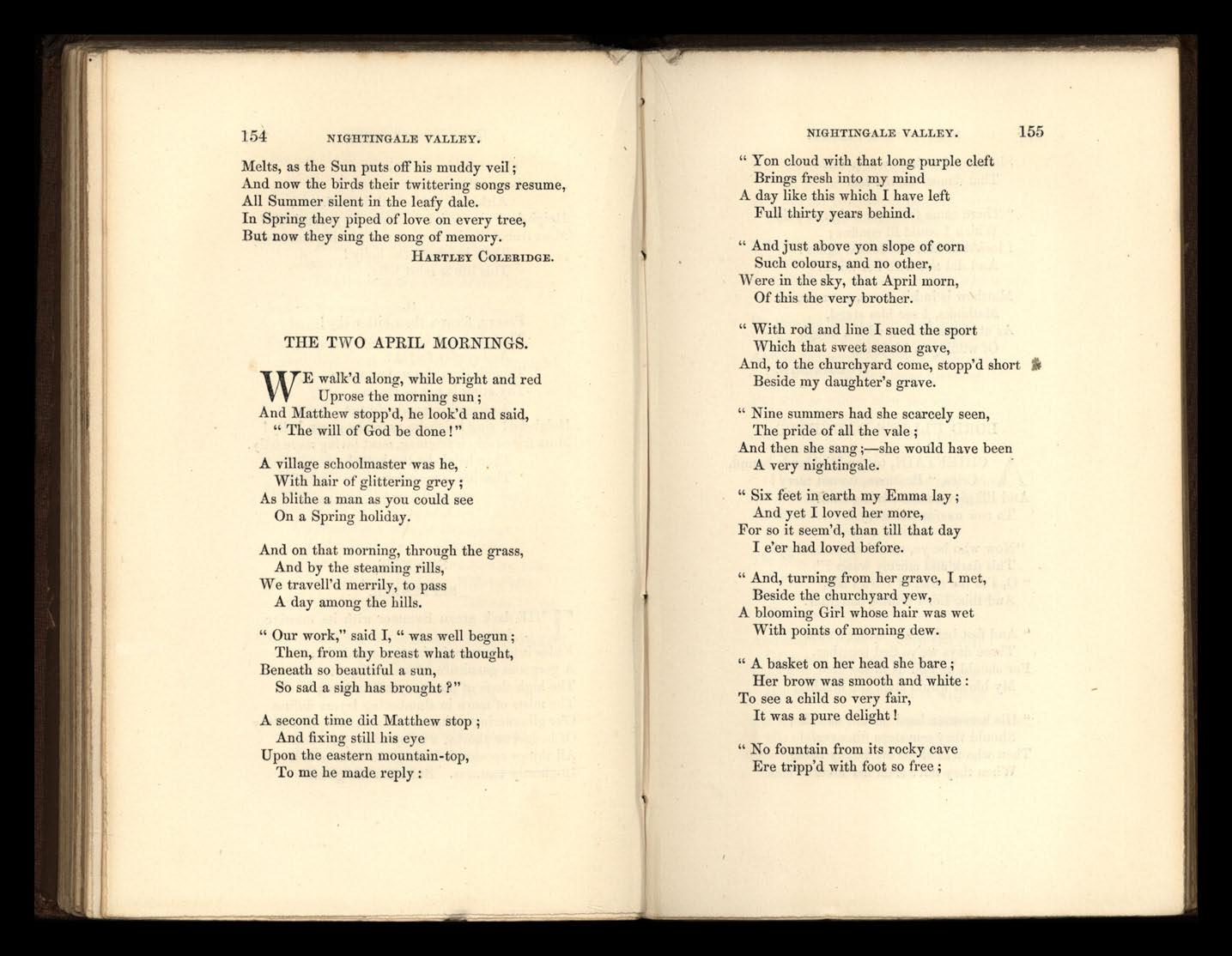
NIGHTINGALE VALLEY.
Melts, as the Sun puts off his muddy veil ; And now the birds their twittering songs resume, All Summer silent in the leafy dale.
In Spring they piped of love on every tree, But now they sing the song of memory.
HARTLEY COLER1DGE.
WE walk'd along, while bright and red
Uprose the morning sun;
And Matth e w stopp'd, he look'd and said,
" The will of God be done!"
A village schoolmaster was he, With hair of glittering grey; As blithe a man as you could see
On a Spring holiday.
And on that morning, through the grass, And by the steaming rills, We travell'd merrily, to pass
A day among the hills.
" Our work," said I, " was well befTun· Then, from thy: breast what tho;ght: Beneath so beauhful a sun, So sad a sigh has brought ?"
A second time did Matthew stop; And fixing still his eye
Upon the eastern mountain-top, To me he made reply:
NIGHTINGALE VALLEY.
" Yon cloud with that long purple cleft Brings fresh into my mind
A day like this which I have left Full thirty years behind.
" And just above yon slope of corn Such colours, and no other, Were in the sky, that April roorn, Of this the very brother.
" With rod and line I sued the sport ",Vhich that sweet season gave,
And, to the churchyard come, stopp'd short Beside my daughter's grave.
" Nine summers had she scarcely seen, The pride of all the vale; And then she sang ;-she would have been
A very nightingale. .
" Six feet in earth my Emma lay; And yet I loved her more, For so it seem'd, than till that day I e'er had loved before.
" And, turning from her grave, I met, Beside the churchyard yew, A blooming Girl whose hair was wet With points of morning dew.
" A basket on her head she bare; Her brow was smooth and white: To see a child so very fair, It was a pure delight!
" No fountain from its rocky cave Ere tripp'd with foot so free;
156
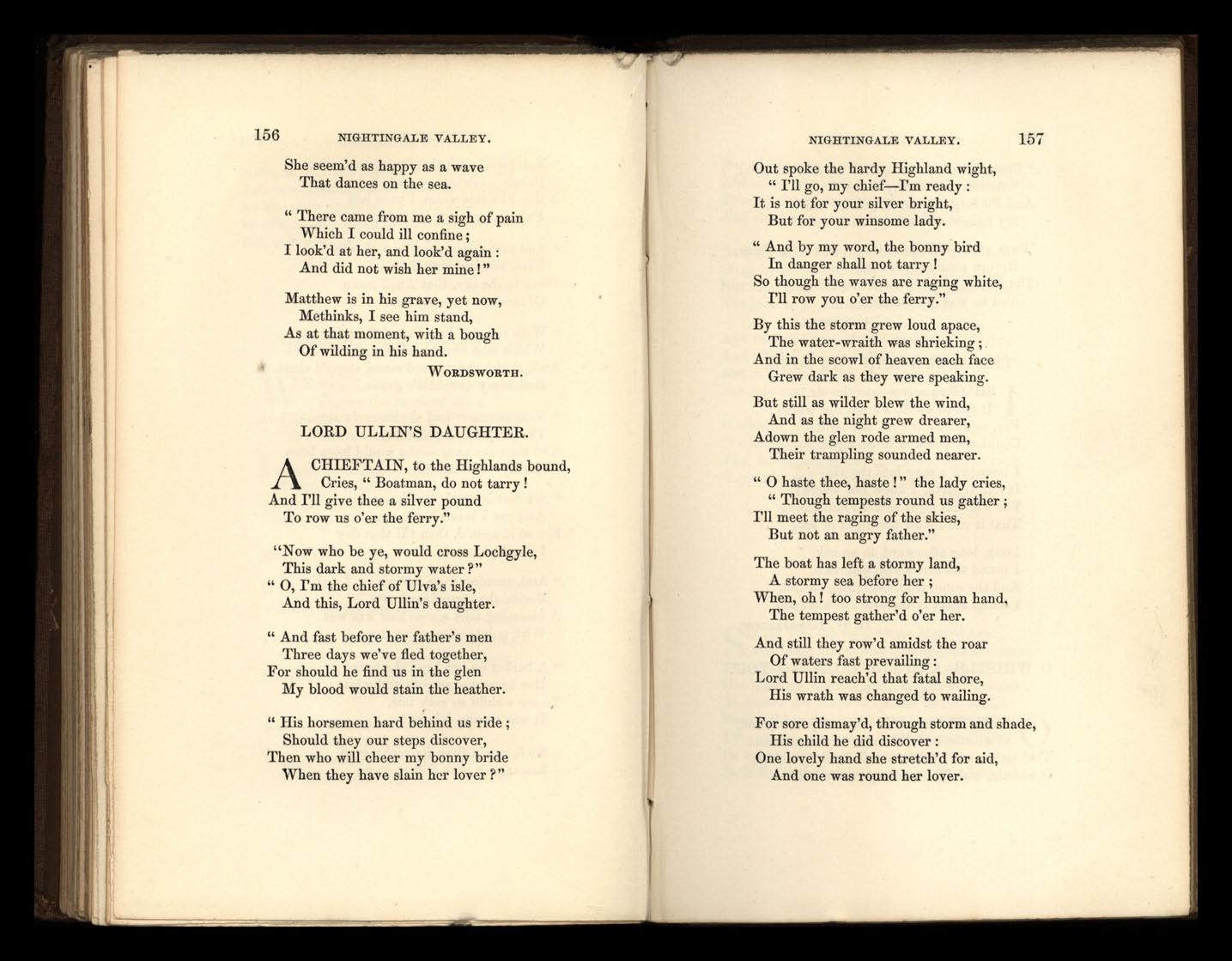
NIGHTINGALE VALLEY.
She seem'd as happy as a wave That dances on t.he sea.
" There came from me a sigh of pain Which I could ill confine; I look'd at her, and look'd again: And did not wish her mine!"
Matthew is in his grave, yet now, Methinks, I see him stand, As at that moment, with a bough Of wilding in his hand.
W ORDSWORTH.
ALORD ULLIN'S DAUGHTER.
CHIEFTAIN, to the Highlands bound, Cries, " Boat.man, do not tarry! And I'll give thee a silver pound To row us o'er the ferry."
"Now who be ye, would cross Lochgyle, This dark and stormy water?"
" 0, I'm the chief of Ulva's isle, And this, Lord UHin's daughter.
" And fast before her father's men Three days we've fled together, For should he find us in the glen My blood would stain the heather.
" His horsemen hard behind us ride; Should they our steps discover, Then who will cheer my bonny bride When they have slain her lover?"
NIGHTINGALE VALLEY.
Out spoke the hardy Highland wight, " I'll go, my chief-I'm ready: It. is not for your silver bright, But for your winsome lady.
" And by my word, the bonny bird In danger shall not tarry!
So though the waves are raging white, I'll row you o'er the ferry."
By this the storm grew loud apace, The water-wraith was shrieking; And in the scowl of heaven each face Grew dark as they were speaking.
But still as wilder blew the wind, And as the night grew drearer, Adown the glen rode armed men, Their trampling sounded nearer.
" 0 haste thee, haste!" the lady cries, " Though tempests round us gather; I'll meet the raging of the skies, But not an angry father."
The boat has left a stormy land, A stormy sea before her; When, oh! too strong for human hand. The tempest gather'd o'er her.
And still they row'd amidst the roar Of waters fast prevailing:
Lord Ullin reach'd that fatal shore, His wrath was changed to wailing.
For sore dismay'd, through storm and shade, His child he did discover:
One lovely hand she stretch'd for aid, And one was round her lover.
158
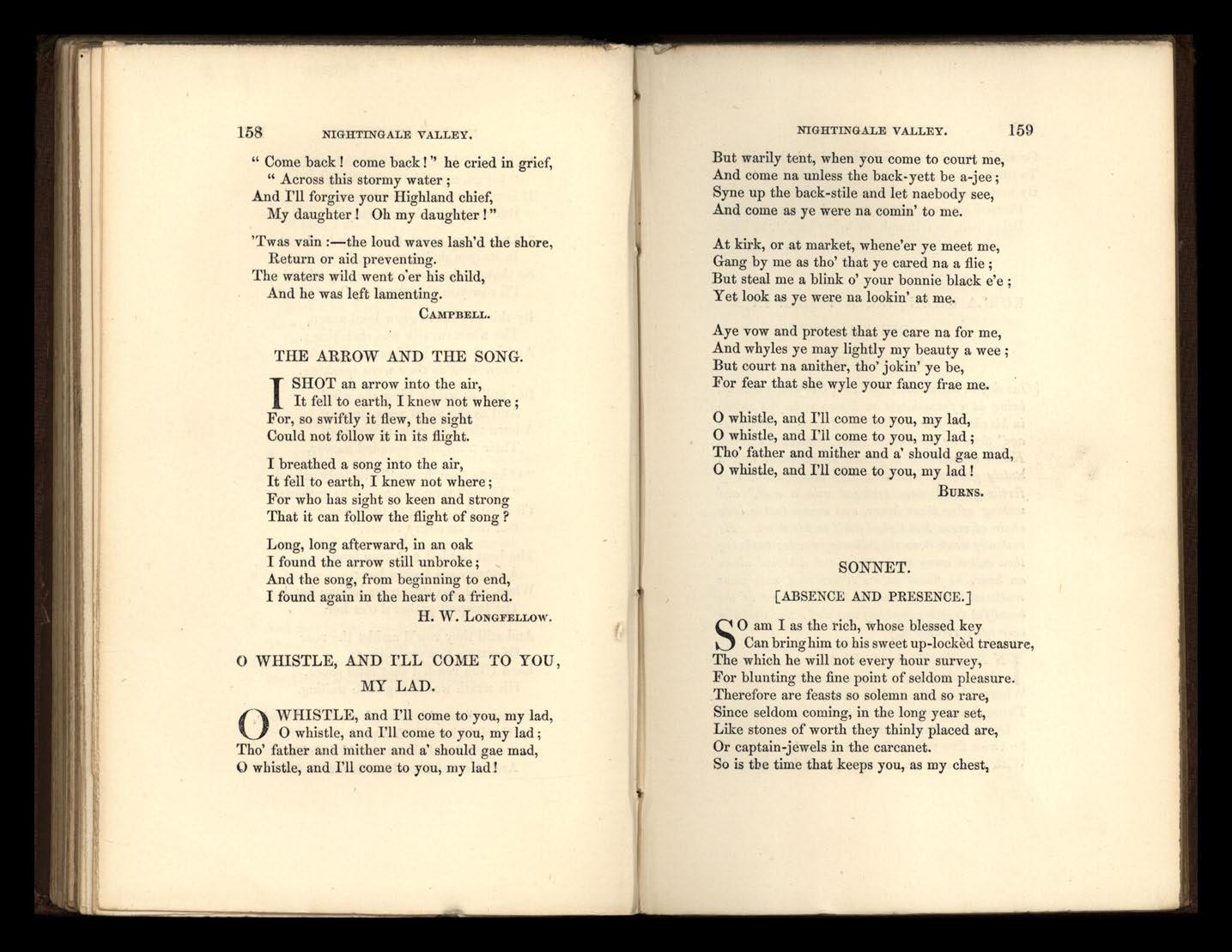
NIGHTINGALE VALLEY.
" Come back! come back!" he cried in grief, " Across this stormy water; And I'll forgive your Highland chief, My daughter I Oh my daughter!"
'Twas vain :-the loud waves lash'd the shore, Return or aid preventing.
The waters wild went o'er his child, And he was left lamenting.
CAMPBELL.
ISHOT an arrow into the ail', It fell to earth, I knew not where; For, so swiftly it flew, the sight Could not follow it in its flight.
I breathed a song into the air, It fell to earth, I knew not where; For who has sight so keen and strong That it can follow the flight of song?
Long, long afterward, in an oak I found the arrow still unbroke; And the song, from beginning to end, I found again in the heart of a friend. H. W. LONGFELLow.
o WHISTLE, AND I'LL COME TO YOU, MY LAD.
OWHISTLE, and I'll come to ·you, my lad, o whi s tle, and I'll come to you, my lad; Tho' father and mither and a' should gae mad, o whistle, and I'll come to you, my lad!
NIGHTINGALE VALLEY.
But warily tent, when you come to court me, And come na unless the back-yett be a-jee ; Syne up the back-stile and let naebody see, And come as ye were na comin' to me.
At kirk, or at market, whene'er ye meet me, Gang by me as tho' that ye cared na a flie ; But steal me a blink 0' your bonnie black e'e ; Yet look as ye were na lookin' at me.
Aye vow and protest that ye care na for me, And whyles ye may lightly my beauty a wee; But court na anither, tho' jokin' ye be, For fear that she wyle your fancy frae me. .
o whistle, and I'll come to you, my lad, o whistle, and I'll come to you, my lad; Tho' father and mither and a' should gae mad, o whistle, and I'll come to you, my lad! BURNS.
SONNET.
[ABSENCE AND PRESENCE.]
SO am I as the rich, whose blessed key Can bring him to his sweet up-locked treasure, The which he will not every hour survey, For blunting the fine point of seldom pleasure. Therefore are feasts so solemn and so rare, Since seldom coming, in the long year set, Like stones of worth they thinly placed are, Or captain-jewels in the carcanet. So is the time that keeps you, as my chest,
160
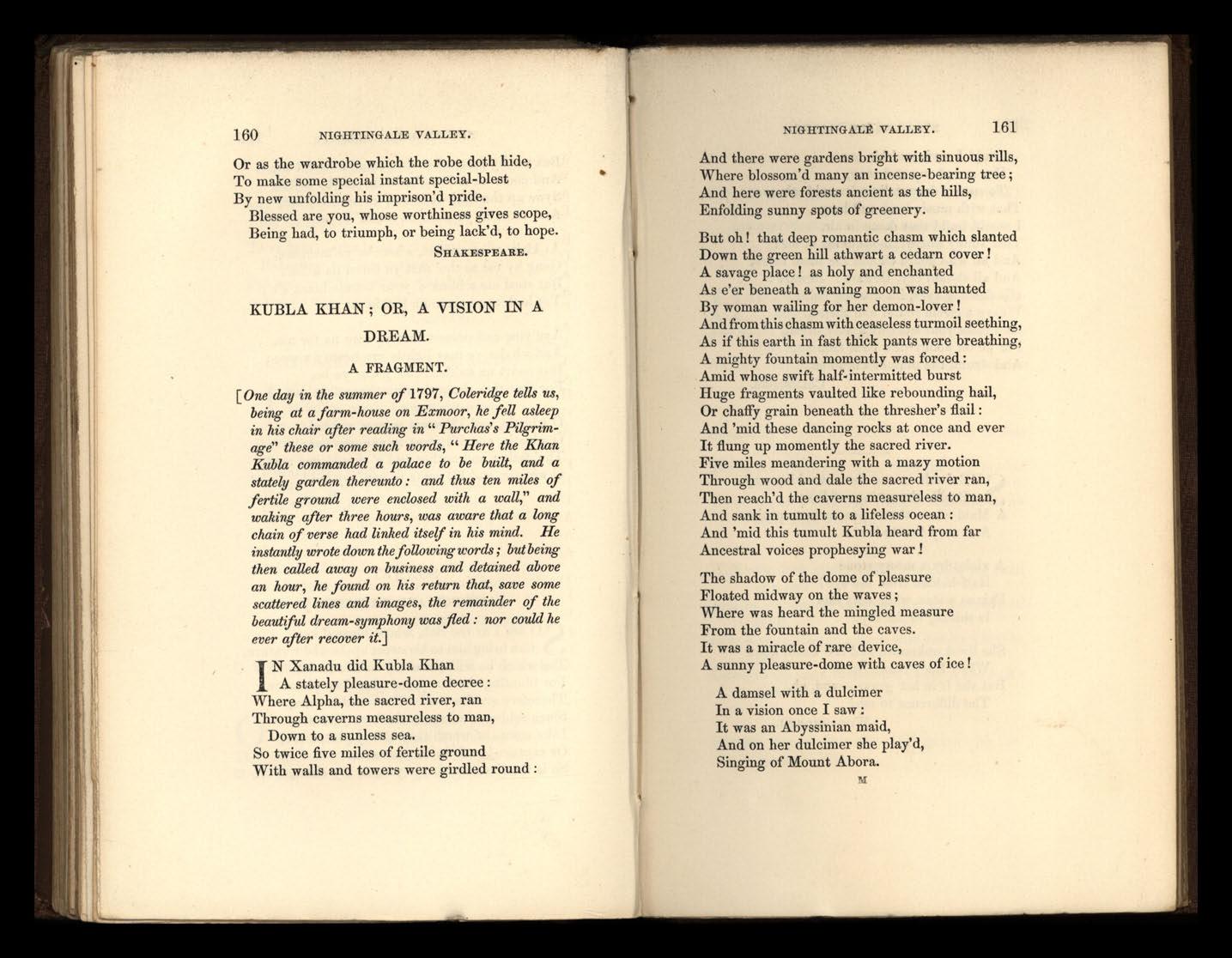
NIGHTINGALE VALLEY.
Or as tbe wardrobe wbicb tbe robe dotb bide, To make some special instant special-blest By new unfolding his imprison'd pride. Blessed are you, wbose worthiness gives scope, Being bad, to triumph, or being lack'd , to bope. SHAKESPEARE.
[One day in the summer of 1797, Coleridge tells us, being at afarm-house on Exmoor, he fell asleep in his chair after reading in" Purchas's Pilgrimage" these or some such words, " Here the Khan Kubla commanded a palace to be built, and a stately garden thereunto: and thus ten miles of fertile ground were enclosed with a wall," and waking after three hours, was aware that a long chain of verse had linT/ed itself in his mind. He instantly wrote down the following words; but being then called away on and detained above an hour, he found on his return that, save some scattered lines and images, the remainder of the beautiful dream-symphony was fled: nor could he ever after recover it ]
I
N Xanadu did Kubla Kban
A stately pleasure-dome decree:
''''here Alpha, tbe sacred river, ran
Through caverns measureless to man,
Down to a sunless sea.
So twice five miles of fertile ground
With walls and towers were girdled round:
And there were gardens bright witb sinuous rills, Where blossom'd many an incense-b earing tree;
And here were forests ancient as the hills,
Enfolding sunny spots of greenery.
But ob! that deep romantic chasm whicb slanted
Down the green hill athwart a cedarn cover!
A savage place! as holy and enchanted
As e'er beneatb a waning moon was haunted
By woman wailing for her demon-lover!
And from this chasm with ceaseless turmoil seetbing,
As if this earth in fast thick pants were breatbing,
A mighty fountain momently was forced:
Amid whose swift half-intermitted burst
Huge fragments vaulted like rebounding bail,
Or chaffy grain beneath tbe tbresber's flail:
And 'mid these dancing rocks at once and ever
It flung up momently the sacred river.
Five miles meandering witb a mazy motion
Througb wood and dale tbe sacred river ran,
Then reach'd tbe caverns measureless to man,
And sank in tumult to a lifeless ocean:
And 'mid tbis tumult Kubla beard from far Ancestral voices prophesying war 1
The shadow of the dome of pleasure
Floated midway on the waves; Where was heard the mingled measure
From tbe fountain and the caves.
It was a miracle of rare device,
A sunny pleasure-dome with caves of ice!
A damsel witb a dulcimer
In a vision once I saw: It was an Abyssinian maid, And on her dulcimer sbe play'd,
Singing of Mount Abora. M
162
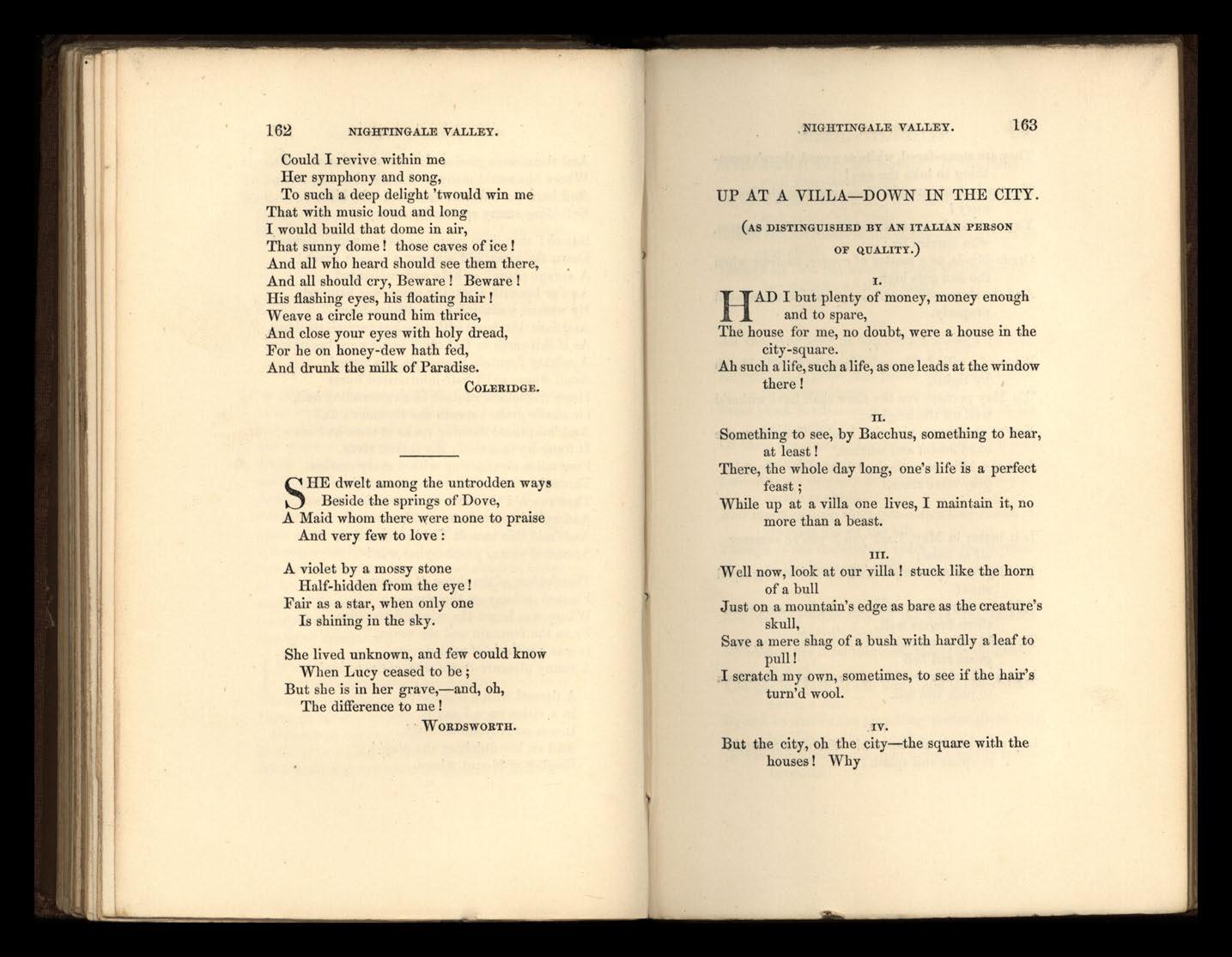
NIGHTINGALE VALLEY.
Could I revive within me
Her symphony and song,
To such a deep delight 'twould win me
That with music loud and long
I would build that dome in air,
That sunny dome! those caves of ice!
And all who heard should see them there, And all should cry, Beware! Beware!
His flashing eyes, his floating hair!
Weave a circle round him thrice,
And close your eyes with holy dread,
For he on honey-dew hath fed, And drunk the milk of Paradise.
COLERIDGE.
SHE dwelt among the untrodden ways Beside the springs of Dove,
A Maid whom there were none to praise And very few to love:
A violet by a mossy stone
Half-hidden from the eye!
Fair as a star, when only one Is shining in the sky.
She lived unknown, and few could know When Luey ceased to be j
But she is in her grave,-and, oh, The difference to me !
W ORDSWORTH.
NIGHTINGALE VALLEY. 163
(AS DISTINGUISHED BY AN ITALIAN PERSON OF QUALITY.)
I.
HAD I but plenty of money, money enough and to spare,
The house for me, no doubt, were a house in the city-square.
Ah such a life, such a life, as one leads at the window there!
ll.
Something to see, by Bacchus, something to hear, at least!
There, the whole day long, one's life is a perfect feast j
While up at a villa one lives, I maintain it, no more than a beast.
Ill.
Well now, look at our villa! stuck like the horn of a bull
Just on a mountain's edge as bare as the creature's skull,
Save a mere shag of a bush with hardly a leaf to pull!
I scrat.ch my own, sometimes, to see if the hair's turn'd wool.
IV.
But the city, oh the city-the square with the houses! Why
164

NIGHTINGALE VALLEY.
They are stone-faced, white as a curd, there's something to take the eye!
Houses in four straight lines, not a single front awry!
You watch who crosses and gossips, who saunters, who hurries by:
Green blinds, as a matter of course, to draw when the sun gets high;
And the shops with fanciful signs which are painted properly.
What of a villa? Though winter be over in March by rights,
'Tis May perhaps ere the snow shall have wither'd well off the heights:
You've the brown plough'd land before, where the oxen steam and wheeze,
And the hills over-smoked behind by the faint grey oli ve trees.
VI.
Is it better in May, I ask you? you've summer all at once;
In a day he leaps complete with a few strong April suns!
'Mid the sharp short emerald wheat, scarce risen three fingers well,
The wild tulip, at end of its tube, blows out its great red bell
Like a thin clear bubble of blood, for the children to pick and sell.
VII.
Is it ever hot in the square? There's a fountain to spout and splash!
NIGHTINGALE VALLEY. 165
In the shade it sings and springs; in the shine such foam-bows flash
On the horses with curling fish-tails, that prance and paddle and pash
Round the lady atop in the conch-fifty gazers do not abash,
Though all that she wears is some weeds round her waist in a sort of sash!
VIII.
All the year long at the villa, nothing's to see though you linger,
Except yon cypress that points like Death's lean lifted forefinger
Some think fireflies pretty, when they mix ID the corn and mingle,
Or tb-id the stinking hemp till the stalks of It seem a-tingle. .
Late August or early September, the stunDlng cicada is shrill,
And the bees keep their tiresome whine round the resinous firs on the hill.
Enourrh of the seasons,-I spare you the months o of the fever and chill.
IX.
Ere opening your eyes in the city, the blessed church-bells begin:
No sooner the bells leave off, than the diligence rattles in:
You get the pick of the news, and it costs you never a pin. .
By and by there's the travelling doctor gives pills, lets blood, draws teeth;
Or the Punchinello-trumpet breaks up the market beneath.
166

NIGHTINGALE VALLEY.
At the post-office such a scene-picture-the new play, piping hot!
And a notice how, only this morninO' three liberal thieves were shot. b'
Above it behold the archbishop's most fatherly of rebukes,
And beneath, with his crown and his lion some little new law of the Duke's! '
Or a sonnet with flowery marge to the Reverend Don So-and-so,
Who is Dante, Boccaccio, Petrarca Saint Jerome and Cicero, ' ,
" And moreover," (the sonnet goes rhyming) "the skirts of Saint Paul has reach'd '
H " ' avmg preach d us those six Lent-lectures more than ever he preach'd."
Noon strlkes,-here sweeps the procession! our Lady borne smilinO" and smart
With a pink gauze gown spangles, and seven swords stuck in her heart!
Bang, wltang, whallg, goes the drum, tootle-tetootle the fife;
No keeping one's haunches still: it's the greatest pleasure in life. x.
But bless you, it's dear-it's dear! fowls, wine, at double the rate.
They ha:ve elapp'd a new tax upon salt, and what 011 pays passinO" the gate
I , b t S a horror to think of. And so, the villa for me, not the city!
Beggars can scarcely be choosers-but still-ah the pity, the pity! '
Look, two and two go the priests, then the monks with cowls and sandals,
NIGHTINGALE VALLEY. 167
And the penitents dress'4 in white skirts, a-holding the yellow candles.
One, he carries a flag up straight, and another a cross with handles,
And the Duke's guard brings up the rear, for the better prevention of scandals.
Bang, wltang, wltang, goes the drum, tootle-tetootle the fife.
Oh, a day in t.he city-square, there is no such pleasure in life!
ROBERT BROWNING.
HAST thou named all t.he birds without a gun; Loved the wood-rose, and left it on its stalk; At rich men's tables eaten bread and pulse; Unarm'd faced danger with a heart of trust; And loved so well a high behaviour
In man or maid that thou from speech refrain'd, Nobility more nobly to repay?-o be my friend, and teach me to be thine! EMERSON.
ICOME from haunts of coot and hern, I make a sudden sally
And sparkle out among the fern, To bicker down a valley.
168

NIGHTINGALE VALLEY.
By thirty hills I hurry down, Or slip between the ridges, By twenty thorps, a little town, And half a hundred bridges.
Till last by PhiIip's farm I How To join the brimming river, For men may come and men may go, But I go on for ever.
I chattel' over stony ways, In little sharps and trebles, I bubbl e into eddying bays, I babble on the pebbles.
With many a curve my banks I fret By many a field and fallow, And many a fairy foreland set With willow-weed and mallow.
I chatter, chatter, as I How To join the brimming river, For men may come and men may go, But I go on for ever.
I wind about, and in and out, With her e a blossom sailing, And here and there a lusty trout. And here and there a grayling,
And here and there a foamy Hake Upon me, as I travel With many a silvery waterbreak Above the golden gravel,
AmI draw them all along, and flow To join the brimming river,
NIGHTINGALE VALLEY.
For men come and men may go, But I go on for ever.
I steal by lawns and grassy plots, I slide by hazel covers; I move the sweet forget-me -nots That grow for happy lovers.
I slip, I slide, I gloom, I glance, Among my skimming swallows; I make the netted sunbeam dance Against my sandy shallows.
I murmur under moon and stars In brambly wildernesses ; I linger by my shingly bars; I loiter round my cresses;
And out again I curve and How To join the brimming river, For men may come and men may go, But I go on for ever.
TENNYSON.
AH, what can ail thee, wretched wight, Alone and palely loitering? The sedge is wither'd from the lake, And no birds sing.
Ah, what can ail thee, wretched wight, So haggard and so woe-begone?
170
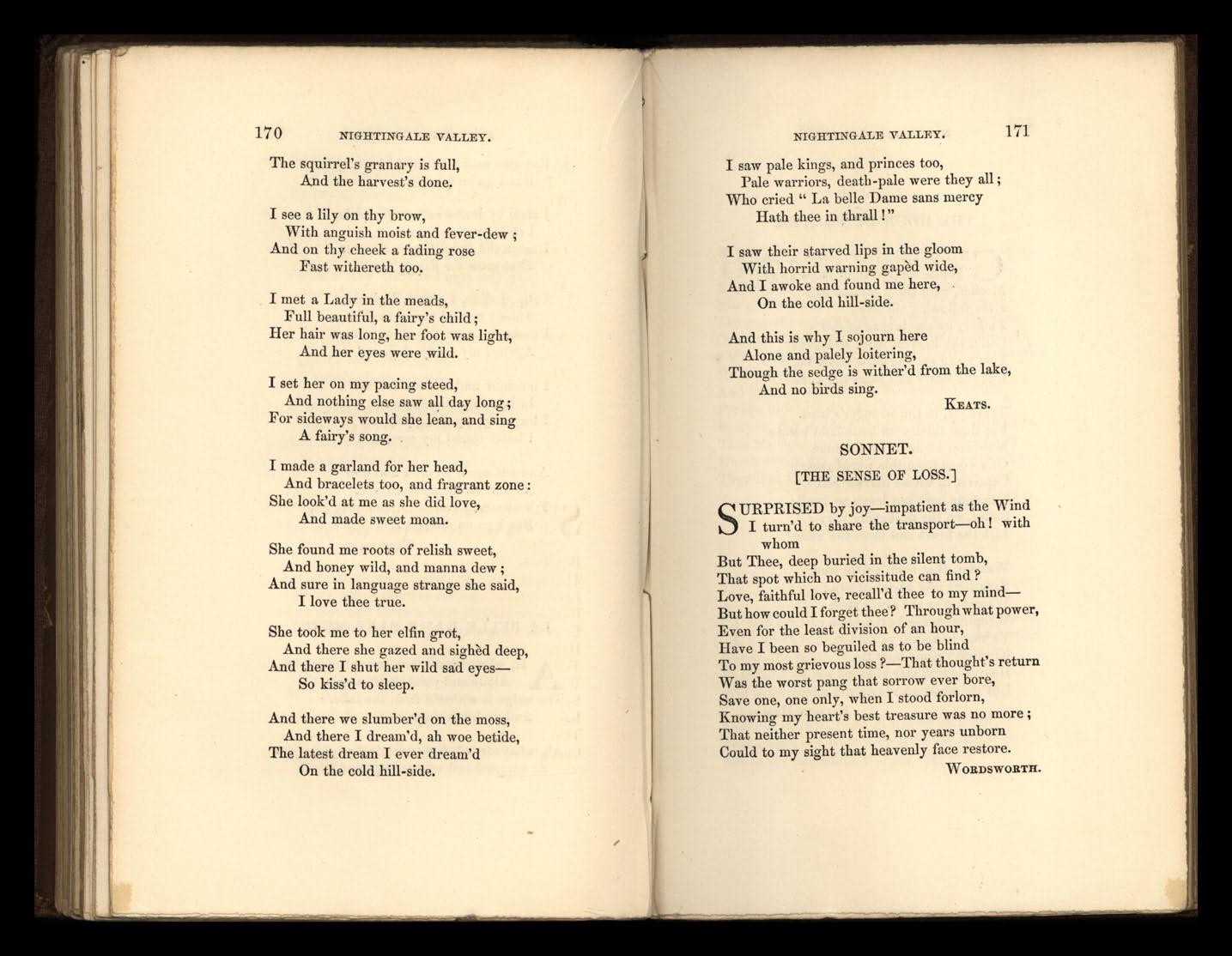
NIGHTINGALE VALLEY.
The squirrel's granary is full, And the harvest's done.
I see a lily on thy brow, vVith anguish moist and fever-dew; And on thy cheek a fading rose Fast withereth too.
I met a Lady in the meads, Full beautiful, a fairy's child; Her hail' was long, her foot was light, And her eyes were wild.
I set her on my pacing steed, And nothing else saw day long; For sideways would she lean, and sing A fairy's song.
I made a garland for her head, And bracelets too, and fragrant zone; She look'd at me as she did love, And made sweet moan.
She found me roots of relish sweet, And honey wild, and manna dew; And sure in language strange she said, I love thee true.
She took me to her elfin grot, And there she gazed and sighed deep, And there I shut her wild sad eyesSo kiss'd to sleep.
And there we slumber'd on the moss, And there I dream'd, ah woe betide, The latest dream I ever dream'd On the cold hill-side.
1
NIGHTINGALE VALLEY.
I saw pale kings, and princes too, Pale warriors, death-pale were they all; Who cried" Lft belle Dame sans mercy Hath thee in thrall! "
I saw their starved lips in the gloom With horrid warning gaped wide, And I awoke and found me here, On the cold hill-side.
And this is why I sojourn here
Alone and palely loitering, ThouO"h the sedO"e is wither'd from the lake, And no birds sing. REATS. SONNET. [THE SENSE OF LOSS.]
by joy-impatient as the Wind I turn'd to share the transport-oh! with whom
But Thee, deep buried in the silent tomb, That spot which no vicissitude can find?
Love, faithful love, recftll'd thee to my mindBut how could I forget thee? Through what power, Even for the least division of an hour, Have I been so beguiled as to be blind To my most grievous loss ?-That. thought's return Was the worst pang that sorrow ever bore, Save one, one only, when I stood forlorn, Knowing my heart's best treasure was no more; That neither present time, nor years unborn Could to my sight that heavenly face restore. W ORDSWORTH.
172
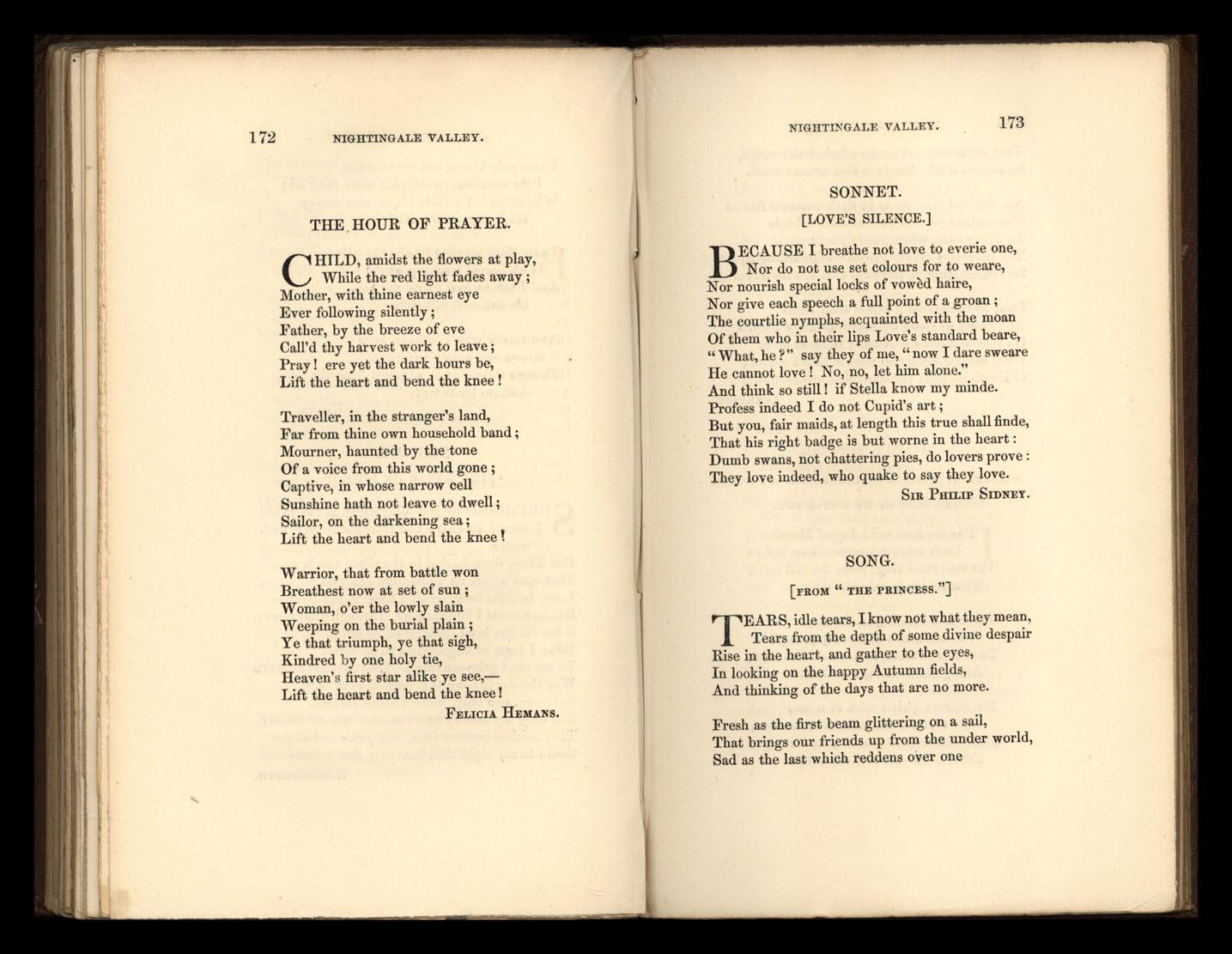
NIGHTINGALE VALLEY.
THE , HOUR OF PRAYER.
CHILD, amidst the flowers at play,
While the red light fades away; Mother, with thine earnest eye
Ever following silently; Father, by the breeze of eve
Call'd thy harvest work to leave; Pray! ere yet the dark hours be, Lift the heart and bend the knee!
Traveller, in the stranger's land, Far from thine own household band; Mourner, haunted by the tone
Of a voice from this world gone; Captive, in whose narrow cell Sunshine hath not leave to dwell; Sailor, on the darkening sea;
Lift the heart and bend the knee!
Warrior, that from battle won Breathest now at set of sun ; Woman, o'er the lowly slain 'Veeping on the burial plain; Ye that triumph, ye that sigh, Kindred by one holy tie, Heaven' s first star alike ye see,Lift the heart and bend the knee!
FELICIA HEMANS.
NIGHTINGALE VALLEY. SONNET.
[LOVE'S SILENCE.]
B173
ECAUSE I breathe not love to everie one, Nor do not use set colours for to weare,
Nor nourish special locks of vowed haire,
Nor give each speech a full point of a groan;
The courtlie nymphs, acquainted with the moan
Of them who in their lips Love's standard be are,
" What, he ?" say they of me, "now I dare sweare
He cannot love! No, no, let him alone."
And think so still! if Stella know my minde.
Profess indeed I do not Cupid's art;
But you, fair maids, at. length this true shall finde, That his right badge is but worne in the heart:
Dumb swans, not chattering pies, do lovers prove: They love indeed, who quake to say they lov e.
SIR PHlLIP SIDNET.
SONG.
[FROM" THE PRINCESS."]
TEARS, idle tears, I know not what they mean, Tears from the depth of some divine despair
Rise in the heart, and gather to the eyes,
In looking on the happy Autumn fields, And thinking of the days that are no more.
Fresh as the first beam glittering on a sail, That brings our friends up from the under world, Sad as the last which reddens over one
174
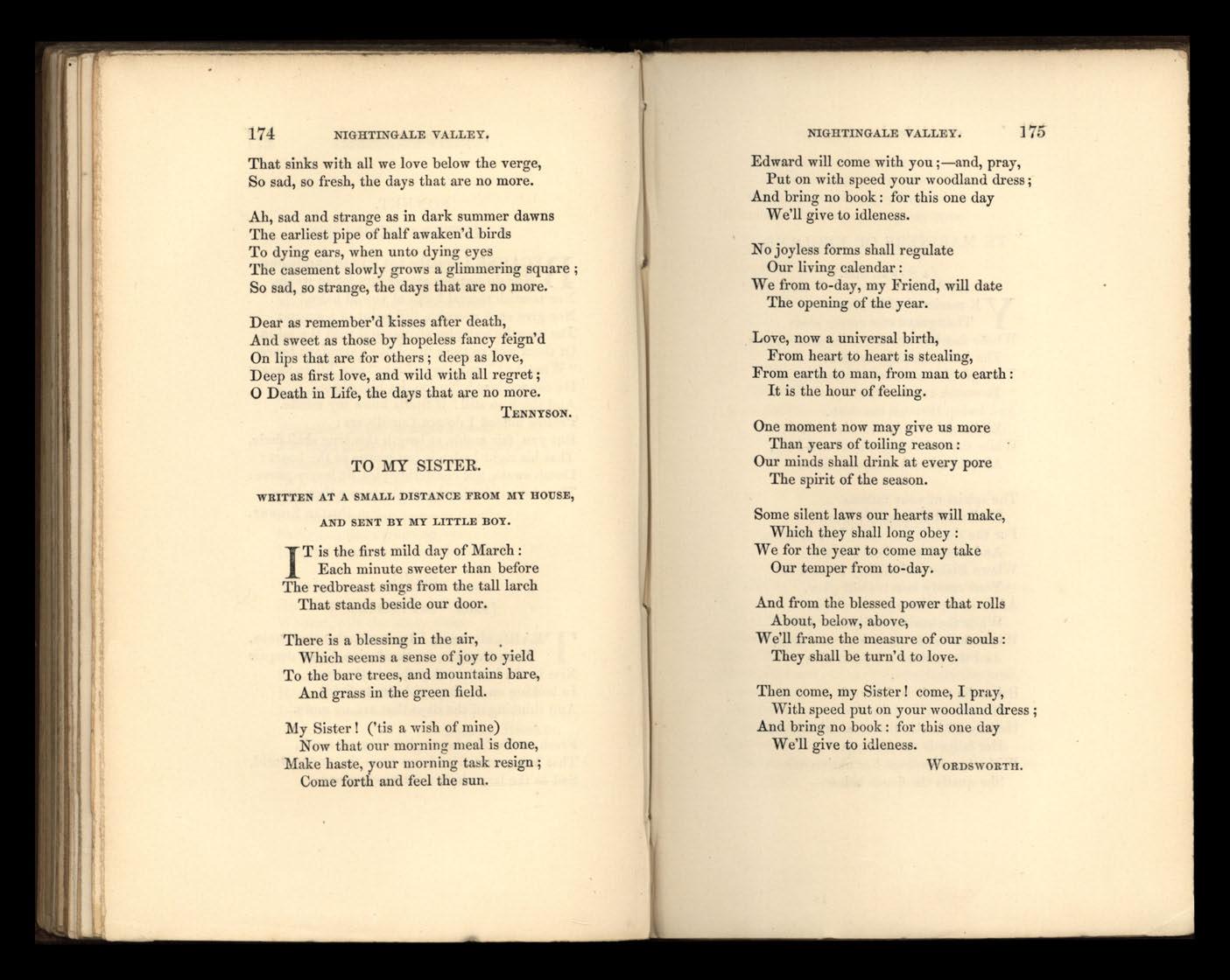
NIGHTINGALE VALLEY.
That sinks with all we love below the verge, So sad, so fresh, the days that are no more.
Ah, sad and strange as in dark summer dawns
The earliest pipe of half awaken'd birds
To dying ears, when unto dying eyes
The casement slowly grows a glimmering square; So sad, so strange, the days that are no more.
Dear as remember'd kisses after death, And sweet as those by hopeless fancy feign'd
On lip s that are for others; d eep as love, Deep as first love, and wild with all regret; o Death in Life, the days that are no more . TENNYSON.
WRITTEN AT A SMALL DISTANCE FROM MY HOUSE, AND SENT BY MY LITTLE BOY.
IT is the first mild day of March: Each minute sweeter than before The redbreast sings from the tall larch That stands beside our door.
There is a blessing in the air, . Which seems a sense of joy to yield To the bare trees, and mountains bare, And grass in the green field .
My Sister I ('lis a wish of mine)
Now that our morning meal is done, Make haste, /,our ta sk resign; Come forth and feel the sun.
NIGHTINGALE VALLEY. ]75
Edward will come with you i-and, pray, Put on with speed your woodland dress; And br ing no book: for this one day We'll give to idleness .
No joyless forms shall regulate
Our living calendar:
' Ve from to - day, my Friend, will date
The opening of the year
Love, now a universal birth, From heart to heart is stealing, From earth to man, from man to earth: It is the hour offeeling .
One moment now may give us more
Than years of toiling reason: Our minds shall drink at every pore
The spirit of the season.
Some silent laws our hearts will make, Which they shall long obey: We for the year to come may take Our temper from to-day
And from the blessed power that rolls About, below, above, We'll frame the measnre of our souls: They shall be turn'd to love.
Then come, my Sister! come, I pray, With speed put on your woodland dress; And bring no book: for this one day We'll give to idleness.
'VORDSWORTH
CA NAVAL ODE.)
YE mariners of England,
That guard our native seas;
Wbose flag has braved, a thousand years,
The battle and the breeze!
Your glorious standard launch again
To match another foe !
And sweep t.hrough the deep, While the stormy tempests blow; While the battle rages loud and long, And the stormy tempests blow,
The spirits of your fathers Shall start from every wave!
For the deck it was their field of fame, And Ocean was their grave:
Where Blake and mighty Nelson fell Your manly hearts shall glow,
As ye sweep through the deep, While the stormy tempests blow; While the battle rages loud and long, And the stormy tempests blow.
Britannia needs no bulwark, No towers along the steep; Her march is o'er the mountain waves
Her home is on the deep.
With thunders from her native oak
She quells the floods below-
NIGHTINGALE VALLEY
As they roar on the shore
When the stormy tempests blow; When the battle rages loud and long, And the stormy tempests blow.
The meteor flag of England Shall yet terrific burn ;
Till danger's troubled night depart, And the star of peace return.
Then, then, ye ocean warriors!
Our song and feast shall flow
To the fame of your name,
When the storm has ceased to blow; Wben the fiery fight is heard no more, And the storm has ceased to blow.
CAMPBELL.
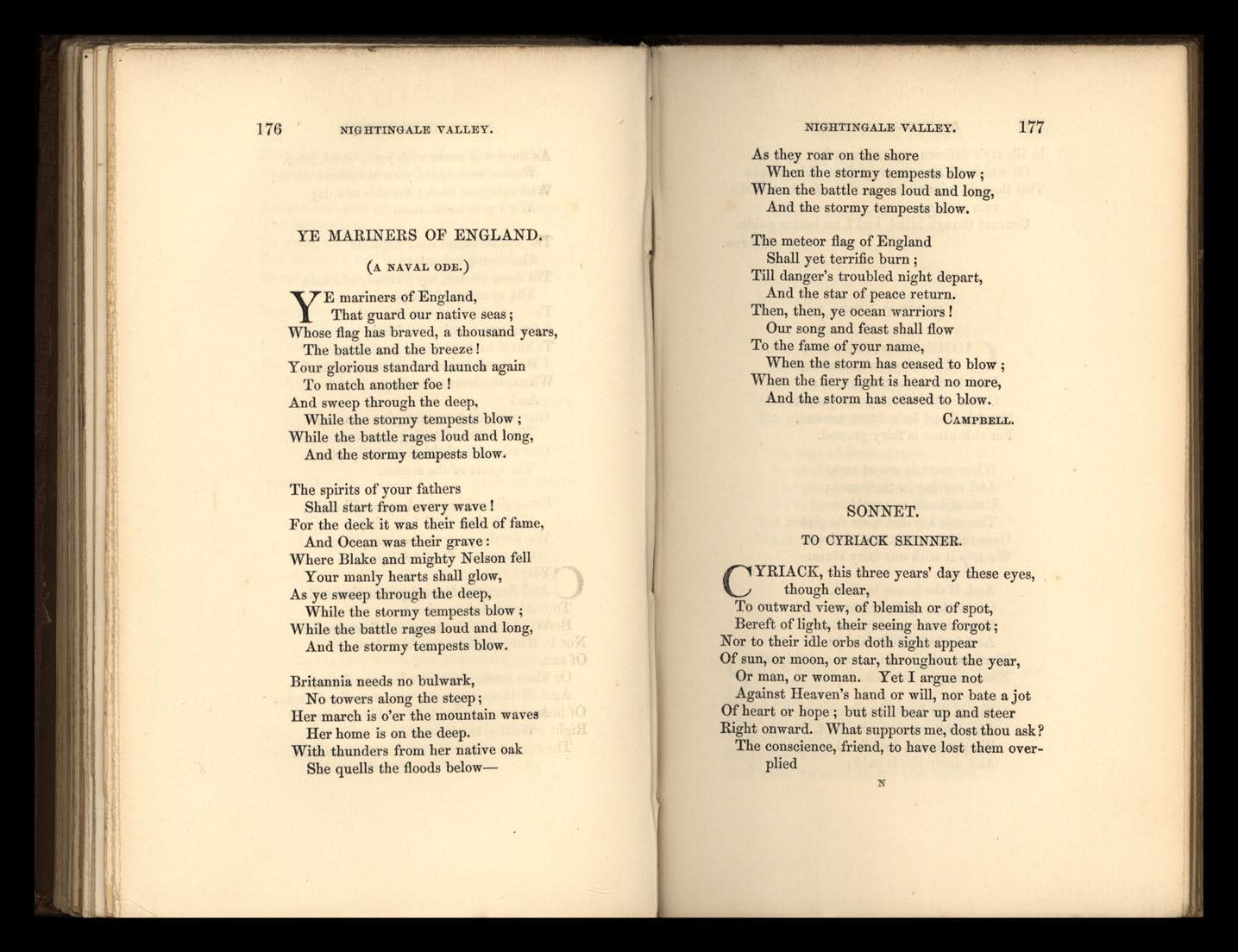
SONNET.
TO CYRIACK SKINNER.
CYRIACK, t.his three years' day these eyes, though clear,
To outward view, of blemish or of spot, Bereft of light, their seeing have forgot; Nor to their idle orbs doth sight appear
Of sun, or moon, or star, throughout the year, Or man, or woman . Yet I argue not
Against Heaven's hand or will, nor bate a jot
Of heart or hope; but still bear up and steer
Right onward. What supports me, dost thou ask?
The conscience, friend, to have lost them overplied
178 NIGHTINGALE VALLEY.
In liberty's defence, my noble task, Of which all Europe rings from side to side. This thought might lead me through the world's vain masque, Content though blind, had I no better guide.
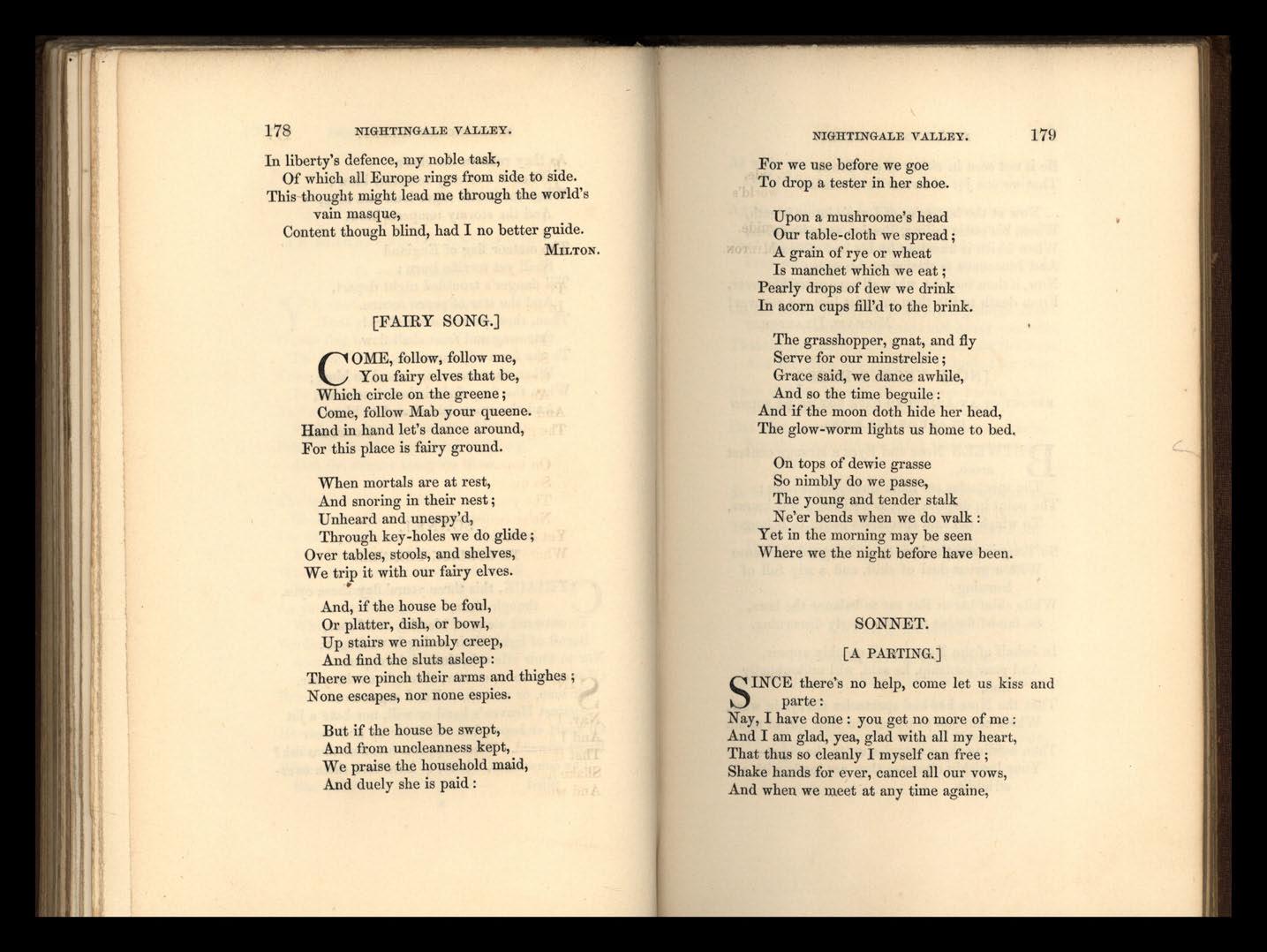
[FAIRY SONG.]
COME, follow, follow me, You fairy elves that be, Which circle on the greene; Come, follow Mab your queene. Hand in hand let's dance around, For this place is fairy ground.
When mortals are at rest, And snoring in their nest; Unheard and unespy'd, Through key-holes we do glide; Over tables, stools, and shelves, We trip it with our fairy elves . .
And, if the house be foul, Or platter, dish, or bowl, Up stairs we nimbly creep, And find the sluts asleep;
MILTON. There we pinch their arms and thighes ; None escapes, nor none espies.
But if the house be swept, And from uncleanness kept, We praise the household maid, And duely she is paid;
NIGHTINGALE VALLEY.
For we use before we goe To drop a tester in her shoe .
Upon a mushroome's head
Our table-cloth we spread; A grain of rye or wheat Is manchet which we eat; Pearly drops of dew we drink In acorn cups fill'd to the brink.
The grasshopper, gnat, and fly
Serve for our minstrelsie ; Grace said, we dance awhile, And so the time beguile; And if the moon doth hide her head, The glow -worm lights us home to bed.
On tops of dewie grasse
So nimbly do we passe, The young and tender stalk Ne'er bends when we do walk; Yet in the morning may be seen Where we the night before have been.
SONNET.
[A PARTING.]
SINCE there's no h.elp, come let us kiss and parte; Nay, I have done; you get no more of me ; And I am glad, yea, glad with all my heart, That thus so cleanly I myself can free; Shake hands for ever, cancel all our vows, And when we meet at any time againe,
180
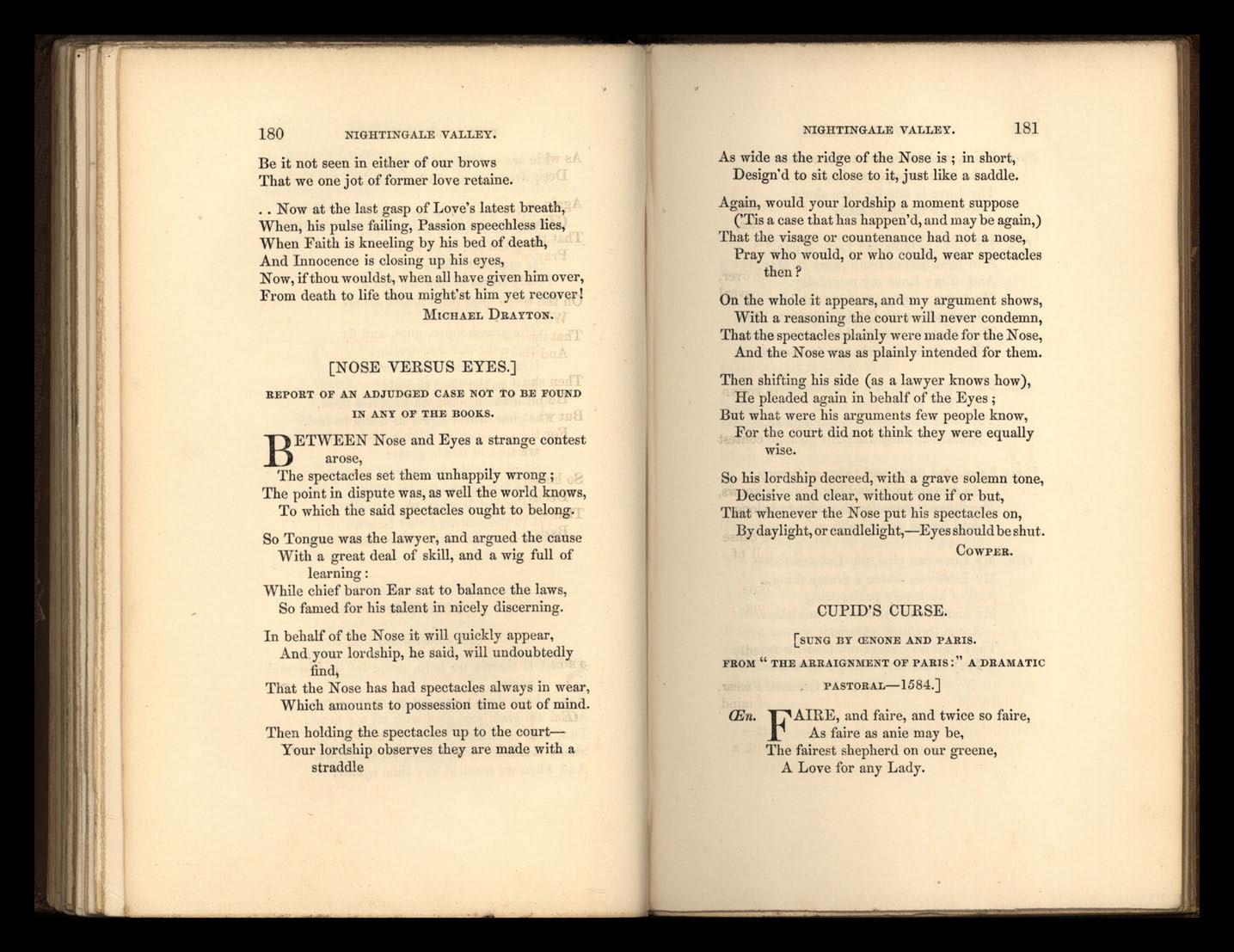
NIGHTINGALE VALLEY.
Be it not seen in either of our brows That we one jot of former love retaine .
. . Now at the last gasp of Love's latest breath, When, his pulse failing, Passion speechless lies, When Faith is kneeling by his bed of death, And Innocence is closing up his eyes, Now, if thou wouldst, when all have given him over, From death to life thou might'st him yet recover!
MICHAEL DRAYTON.
REPORT OF AN ADJUDGED CASE NOT TO BE FOUND IN ANY OF THE BOOKS
BETWEEN Nose and Eyes a strange contest arose,
The spectacles set them unhappily wrong; The point in dispute was, as well the world knows, To which the said spectacles ought to belong.
So Tongue was the lawyer, and argued the cause With a great deal of skill, and a wig full of learning:
While chief baron Ear sat to balance the laws, So famed for his talent in nicely discerning.
In behalf of the Nose it will quickly appear, And ,your lordship, he said, will undoubtedly find,
That the Nose has had spectacles always in wear, Which amounts to possession time out of mind.
Then holding the spectacles up to the courtYour lordship observes they are madc with a straddle
NIGHTINGALE VALLEY. 181
As wide as the ridge of the Nose is ; in short, Design'd to sit close to it, just like a sadd le.
Aga in, would your lordship a moment suppose (,Tis a case that has happen'd, and may be again,) That the visage or countenance had not a nose, Pray who would, or who could, wear spectacles then?
On t.he whole it appears, and my argument shows, With a reasoning the court will never condemn, That the spectacles plainly were made for the Nose, And the Nose was as plainly intended for them.
Then shifting his side (as a lawyer knows how), He pleaded again in behalf of the Eyes j
But what were his arguments few people know, For the court did not think they were equally wise.
So his lordship decreed, with a grave solemn tone, Decisive aud clear, without one if or but, That whenever the Nose put his spectacles on, By daylight, or candlelight,-Eyes should be shut. COWPER.
CUPID'S CURSE.
[SUNG BY <ENONE AND PARIS.
FROM" THE ARRAIGNMENT OF PARIS:" A DRAMATIC PASTORAL-1584.]
(En. F AIRE, and faire, and twice so faire, As faire as anie may be, The fairest shepherd on our greene, A Love for any Lady.
1 82 NIGHTINGALE VALLEY.
Paris. Faire, and faire, and twice so faire, As faire as any may be, Thy Love is fair for thee alone, And for no other Lady.
(En. My Love is faire, my Love is gay, And fresh as bin the flowers in May, And of my Love my roundelay, My merry, merry, merry roundelay, 1 Concludes with Cupid's Curse: They that do change old love for newe, Pray Gods they change for worse!
(En. Faire, and faire, and twice so faire, As faire as any may be, The fairest shepherd on our greene, A Love for any Lady.
Paris. Faire, and fail'e, and twice so faire, As faire as anie may be, Thy Love is faire for thee alon e, And for no other Lady.
(En. My Love can pipe, my Love can sing, My Love can manie a pretty thing, And of his lovely praises ring My merry, merry, merry roundelays. Amen to Cupid's Curse: They that do change old love for newc, Pray Gods they change for worse!
GEORGE PEELE.
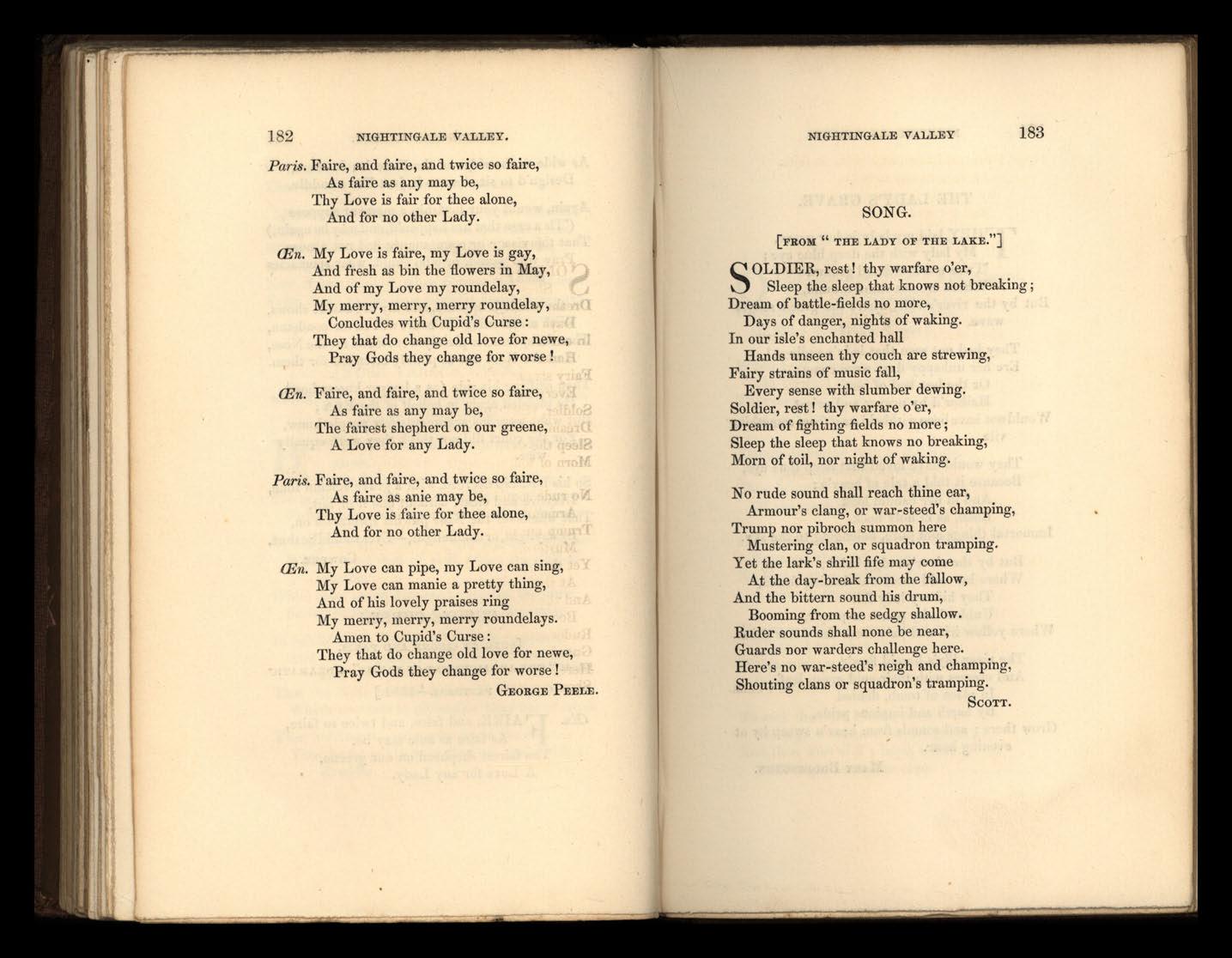
NIGHTINGALE VALLEY 183 SONG.
[FROM"
SOLDIER, rest! thy warfare o'er, Sleep the sleep that knows not breaking; Dream of battle-fields no more, Days of danger, nights of waking. In our isle's enchanted hall
Hands unseen thy couch are strewing, Fairy strains of music fall, Every sense with slumb er dewing. Soldier, rest! thy warfare o'er, Dream of fighting fields no more; Sleep the sleep that knows no breaking, Morn of toil, nor night of waking.
No rude sound shall reach thine ear, Armour's clang, or war-steed's champing, Trump nor pibroch summon here Mustering clan, or squadron tramping. Yet the lark's shrill fife may come At the day-break from the fallow, And the bittern sound his drum, Booming from t.he sedgy shallow. Ruder sounds shall none be near, Guards nor warders challenge here. H ere's no war-steed's neigh and champing, Shouting clans or squadron's tramping. SCOTT.
184
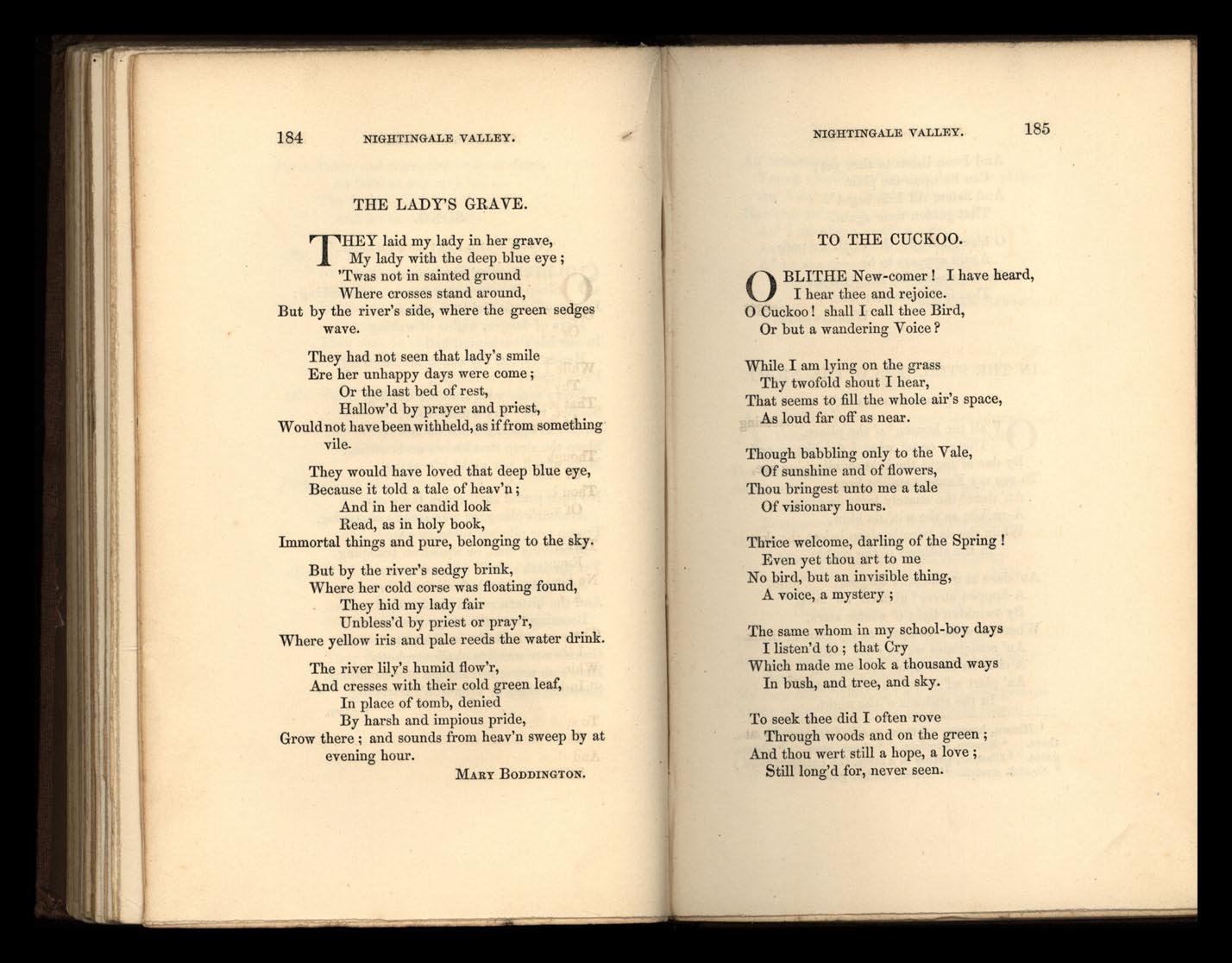
NIGHTINGALE VALLEY.
THE LADY'S GRAVE.
THEY laid my lady in her grave, My lady with the deep blue eye; 'Twas not in sainted ground 'Vhere crosses stand around, But by the river's side, where t.he green sedges wave.
They had not seen that lady's smile Ere her unhappy days were come; Or the last bed of rest, Hallow'd by prayer and priest, Would not have been withheld, as iffrom something vile.
They would have loved that deep blue eye, Because it told a tale of heav'n ; And in her candid look Read, as in holy book, Immortal things and pure, belonging to the sky.
But by the river's sedgy brink, Where her cold corse was floating found, They hid my lady fair Unbless'd by priest or pray'r, Where yellow iris and pale reeds the water drink.
The river lily's humid flow'r, And cresses 'with their cold green leaf, In place of tomb, denied By harsh and impious pride, Grow there; and sounds from heav'n sweep by at evening hour.
MARY BODDINGToN.
NIGHTINGALE VALLEY. 185
OBLITHE N ew-comer! I have heard, I hear thee and rejoice. o Cuckoo! shall I call thee Bird, Or but a wandering Voice?
While I am lying on the grass Thy twofold shout I hear, That seems to fill the whole air's space, As loud far off as near.
Though babbling only to the Vale, Of sunshine and of flowers, Thou bringest unto me a tale Of visionary hours.
Thrice welcome, darling of the Spring! Even yet thou art to me No bird, but an invisible thing, A voice, a mystery;
The same whom in my school-boy days I listen'd to; that Cry Which made me look a thousand ways In bush, and tree, and sky.
To seek thee did I often rove Through woods and on the green; And thou wert still a hope, a love; StiIllong'd for, never seen.
186
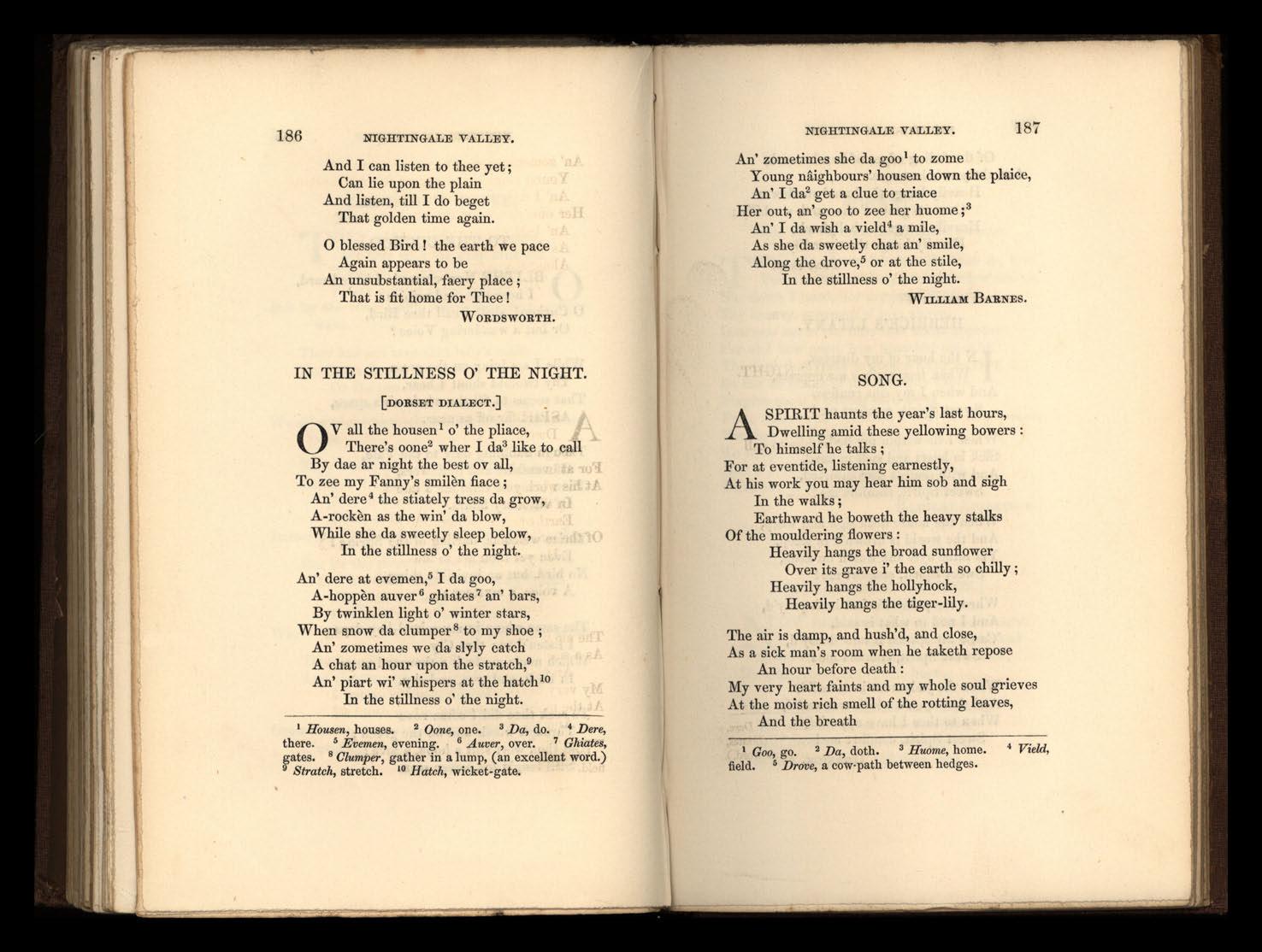
NIGHTINGALE VALLEY.
And I can listen to thee yet; Can lie upon the plain And listen, till I do beget That golden time again.
o blessed Bird! the earth we pace Again appears to be An unsubstantial, faery place; That is fit home for Thee!
W ORDSWORTH.
[DORSET DIALECT.]
Qv all the housen 1 0' the pliace, There's oone2 wher I da3 like to call
By dae ar night the best ov all,
To zee my Fanny's smilen fiace ;
An' dere 4 the stiately tress da grow, A-rocken as the win' da blow,
While she da sweetly sleep below, In the stillness 0' the night.
An' dere at evemen,5 I da goo,
A-hoppen auver 6 ghiates 7 an' bars, By twinklen light 0' winter st.ars, When snow da dumper 8 to my shoe;
An' zometimes we da slyly cat.ch
A chat an hour upon the stratch,9
An' piart wi' whispers at the hatch 10 In the stillness 0' the night.
1 Housen, houses. 2 Oone, one. 3 Da, do. • Der there. • Evemen, evening. 6 .A.uver, over. 7 Ghiatea, fates. 80lumper , gather in a lump, (an excellent word.) Stratch, stretch 10 Hatch, wicket-gate.
mGHTINGALE VALLEY. 187
An' zometimes she da goo I to zome
Young naighbours' housen down the plaice,
An' I da2 get a clue to triace
Her out, an' goo to zee her huome;3
An' I da wish a vield' a mile,
As she da sweetly chat an' smile,
Along the drove, 5 or at the sti le, In the stillness 0' the night.
WILLIAM BARNEs.
ASPIRIT haunts the year's last hours,
Dwelling amid these yellowing bowers:
To himself he talks;
For at eventide, listening earnestly,
At his work you may hear him sob and sigh
In the walks;
Earthward he boweth the heavy stalks
Of the mouldering flowers:
Heavily hangs the broad sunflower
Over its grave i' the earth so chilly; Heavily hangs the hollyhock, Heavily hangs the tiger-lily.
The air is damp, and hush'd, and close,
As a sick man's room when he taketh repose
An hour before death:
My very heart faints and my whole soul griev es
At the moist rich smell of the rotting l eaves, And the breath
1 Goo, go. 2 Da, doth. 3 Huome, home. 4 Vield, field. • Drove, a cow·path between hedges
County Library Service
188

NIGHTINGALE VALLEY.
Of the fading edges of box beneath, And the year's last rose. •
Heavily hangs the broad sunflower
Over its grave i' the earth so chilly; Heavily hangs the hollyhock, Heavily hangs the tiger-lily. TENNysoN.
HERRICK'S LITANY.
IN the hour of my distress, When temptations me oppress, And when I my sins confess, Sweet Spirit, comfort me!
When I lie within my bed, Sick in heart and sick in head, And with doubts discomforted, Sweet Spu'it, comfort me!
When the house doth sigh and weep, And the world is drown'd in sleep, Yet mine eyes the watch do keep, Sweet Spirit, comfort me!
When the priest his last hath pray'd, And I nod to what is said, 'Cause my speech is now decay'd, Sweet Spirit, comfort me !
When the judgment is reveard, And that open'd which was seaI'd, When to thee I have appeal'd, Sweet Spirit, comfort me ! HllRRICK.
NIGHTINGALE VALLEY.
189 SONNET.
FROM THE ITALIAN OF MICHAEL ANGELO.
THE might of one fair face sublimes my love, For it hath wean'd my heart from low desires, Nor death I need, nor purgatorial fires; Thy beauty, antepart of joys above, Instructs me in the bliss that saints approve; For oh! how good, how beautiful must be The God that made so good a thing as thee, So fair an image of the heavenly Dove.
Forgive me if I cannot turn away
From those sweet eyes that are my earthly heaven, For they are guiding stars benignly given To tempt my footsteps to t.he upward way; And if I dwell too fondly in thy sight, I live and love in God's peculiar light.
HARTLEY COLERlDGE.
[SPRING AND SORROW.]
NOW fades the last long streak of snow, Now burgeons every maze of quick About the flowering squares, and thick, By ashen roots the violets blow.
Now rings the woodland loud and long, The distance takes a lovelier hue, And drown'd in yonder living blue
The lark becomes a sightless song. Donegal County Library Service
190 NIGHTINGALE VALLEY.
Now dance the lights on lawn and lea,
The flocks are whiter down the vale, And milkier every milky sail
On winding stream or distant sea;
Where now the seamew pipes, or dives
In yonder greening gleam, and fl!
The happy birds that change theIr sky
To build and brood; that live their lives
From land to land; and in my breast
Spring wakens too; and my regret
Becomes an April violet,
And buds and blossoms like the rest.
In Memoriam.
CHORUS OF THE FLOWERS.
WE are the sweet Flowers,
Born of sunny showers,
Think whene'er you see us, what our beauty saith: , . Utterance mute and brIght
Of some unknown delight,
We fill the air with pleasure, by our simple breath:
All who see us, love us ;
We befit all places;
Unto sorrow we give smiles; and unto graces, graces.
Mark our ways, how noiseless
All, and sweetly voiceless,
Though the March winds pipe to make our passage clear;

NIGHTINGALE VALLEY. 19l
Not a whisper tells
Where our small seed dwells,
Nor is known the moment green, when our tips appear.
We thread the earth in silence,
In silence build our bowers,
And leaf by leaf in silence show, till we laugh atop, sweet Flowers!
The dear lumpish baby,
Humming with the May-bee,
Hails us with his bright stare, stumbling through the grass;
The honey - dropping moon,
On a night in June,
Kisses our pale pathway leaves, that felt the bridegroom pass;
Age, the wither'd clinger,
On us mutely gazes,
And wraps the thought of his last bed in his childhood's daisies
See, and scorn all duller
Taste, how heav'n loves colour,
How great Nature, clearly, joys in red and green;
What sweet thoughts she thinks
Of violets and pinks,
And a thousand flushing hues, made solely to b e seen;
See her whitest lilies
Chill the silver showers,
And what a red mouth has her rose, the woman of the flowers!
Uselessness divinest
Of a use the finest
Donegal County Library Service
192

NIGHTINGALE VALLEY.
Painteth US, the teachers of the end of use; Travellers weary-eyed
Bless us far and wide;
Unto sick and prison'd thoughts we give sudden truce;
Not a poor town-window
Loves its sickliest planting, But its wall speaks loftier truth than Babylon's whole vaunting.
Sage are yet t.he uses . .
Mix'd with our sweet JUIces,
Whether man or may-fly profit of the balm;
As fair fingers heal'd
Knicrhts from the olden field, We hold cu"ps' of mightiest force to give the wildest calm.
E'en the terror Poison
Hath its plea for blooming; Life it gives to reverent lips, though death to the presuming.
And oh lour sweet soul-taker,
That thief the honey-maker,
What a house hath he, by the thymy glen 1
In his talking rooms
How the feasting fumes, Till his crold cups overflow to the mouths of men!
The butterflies come aping
Those fine thieves of ours, And flutter round our rifled tops, like tickled flowers with flowers.
See those tops, how beauteous 1
What fair service duteous
NIGHTINGALE VALLEY. 193
Round some idol waits, as on their lord the Nine?
Elfin court 'twould seem;
And taught perchance that dream
Which the old Greek mountain dreamt upon nirrhts divine . . .,
To expound such wonder
Human speech avails not;
Yet there dies no poorest weed, that such a glory exhales not.
Think of all these treasures,
Matchless works and pleasures,
Everyone a marvel, than thought can say;
Then think in what bright showers
We thicken fields and bowers,
And with what heaps of sweetness half stifle wanton May:
Think of the mossy forests
By the bee-birds haunted,
And all those Amazonian plains, lone lying as enchanted!
Trees themselves are ours;
Fruits are born of flowers;
Peach and roughest nut were blossoms in the spring; The lusty bee knows well
The news, and comes pell -mell, And dances in the bloomy thicks with darksome antheming.
Beneath the very burthen
Of planet-pressing ocean
We wash our smiling cheeks in peace, a thought for meek devotion.
Tears of Phcebus,-missings Of Cytherea's kissings, o
194
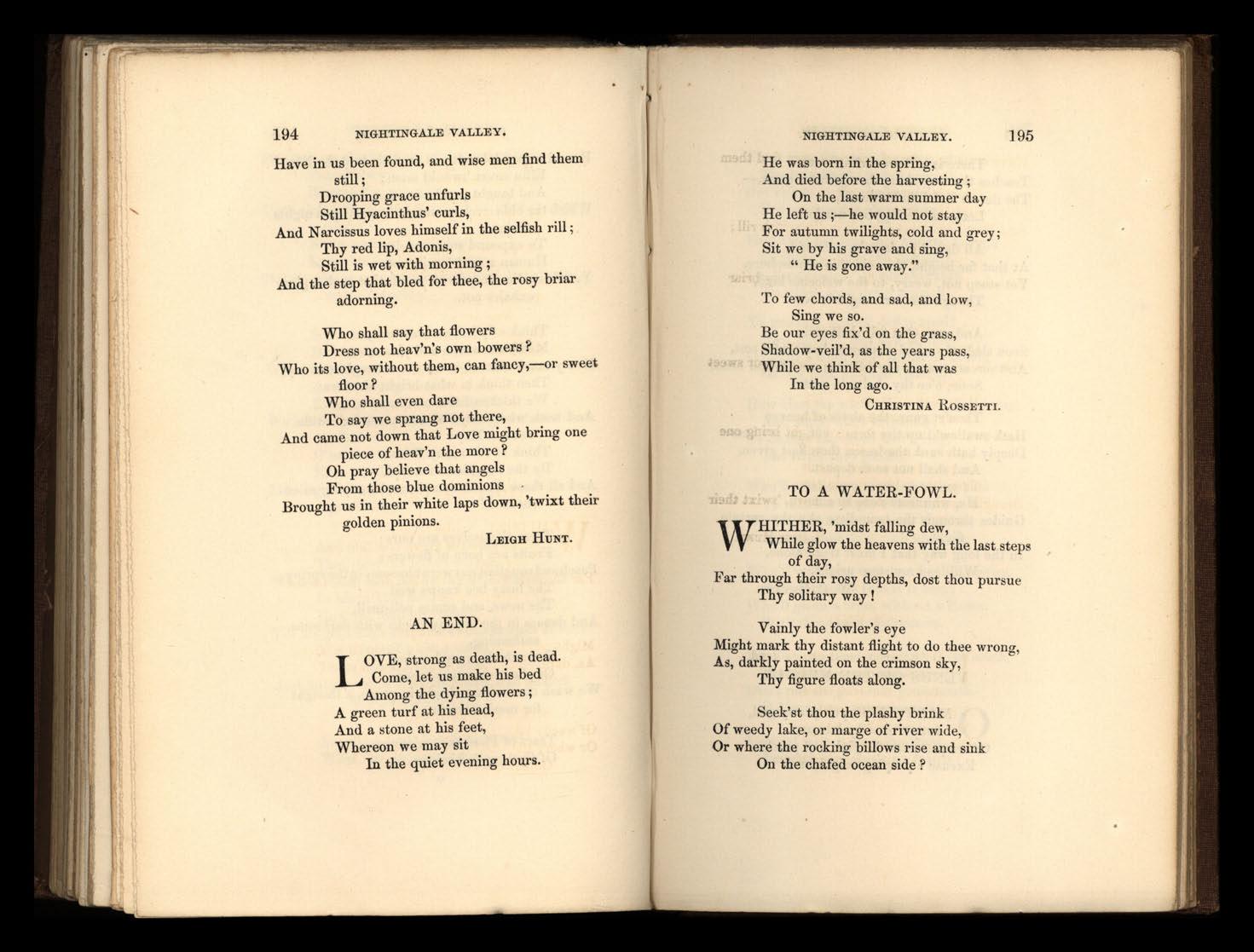
NIGHTINGALE VALLEY.
Have in us been found, and wise men find them still ;
Drooping grace unfurls
Still Hyacinthus' .
And Narcissus loves himself m the selfish rIll ;
Thy red lip, Adonis, Still is wet with morning;
And the step that bled for thee, the rosy briar adorning.
Who shall say that flowers
Dress not heav'n's own bowers?
Who its love, without them, can fancy,-or sweet floor?
Who shall even dare
To say we sprang not there, And came not down that Love might bring one piece of heav'n the more?
Oh pray believe that angels
From tho se blue dominions
Brought us in their white laps down, 'twixt their golden pinions.
LEIGH HUNT
AN END.
LOVE, strong as death: is dead. Come, let us make hIS bed
Among the dying flowers; A green turf at his head, And a stone at his feet, Whereon we may sit In the quiet evening hours.
NIGHTINGALE VALLEY.
He was born in the spring, And died before the harvesting; On the last warm summer day
He left us ;-he would not stay For autumn twilights, cold and gr ey; Sit we by his grave and sing, " He is gone away."
To few chords, and sad, and low, Sing we so.
Be our eyes fix'd on the grass, Shadow -v eil'd, as the years pass, Whil e we think of all that was In the long ago.
CHRISTINA R OSS E TTJ.
TO A WATER-FOWL. ]95
WHITHER, 'midst falling dew, While glow the heavens with the last st e ps of day,
Far through their rosy depths, dost thou pursu e Thy solitary way!
Vainly the fowler's eye
Might mark thy distant flight to do thee wrong, As, darkly painted on the crimson sky, Thy figure floats along.
Seek'st thou the plashy brink
Of weedy lake, or marge of river wide, Or where the rocking billows ri se and sink On the chafed ocean side?
County Library Service
196

NIGHTINGALE VALLEY.
There is a Power whose care Teaches thy way along that pathless coast,The desert and illimitable air,Lone wandering, but not lost.
All day thy wings have fann'd, At that far height, the cold thin atmosphere, Yet stoop not, weary, to the welcome land, Though the dark night is near.
And soon that toil shall end; Soon sbalt thou find a summer home, and rest, And scream among thy fellows; reeds shall bend, Soon, o'er thy shelter'd nest . .
Thou'rt gone, the abyss of heaven Hath swallow'd up thy form; yet, on my heart Deeply hath sunk the lesson thou hast given, And shall not soon depart.
He, who from zone to zone Guides through the boundless sky thy certain flight, In the long way that I must tread alone, Will lead my steps aright.
W. C. BRYANT.
NIGHTINGALE VALLEY.
Those eyes for ever drooping, give The long brown lashes rarely; But violets in the shadows live,For once unveil them fairly.
Hast thou not lent that flounce enough Of looks so long and earnest? Lo, here's more" penetrable stuff" To which thou never turnest.
Ye graceful fingers, deftly sped! How slender, and how nimble! o might I wind their skeins of thread, Or but pick up their thimble!
197
VENUS OF THE NEEDLE.
OMARYANNE, you pretty girl, Intent on silky labour, Of sempstresses the pink and pearl, Excuse a peeping neighbour!
How blest the youth whom love shall bring, And happy stars embolden, To change the dome into a ring, The silver into golden!
Who'll steal some morning to her side To take her finger's measure, While ¥aryanne pretends to chide, And blushes deep with pleasure.
Who'll watch her sew her wedding-gown, Well conscious that it is hers; Who'll glean a tress, without a frown, With those so ready scissors.
Who'll taste those ripenings of the south, The fragrant and deliciousDon't put the pins into your mouth, o Maryanne, my precious I
I almost wish it were my trust To teach how shocking that is ; Donegal County Library Service
198 NIGHTINGALE VALLEY.
I wish I had not, as I must, To quit this tempting lattice.
Sure aim takes Cupid, fluttering foe, Across a street so narrow; A thread of silk to string his bow, A needle for his arrow!
WlLLIAM ALLINGHAM.
SONG OF ARIEL.
[FROM" THE TEMPEST."]
WHERE the bee sucks, there suck I; In a cowslip's bell I lie; There I couch when owls do cry; On the bat's back I do fly
After summer, merrily. Merrily, merrily, shall I live now, Under the blossom that hangs on the bough! SHAKESPEARE.
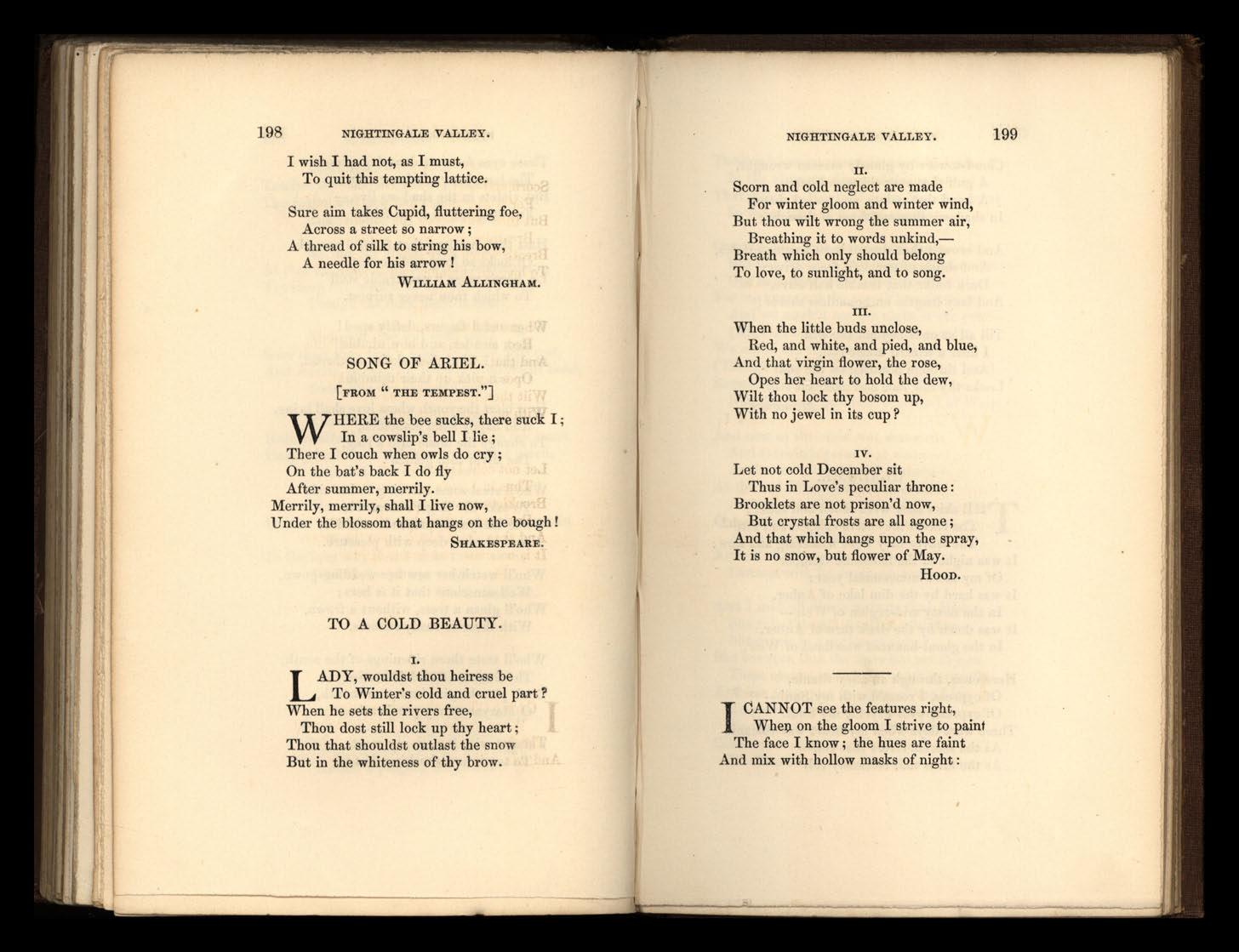
NIGHTINGALE VALLEY.
II.
Scorn and cold neglect are made For winter gloom and winter wind, But thou wilt wrong the summer air, Breathing it to words unkind,Breath which only should belong To love, to sunlight, and to song.
Ill.
When the little buds unclose, Red, and white, and pied, and blue, And that virgin flower, the rose, Opes her heart to hold the dew, Wilt thou lock thy bosom up, With no jewel in its cup?
IV.
Let not cold December sit Thus in Love's peculiar throne: Brooklets are not prison'd now, But crystal frosts are all agone; And that which hangs upon the spray, It is no snow, but flower of May. HOOD.
I.
LADY, wouldst thou heiress be To Winter's cold and cruel part ? When he sets the rivers free, Thou dost still lock up thy heart; Thou that shouldst outlast the snow But in the whiteness of thy brow.
I CANNOT see the features right, WheJ;l on the gloom I strive to paint
The face I know; the hues are faint And mix with hollow masks of night:
200
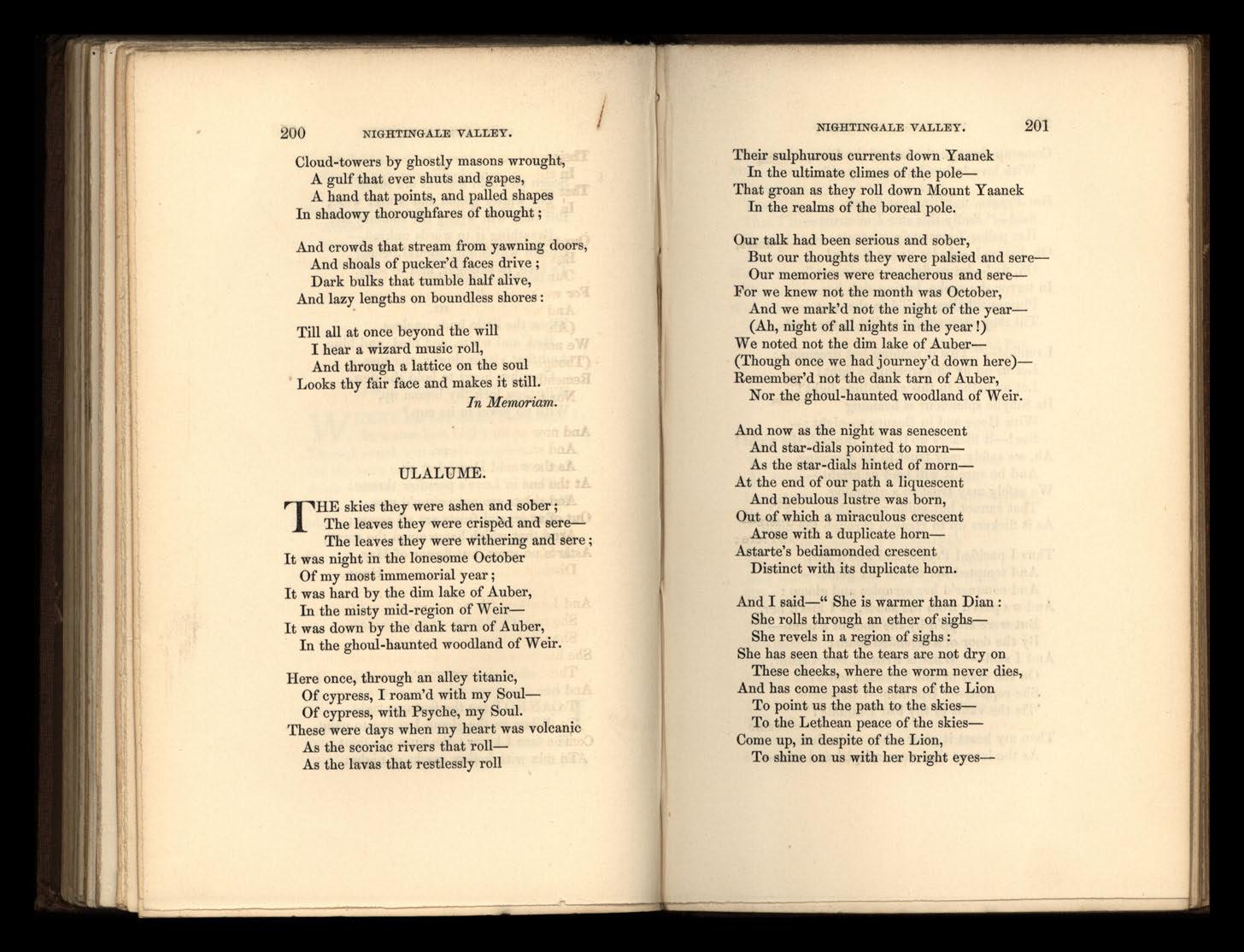
NIGHTINGALE VALLEY.
Cloud-towers by ghostly masons wrought, A gulf that ever shuts and gapes, A hand that points, and palled shapes In shadowy thoroughfares of thought;
And crowds that stream from yawning doors, And shoals of pucker'd faces drive; Dark bulks that tumble half alive, And lazy lengths on boundless shores:
Till all at once beyond the will I hear a wizard music roll, And through a lattice on the soul Looks thy fair face and makes it still.
In Memoriam.
ULALUME.
THE skies they were ashen and sober; The leaves they were crisped and sereThe leaves they were withering and sere;
It wns night in the lonesome October Of my most immemorial year ; It was hard by the dim lake of Auber, In the misty mid-region of WeirIt was down by the dank tarn of Auber, In the ghoul-haunted woodland of Weir.
Here once, through an alley titanic, Of cypress, I roam'd with my SoulOf cypress, with Psyche, my Soul. These were days when my heart was volcanic
As the scoriac rivers that ro11-
As the lavas that restlessly roll /
NIGHTINGALE VALLEY.
Their sulphurous currents down Yaanek In the ultimate climes of the poleThat groan as they roll down Mount Yaanek In the realms of the boreal pole.
Our talk had been serious and sober,
But our thoughts they were palsied and sere-
Our memories were treacherous and sereFor we knew not the month was October, And we mark'd not the night of the year-
(Ah, night of all nights in the year !)
We noted not the dim lake of Auber(Though once we hadjourney'd down here)-
Remember'd not the dank tarn of Auber, Nor the ghoul-haunted woodland of Weir.
And now as the night was senescent
And star-dials point.ed to morn-
As the star-dials hinted of morn-
At the end of our path a liquescent
And nebulous lustre was born,
Out of which a miraculous crescent
Arose with a duplicate horn-
Astarte's bediamonded crescent
Distinct with its duplicate horn.
And I said-" She is warmer than Dian :
She rolls through an ether of sighs-
She revels in a region of sighs:
She has seen that the tears are not dry on
These cheeks, where the worm never dies
And has come past the stars of the Lion '
To point us the path to the skies-
To the Lethean peace of the skies-
Come up, in despite of the Lion,
To shine on us with her bright eyes-
County Library Service
202
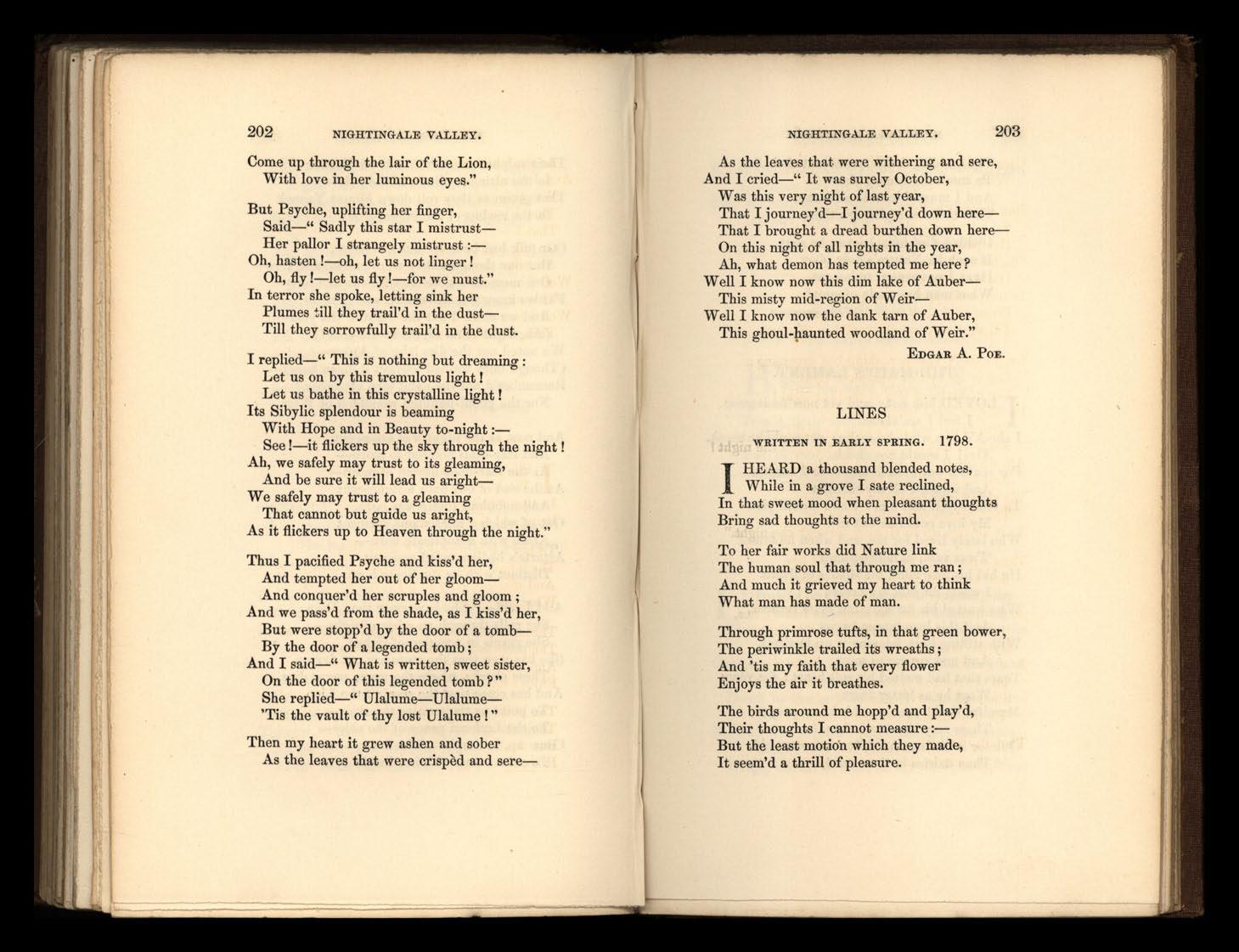
NIGHTINGALE VALLEY.
Come up through the lair of the Lion, With love in her luminous eyes."
But Psyche, uplifting her finger,
Said-" Sadly this star I mistrust-
Her pallor I strangely mistrust :-
Oh, hasten !-oh, let us not linger!
Oh, fly I-let us fly I-for we must."
In terror she spoke, letting sink her
Plumes they trail'd in the dust-
Till they sorrowfully trail'd in the dust.
I replied-" This is nothing but dreaming:
Let us on by this tremulous light!
Let us bathe in this crystalline light!
Its Sibylic splendour is beaming
With Hope and in Beauty to-night :-
See I-it flickers up the sky through the night!
Ah, we safely may trust to its gleaming,
And be sure it will lead us aright-
We safely may trust to a gleaming
That cannot but guide us aright,
As it flickers up to Heaven through the night."
Thus I pacified Payche and kiss'd her, And tempted her out of her gloomAnd conquer'd her scruples and gloom; And we pass'd from the shade, as I kiss'd her, But were stopp'd by the door of a tombBy the door of a legended tomb;
And I said-" What is written, sweet sister, On the door of this legended tomb?"
She replied-" Ulalume-Ulalume'Tis the vault of thy lost Ulalume ! "
Then my heart it grew ashen and sober
As the leaves that were crisped and sere-
NIGHTINGALE VALLEY. 203
As the leaves that were withering and sere,
And I cried-" It was surely October, Was this very night of last year,
That I journey'd-I journey'd down here-
That I brought a dread bur then down here-
On this night of all nights in the year, Ah, what demon has tempted me here?
Well I know now this dim lake of AuberThis misty mid-region of Weir-
Well I know now the dank tarn of Auber, This ghoul-paunted woodland of Weir."
EDGAR A. POE
WRITTEN IN EARLY SPRING. 1798.
IHEARD a thousand blended notes, While in a grove I sate reclined,
In that sweet mood when pleasant thoughts Bring sad thoughts to the mind.
To her fair works did Nature link
The human soul that through me ran; And much it grieved my heart to think What man has made of man.
Through primrose tufts, in that green bower, The periwinkle trailed its wreaths; And 'tis my faith that every flower
Enjoys the air it breathes.
The birds around me hopp'd and play'd, Their thoughts I cannot measure :-
But the least motion which they made, It seem'd a thrill of pleasure. Donegal County Library Service
204
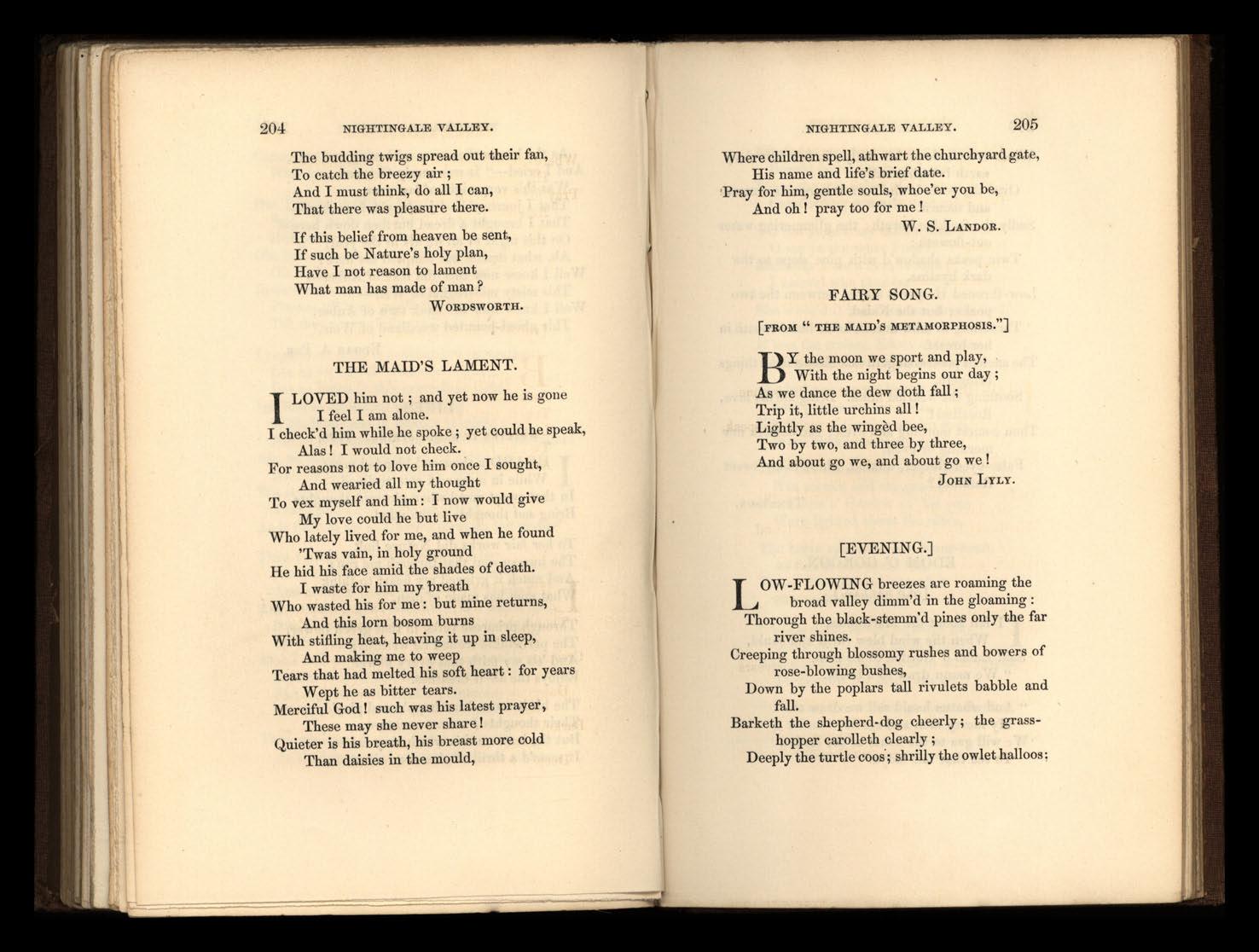
NIGHTINGALE VALLEY.
The budding twigs spr ead out their fan, To catch the breezy air ; And I must think, do all I can, That there was pleasure there.
If this belief from heaven be sent, If such be Nature's holy plan, Have I not reason to lament What man has made of man?
W ORDSWORTH.
ITHE MAID'S LAMENT.
LOVED him not; and yet now he is gone
I feel I am alone.
I check'd him while he spoke; yet could he speak, Alas I I would not check.
For reasons not to love him once I sought, And wearied all my thought
To vex myself and him: I now would give
My love could he but live
Who lately lived for me, and when he found 'Twas vain, in holy ground
He hid his face amid the shades of death.
I waste for him my breath
Who wasted his for me: but mine returns, And this lorn bosom burns
With stifling heat, heaving it up in sleep, And making me to weep
Tears that had melted his soft heart: for years
Wept he as bitter tears.
Merciful God I such was his latest prayer, These may she never share!
Quieter is his breath, his breast more cold Than daisies in the mould,
NIGHTINGALE VALLEY. 205
Where children spell, athwart the churchyard gate, His name and life's brief date.
'Pray for him, gentle souls, whoe'er you be, And oh! pray too for me !
W. S. LANDOR.
FAIRY SONG.
[FROM" THE MAID'S METAMORPHOSIS."]
By the moon we sport and play,
With the night begins our day;
As we dance the dew doth fall ; Trip it, little urchins all !
Lightly as the winged bee, Two by two, and three by three, And about go we, and about go we ! JOHN LYLY.
[EVENING.]
LOW -FLOWING breezes are roaming the broad valley dimm'd in the gloaming:
Thorough the black-stemm'd pines only the far river shines.
Creeping through blossomy rushes and bowers of rose-blowing bushes, Down by the poplars tall rivulets babble and fall.
Barketh the shepherd. dog cheerly; the grasshopper carolleth clearly;
Deeply the turtle coos·; shrilly the owlet haIIoos:
Donegal County Library Service
206
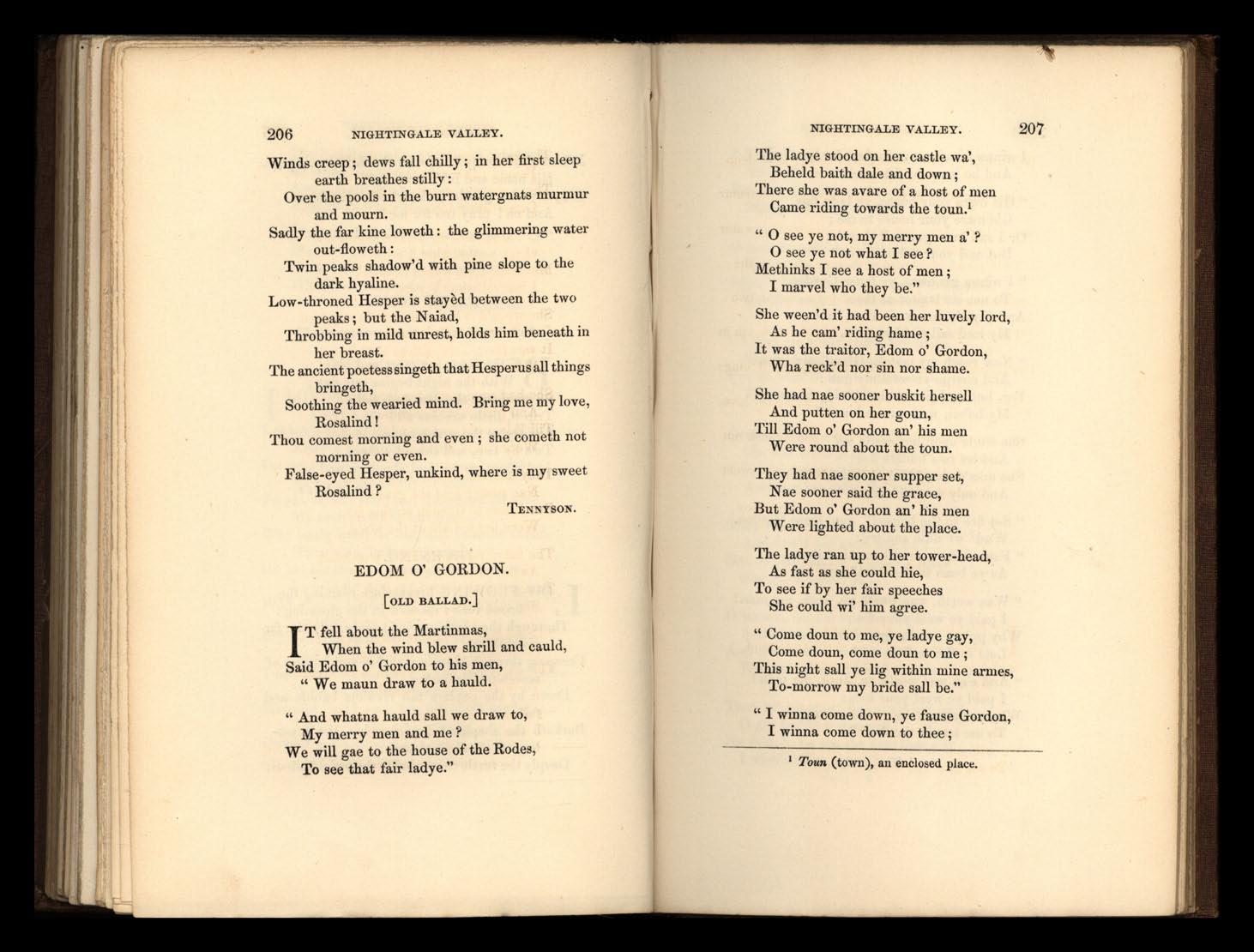
NIGHTINGALE VALLEY.
Winds creep; dews fall chilly; in her first sleep earth breathes stilly:
Over the pools in the burn watergnats murmur and mourn.
Sadly the far kine loweth: the glimmering water out-floweth :
Twin peaks shadow'd with pine slope to the dark hyaline.
Low-throned Hesper is stayed between the two peaks; but the Naiad, Throbbing in mild unrest, holds him beneath in her breast.
The ancient poetess singeth that Hesperus all things bringeth, Soothing the wearied mind. Bring me my love, Rosalind!
Thou comest morning and even; she cometh not morning or even.
False-eyed Hesper, unkind, where is my sweet Rosalind?
TENNysoN.
EDOM 0' GORDON.
[OLD BALLAD.]
IT fell about the Martinmas, When the wind blew shrill and cauld, Said Edom 0' Gordon to his men,
" We maun draw to a hauld.
" And whatna hauld sall we draw to, My merry men and me?
We will gae to the house of the Rodes, To see that fair ladye."
NIGHTINGALE VALLEY.
The ladye stood on her castle wa' Beheld baith dale and down' ' There she was avare of a host men Came riding towards the toun. 1
" 0 see ye not, my merry men a' ? o see ye not what I see? Methinks I see a host of men; I marvel who they be."
She ween'd it had been her luvely lord As he cam' ridinCT hame . ' It was the traitor, Edom 0: Gordon Wha reck'd nor sin nor shame. '
She had nae sooner buskit hersell
•. And putten on her goun, Till Edom 0' Gordon an' his men Were round about the toun.
They had nae sooner supper set, N ae sooner said the grace, But Edom 0' Gordon an' his men Were lighted about the place.
The ladye ran up to her tower-head, As fast as she could hie, To see if by her fair speeches She could wi' him agree.
" Come doun to me, ye ladye gay, Come doun, come doun to me .
This night sall ye lig within armes, To-morrow my bride sall be."
" I come down, ye fause Gordon, I wmna come down to thee;
I Toun (town), an enclosed plac•.
208

NIGHTINGALE V.ALLEY.
I winna forsake my ain dear lord,And he is na far frae me ."
" Gie owre your house, ye lady fair, Gie owre your house to me ; Or I sall burn yoursell therein, But and your babies three."
" I winna gie owre, ye fause Gordon, To nae sic traitor as thee
And if ye burn my ain dear babes, My lord saIl mak' ye dree.
" Now reach my pistoll, Glaud, my man, And charge ye weel my gun; For, but an I pierce that bluidy butcher, My babes, we been undone! "
She stude upon her castle wa' And let twa bullets flee: She miss'd that bluidy butcher's heart, And only razed his knee .
" Set fire to the house!" quo' fause Gordon, Wud l wi' dule and ire:
" Fause ladye, ye sall rue that shot, As ye burn in the fire!"
" W ae worth, wae worth ye, Jock, my man!
I paid ye weel your fee; Why pu' ye out the grund-wa' stane, Lets in the reek to me ?
" And e'en wae worth ye, Jock, my man!
I paid ye weel your hire; 'Vhy pu' ye out the grund-wa' stane, To me lets in the fire?"
I Wud,mad.
" Ye paid me weel my hire, ladye, Ye paid me weel my fee:
But now I'm Edom 0' Gordon's manMaun either do or dee." '
o then bespake her little son, Sat on the nurse's knee: Says, " Mither dear, gie owre this house For the reek it smothers me." '
" I wad gie a' my gowd, my bairn, Sae wad I a' my fee, For ae blast 0' the western wind, To blaw the reek frae thee.",
o then bespake her daughter dear,She was baith jimp and sma' :
" 0 row' me in a pair 0' sheets, And tow me owre the wa' !"
They row'd her in a pair 0' sheets, And tow'd her owre the wa' ; But on the point 0' Gordon's spear She gat a deadly fa'.
o bonnie, bonnie was her mouth, And cherry were her cheeks, And clear, clear was her yellow hair, Whereon the red blood dreeps.
Then wi' his spear he turn'd her owre . o gin her face was wan! '
He said, " Ye are the first that e'er I wish'd alive again."
p
210

NIGHTINGALE VALLEY.
He turn'd her owre and owre again; o gin her skin was white!
.. I might hae spared that bonnie face To hae been some man's delight "
" Busk and boun, my merry men a', For ill dooms I do guess ;I cannot look on that bonnie face As it lies on the grass."
Wha looks to freits,1 my master dear, Its freits will follow them;
Let it ne'er be said that Edom 0' Gordon Was daunted by a dame."
But when the ladye saw the fire Come flaming o'er her head, She wept, and kiss'd her children twain, Says, " Bairns, we been but dead."
The Gordon then his bugle blew, And said, " Awa', awa'!
This House o· the Rodes is a' in a flame, I hawd it time to ga'."
And this way lookit her ain dear lord, As he came owre the lea; He saw his castle a' in a lowe, Sae far as he could see.
" Put on, put on, my wighty men, As fast as ye can dri'e!
For he that's hindmost 0' the thrang Sall ne'er get good 0' me."
I Freits, (frights ?), ill-omens, ill-lu ck.
1UGHTINGALE VALLEY.
Then some they rade, and some tl;1ey ran, Out - owre the grass and bent; But ere the foremost could win up, Baith lady and babes were brent.
And afte r the Gordon he is gane, Sae fast as he might dri'e ;
And soon i' the Gordon's foul heart's blude He's wroken his fair ladye
PHILLIDA AND CORYDON.
IN the merry month of May, In a morn, by break of day, Forth I walk'd by the wood -side, When as May was in his pride: There I spiM, all alone, Phillida and Corydon. Much ado there was, God wot; He would love, and she would not. She said, never man was true; He said, none was false to you. He said, he had loved her long; She said, love should have no wrong. Corydon would kiss her then; said, maids must kiss no men, Till they do for good and all :
Then she made the shepherd call All the heavens to witness truth, Never loved a truer youth. Then with many a pretty oath, Yea and nay, and faith and troth, Such as silly shepherds use, When they will not love abuse, Donegal County Library Service
212
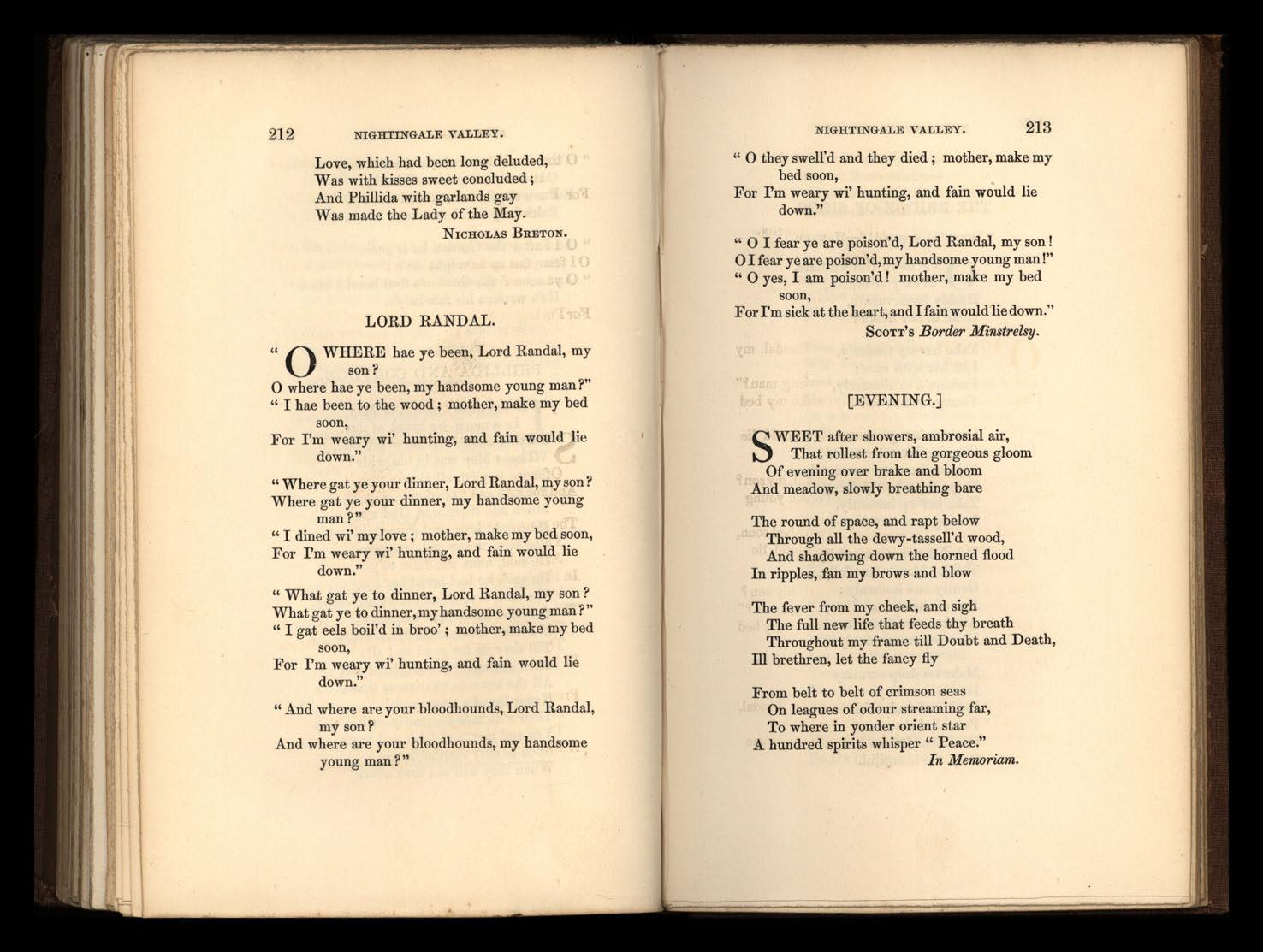
NIGHTINGALE VALLEY.
Love, which had been long deluded, Was with kisses sweet concluded; And Phillida with garlands gay Was made the Lady of the May. N ICHOLAS BRETON.
LORD RANDAL.
"0WHERE hae ye been, Lord Randal, my son?
o where hae ye been, my handsome young man?"
" I hae been to the wood; mother, make my bed soon,
For I'm weary wi' hunting, and fain would lie down."
"Where gat ye your dinner, Lord Randal, my son?
Where gat ye your dinner, my handsome young man?"
" I dined wi' my love; mother, make my bed soon, For I'm weary wi' hunting, and fain would lie down."
" What gat ye to dinner, Lord Randal, my son?
What gat ye to dinner,myhandsome young man?"
" I gat eels boil'd in broo' ; mother, make my bed soon,
For I'm weary wi' hunting, and fain would lie down."
" And where are your bloodhounds, Lord Randal, my son?
And where are your bloodhounds, my handsome young man?"
NIGHTINGALE VALLEY. 213
" 0 they swell'd and they died; mother, make my bed soon,
For I'm weary wi' hunting, and fain would lie down."
" 0 I fear ye are poison'd, Lord Randal, my son!
o I fear ye are poison'd, my handsome young man !"
" 0 yes, I am poison'd! mother, make my bed soon,
For I'm sick at the heart, andlfain would liedown."
SCOTT'S Border Minstrelsy.
after showers, ambrosial air, That rollest from the gorgeous gloom
Of evening over brake and bloom
And meadow, slowly breathing bare
The round of space, and rapt below
Through all the dewy-tassell'd wood, And shadowing down the horned flood
In ripples, fan my brows and blow
The fever from my cheek, and sigh
The full new life that feeds thy breath
Throughout my frame till Doubt and Death, III brethren, let the fancy fly
From belt to belt of crimson seas
On leagues of odour streaming far,
To where in yonder orient star
A hundred spirits whisper" Peace."
In Memoriam.
Still, for all slips of hers, One of Eve's family-
Wipe those poor lips 'Of hers
THE BRIDGE OF SIGHS. Oozing so clammily.
" Drown'd! drown'd! "-HAlIILET.
O 'NE more Unfortunate,
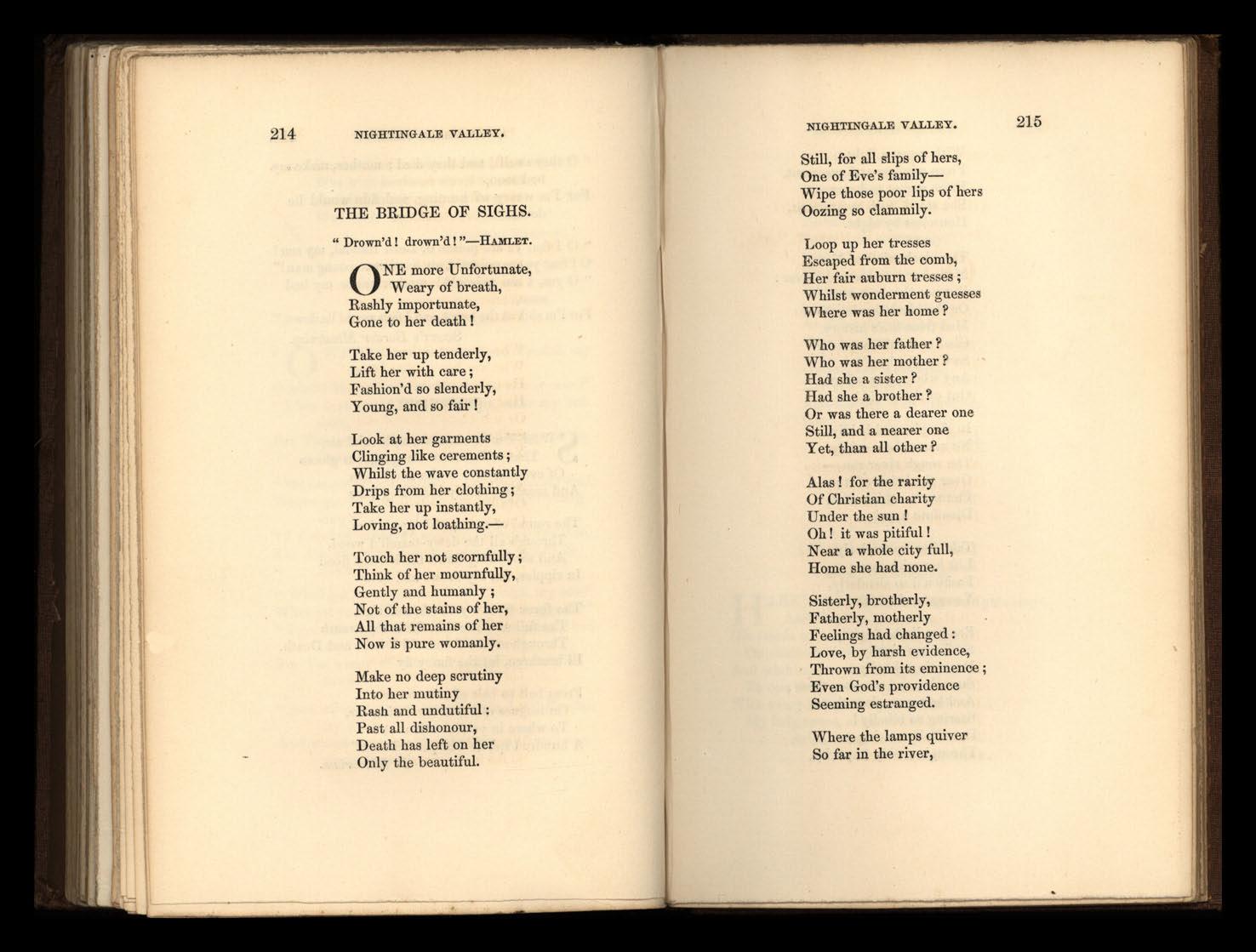
Loop up her tresses
Escaped from the comb, Weary of breath,
Rashly importunate,
Gone to her death!
Take her up tenderly,
Lift her with care;
Fashion'd so slenderly,
Her fair auburn tresses;
Whilst wonderment guesses
\Vhere was her home?
Who was her father?
Who was her mother?
Had she a sister? Young, and so fair !
Look at her garments
Clinging like cerements;
Whilst the wave constantly
Drips from her clothing;
Take her up instantly,
Loving, not loathing.-
Touch her not scornfully;
Think of her mournfully,
Gently and humanly;
Not of the stains of her,
All that remains of her
Now is pure womanly.
Make no deep scrutiny
Had she a brother?
Or was there a dearer one
Still, and a nearer one
Yet, than all other?
Alas! for the rarity
Of Christian charity
Under the sun!
Oh! it was pitiful!
Near a whole city full,
Home she had none.
Sisterly, brotherly,
Fatherly, motherly
Feelings had changed:
Love, by harsh evidence,
Thrown from its eminence; Into her mutiny
Rash and undutiful :
Past all dishonour,
Death has left on her
Only the beautiful.
Even God's providence
Seeming estranged.
Where the lamps quiver
So far in the river,
Donegal County Library Service
216

NIGHTINGALE VALLEY.
With many a light From window and casement, Fro m garret to basement, She stood, with amazement, Houseless by night.
The bleak wind of March
Made her tremble and shiver: But. not the dark arch, Or the black flowing river: Mad from life's history
Glad to death's my tery wift to be hurl'dAny where, any where Out of the world I
In she pl unged boldly, No matter how coldly The rough river ran,Over the brink of it ;Picture it-think of it, Dissolute man!
Take her up tenderly, Lift her with care; Fashion'd so slenderly, Young, and so fair!
Ere her limbs frigidly Stiffen too rigidly, Decently,-kindly ,Smoothe, and compose them; And her eyes, clo e them, win« 0 blindly! Dreadfully staring Through muddy impurity,
NIGHTINGALE VALL""Y.
As when with the daring Last look of despairing Fix'd on f u t u rity.
Perishing gloomily, Spurr'd by contumely, Cold inhumanity, Burning insanity, Into her restCross her hands humbly As if praying dumbly, Over her breast I
Owning her weakness, Her evil behaviour, And leaving, with meekness, Her sins to her Saviour I HOOD.
SONG.
[AT A LADY'S WL.'WOW ] FROM" CYMBELINE."
HARK I hark! the lark at heaven's gate sings, And Phrebus 'gins arise, His steeds to water at those springs On ehaliced flowers that lies ; And winking marybuds begin T o ope their golden eyes; With every thing that pretty bin: My lady sweet, arise. Arise, arise!
SHAKESPEARE.
218 NIGHTINGALE VALLEY.
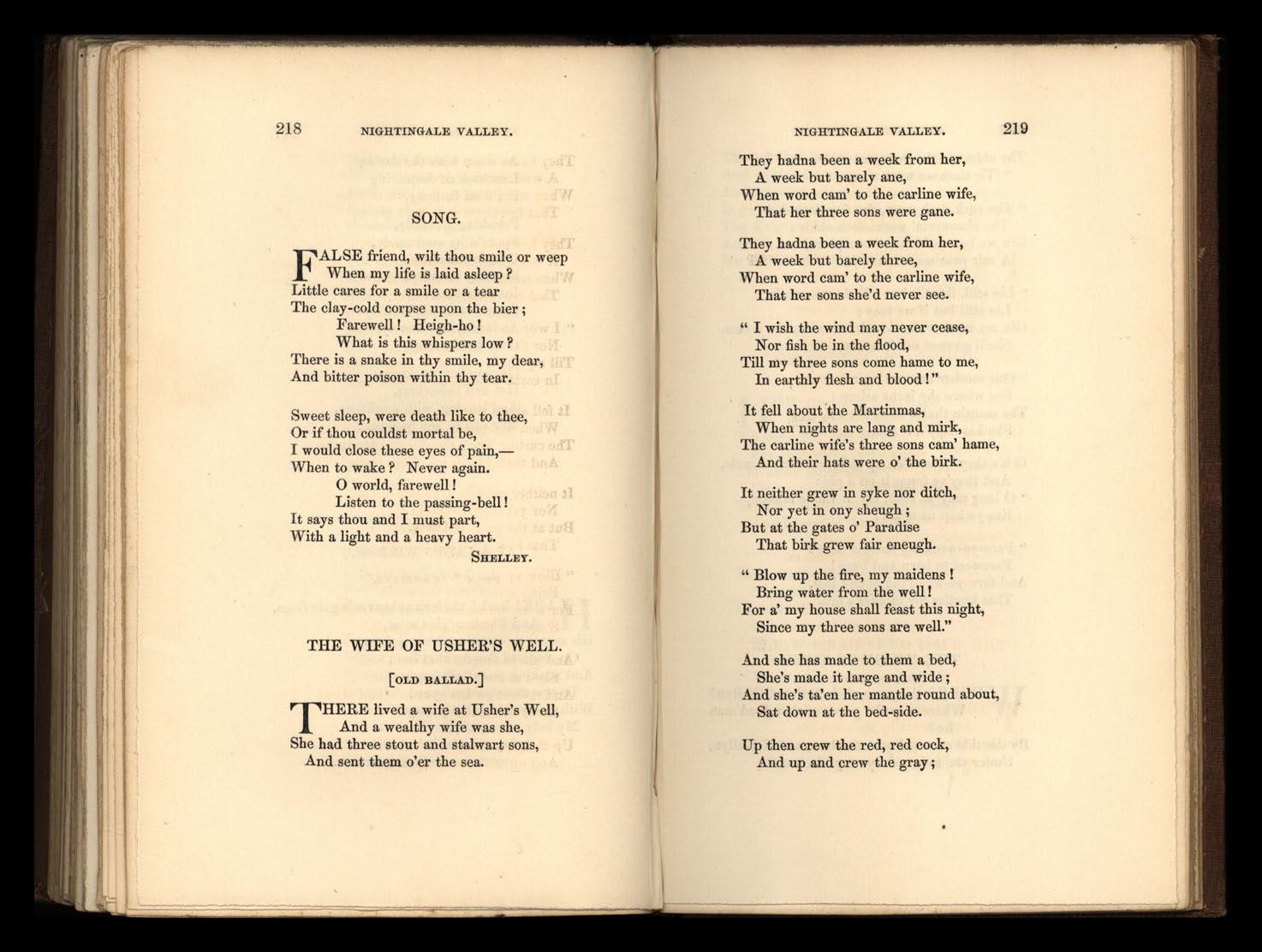
FALSE friend, wilt thou smile or weep
When my life is laid asleep?
Little cares for a smile or a tear
The clay-cold corpse upon the bier; Farewell! Heigh-ho!
What is this whispers low?
There is a snake in thy smile, my dear, And bitter poison within thy tear.
Sweet sleep, were death like to thee, Or if thou couldst mortal be, I would close these eyes of pain,When to wake? Never again. o world, farewell!
Li sten to the passing-bell !
It says thou and I must part, With a light and a heavy heart.
SHELLEY.
THE WIFE OF USHER'S WELL.
[OLD BALLAD.]
THERE lived a wife at Usher's Well, And a wealthy wife was she, She had three stout and stalwart sons, And sent them o'er the sea.
NIGHTINGALE VALLEY.
They hadna been a week from her, A week but barely ane, When word cam' to the carline wife, That her three sons were gane.
They hadna been a week from her, A week but barely three, 'Vhen word cam' to the carline wife, That her sons she'd never see.
" I wish the wind may never cease, Nor fish be in the flood, Till my three sons come hame to me, In earthly flesh and blood!"
It fell about 'the Martinmas, When nights are lang and mirk, The carline wife's three sons cam' ham e, And their hats were 0' the birk.
It neither grew in syke nor ditch, Nor yet in ony she ugh; But at the gates 0' Paradise That birk grew fair eneugh.
" Blow up the fire, my maidens I Bring water from the well !
For a' my house shall feast this night, Since my three sons are well."
And she has made to them a bed, She's made it large and wide; And she's ta'en her mantle round about, Sat down at the bed-side.
Up then crew the red, red cock, And up and crew the gray;
220
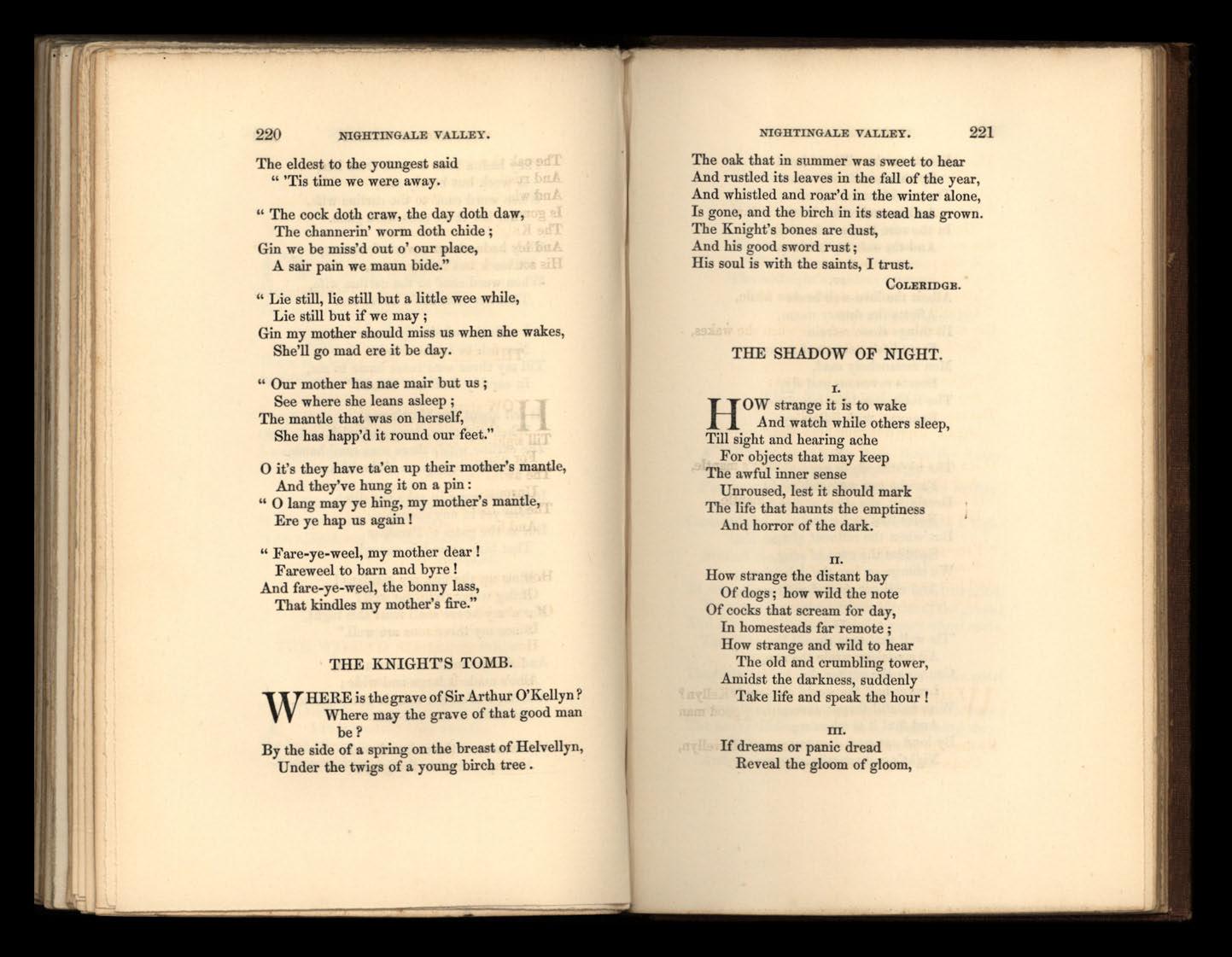
NIGHTINGALE VALLEY.
The eldest to the youngest said " 'Tis time we were away.
" The cock doth craw, the day doth daw, The channerin' worm doth chide; Gin we be miss'd out 0' our place, A sair pain we maun bide."
" Lie still, lie still but a little wee while, Lie still but if we may; Gin my mother should miss us when she wakes, She'll go mad ere it be day.
" Our mother has nae mair but us ; See where she leans asleep; The mantle that was on herself, She has happ'd it round our feet."
o it's they have ta'en up their mother's mantle, And they've hung it on a pin :
" 0 lang may ye hing, my mother's mantle, Ere ye hap us again !
" Fare-ye -weel, my mother dear! Fareweel to barn and byre! And fare-ye-wee1, the bonny lass, That kindles my mother's fire."
THE KNIGHT'S TOMB.
WHERE is the grave of Sir Arthur O'Kellyn? Where may the grave of that good man be?
By the side of a spring on the breast of Helvellyn, Under the twigs of a young birch tree.
NIGHTINGALE VALLEY. 221
The oak that in summer was sweet to hear And rustled its leaves in the fall of the year, And whistled and roar'd in the winter alone, Is gone, and the birch in its stead has grown. The Knight's bones are dust, And his good sword rust; His soul is with the saints, I trust.
(;QLERIDGB.
THE SHADOW OF NIGHT.
I.
How strange it is to wake
And watch while others sleep, Till sight and hearing ache For objects that may keep The awful inner sense U nroused, lest it should mark The life that haunts the emptine s And horror of the dark.
11.
How strange the distant bay Of dogs; how wild the note Of cocks that scream for day, In homesteads far remote; How strange and wild to hear The old and crumbling tower, Amidst the darkness, suddenly Take life and speak the hour !
Ill.
If dreams or panic dread Reveal the gloom of gloom,
222

NIGHTn'GALE VALLEY.
Kiss thou the pillow'd head By thine, and soft resume
The confident embrace, And so each other keep In the sure lca.,uue of amity, And the safe lap of sleep.
IV.
Albeit the love- ick brain Affects the dreary moon, ill things alone refrain
From life's nocturnal swoon: Men melancholy mad, Beasts ravenous and sly, The robber and the murderer, Remorse, with lidless eye.
v.
The nightingale is gay, For she can vanqui h night; Dreaming, she sings of day, Notes that make darkness bright : But when the relluent gloom Saddens the gaps of song, We charge on her the dolefulne , And call her crazed with wrong.
VI.
'Tis well that men should lie All senseless, while the sun, Coursing the nether sky, Leaves half the world o'er -run With baleful shapes unseen; And foul it is when we By loud carousal desecrate Night's evil sanctity.
NIGHTINGALE VALLEY.
VII.
'Twere good that all should pray, And so lie down to rest, While yet the wholesome day Is lingering in the West. His prayer shall turn to peace, Who still regards with awe
The midnight's noxious mystery, And nature's genial law .
CoVENTRY
PATlIIORE THE FAIRY THORN.
AN ULSTER BALLAD.
up, our Anna dear, from the weary spinning wheel; For your father's on the hill, and your mother is asleep:
Come up above the crags, and wc'll dance a highland reel
Around the fairy thorn on the steep."
At Anna Grace's door 'twas thus the maidens cried, Three merry maidens fair in kirtles of the green; And Ann a laid the rock and the weary wheel aside, The fairest of the four, I ween.
They're glancing through the glimmer of the quiet eve,
Away in milky wavings of neck and ankle bare; The heavy-sliding stream in it sleepy song they leave,
And the crags in the ghostly air:
224

NIGHTINGALE VALLEY.
And linking hand and hand, and singing as they go ,
The maids along the hill-side hav e ta'en their fearless way,
Till they come to where the rowan trees in lon ely beauty grow
Beside the Fairy Hawthorn grey.
The hawthorn stands between the ashes tall and slim,
Like matron with h er twin grand-daughters at her knee;
The rowan berries clu ster o'er h er low h ead grey and dim
In ruddy kisses sweet to see.
The merry maidens four have r anged them in a row,
Between each lov ely couple a stately rowan stem, And away in mazes wavy, like skimming birds they go,
Oh, never caroll'd bird like them!
But solemn is the silen ce of t he silvery haze
That drinks away their voices in echo less repose, And dreamily the evening has still'd the haunted braes,
And dreamier the glo aming grows.
And sinking one by one, like lark-no tes from the sky
When the falcon's shadow saileth acro ss the open shaw,
Are hu sh'd the maiden's voices, as cowering down they lie
In the flutter of their sudden awe.
For, from the air above, and the grassy ground beneath,
NIGHTINGALE VALLEY. 225
And from the mountain-ashes and the old Whitethorn between,
A power of faint enchantment doth through their beings breathe,
And they sink down together on the green.
They sink together silent, and stealing side to side,
They fling their lovely arms o'er their drooping necks so fair,
Then vainly strive again their naked arms to hide, For their shrinking necks again are bare.
Thus clasp'd and prostrate all, with their he ads together bow'd,
Soft o'er their bosom's beating-lhe only human sound-
They hear the silky footsteps of the silent fairy crowd,
Like a river in the air, gliding round.
Nor scream can any raise, nor prayer can any say, But wild, wild, the terror of the speechless three-
For they feel fair Anna Grace drawn silently away,
By whom they dare not look to see.
They fe el their tresses twin e with her parting locks of gold,
And the curls elastic falling, as her head withdraws;
They feel her sliding arms from their tranced arms unfold,
But they dare not look to see the cause:
For h eavy on their se nses the faint enchantment lies
Through all that night of anguish and perilous amaze; Q
226 NIGHTINGALE VALLEY.
And neither fear nor wonder can ope their quivering eyes
Or their limbs from the cold ground raise.
Till out of Night the Earth has roll'd her dewy side, With every haunted mountain and streamy vale below;
When, as the mist dissolves in the yellow morningtide, The maidens' trance dissolveth so.
Then fly the ghastly three as swiftly as they may, And tell their tale of sorrow to anxious friends in vain-
They pined away and died within the year and day, And ne'er was Anna Grace seen again. SAMUEL FERGUSON.
THE HOUSE.
THERE is no architect can build As the Muse can; She is skilful to select Materials for her plan;
Rafters warily to choose Of immortal pine, Or cedar incorruptible, Worthy her design.
She threads dark Alpine forests, Or valleys by the sea, In many lands, with painful steps, Ere she can find a tree.
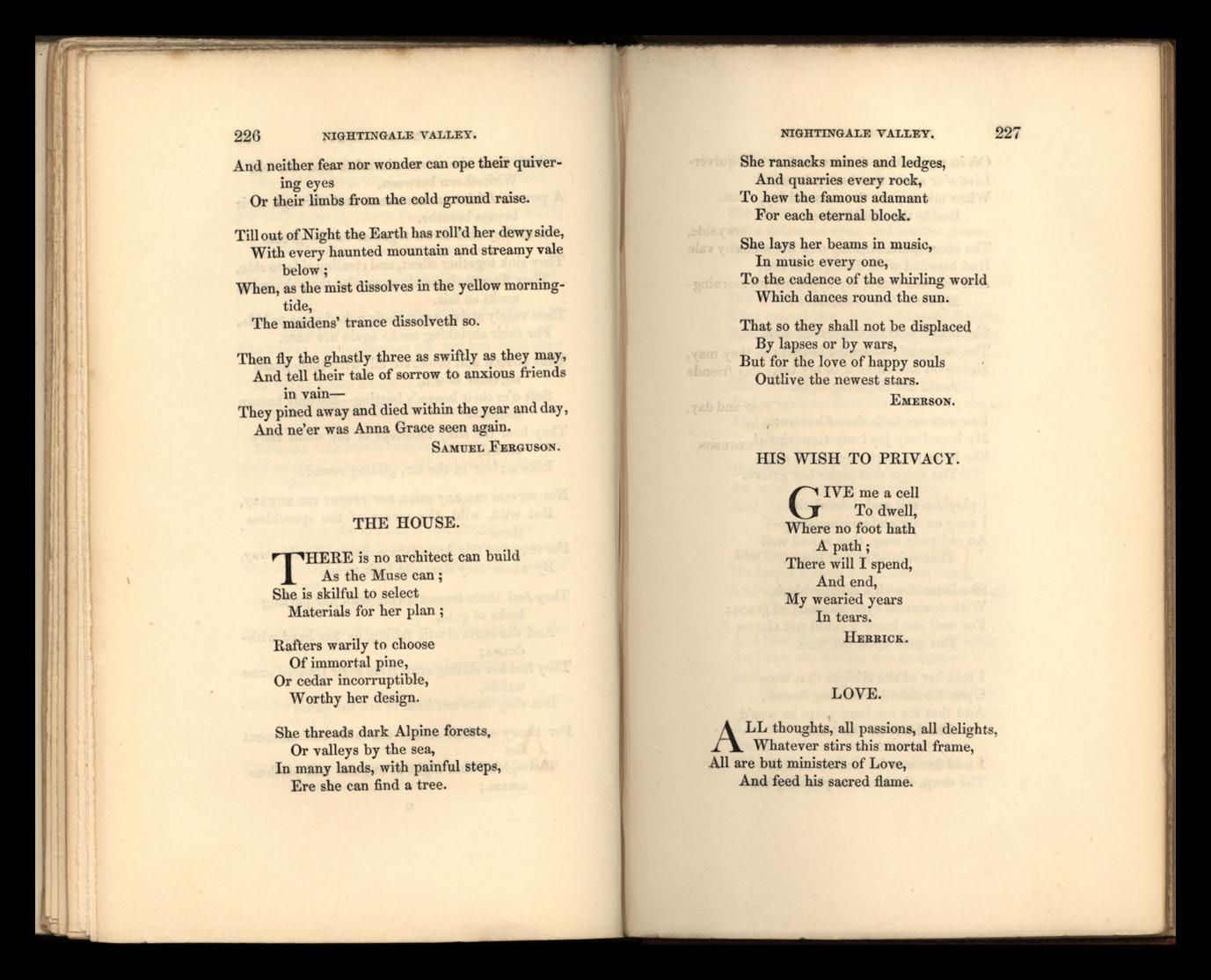
NIGHTINGALE VALLEY.
She ransacks mines and ledges, And quarries every rock, To hew the famous adamant For each eternal block.
She lays her beams in music, In music everyone, To the cadence of the whirling world Which dances round the sun.
That so they shall not be displaced By lapses or by wars, But for the love of happy souls Outlive the newest stars. EMERSON.
HIS WISH TO PRIVACY.
GIVE me a cell
To dwell, Where no foot hath A path; There will I spend, And end, My wearied years In tears. HERRICK.
LOVE. 227
ALL thoughts, all passions, all delights, Whatever stirs this mortal frame, All are but ministers of Love, And feed his sacred flame.
228

NIGHTINGALE VALLEY.
Oft in my waking dreams do I Live o'er again that happy hour, When midway on the mount I lay, Beside the ruin'd tower.
The moonshine, stealing o'er the scene Had blended with the light of eve j And she was there, my hope, my joy, My own dear Genevieve!
She lean'd against the armed man, The statue of the armed knight j She stood and listen'd to my lay, Amid the lingering light.
Few sorrows hath she of her own, My hope! my joy! my Genevieve! She loves me best whene'er I sing The songs that make her grieve.
I play'd a soft and doleful air, I sang an old and moving storyAn old rude song, that suited well That ruin wild and hoary.
She listen'd with a flitting blush, With downcast eyes and modest grace j For well she knew I could not choose But gaze upon her face.
I told her of the Knight that wore Upon his shield a burning brand j And that for ten long years he woo'd The Lady of the Land.
I told her how he pined: and ah ! The deep, the low, the pleading tone
NIGHTINGALE VALLEY.
With which I sang another's love, Interpreted my own.
She listen'd with a flitting blush, With downcast eyes, and modest grace j And she forgave me, that I gazed Too fondly on her face!
But when I told the cruel scorn
That crazed that bold and lovely Knight, And that he cross'd the mountain-woods, Nor rested day nor night j
That sometimes from the savacre den And sometimes from the dark;ome shade, And sometimes starting up at once In green and sunny glade,-
There came and look'd him in the An angel beautiful and bright j And that he knew it was a Fiend, This miserable Knight!
And that unknowing what he did, He leap'd among a murderous band, And saved from outrage worse than death The Lady of the Landj-
And how she wept, and clasp'd his knees j
And how she tended him in vainAnd ever strove to expiate
The scorn that crazed his brain j-
And that she nursed him in a cave j And how his madness went away, When on the yellow forest-leaves
A dying man he lay j-
2:30 .NIGHTINGALE VALLEY.
His dying words-but when I reach'd That tenderest straiu of all the ditty, My faltering voice and pausing harp Disturbed her soul with pity!
All impulses of soul and sense Had thrill'u my guileless Genevieve; The mu sic and the doleful tale, The rich and balmy eve;
And hopes, and fears that kindle hope, An undistinguishable throng, And gentle wishes long subdued, Subdued and cherish'd long!
She wept with pity and delight, She blush'd with love, and virgin shame; And like th e murmur of a dream, I heard h er breathe my name.
Her bosom heaved-she stepp'd aside, As conscious of my look she steptThen suddenly, with timorous eye She fled to me and wept.
She half inclosed me with her arms, She press'd me with a meek embrace; And bending back her head look'd up, And gazed upon my face.
'Twas partly love, and partly fear, And partly 'twas a bashful art, That I might rather feel, than see The swelling of her heart.
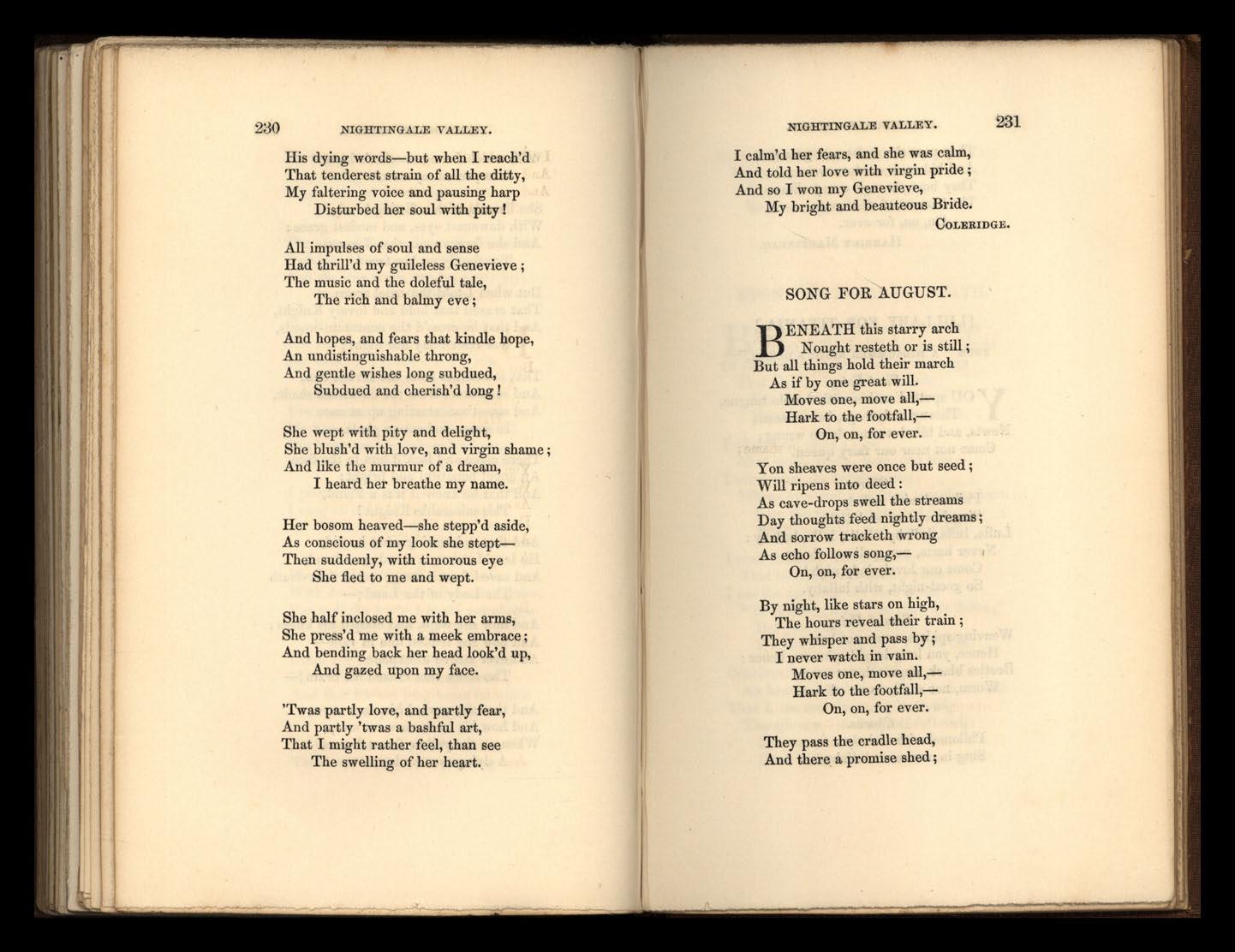
NIGHTINGALE VALLEY.
I calm'd her fears, and she was calm, And told her love with virgin pride; And so I won my Genevieve, My bright and beauteous Bride.
231 COLERIDGE.
SONG FOR AUGUST.
BENEATH this starry arch Nought resteth or is still ; But all things hold their march
As if by one great will.
Moves one, move all,Hark to the footfall,On, on, for ever.
Yon sheaves were once but seed; Will ripens into deed: As cave-drops swell the streams Day thoughts feed nightly dreams; And sorrow tracketh wrong As echo follows song,On, on, for ever.
By night, like stars on high, The hours reveal their train; They whisper and pass by; I never watch in vain.
Moves one, move all,Hark to the footfall,On, on, for ever.
They pass the cradle head, And there a promise shed;
232
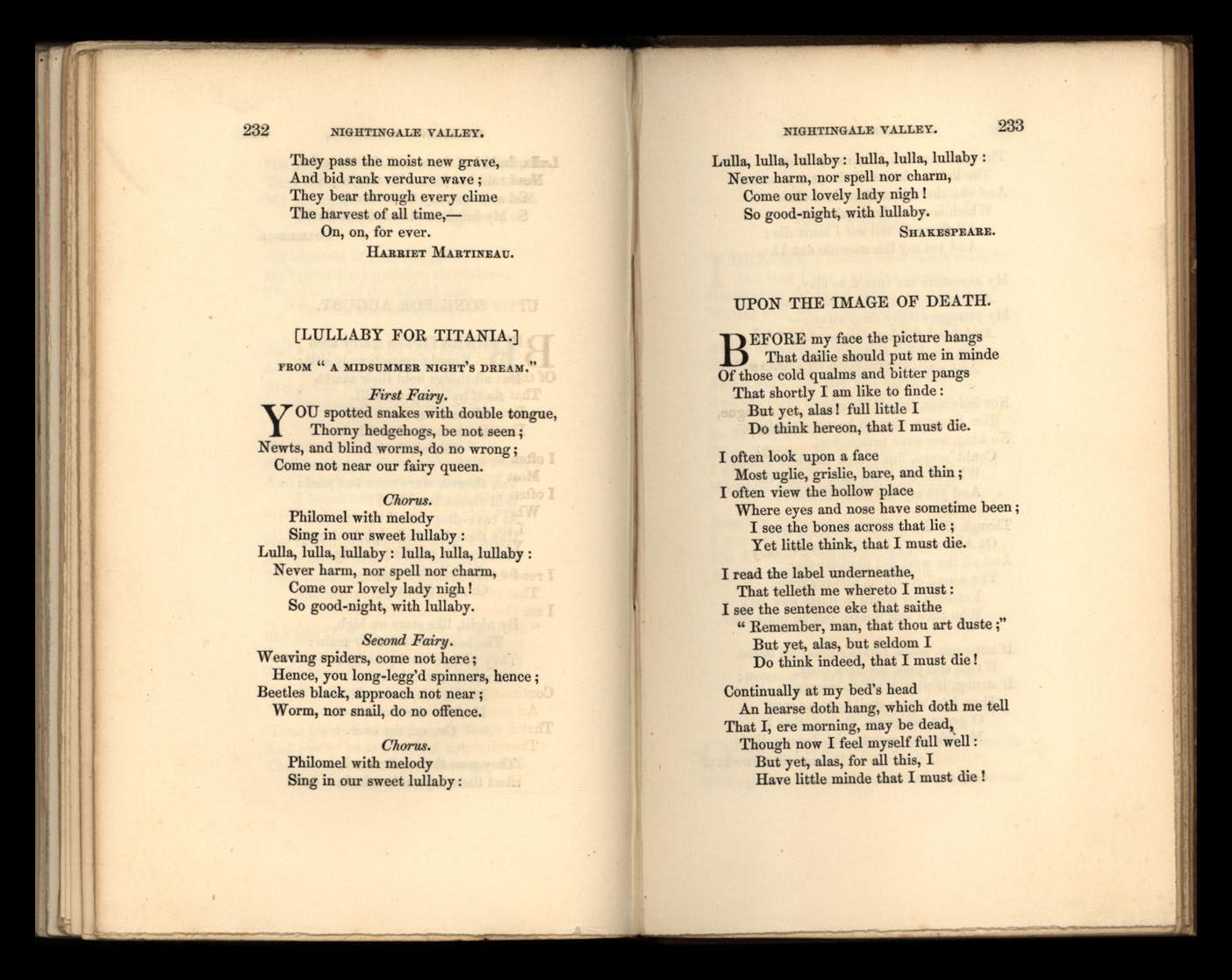
NIGHTINGALE VALLEY.
They pass the moist new grave, And bid rank verdure wave
They bear through every clime
The harvest of all time,On, on, for ever.
lIARRIET MARTINEAU.
FROM" A MIDSUMMER NIGHT'S DREAM."
First Fairy.
spotted snakes with double tongue, Thorny hedgehogs, be not seen; Newts, and blind worms, do no wrong; Come not near our fairy queen.
Chorus.
Philomel with melody
Sing in our sweet lullaby :
Lulla, lulla, lullaby: lulla, lulla, lullaby: Never harm, nor spell nor charm, Come our lovely lady nigh!
So good-night, with lullaby.
Second Fairy.
Weaving spiders, come not here; Hence, you long-Iegg'd spinners, hence; Beetles black, approach not near ; Worm, nor snail, do no offence.
Chorus.
Philomel with melody
Sing in our sweet lullaby:
NIGHTINGALE VALLEY.
Lulla, lull a, lullaby: lulla, lulla, lullaby: Never harm, nor spell nor charm,
Come our lovely lady nigh!
So good-night, with lullaby. SHAKESPEARE.
UPON THE IMAGE OF DEATH.
BEFORE my face the picture hangs
That dailie should put me in minde
Of those cold qualms and bitter pangs
That shortly I am like to finde :
But yet, alas! full little I
Do think hereon, that I must die.
I often look upon a face
Most uglie, grislie, bare, and thin I often view the hollow place
Where eyes and nose have sometime been; I sce the bones across that lie j
Yet little think, that I must die.
I read the label underneathe,
That telleth me whereto I must:
I see the sentence eke that saithe " Remember, man, that thou art duste j"
But yet, alas, but seldom I Do think indeed, that I must die!
Continually at my bed's head
An hearse doth hang, which doth me tell
That I, ere morning, may be dead...
Though now I feel myself full well:
But yet, alas, for all this, I Have little minde that I must die !
234-
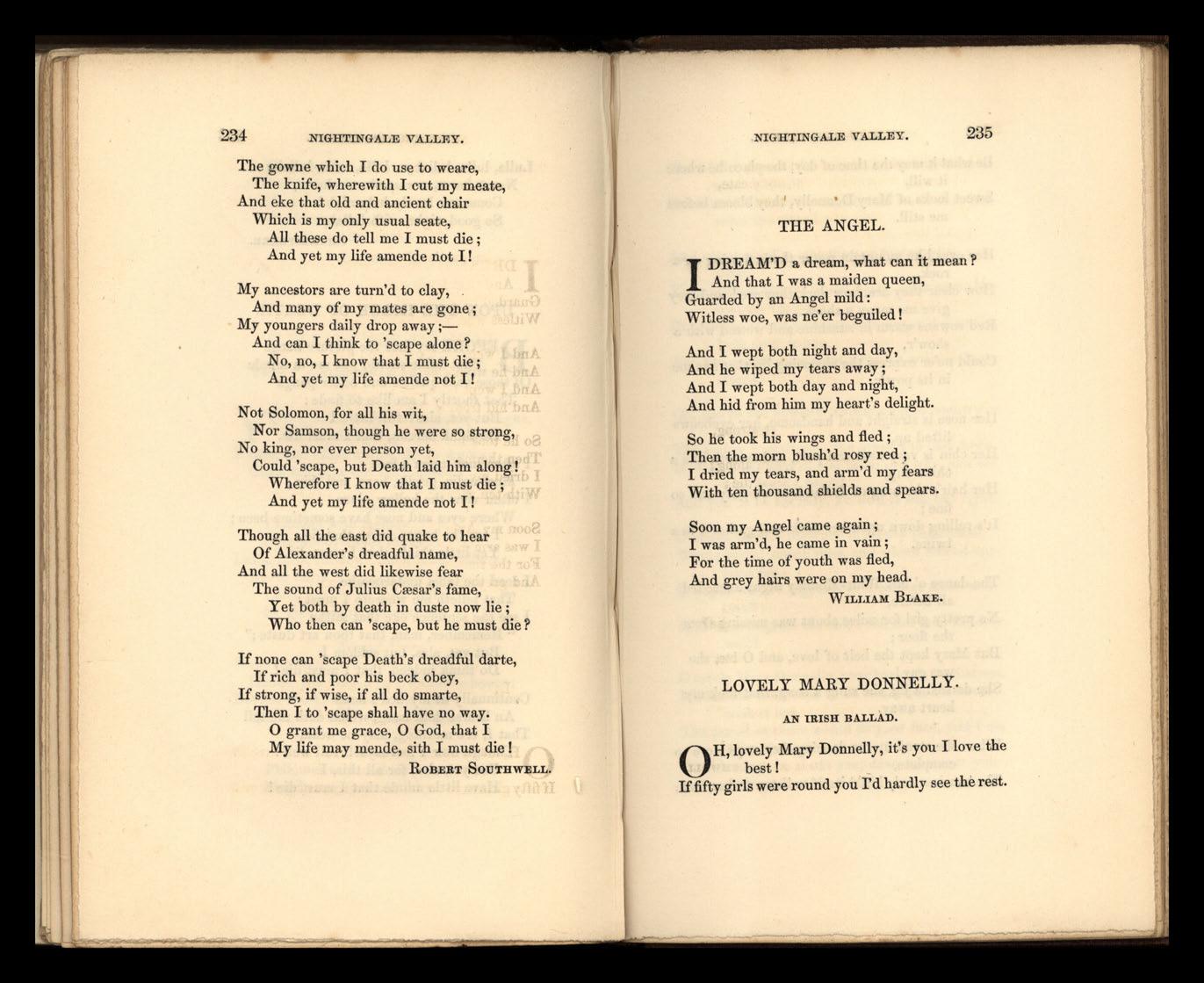
NIGHTINGALE VALLEY.
The gowne which I do use to weare, The knife, wherewith I cut my meate, And eke that old and ancient chair
Which is my only usual seate, All these do tell me I must die ; And yet my life amende not I!
My ancestors are turn'd to clay, And many of my mates are gone; My youngers daily drop away;And can I think to 'scape alone?
No, no, I know that I must die; And yet my life amende not I!
Not Solomon, for all his wit,
Nor Samson, though he were so strong, No king, nor ever person yet, Could 'scape, but Death laid him along! Wherefore I know that I must die; And yet my life amende not I!
Though all the east did quake to hear
Of Alexander's dreadful name, And all the west did likewise fear
The sound of Julius Cresar's fame, Yet both by death in duste now lie ; Who then can 'scape, but he must die?
If none can 'scape Death's dreadful darte, If rich and poor his beck obey, If strong, if wise, if all do smarte, Then I to 'scape shall have no way. o grant me grace, 0 God, that I My life may mende, sith I must die!
ROBERT SOUTH WELL
NIGHTINGALE VALLEY. 235 THE ANGEL.
IDREAM'D a dream, what can it mean?
And that I was a maiden queen, Guarded by an Angel mild: Witless woe, was ne'er beguiled!
And I wept both night and day, And he wiped my tears away; And I wept both day and night, And hid from him my heart's delight.
So he took his wings and fled; Then the morn blush'd rosy red 3 I dried my tears, and arm'd my fears With ten thousand shields and spears.
Soon my Angel came I was arm'd, he came III vam; For the time of youth was fled, And grey hairs were on my head.
WILI,IAM BLAKE.
OLOVELY MARY D ONNELLY. AN IRISH BALLAD.
H, l ovely Mary Donnelly, it's you I love the best!
If fifty girls were round you I'd hardly see the rest.
NIGHTINGALE VALLEY.
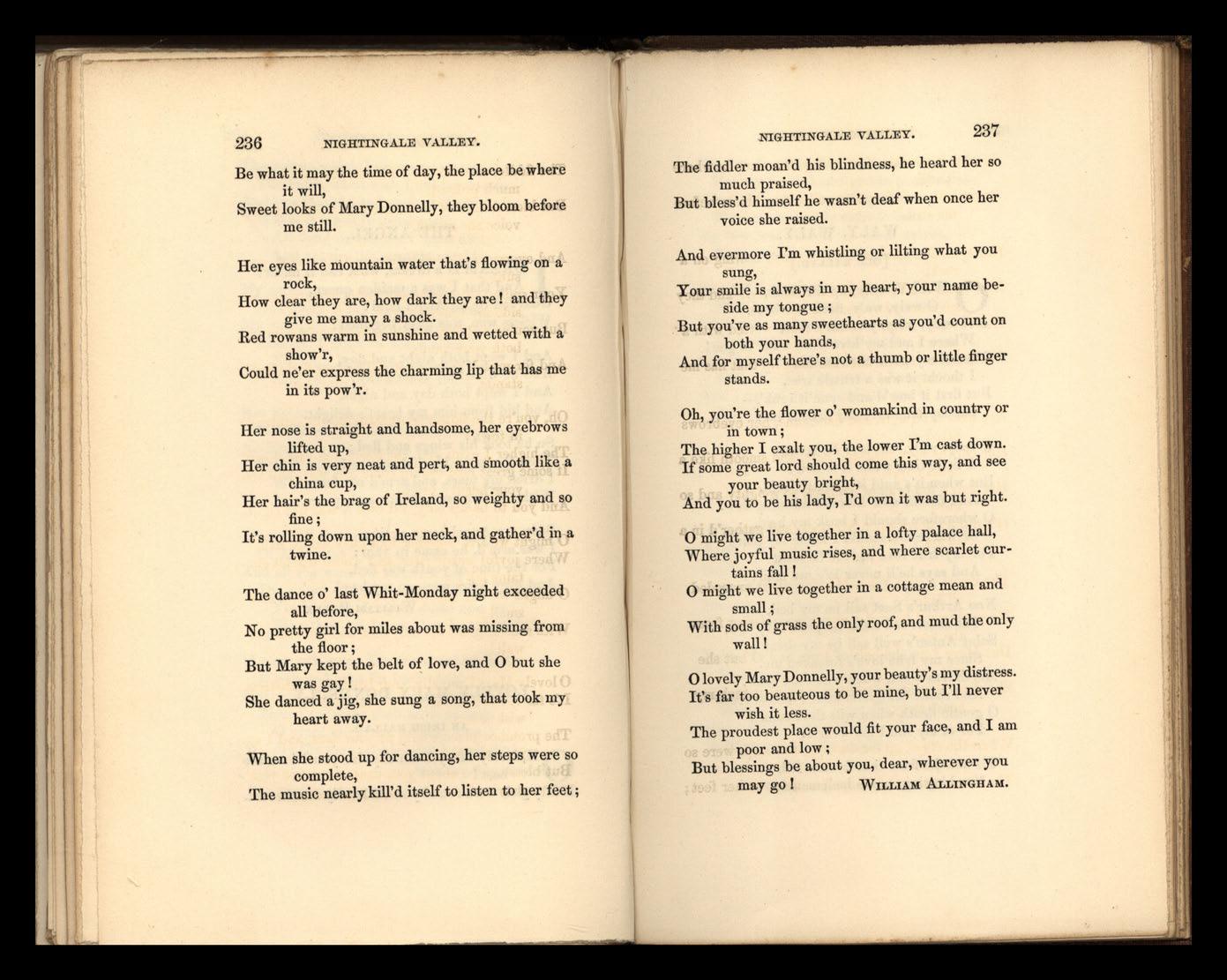
236
NIGHTINGALE VALLEY.
Be what it may the time of day, the place be where it will,
Sweet looks of Mary Donnelly, they bloom before me still.
Her eyes like mountain water that's flowing on a rock, How clear they are, how dark they are! and they give me many a shock.
Red rowans warm in sunshine and wetted with a show'r,
Could ne'er express the charming lip that has me in its pow'r.
Her nose is straight and handsome, her eyebrows lifted up,
Her chin is very neat and pert, and smooth like a china cup,
Her hair's the brag of Ireland, so weighty and so fine;
It's rolling down upon her neck, and gather'd in a twine.
The dance 0' last Whit-Monday night exceeded all before,
No pretty girl for miles about was missing from the floor;
But Mary kept the belt of love, and 0 but she was gay!
She danced a jig, she sung a song, that took my heart away.
When she stood up for dancing, her steps were so complete,
The music nearly kill'd itself to listen to her feet;
237
The fiddler moan'd his blindness, he heard her so much praised,
But bless'd himself he wasn't deaf when once her voice she raised.
And evermore I'm whistling or lilting what you sung,
Your smile is always in my heart, your name beside my tongue;
But you've as many sweethearts as you'd count on both your hands,
And for myself there's not a thumb or little finger stands.
Oh, you're the flower 0' womankind in country or in town;
The higher I exalt you, the lower I'm cast down.
If some great lord should come this way, and see your beauty bright,
And you to be his lady, I'd own it was but right.
o might we live together in a lofty palace hall, Where joyful music rises, and where scarlet curtains fall!
o might we live together in a cottage mean and small ;
With sods of grass the only roof, and mud the only wall !
o lovely Mary Donnelly, your beauty's my distress.
It's far too beauteous to be mine, but I'll never wish it less.
The proudest place would fit your face, and I am poor and low;
But blessings be about you, dear, wherever you may go ! WILLUM ALLINGBAM.
238 "N"IGHTINGALE VALLEY.
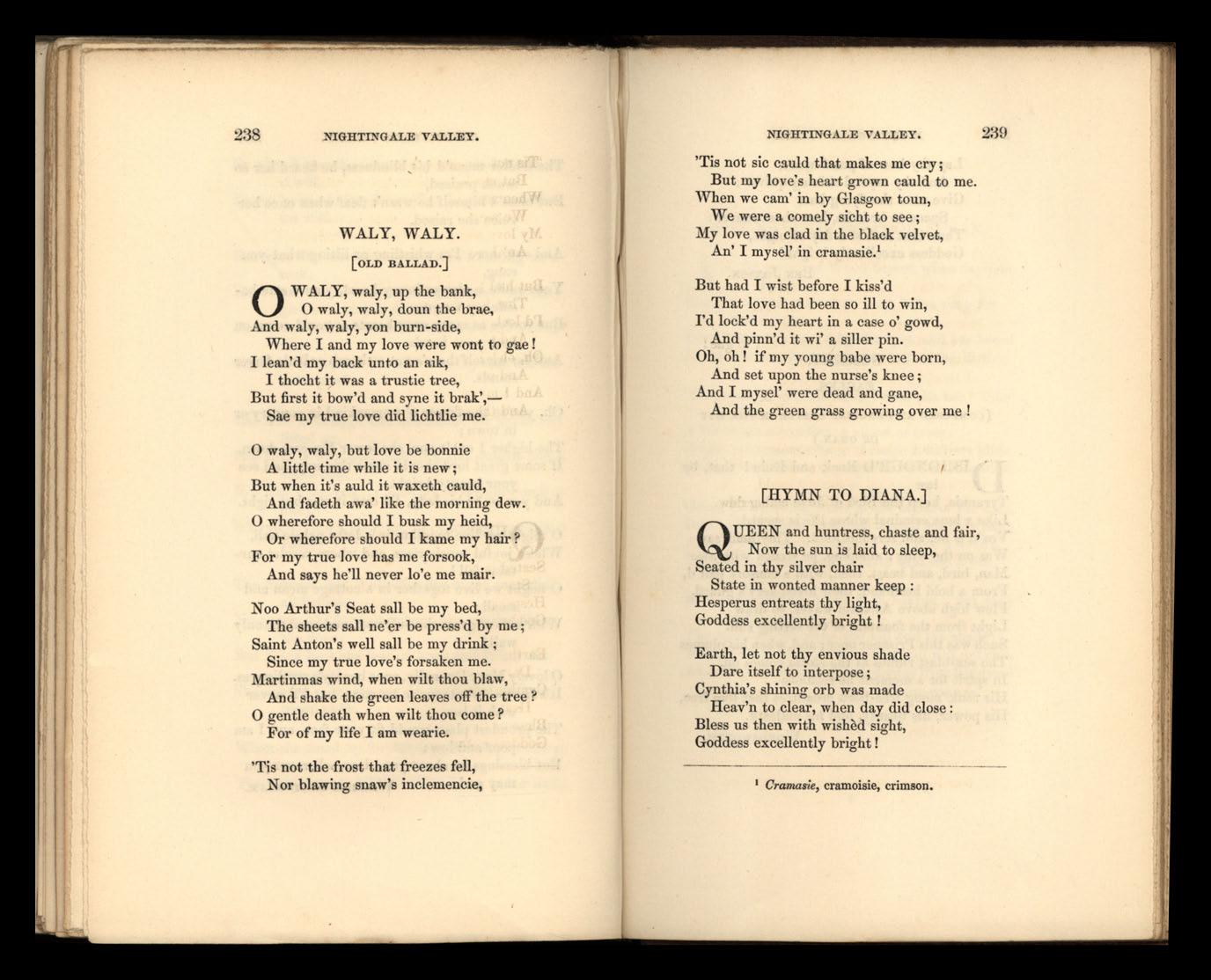
WALY, WALY .
[OLD BALLAD.]
OWALY, waly, Up the bank,
o waly, waly, doun the brae, And waly, waly, yon burn-side,
Where I and my love were wont to gae I
I lean'd my back unt.o an aik,
I thocht it was a trustie tree,
But first it bow'd and syne it brak',-
Sae my true love did lichtlie me.
o wal y, waly, but love be bonnie
A little time while it is new;
But when it's auld it waxeth cauld,
And fadeth awa' like the morning dew.
o wherefore should I busk my heid,
Or wherefore should I kame my hair?
For my true love has me forsook, And says he'll never lo'e me mair.
Noo Arthur's Seat sail be my bed,
The sheets sall ne'er be press'd by me;
Saint Anton's well sail be my drink ;
Since my true love's forsaken me.
Martinmas wind, when wilt thou blaw, And shake the green leaves off the tree?
o gentle death when wilt thou come?
For of my life I am wearie
'Tis not the frost that freezes fell, Nor blawing snaw's inclemencie,
NIGHTINGALE "'ALLEY.
'Tis not sic cauld that makes me cry; But my love's heart grown cauld to me.
When we cam' in by Glasgow toun, We were a comely sicht to see; My love was clad in the black velvet, An' I myse!' in cramasie. 1
But had I wist before I kiss'd
That love had been so ill to win, I'd lock'd my heart in a case 0' gowd, And pinn'd it wi' a siller pin .
Oh, oh! if my young babe were born, And set upon the nurse's knee; And I myse!' were dead and gane,
And the green grass growing over me !
[HYMN TO DIANA.]
QUEEN and huntress, chaste and fair,
Now the sun is laid to sleep, Seated in thy silver chair
State in wonted manner keep: Hesperus entreats thy light, Goddess excellently bright!
Earth, let not thy envious shade
Dare itself to interpose; Cynthia's shining orb was made
Heav'n to clear, when day did close: Bless us then with wished si!Yht Goddess excellently bright!" ,
1 Cramam, cramoisie, crimson.
NIGHTINGALE VALLEY. 241

240
NIGHTINGALE VALLEY.
Lay thy bow of apart, . And thy crystal shrnmg qwver ;
Give unto the flying hart
Space to breathe, how short soever; Thou that mak'st a day of night, Goddess excellently bright!
BEN JONSON.
(COMPOSED AT DUNOLLIE CASTLE IN THE BAY OF OBAN.)
DISHONOUR'D Rock and Ruin! that, by law
Tyrannic, keep the Bird of J embarr'd
Like a lone criminal whose life IS spared.
Vex'd is he, and screams loud. The last. I saw Was on the wing; stooping, he struck wlt.h
Man bird and beast, then, with a consort parr , , , , d
From a bold headland, their loved aery s guar , Flew high above Atlantic waves, to draw
Light from the fountain of the setting
Such was this Prisoner once; and, when hiS plumes
The sea-blast ruffles as the storm comes on, In spirit for a moment he resumes
His rank 'mong free- born creatures that live free, His power, his beauty, and his majesty.
W ORDSWORTH.
ATHE REVERIE OF POOR SUS AN.
T the corner of W' ood Street, when daylight appears,
Hangs a thrush that sings loud, it has sung for three years:
Poor Susan has pass'd by the spot, and has heard
In the silence of morning the song of the Bird.
'Tis a note of enchantment; what ails her? Sbe sees
A mountain ascending, a vision of trees; Bright volumes of vapour through Lothbury glide, And a river flows on through the vale of Cheap side.
Green pastures she views in the midst of the dale, Down which she so often has tripp'd with her pail; And a single small cottage, a nest like a dove's,
The one only dwelling on earth that she loves.
She looks, and her heart is in heaven: but they fade,
The mist and the river, the hill and the shade:
The stream will not flow, and the bill will not rise,
And the colours have all pass'd away from her eyes!
'" OllDSWORTH.
NIGHTINGALE VALLEY.

THE PAINS OF SLEEP.
ERE on my bed my limbs I lay, It hath not been my use to pray
With moving lips or bended knees;
But silently by slow degrees,
My spirit I to Love compose,
In humble trust mine eye-lids close, With reverential resignation,
No wish conceived, no thought exprest,
Only a sense of supplication;
A sense o'er all my soul imprest-
That I am weak, yet not unblest, Since in me, round me, everywhere Eternal strength and wisdom are .
But yester-night I pray'd aloud
In anguish and in agony,
Up-starting from the fiendish crowd
Of shapes and thoughts that tortured me :
A lurid light, a trampling throng,
Sen8e of intolerable wrong,
And whom I scorn'd, those only strong!
Thirst of revenge, the powerless will Still balled, and yet burning still !
Desire with lo athing strangely mix'd
On wild or hateful objects fix'd: Fantastic passions! maddening brawl!
And shame and terror over all!
Deeds to be hid which were not hid, Which all confused I could not know,
Whether I suffer'd, or I did:
NIGHTINGALE VALLEY.
For all seem'd gui lt, remorse or woe,
My own or others', still the same
Life-stifling fear, soul-stifling shame. 243
So two nights pass'd: the night's dismay
Sadden'd and stunn'd the coming day.
Sleep, the wide blessing, seem'd to me
Distemper's worst calamity.
The third night, when my own loud scream
Had waked me from the fiendish dream
O'ercome with sufferings strancye and wild
I wept as I had been a child; 0
And having thus by tears subdued
My anguish to a milder mood,
Such punishments, I said, were due
To natures deepliest stain'd with sin,-
For aye entempest ing anew
The unfathomable hell within,
The horror of their deeds to view,
To know and loathe, yet wish and do !
Such griefs with some men well agree,
But wherefore, wherefore fall- on me?
To be beloved is all I need,
And whom I lov e, I love indeed.
COLERIDGE.
BIRD of the wilderness,
Blithesome and cumberless, Sweet be thy matin o'er moorland and lea!
Emblem of happiness,
Blest is thy dwelling-placeo to abide in the desert with thce !
Donegal County Library Service
NIGHTINGALE VALLEY.
Wild is thy lay and loud, Far in the downy cloud, Love gives it energy, love gave it birth. Where, on thy dewy wing, Where art thou journeying?
'thy lay is in heaven, thy love is on earth.
O'er fell and fountain sheen, O'er moor and mountain green, O'er the red streamer that heralds the day, Over the cloudlet dim, Over the rainbow's rim, Musical cherub, soar singing away!
when the gloaming comes, Low in the heather-blooms
Sweet will thy welcome and bed of love be ! Emblem of happiness, Blest is thy dwelling-placeo to abide in the desert with thee!
JAJIIES HOGG.
EDW ARD, EDW ARD.
[OLD BALLAD.]
" WHY does your brand sae drap wi' blude, Edward, Edward?
W'hy does your brand sae drap wi' blude, And why sae sad gang ye, O?"
" 0, I hae kill'd my hawk sae gude, Mither, mither :
0, I hae kill'd my hawk sae gllde : And I hae nae mail' but he, 0."

NIGHTINGALE VALLEY.
" Your hawk's blude was never sae red, Edwanl, Edward :
Your hawk's blude was never sae red, My dear son, I tell thee, 0."
" 0, I hae kill'd my red-roan steed, Mither, mither: 0, I hae kill'd my red-roan steed, That carried me fair and free, 0."
" 'Gin your steed be gane, ye hae plenty mail', Edward, Edward, 'Gin your steed be gane, ye hae plenty mail'; Some ither dule ye dree, 0."
" 0, I hae kill'd my father dear, Mither, mither : 0, I hae kill'd my father dear, Alas! and wae is me, 0."
" And whatten penance will ye dree for that, Edward, Edward ?
And whatten penance will ye dree for that?
My dear son, now tell me, 0."
" I'll set my feet in yonder boat, Mither, mither: I'll set my feet in yonder boat, And I'll fare over the sea, 0."
" And what will ye do wi' your towers and your ha', Edward, Edward ?
And what will ye do wi' your towers and your ha', That were sae fair to see, O?"
" I'll let them stand till they doun fa', Mither, mither : I'll let them stand till they doun fa' ; For here never mail' maun I be, 0."
246

NIGHTINGALE VALLEY.
" And what will ye leave to your bairns and your wife, Edward, Edward ?
And what will ye leave to your bairns and your wife, When you gang over the sea, 0 ?"
" The warld's room: l et them beg through life, Mither, mither:
Tbe warld's room: let them beg through life; For them never mair will I see, 0."
" And what will ye leave to your ain mither dear, Edward, Edward ?
And what ye leave to your ain mitber dear?
My dear son, now tell me, 0."
" The curse of hell frae me shall ye bear, Mither, mither!
The curse of hell frae me shall ye bear, Sic counsels ye gave to me, 0 ! "
PERCY'S Reliques.
NO, no! go not to Lethe, twist ' W olf's- bane, tight-rooted, for its poisonous wine;
Nor suffer thy pale forehead to be kiss'd By night-shade, ruby grape of Proserpine ; Make not your rosary of yew -berries,
Nor let the beetle, nor the death-moth b e
Your mournful Psyche, nor the downy owl
A partner in your sorrow's mysteries; For shade to shade will come too drowsily, And drown the wakeful anguish of the soul.
247
NIGHTINGALE VALLEY.
But. when the melancholy fit shall fall
Sudden from heaven like a weeping cloud, That fost,ers the droop-h eaded flowers all, And hides the green hill in an April shroud; Then glut thy sorrow Oil a morning rose, Or on the rainbow of the salt sand-wave, Or on the wealth of gl obed peonies; Or if thy mistress some rich anger shows, Emprison her soft hand, and let her rave, And feed deep, deep upon her peerless eyes.
She dwells with Beauty-Beauty that must die; And Joy, whose hand is ever at his lips
Bidding adieu; and aching Pleasure nigh, Turning to poison while the bee-mouth sips:
Ay, in the very temple of Delight Veil'd Melancholy has her sovran shrine, Though seen of none save him whose strenuous tongue
Can burst Joy's grape against his palate fine; Hi s soul shall taste the sadness of her might, And be among her cloudy trophies hung. KEATS.
THE TROSACHS.
THERE'S not a nook within this solemn Pass
But were an apt confessional for One Taught by his summer spent, h.is autumn gone, That Life is but a tale of mornmg grass
Wither'd at eve :From scenes of art which chase
That thought away, turn, and with watchful eyes
248
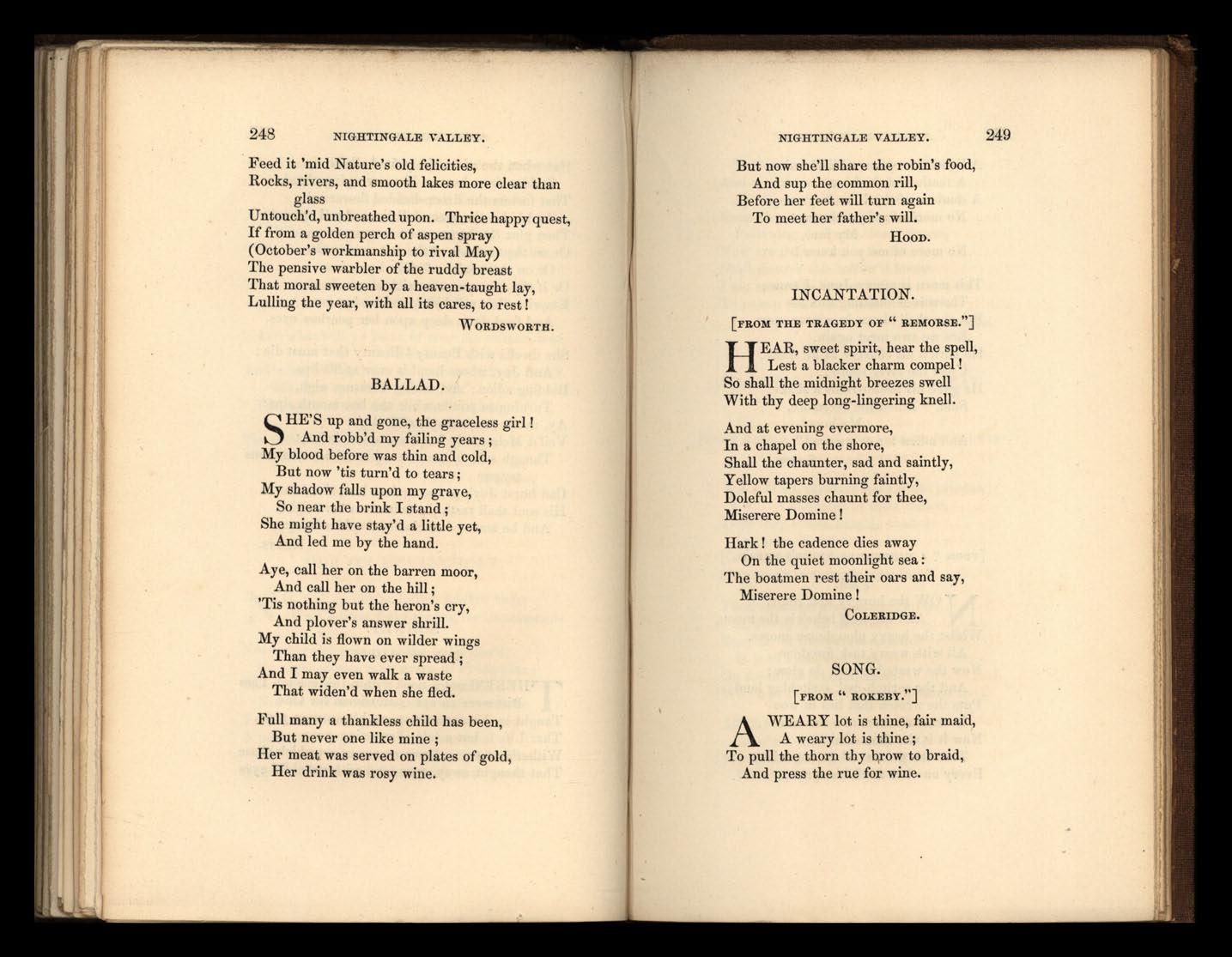
NIGHTINGALE VALLEY.
Feed it 'mid Nature's old felicities, Rocks, rivers, and smooth lakes more clear than glass
Untouch'd, unbreathed upon. Thrice happy quest, If from a golden perch of aspen spray (October's workmanship to rival May) The pensive warbler of the ruddy breast
That moral sweeten by a heaven-taught lay, Lulling the year, with all its cares, to rest!
WORDSWORTH.
SHE'S up and gone, the graceless girl! And robb'd my failing years;
My blood before was thin and cold,
But now 'tis turn'd to tears;
My shadow falls upon my grave, So near the brink I stand; She might have stay'd a little yet, And led me by the hand.
Aye, call her on the barren moor, And call her on the hill ; 'Tis nothing but the heron's cry, And plover's answer shrill.
My child is flown on wilder wings Than they have ever spread; And I may even walk a waste
That widen'd when she fled.
Full many a thankless child has been, But never one like mine;
Her meat was served on plates of gold, Her drink was rosy wine.
NIGHTINGALE VALLEY.
But now she'll share the robin's food, And sup the common rill, Before her feet will turn again
To meet her father's will. HOOD. INCANTATION.
[FROM THE TRAGEDY OF " REMORSE."]
HEAR, sweet spirit, hear the spell, Lest a blacker charm compel!
So shall the midnight breezes swell
With thy deep long-lingering knell.
And at evening evermore, In a chapel on the shore, Shall the chaunter, sad and saintly, Yellow tapers burning faintly, Doleful masses chaunt for thee, Miserere Domine !
Hark! the cadence dies away
On the quiet moonlight sea: The boatmen rest their oars and say, Miserel'e Domine ! COLERIDGE.
SONG.
[FROM" ROKEBY,"]
A'WEARY lot is thine, fair maid, A weary lot is thine;
To pull the thorn thy b,row to braid, And press the rue for wine.
250
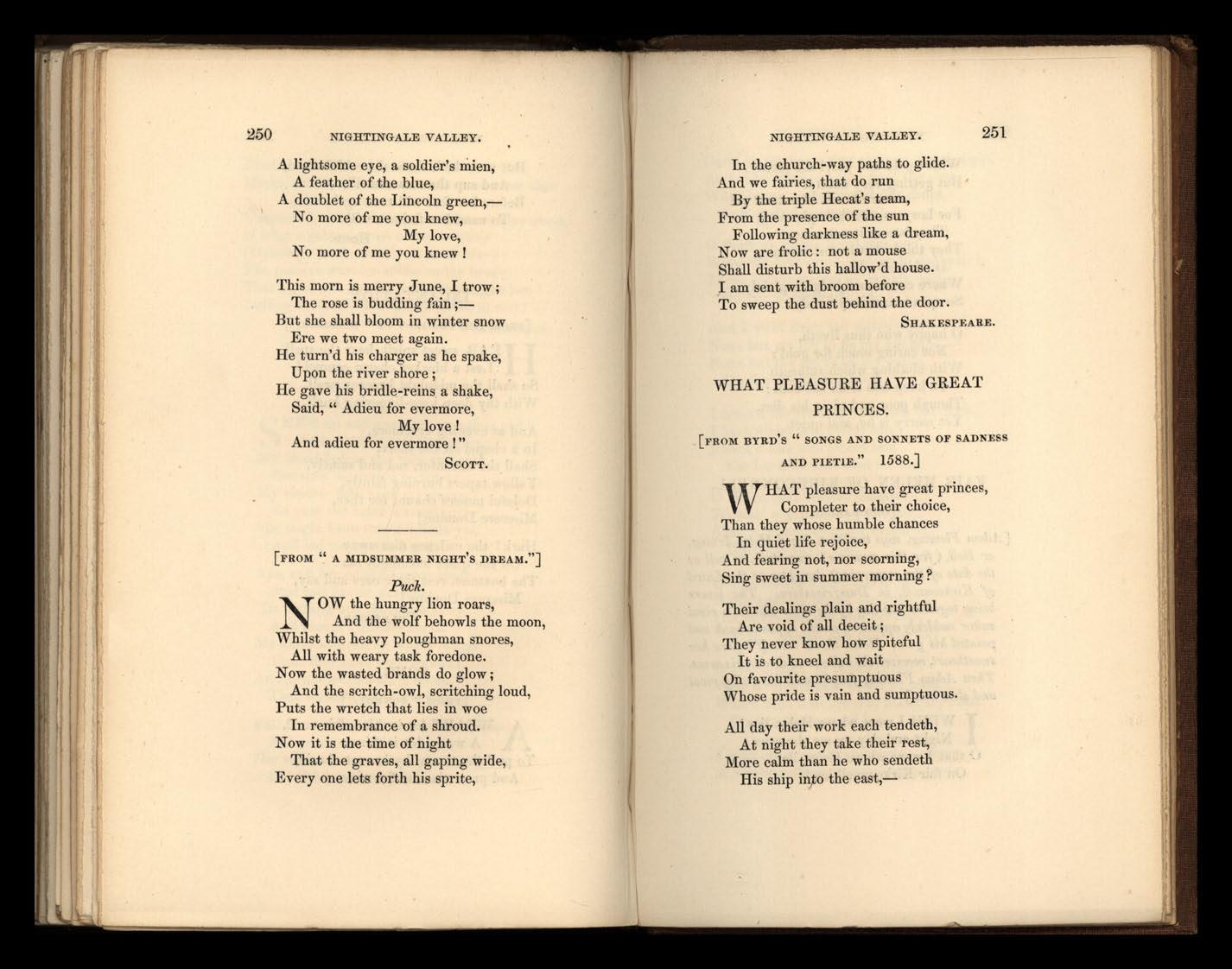
NIGHTINGALE VALLEY.
A lightsome eye, a soldier's niien,
A feather of the blue,
A doublet of the Lincoln green,-
No more of me you knew, My love, No more of me you knew!
This morn is merry June, I trow j
The rose is budding fain j-
But she shall bloom in winter snow
Ere we two meet again.
He turn'd his charger as he spake, Upon the river shore j
He gave his bridle-reins a shake,
Said, " Adieu for evermore, My love I And adieu for evermore!"
SCOTT.
[FROM" A MIDSUlIIMER NIGHT'S DREAM."]
Puck.
NOW the hungry lion roars, And the wolf behowls the moon, 'Vhilst the heavy ploughman snores, All with weary task foredone.
Now the wasted brands do glow
And the scritch-owi, scritching loud,
Puts the wretch that lies in woe
In remembrance 'Of a shroud.
Now it is the time of night
That the graves, all gaping wide, Everyone lets forth his sprite,
NIGHTINGALE VALLEY.
In the church-way paths to glide.
And we fairies, that do run
By the triple Hecat's team, From the presence of the sun
Following darkness like a dream,
Now are frolic: not a mouse
Shall disturb this hallow'd house. I am sent with broom before
251
To sweep the dust behind the door. SHAKESPEARE.
[FROM BYRD'S " SONGS AND SONNETS OF SADNESS AND PlETlE." 1588.]
WHAT pleasure have great princes, Completer to their choice, Than they whose humble chances
In quiet life rejoice, And fearing not, nor scorning, Sing sweet in summer morning?
Their dealings plain and rightful
Are void of all deceit j
They never know how spiteful It is to kneel and wait
On favourite presumptuous
Whose pride is vain and sumptuous.
All day their work each tendeth, At night they take their rest, More calm than he who sendeth
His ship in}o the east,-
252

NIGHTINGALE VALLEY.
Where gold and pearl are plenty, But getting very dainty.
For lawyers and their pleading, They 'steem it not a straw; They think that honest meaning Is of itself a law, Where conscience judgeth plainly,So spend no money vainly.
o happy who thus liveth, Not caring much for gold; Wit.h clothing which sufficeth To keep him from the cold; Though poor and plain his diet, Yet merry is he, and quiet.
FAIR HELEN OF KIRKCONNELL.
[OLD BALLAD.]
[Adam Fleming, says tmdition, loved Helen Irving, 01' Bell, (for this sUr/wme is uncertain, as well.as the date of the occurrence) daughter of the Lalrd of Kirkconnell, in Dumfriesshire. The lovers being together one day by the river Kirtle, a rival suitor suddenly appeared on the opposite bank and pointed his gun; Helen threw herself before her sweet/teart, received tlte bullet, and died in his arms. Then Adam Fleming fought with his guilty rival and slew him.]
IWISH I were where Helen ! Night and day on me crIes; o that I were where Helen lies, On fair Kirkconnell lea!
NIGHTINGALE VALLEY. 253
Curst be the heart that thought the thought, And curst the hand that fired the shot, When in my arms burd Relen dropt, And died to succour me !
o think na ye my heart was sair ,V hen my love dropt, and spak' nae mair! There did she swoon wi' meikle care, On fair Kirkconnelllea.
And I went down the water side, None but my foe to be my guide, None but my foe to be my guide, On fair Kirkconnelllea.
I cross'd the stream, my sword did draw, I hack'd him into pieces sma', I hack'd him into pieces sma', For her sake that died for me.
o Relen fair, beyond compare! I'll mak' a garland 0' your hair, Shall bind my heart for evermair, Unt il the day Idee!
o that I were where Relen lies! NiO"ht and day on me she cries; Out of my bed she bids me rise, Says, " Haste, and come to me!"
o Relen fair! 0 Relen chaste!
Were I with thee I would be blest, Where t.hou Hest low and tak'st thy rest, On fair Kirkconnell lea.
I wish my grave were growing green, A. winding-sheet drawn o'er R1y e'en,
254
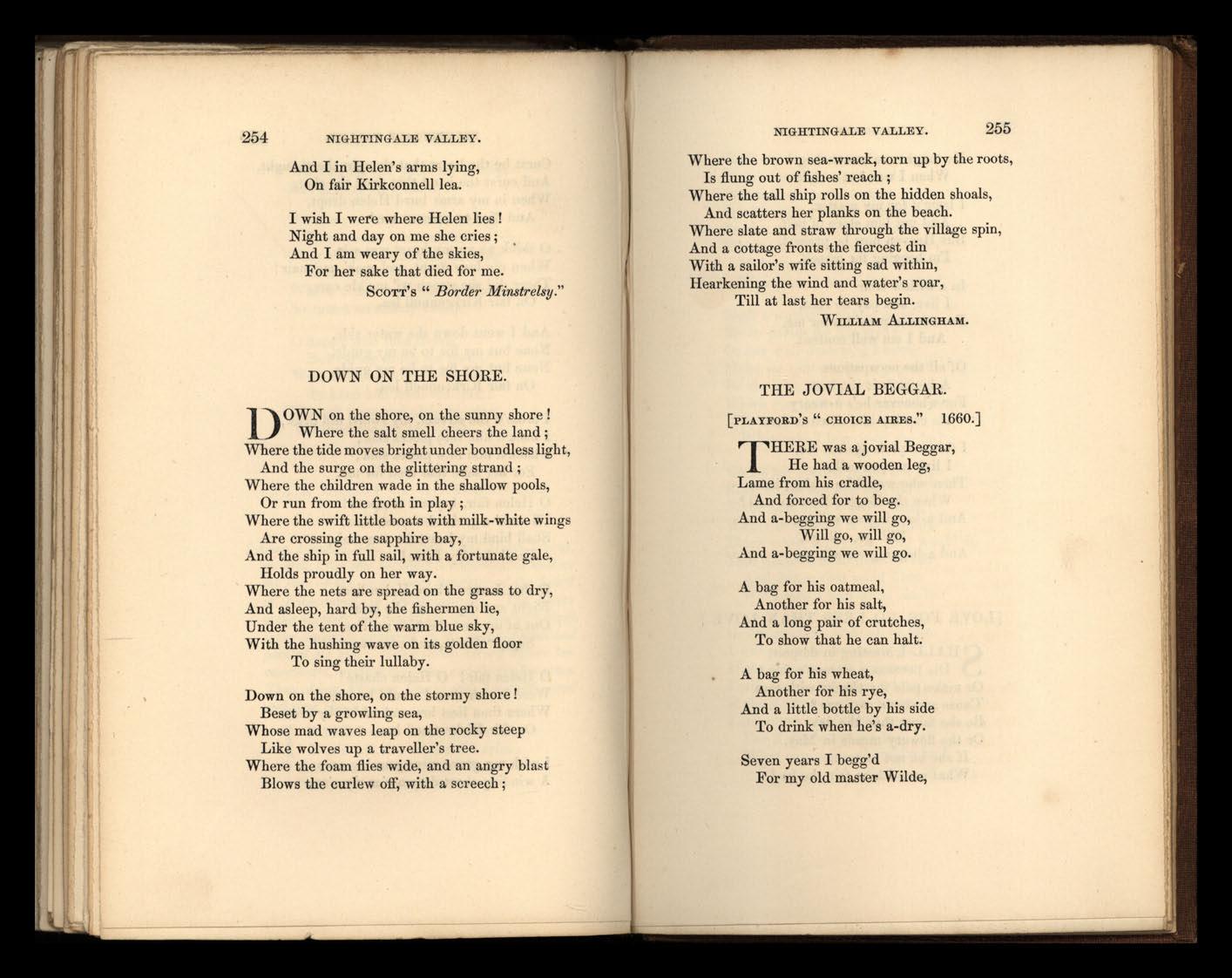
NIGHTINGALE VALLEY.
And I in Helen's arms lying, On fair Kirkconnell lea.
I wish I were where Helen lies! Night and day on me she cries; And I am weary of the skies, For her sake that died for me.
SCOTT'S " Bordel· Mi'TUItrelsy."
DOWN ON THE SHORE.
DOWN on the shore, on the sunny shore!
Where the salt smell cheers the land; W'here the tide moves bright under boundless light, And the surge on the glittering strand; Where the children wade in the shallow pools, Or run from the froth in play;
Where the swift little boats with milk-white wing s Are crossing the sapphire bay,
And the ship in full sail, with a fortunate gale, Holds proudly on her way.
Where the nets are spread on the grass to dry, And asleep, hard by, the fishermen lie,
Under the tent of the warm blue sky, With the hushing wave on its golden floor
To sing their lullaby.
Down on the shore, on the stormy shore!
Beset by a growling sea,
Whose mad waves leap on the rocky steep
Like wolves up a traveller's tree.
Where the foam flies wide, and an angry blas t
Blows the curlew off, with a screech;
NIGHTINGALE VALLEY. 255
Where the brown sea-wrack, torn up by the roots, Is flung out of fishes' reach;
Where the tall ship rolls on the hidden shoals, And scatters her planks on the beach.
Where slate and straw through the village spin, And a cottage fronts the fiercest din
With a sailor's wife sitting sad within, Hearkening the wind and water's roar, Till at last her tears begin.
WILLIAM ALLINGHAM.
THE JOVIAL BEGGAR.
[PLAYFORD'S " CHOICE AIRES." 1660.]
THERE was a jovial Beggar, He had a wooden leg, Lame from his cradle, And forced for to beg. And a-begging we will go, Will go, will go, And a-begging we will go.
A bag for his oatmeal, Another for his salt, And a long pair of crutches, To show that he can halt.
A bag for his wheat, Another for his rye, And a little bottle by his side To drink when he's a-dry.
Seven years I begg'd For myoId master Wilde,
256
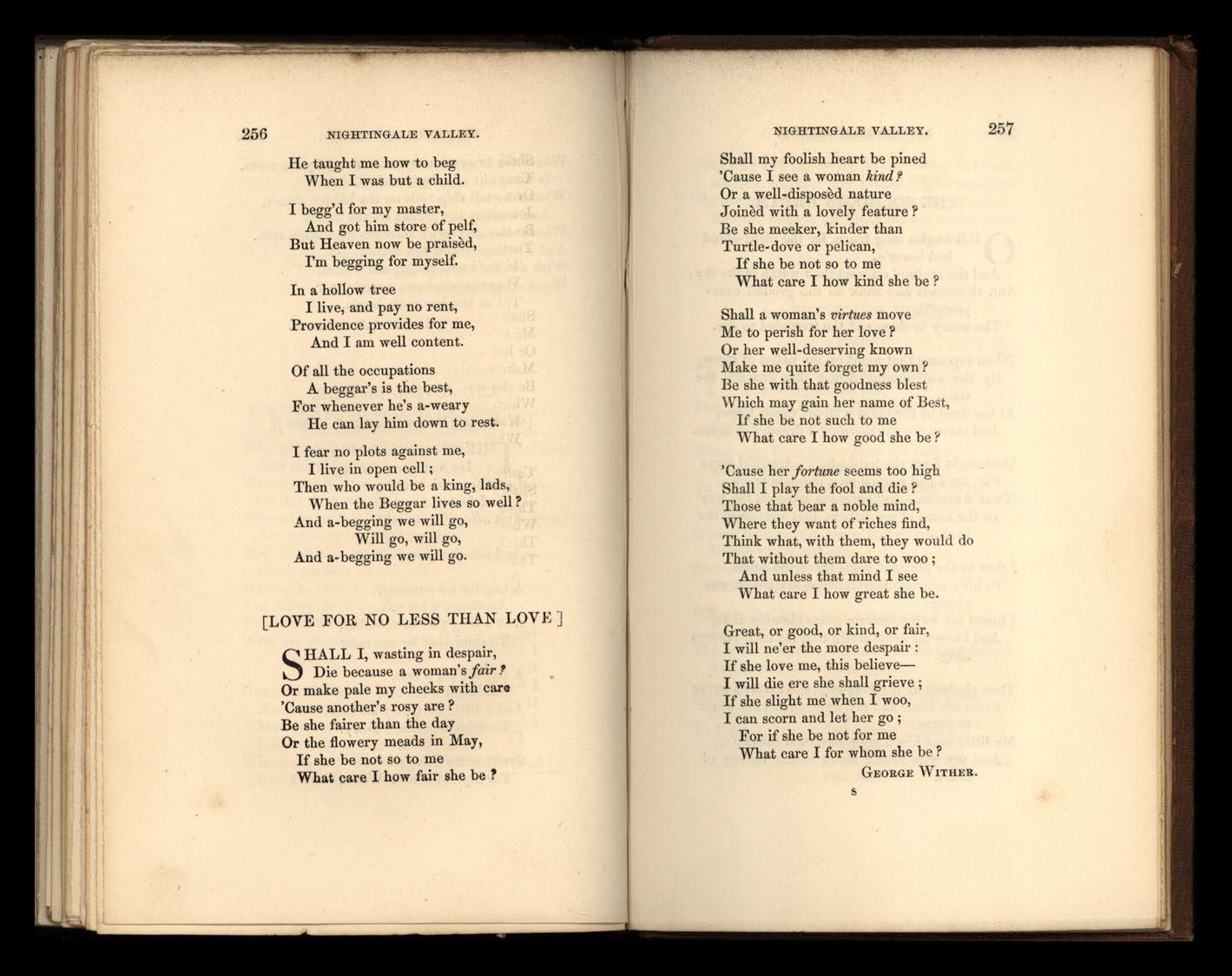
NIGHTINGALE VALLEY.
He taught me how to beg When I was but a child.
I begg'd for my master, And got him store of pelf, But Heaven now be praised, I'm begging for myself.
In a hollow tree
I live, and pay no rent, Providence provides for me, And I am well content.
Of all the occupations
A beggar's is the best, For whenever he's a-weary
He can lay him down to rest.
I fear no plots against me, I live in open cell ; Then who would be a king, lads, When the Beggar lives so well?
And a-begging we will go, Will go, will go, And a-begging we will go.
[LOVE FOR NO LESS
LOVE ]
I, wasting in despair, Die because a woman's fair .'
Or make pale my cheeks with care
'Cause another's rosy are?
Be she fairer than the day
Or the flowery meads in May, If she be not so to me
Wbat care I how fair she be r
NIGHTINGALE VALLEY.
Shall my foolish heart be pined
'Cause I see a woman kind?
Or a well-disposed nature
Joined with a lovely feature?
Be she meeker, kinder than Turtle-dove 01' p elican, If she be not so to me
What care I how kind she be ?
Shall a woman's virtues move
Me to perish for her love?
Or her well-deserving known
Make me quite forg et my own?
Be she with that goodness blest
Which may gaiu her name of B es t ,
If she be not such to me
'lVhat care I how good she be ?
'Cause her fortune seems too high
Shall I play the fool and die?
Those that bear a noble mind, they want of riches find ,
Think what, with them, they would d o
That without them d are to woo;
And unless that mind I see What care I how great she b e
Great, or good, or kind, or fair, I will ne'er the more despair:
If she love me, this believeI will die ere she shall grieve;
If she slight me when I woo, I can scorn and let her go ;
For if she be not for me
What care I for whom she b e ?
GEORGE'VlTllliR. s
258
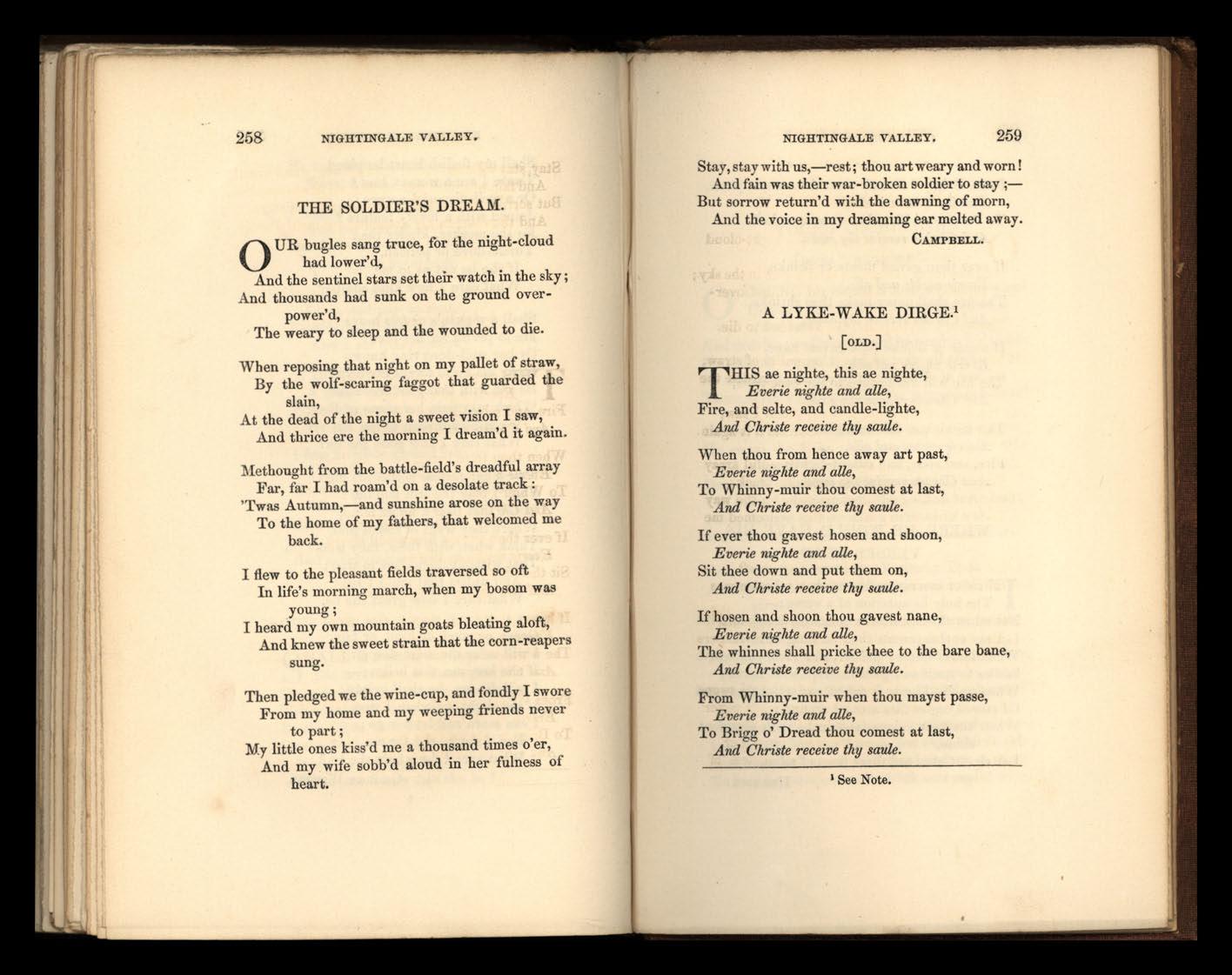
NIGllTINGALE VALLEY.
THE SOLDIER'S DREAM.
OUR bugles sang truce, for the night-cloud had lower'd,
And the sentinel stars set their watch in the sky; And thousands had sunk on the ground overpower'd, The weary to sleep and the wounded to die.
When reposing that night on my pallet of straw, By the wolf-scaring faggot that guarded the slain, At the dead of the night a sweet vision I saw, And thrice ere the morning I dream'd it again.
Methought from the battle-field's dreadful array far I had roam'd on a desolate track: 'Twas Autumn,-and sunshine arose on the way To the home of my fathers, that welcomed me back.
I flew to the pleasant fields traversed so oft In life's morning march, when my bosom was young; I heard my own mountain goats bleating aloft, And knew the sweet strain that the corn-reapers sung.
Then pledged we the wine-cup, and fondly I swore From my home and my weeping friends never to part;
My little ones kiss'd me a thousand times o'er, And my wife sobb'd aloud in her fulness of heart.
NIGHTINGALE VALLEY. 259
Stay, stay with us,-rest; thou artweary and worn! And fain was their war-broken soldier to stay ;But sorrow return'd with the dawning of morn, And the voice in my dreaming ear melted away. CAMPBELL.
[OLD.]
THIS ae nighte, this ae nighte, Everie nighte and alle, Fire, and selte, and candle-lighte, And Christe receive thy saule.
When thou from hence away art past, Everie nigltte and alle, To Whinny-muir thou comest at last, And Christe receive thy saule.
If ever thou gavest hosen and shoon, Everie nighte and alle, Sit thee down and put them on, And Christe receive thy suule.
If hosen and shoon thou gavest nane, Everie nigltte and aUe, The whinnes shall pricke thee to t.he bare bane, And Christe receive thy saule.
From Whinny-muir when thou mayst passe, E"erie nighte and alle, To Bl'igg 0' Dread thou comest at last, And Christe receive thy saule.
I See Note.
NIGHTINGALE VALLEY
..
From Brigg 0' Dread when thou mayst passe,
Everie nighte and alle,
To Purgatory Fire thou comest at last, And Christe r eceive thy saule.
If ever thou gavest meate or drinke,
Everie nigltte and alle,
The fire shall never make thee shrink e, And Christe receive thy saule.
If meate or drinke thou gavest nane,
Evm'ie nighte and alle ,
The fire will burne th ee to th e bare bane, And Christe receive thy saule.
This ae nighte, this ae ni ghte , Everie nighte and alle, Fire, and selte, and candle-lighte, And Christe receive thy saule.
WHERE HE WOULD HAVB HIS VERSES READ.
IN sober mornings, do not thou r ehear se
Th e h oly incantation of a v erse ;-
But when that men have both well drunk and fed
Let my enchantments then be sung or r ead.
When laurel spirtB j' the fire, and when the hearth
Smiles to itself and gilds the roof with mirth;
When up the Thyrse is rai sed, an d when the sound
Of sacred orgies flies around around;
'When t he ro se r eigns , and lo cks with ointment shine,
L et rigid Cato read these lines of mine.
HERRICK.
0,YOUNG Lochinvaris come outofthewest!
Through all the wide border his steed is the best;
And save his good broadsword he weapon had none;
He rode all unarm'd, and he rod e all alone.
So faithful in love, and so dauntl ess in war,
There never was knight like the young Lo chinvar I
He stay'd not for brake and he stopt not for stone ; He swam the Eske river wh ere ford th ere was none;
But ere he alighted at N etherby gate,
The bride had consented, th e gallant came late;
For a la<Y<Yard in love and a dastard in war,
Was to the fair Ellen of brave Lo chinvar.
So bravely he enter'd the N eth erby H all,
Among bridesmen and kin smen and broth ers and all;-
Then spoke the bride's fath er, his h and on his sword,
For the poor craven brid egroom said never a word, " 0 come ye in peace here, or come ye in war,
Or to dance at our bridal, young Lord Lochinvar P"
" I 10nO"woo'dyour daughter, my suit you denied;-
Love :wells like the Solway, but ebbs like its tide;
And now am I come, with this lo st love of mine
To lead but one mea sure, drink one cup of wine.
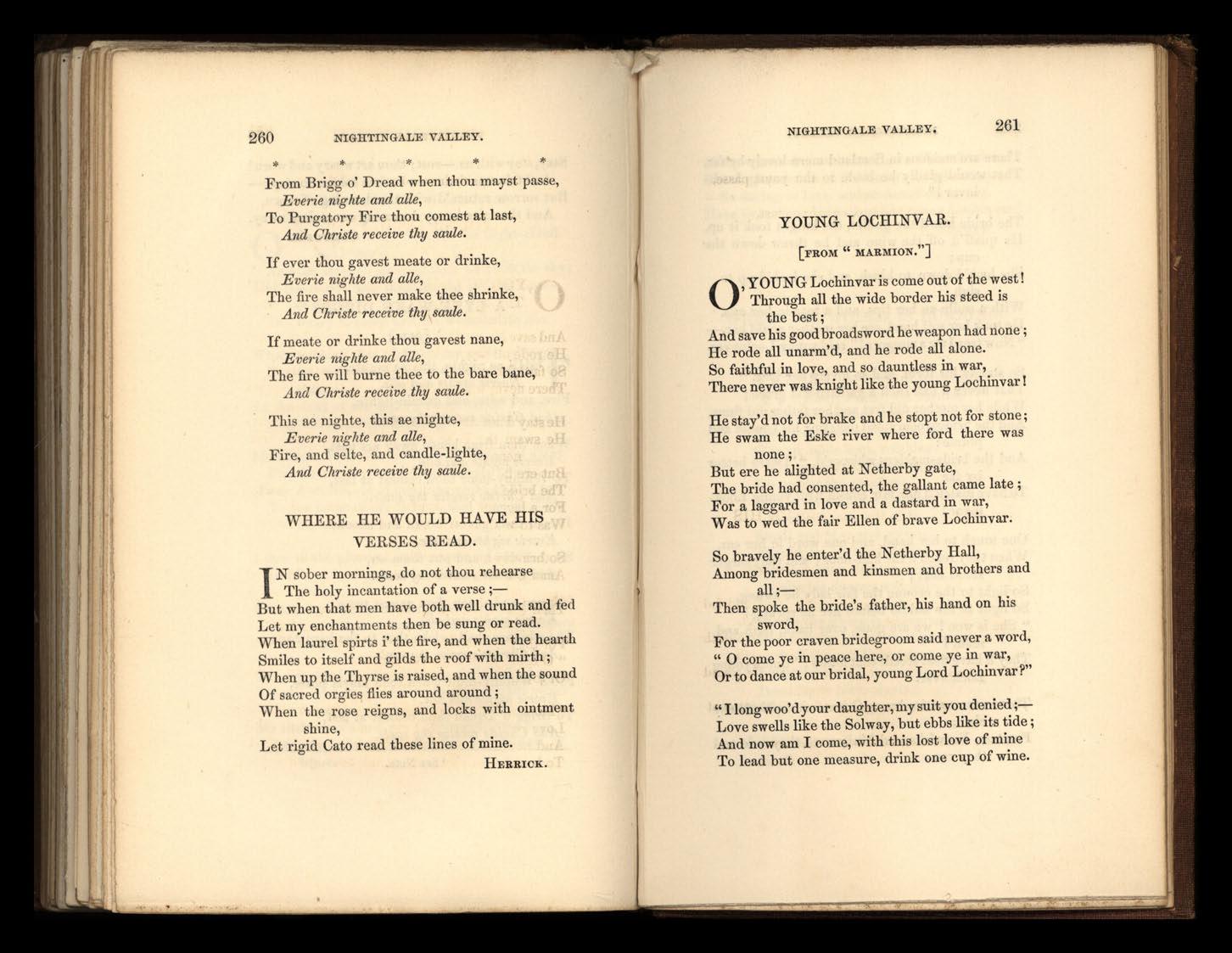
Donegal County Library Service
262

NIGHTINGALE VALLEY.
There are maidens in Scotland more lovely by far, That would gladly be bride to the young Lochinvar !"
The bride kiss'd the goblet, the knight took it up, He quaff'd off the wine and he threw down the cup;
She look'd down to blush, and she look'd up to sigh,
With a smile on her lips, and a tear in her eye.
He took her soft hand, ere her mother could bar,-
" Now tread we a measure!" said young Lochinvar.
So stately his form, and so lovely her face,
That never a hall such a galliard did grace;
While her mother did fret and her father did fume,
And the bridegroom stood dangling his bonnet and plume;
And the bride-maidens whisper'd, "'Twere better by far
To have match'd our fair cousin with young Lochinvar I"
One touch to her hand, and one word in her ear, When they reach'd the hall-door; and the charger stood near;
So light to the croupe the fair lady he swung, So light to the saddle before her he sprung!
" She is won I we are gone, over bank, bush and scaur!
They'll have fleet steeds that follow !" quothyoung Lochinvar.
There was mounting 'mong Grremes of the N etherby clan;
Forst.ers, Fenwicks, and Musgraves, they rode and they ran;
NIGHTINGALE VALLEY. 263
There was racing and chasing on Cannobie lea; But the lost bride of Netherby ne'er did they see.
-So daring in love, and so dauntless in war, Have ye ere heard of gallant like young Lochinvar? SCOTT.
(STANZAS FOR MUSIC.)
WHEN the world is burning, Fired within, yet turning
Round with face unscathed,Ere fierce flames, uprushing, O'er all lands leap, crushing, Till earth fall, fire-swathed; Up amidst the meadows, Gently through the shadows, Gentle flames will glide, Small and blue and golden: Though by bard beholden When in calm dreams folden, Calm his dreams will bide.
Where the dance is sweeping, Through the greensward peeping
Shall the soft lights start; Laughing maids, unstaying, Deeming it trick-playing, High their robes upswaying, O'er the lights shall dart; And the woodland haunter
Shall not cease to sauntel'
Donegal County Library Service
264 ?>'IGHTINGALE VALLEY.
'When, far down some glade, Of the great world's burning
One soft flame upturning, Seems, to his discerning, Crocus in the shade.
IWISH that when you died last May, Charles, there had died along with you
Three parts of Spring's delightful things;
A ye, and for me, the fourth part too.
A foolish thought, and worse, perhaps!
There must be many a pair of friends
Who, arm in arm, deserve the warm Moon's birth, and the long evening-ends.
So, for their sake, prove May still May I
Let their new time, like mine of old, Do all it did for me; I bid
Sweet sights and sounds throng manifold.
Only, one little sight, one plant
Woods have in May, that starts up green
Except a streak, which, so to speak Is Spring's blood, spilt its leaves between,-
That, they might spare: a certain wood
Might lose the plant; their loss were small : And I,-whene'er the plant is there
Its drop comes from my heart, that's all.
ROBERT BROWNING.
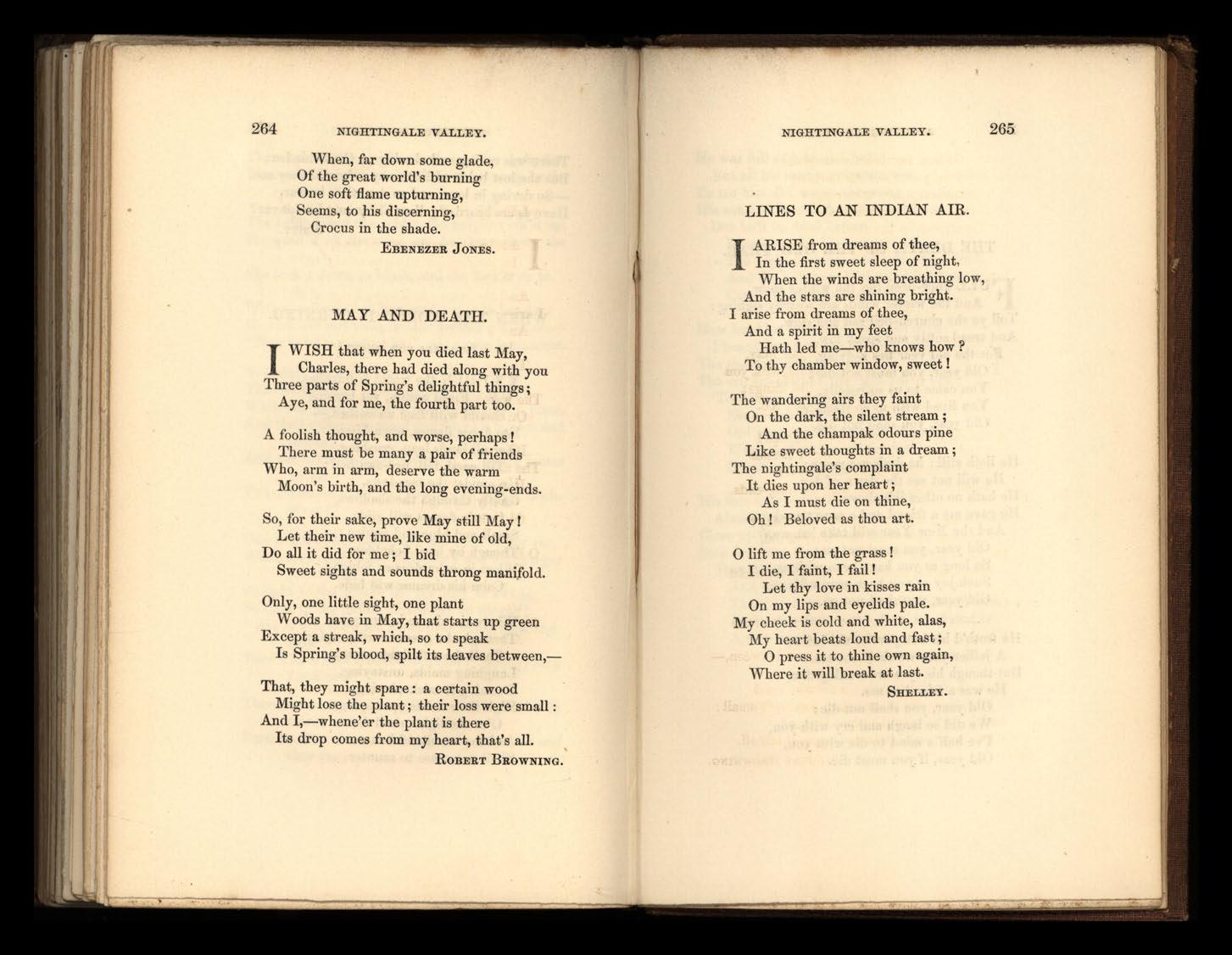
NIGHTINGALE VALLEY.
IARISE from dreams of thee,
In the first sweet sleep of night
When the winds are breathing low, And the stars are shining bright.
I arise from dreams of thee, And a spirit in my feet
Hath led me-who knows how?
To thy chamber window, sweet!
The wandering airs they faint
On the dark, the silent stream; And the champak odours pine
Like sweet thoughts in a dream;
The nightingale's complaint It dies upon her heart;
As I must die on thine,
Oh I Beloved as thou art.
o lift me from the grass!
I die, I faint, I fail! Let thy love in kisses rain
On my lips and eyelids pale.
My cheek is cold and white, alas, My heart beats loud and fast; o press it to thine own again, Where it will break at last.
SHELLEY.
County Library Service
266
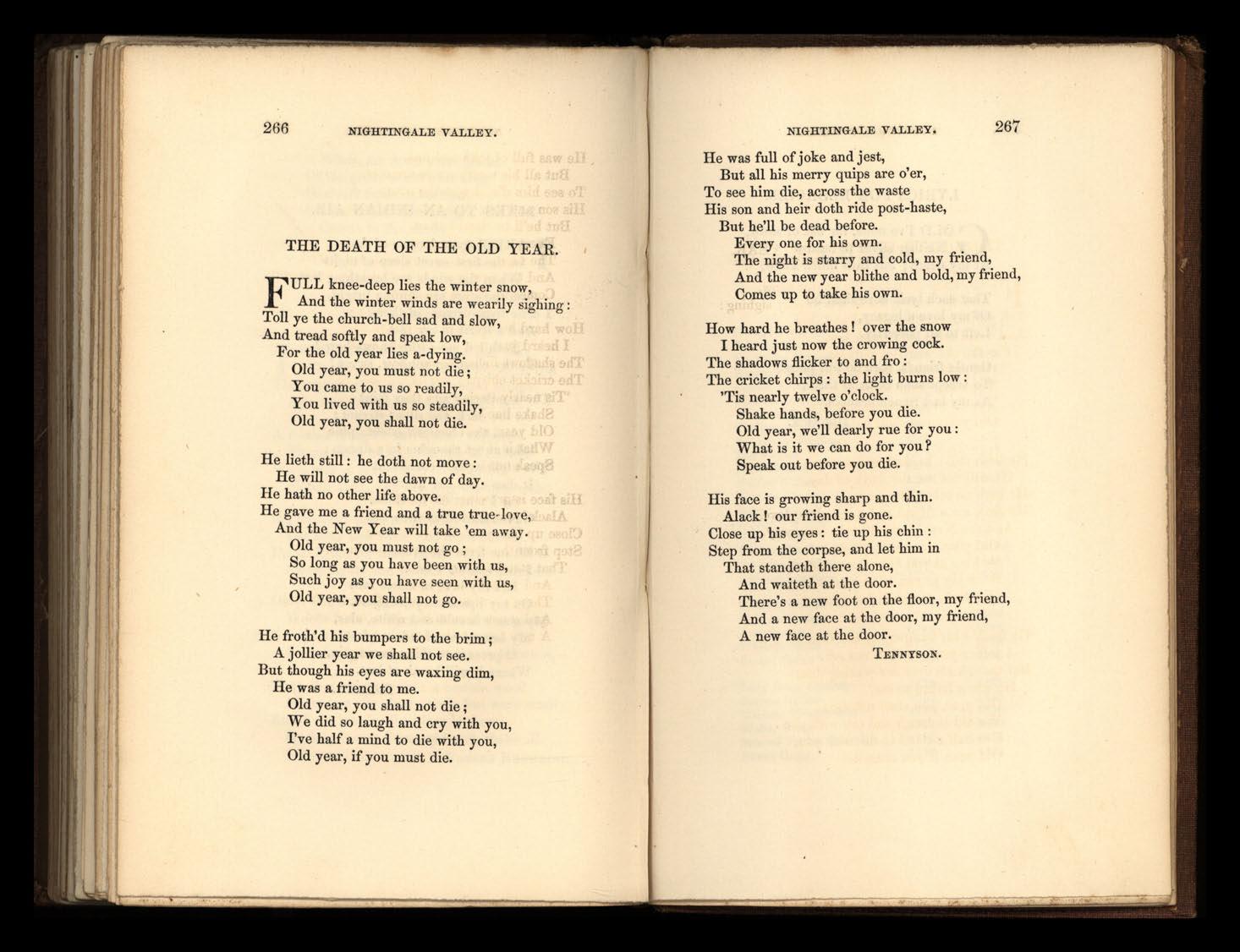
NIGHTINGALE VALLEY.
FULL knee-deep lies the winter snow,
And the winter winds are wearily sighing:
Toll ye the church-bell sad and slow,
And tread softly and speak low,
For the old year lies a-dying.
Old year, you must not die; You came to us so readily, You lived with us so steadily,
Old year, you shall not die.
He lieth still: he doth not move:
He will Dot see the dawn of day.
He hath no other life above.
He gave me a friend and a true true-love, And the New Year will take 'em away.
Old year, you must not go ;
So long as you have been with us, Such joy as you have seen with us, Old year, you shall not go.
He froth'd his bumpers to the brim; A jollier year we shall not see.
But though his eyes are waxing dim, He was a friend to me.
Old year, you shall not die; We did so laugh and cry with you, I've half a mind to die with you, Old year, if you must die.
NIGHTINGALE VALLEY.
He was full of joke and jest,
But all his merry quips are o'er,
To see him die, across the waste
His SOD and heir doth ride post-haste,
But he'll be dead before.
Everyone for his own.
The night is starry and cold, my friend,.
267
And the new year blithe and bold, my friend, Comes up to take his own.
How hard he breathes! over the snow
I heard just now the crowing cock.
The shadows flicker to and fro:
The cricket chirps: the light burns low: 'Tis nearly twelve o'clock.
Shake hands, before you die.
Old year, we'll dearly rue for you: What is it we can do for you?
Speak out before you die.
His face is growing sharp and thin.
Alack! our friend is gone.
Close up his eyes: tie up his chin:
Step from the corpse, and let him in That standeth there alone, And waiteth at the door.
There's a new foot on the floor, my friend,
And a new face at the door, my friend, A new face at the door.
TENNysoN.
Donegal County Library Service
268 NIGHTINGALE VALLEY.
GOLD I've none, for use or show, Neither silver to bestow At my death; but thus much know,
That each lyric here shall be Of my love a legacy, Left to aU posterity.
Gentle friends, then do but please To accept such coins as these, As my last remem brances. HERRICK.
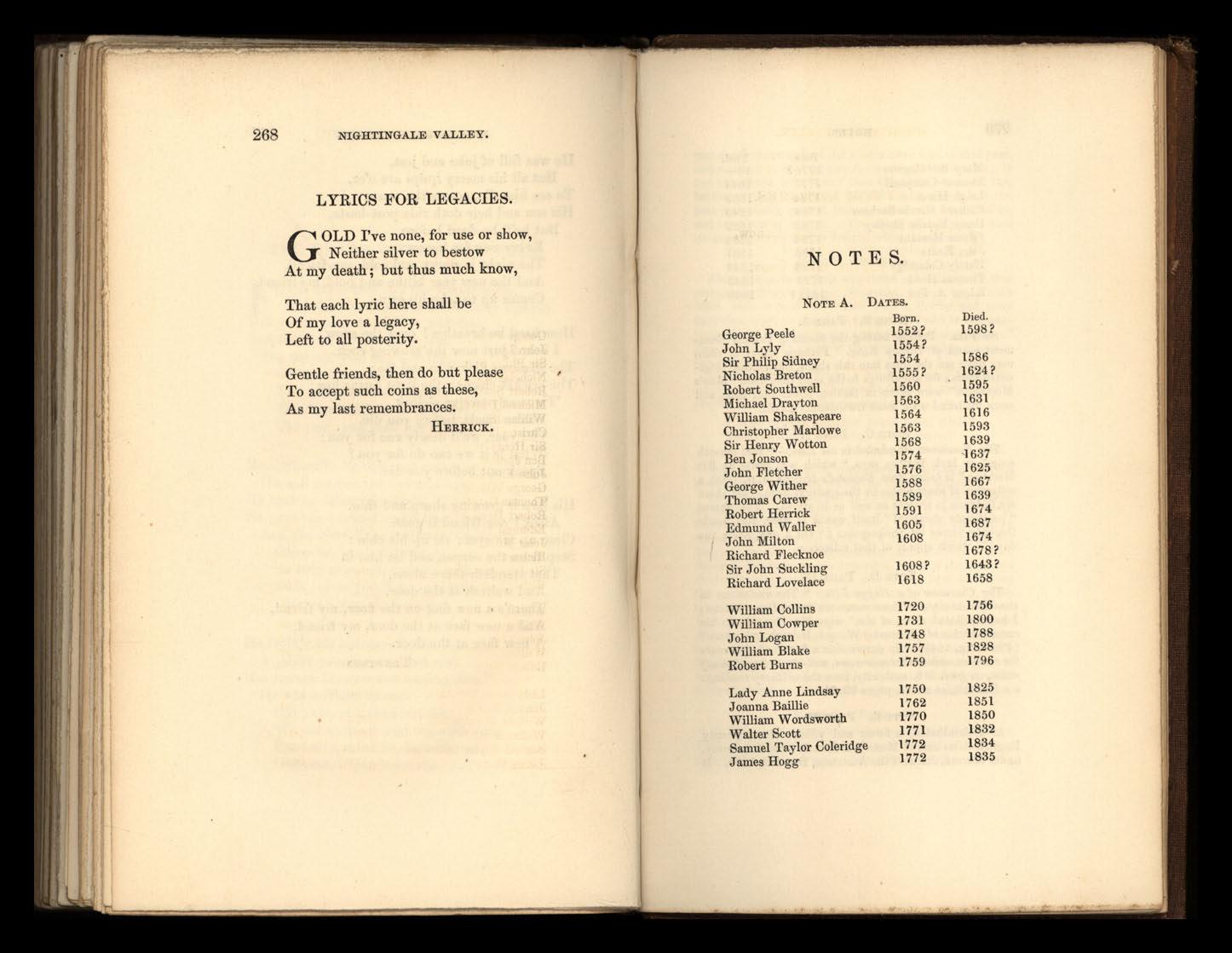
NOTE A. DATES. Born.
George Peele 1552?
John Lyly 1554?
Sir Philip Sidney 1554
Nicholas Breton 1555?
Rohert Southwell 1560
Michael Dray ton 1563
William Shakespeare 1564
Christopher Marlowe 1563
Sir Henry W otton 1568
Ben Jonson 1574
John Fletcher 1576
George Wither 1588
Thomas Carew 1589
Robert Herrick 1591
Edmund Wailer 1605
John Milton 1608
Richard Flecknoe
Sir John Suckling 1608?
Richard Lovelace 1618
WiIliam CoUins 1720
WiIliam Cowper 1731
John Logan 1748
William Blake 1757
Robert Burns 1759
Lady Anne Lindsay 1750
J oanna Baillie 1762
William W ordsworth 1770
Waiter Scott 1771
Samuel Taylor Coleridge 1772
James Hogg 1772 Died 1598? 1586 1624 ? 1595 1631 1616 1593 1639 ,1637 1625 1667 1639 1674 1687 1674 1678 ? 1643? 1658 1756 1800 1788 1828 1796 1825 1851 1850 1832 1834 1835
Mary Boddington
Thomas Campbell
Leigh Hunt NOTES.
Richard Harris Barham
Percy Bysshe Shelley
Felicia Hemans
John Keats
Hartly Coleridge
Thomas Hood
Edgar A. Poe
NOTE B. PAGE 5.
Sic Vita. Priuted among the poems of Francis Beaumont,-and of Bishop King. Perhaps either of them may have put the lines into this shape, but neither originated them; for morallings to the same tune upon" Man's Mortalitie," were much in fashion about that time, and seem modelled upon some traditionary strain.
NOTE C. PAGE 7.
The Passionate Shepheard to his Love,-" that smooth song," as Izak Walton says, "which was made by Kit Marlowe," is taken from Englancr. Helicfln, A.D. 1600, a collection of short pieces in the pastoral form,-for there are fashions in themes as well as in styles. The phrase " passionate shepherd" itself was a la mode, and heads the only verses by Shakespeare (" On a day, alack the day! ") which appear in that collection.
NOTE D. PAGE 13.
Th. Character of a Happy Life. "The variations in the different copies of these verses are unusually numerous j I have collated those of six," says Mr. Hannah, in his careful edition of" Poems by Wotton, Raleigh and others" (Pickering, 1845). In our version a few words (humours for rumours, accu.ers for oppressors, well-cho for religious) differ,ou good MS. authority, from the ordinary reading: see Hannah, as above, pages 29, 31.
NOTE E. PAGE 29.
At Hohenlinden, a forest and village about twenty English miles east of Munich, a French republican army, under Moreau, defeated the Austrians, Dec. 3rd, 1800. It
was the first struggle of the winter campaign of that year, and resulted in an armistice favourable to the French. It has sometimes been stated that Campbell witnessed tnis battle, or that he vi8ited the field soon after; but the poet had finally quitted Bavaria some six weeks before, and was then at Altona. The value of the lyric is from its general force, not it s details, which are inexact.
NOTE F. PAGE 31.
Clerk Saunders. This wonderful old ballad was first printed in Scott's Border Minstrelsy, "from Mr. Herd's MSS. with several corrections from a shorter and more imperfect copy, in the same volume, and one or two conjectural emendations in the arrangement of the stanza.• " This version here given is the fruit of further comparison and consideration.
The" clinking bell" was a hand-bell rung before the corpse at the funeral; those who heard it in its passing · prayed for the soul of the deceased:-
" And as they sat, they heard a bell cHnke Biforn 11 corps, was caried to the grave."
CHAUCER'S Pardonere's Tale.
"Chrisom wand" is a conjectural emendation of the meaningless" chrystal wand," as hitherto printed.
The words" Old English and Scottish Ballads" awaken as single though complex an idea as if we spoke of Chaucer's Works, or Shakespeare's. Yet the Ballads, as we have them, are the work of a crowd of persons, belonging to different generations and various classes. Many of the versions are imperfect, many of the readings obviously spurious, and one may detect here and there the consequences of the unequal taste and skill, often arbitrarily applied, of the numerous transmitters and recorders. It seems possible, and very desirable, that an Editor, bringing special aptitude and diligence to the task, may sometime be found to bring part, at least, of this tangl ed heap of treasure into a shape more for the general benefit. The difficulties are not few, and the work, when finished, would need to be its own excuse and justification.
NOTE G. PAGE. 50 .
ToMaryin Heaven was written by Burns in September, 1789, on his farm of Ellisland, near Dumfries, he being then thirty years of age. His wife gave the following

County Library Service
account, or at least the substance of it, according to Cunningham's" Life of Burns :" III of a cold, had busied himself all day long with his . the field and as he had got much of the crop m, was capital But when the gloaming came, he grew sad about something-he could not rest. He wandered first up the water-side, and then went to barn-yard; and I followed him, begging him to come 10, as he.was '11 and the air was cold aud sharp. He always promised, still remained where he was, striding up and down, and looking at the clear sky, and particularly at !I" star that shone like another moon. He then threw himself down on some loose sheaves, still continuing to g.aze at the star." When he came in he seemed deeply and sat down aud wrote the first verse: "Thou lmgermg tar" &c The subject of his reverie was Mary Campbell, daughter, who, when she capti."ated the Poet, some three or four years before the date given above, ws;! dairy-maid in Coilsfield-" the Castle of Montgomery. One Sunday in May, the lovers met in a sequestered on the banks of the Ayr, to take farewell befor.e Mary s departure, for a time, to her friends in the West In parting they exchanged their B.ibles,. as trothplight, Burns having written in his, along With hIS name, the two texts" And ye shall not swear by my name falsely-I am Levit. xix. 12.; and" Thou shalt n?tforswea;, thyself, but shalt p erform. Lord thine oath; Matthew, v. 33. This book IS III eXIstence, as well a tress of Mary's hair, whi ch is " very long, and very hght and shining." It was the meeting of the lovers; Mary died of fever in the followlOg autumn.
NOTE H. PAGE 51-
The Northern Star. These lines, with another verse here omitted as inferior, are given in Hone's Table Book (1827), vol. i. page 657, with this preface: "Some ago a Tynemouth vessel called' The Northern was lost, and the following ballad made the tbe memory of a lady supplies the words. It IS notlCeabl.e that strong natural feeling, in where there I S usually HO poetic skill, can sometimes With success shape its experience into a simple poem.

NOTE I. PAGE 52.
Richard Lovelace, born 1618, eldest SOil of Sir William Lovelace, of Wo olwi ch, Kent, was gentleman-commouer of Gloucester Hall, Oxford, 1634, served King Charles in Scotland as ensigu, and afterwards captaiu, and " was accounted," says Wood, "the most amiable and beautiful person that ever eye beheld; of innate modesty, virtue, and courtly deportment." Staunch royalist, he preseuted to parliament the Kentish petition for the restoration of the King, and was therefore imprisoned for several months in the Gatehouse, Westminster, where he wrote his lyric •• To Althea from Prison." After the surrender of Oxford, he commanded a regiment in the French King's service, and was wounded at Dunkirk; a false report of his death reaching Lucy Sacheverell, a lady whom he had long loved, and by whom most of his poems were inspired, she soon after was married to another. In 1648 he returned to London, and was again cast into prison, where he arranged his poams (many of them already separately publishe(\ with music) for the press . The little volume (164 pages) appeared in 1649, under title" Lucasta: [i. e. Lux Casta, memorial of his Lucy] Epodes, Odes, Sonnets, Songs, &c , to which is added Araminta, a Pastorali, by Richard Lovelace, Esq.;" it contains three pretty pieces, which are often reprinted, "To Lucasta, going to the Warres," " The Grasse-hopper," and" To Althea." His losses ill his King'. cause, anr! generosity to all needy persons, ruined Lovelace's fortune, and, when set at liberty after the execution of Charles, " he grew very melancholy (which brought him into a consumption), became very poor in body and purse, was the object of charity, went in ragged clothes (whereas, when he was in his glury, he wore cloth of gQld and silver) and mostly lodged ill obscure and dirty places."-Wood He expired in 1658, only forty years old, at very mean lodgings in Gunpowder Alley, near Shoe Lane, and was buried at the west end of St. Bride's Church. His portrait shows a long, shapely face, high, sweet, and pensive. His" Posthume Poems" were published by his brother in 1659. He also wrote two plays, never printed, "The Scholar," and " The Soldier."
NOTE J. PAGE 54.
William Blake was born November 28, 1757, the son of a hosier in Broad Street, Carnaby Market, which is T
now on the right-hand side of Regent Street, London. At the age of fourteen, having. shown an early hent for pictorial design, he was apprentIced years to Basire engraver; and, besides learlllng hIs art, proceeded to make innumerahle original sketches, and also to compose a vast quantity of wonderful .verses. ":hen twentysix years old Blake's marriage Wlth Kathenne Boutcher took place-a real union, of mutual respect, perfect pathy, tender affection. The quiet, brown-eyed had true taste for art, and gained skill enoug? to III colouring her husband's drawings;. she copIed wIth delight the strange verses he so often dIctated; his painting his poetry, his simplicity, and h,s mystICIsm. He now left' his father's, and went to live in. Green Leicester Fields. In his thirtieth year, wIth the adVIce and assistance of John Flaxman, the sculptor,. a volume of Blake's poems ( seventy pages) was pubhshed, style of which, in compact in and plan as they mostly are reminds one, and 111 that sleepy hour of the English of our very highest men. opened a print-shop, which did not succeed; and, durmg the half of his life, gave his mornings to the graver, by: he earned a modest subsistence for himself and hIS wife, and his evenings to original drawing and poetry. "Were I to love money," he used to say, "I should all power of thought; desire of gain deadens the gelllus of man. My business is not to but glorious shapes, expressing god-hke sentIments. MUSIC, too, we hear of his composing, but h.e wauted the art noting it down and no specimen remams. Most of Blake s engraved works are rare. His illustrations to ," are to be had -to Blair's "Grave," aOll Young 3 NIght Thoughts:' still more easily; but. his own " of Innocence and Experience," wIth slxty-fonr deSIgns, as he calls them, "inventions," are scarcely ever pubhcl! offered for sale; and as seldom, or more seldom, hIS " Urizen "twentv-seven inventions; and" Gates of Paradise," - The designs of the" Songs of and Experience" consist of a nnmber.of sce?es, tlllted m a sweet and peculiar manner, presentmg, wIth a kmd of spiritual exaltation, images of yonth and domestic sadness and fire-side joy-of the the 10nocence and happiness of childhood; each scene having its accompanying finely penCIlled 111 colours, and curiously interwoven wIth the group or landscape.

Blake, as he grew older, grew poorer, but not less inq.listrious or less cheerful; his habits became still more retired and inexpensive; he lived like a hermit in the wilderness of London, a hermit ministered tQ by an angel, who was his wife. A strange faculty which he had of visiOl.-seeing, grew stronger and stronger; ideas of every sort took definite visible form, doubtless through large measure and over-activity of a power which we all pos· sess-witness our dreams. It seems certain that the visual nerve may be stimulated from its il.lternal or brain end with force equal, in some cases, to that exercised by external objects. One may note that while William Blake, a singular boy of fifteen, was busy learning engraving with Mr. Basire, and making sketches and verses, he may any day have met unwittingly in London streets, or walked heside, a placid, venerable, thin man of eighty,(our, of erect figure and abstracted air, wearing a fullbottomed wig, a pair of long ruffles, and a curious-hilted sword, and carrying a gold-headed cane,-no Vision, still flesh and blood, but himself the greatest of modern VisionSeers, Emanuel Swedenborg by name; who came from Amsterdam to London in August, 1771, and died, in No. 26, Great Bath Street, Cold bath Fields, on the 29th of Marcb, 1772.
Blake was accustomed to paint the visionary faces and groups which appeared to him; and the ghosts, among whom were TRany historical personages, usually" sat" as steadily as could be wished. His verses, too, are always thoroughly concrete in their nature.
Blake spent the last year of his life in Fountain Court, Strand, which is nearly opposite Exeter Hall, and there died, 12th of August, 1828, aged seventy. His wife survived him some years. A memorial volume, selected from the abundant evidences of his genius, poetic and pictorial, which now lie scattered in several hands, and are mostly inaccessible to the world, would, if lovingly and liberally executed, be very charming and valuable, and, in truth, a national honour. Creative genius, in any department, is too rare and precious that we should be content" to lose a drop" of that immortal gift. But to produce adequate fac-similes of Blake'3 best engraved designs, and, in especial, of his curiously. tinted drawings, some of which are astoundingly fine, would be no jobber's work.
It remains to add that for the version of" The Tiger," Donegal County Library Service
276 NOTES.
here presented, differing somewhat from those hitherto published, use has been made of a MS. book of Blake's, belonging to a friend of the editor, full of the oddest chaos of verses, drawings, and memoranda.
NOTE K. PAGE 56.
Eugene Aram. In the summer of the year 1759, a human skeleton was accidentally turned up in a quarry near Knaresborough in Yorkshire, and was supposed to be that of one Daniel Clark, who had suddenly disappeared from tbe locality about thirteen years before. One Richard Houseman, being arrested on suspicion, exclaimed tbat the skeleton was not Clark's; and, losing his self-possession, at last directed a search to be made in St. Robert's Cave, where another skeleton was found which proved to be that of Clark. Further inquiry resulted in the arrest of Eugene Aram, formerly of Knaresborough, and now usher in a school at Lvnn in Norfolk, a studious ami learned man. He was 'tried at York Castle, on the 3nl of August, made all elaborate and ingenious-too ingenious defence (to be found in Kippis's Biog. BI';tan.), and was found guilty of the murder of Cl ark, who, with Houseman, had been his accomplice in several robberies. After confession of guilt, followed by an attempt at suicide, Eugene Amm was hanged at York, and his body suspended in chains iu Knaresborough Forest.
NOTE L. PAGE 89.
Richard Harris Barham's best-known book is one of the comic order, entitled The Ingoldsby Legends, in which great cleverness is but poorly employed. These graver verses are said to have been the last he ever made.
NOTE M. PAGE 109.
I do COI!!e•.,e thou'rt SlIIooth and faire, has been said, but not with certainty, to be by Sir Robert Ay ton, a Scottish courtier of James I, and a friend of Ben Jonson.
NOTE N. PAGE 110.
Ned Bolton. The substance of what we have been able to learn regarding the author of this dashing buccaneer ballad, equal to Scott's best lyrics, is that he was a native of the north of Irelaud, some time a newspaper writer, afterwards British Consul at Galveston in Texas,
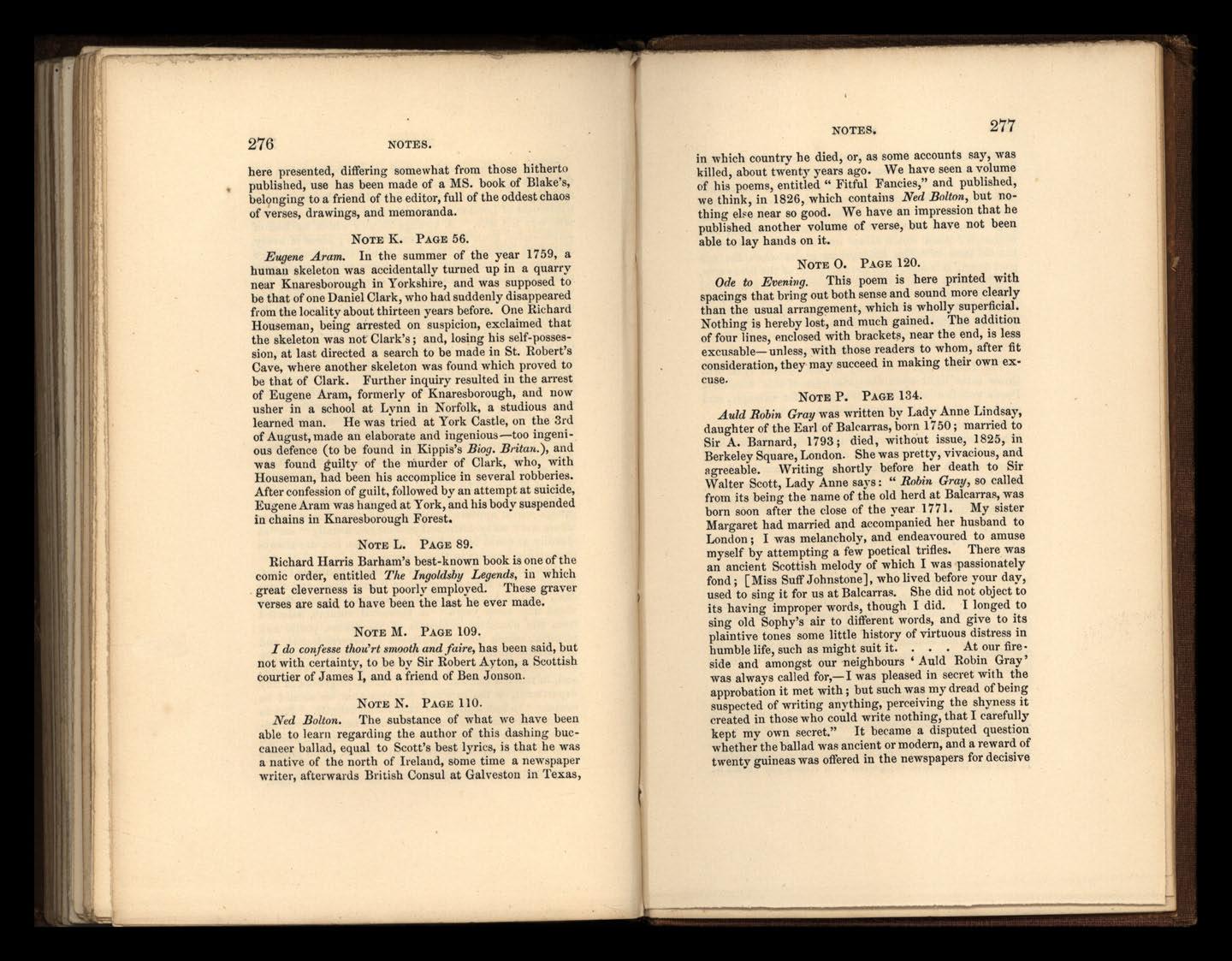
in which country he died, or, as some accounts say, was killed, about twenty years ago . We have seeu a volume of his poems, entitled" Fitful Fancies," and published, we think, in 1826, which contains Ned Bolton, but nothing elFe near so good. We have an impression that he published another volume of verse, but have not been able to lay hands on it.
NOTE O. PAGE 120.
Ode In Evening. This poem is here printed with spacings that bring out both sense and sound more clearly than the usual arrangement, which is wholly superficial. Nothing is hereby lost, and much gained. The additiou of four lines, p.nclosed with near the end, is less excusable-unless, with those readers to whom, after fit consideration, they may succeed iu making their own ex· cuse.
NOTE P. PAGE 134.
Auld Robin Gray was written by Lady Anne Lindsay, daughter of the Earl of Balrarras, born 1750; married to Sir A. Bnrnard, 1793; died, without issue, 1825, in Berkeley Square, London. She was pretty, vivacious, an(l agreeable. Writing shortly before her death to Sir Waiter Scott, Lady Anne says: "Robin Gray, so called from its being tbe name of the old herd at Balcarras, was born soon aft.er the close of tbe year 1771. My sister Margaret had married and accompanied her husband to London; I was melancholy, and endeayoured to amuse myself by attempting a few poetical triBes. There was an ancient Scottish melody of which I was passionately fond; [Miss Suff Johnstone], who lived before your day, used to sing it for us at Balcarras. She did not object to its having improper words, though I did. I longed to sing old Sophy's air to different words, and give to its plaintive toues some little history of virtuous distress in humble life, such as might suit it. At our fire· side and amongst our neighbours' Auld Robin Gray' was always called for,-I was pleased in secret with the approbation it met with; but such was my dread of beillg suspected of writing anything, perceiving the shyness it created in those who could write nothing, that I carefully kept my own secret." It became a dispute(l question whether the ballad was ancient or modern, and a reward of twenty guineas was offered in the newspapers for decisive
proof ou the point. Mr. Jerniugham, secretary to the Antiquarian Society, endeavoured to entrap the truth from Lady Anne in a manner which induced her to put him off unsatisfieu, and the authorship was not made public uutil after her decease. (See Lockhart's Life of Scott, 1844, page 585, and note.) " It remains to be added, that although' Auld Hobin Gray' was originally written to the old tune of ' The Bridegroom greits when the sun ' gael! down,' it is now, with the exception of the first verse, which retains the old air, universally sung to a beautiful modern tune, composed by the Rev. William Leeves, rector of Wriugton, who died in 1828, aged eighty."Book of Scottish Song. (Blackie and Son. 1843.)
NOTE Q. PAGE 143.
The Laboratory. A study of the present lyric will throw some light upon the principles of this wonderful Poet's versification. Take this verse, for example, and emphasise the words given in italics:-
.. He is with her; and they know that Iknow Where they are, what they do: they believe my tears flow "Vhile they laugh, laugh at me, at me fled to the drear Empty church to pray God in for them!-I am "ere." Emerson has frequently rhythms of a similar character, such as" not," (two syllables to be dwelt on to the length of three):-
And, .. Tax Mt my sloth that I Fold my arms beside the brook."
One harvest from thy field Homeward brought the oxeD strong."
It is always delightful to recollect that both our Essayist (to be better known .. after some time"), and our Biographer of Frederick (both ours, though one of them lives beyond sea) are admirable poets, with in each case certain peculiarities and limitations, very note-worthy, hut not here to be expounded.
NOTE R. PAGE 169.
La Belle Dame sans Mercy. .. Among the pieces printed at the end of Chaucer's works, and attributed to him, is a translation, under this title, of a poem of the celebrated Alain Chartier, secretary to Charles the Sixth and Seventh. It was the title which suggested to a friend the verses at
the end of our present number."-Leigh Hunt's I dicator, for May 10th, 1820. The verses were there signed .. Oaviare." In Mr. Milnes's .. Life, &c. of Keats," H. 268, is a version beginning, "0 what ail thee, Knight-at-arms," transposing the fifth and sIxth stanzas, and with a few other variations. It is dated 1819, and seems to be evidently an earlier form of the poem than that which is here given from the Indicator.
NOTE S. PAGE 178.
Fairy Song. Bishop Percy printed this in Re!}ques," under name Tke Fairy Queen, stating that It was gIven, with some corrections lIyanother copy, from a book entitled' The Mvsteries of Love and Eloquence, &c.''' London, 1658. Svo. The verse which he gives as the sixth we have omitted; it runs:-
" The brains of nightingales, With unctuou$ fat of snails, Between two cockles stew'd, Is meat that's easily chew'd; Tailes of wormes and marrow of mice Do make a dish that's wondrous nice."
NOTE T. PAGE 184.
The Lady'. Grave is from certain "Poems, by Mrs. Boddington," (Longman, 1839,) which, though without substance enough to endure, have a delicate and tender strain of originality running througk them, and drew the remark from a friend of ours, that" she must have been a delightful woman to know." A of" Willis's Current Notes," in May, 1852, has furmshed the following information: "Mary Boddington was the daughter of Patrick Comerford, a Cork merchant, and niece of S.ir William Glendowe Newcomen. She was born at Cork III 1776, and, having married, in 1803., Mr: Boddington, a West Indian merchant, left her natIve cIty. After the peace of 1815 Yrs. Boddington travelled much on the continent." She also published" The Gossip's Week," a collection of tales, "Sketches in the Pyrenees," and " Slight Reminiscences of the Rhine."
NOTE U. PAGE 186.
The Rev. William Barlles, a Church of England clergyman, residing at Dorchester, is author of several volumes

Donegal County Library Service
280 NOTES.
of Poems, which, from being written in the dialect of his native Dorsetshire, have attracted less general notice than they deserve. A series of more genuine and delightful sketches, or photographs of rural character and scenery, cannot be found in English literature. The rustic dialect, come down, in our author's opinion, by independent descent from the Sax on dialect which our forefathers brought from the south of Denmark, is easy to master, and enhances the freshness alld originality of these poems, which, soon or lat.e, will infallibly be better known. Mr. Barnes has also published some works on Anglo-Saxon literature. John Rllssell Smith is his publisher.
NOTE V. PAGE 205.
[Even;n.g.] These \"erses are from the" Poems; chiefly Lyrical," by Alfred Tennyson, published in 1830, wherein they are entitled" Elegiacs."
NOTE W. PAGE 218.
The wife of Usher's Well, hearing her three sons are lost at sea, passionately prays that the storm may never cease till they come back to her in flesh and blood. One night, at Martinmas, her three sons come home; the mother feasts all her house, then makes a wide hed for her three 80ns, and sits down by the bedside. But at cockcrow, when she has dropt asleep, these three, who are no living men, hut spirits, strangely repossessed of their old bodies for a season, depart for ever from tbat house.
Tbis Ballad was first puhlished in ScoWs .. Border Minstrelsy :" two verses, " Lie stiJl," &c., and" 0, it's they've ta'en up," &c., are from Mr. Robert Chambers's version, recovered from recitation: one," Our mother has nae mail'," is now added, to complete the sense; and to the same end, the reading, "fish be in the flood" is put instead of" fishes in the flood"-ScoWs. which he notes as obscure, and probably corrupted by reciters. Mr. Aytoun has" freshes in the flood;" Mr. Lockhart suggested "fash,s," i. e. troubles.
" Carline-wife" implies, here at least, a rustic woman keeping a farm. '
" Martinmas," the feast of St. Martin, 11th of N ovemher. One may remark that this, being the customary time to kill winter beef and pork, was a season of rustic feasting and jollity. "Birk" is birch. "Syke," a marshy
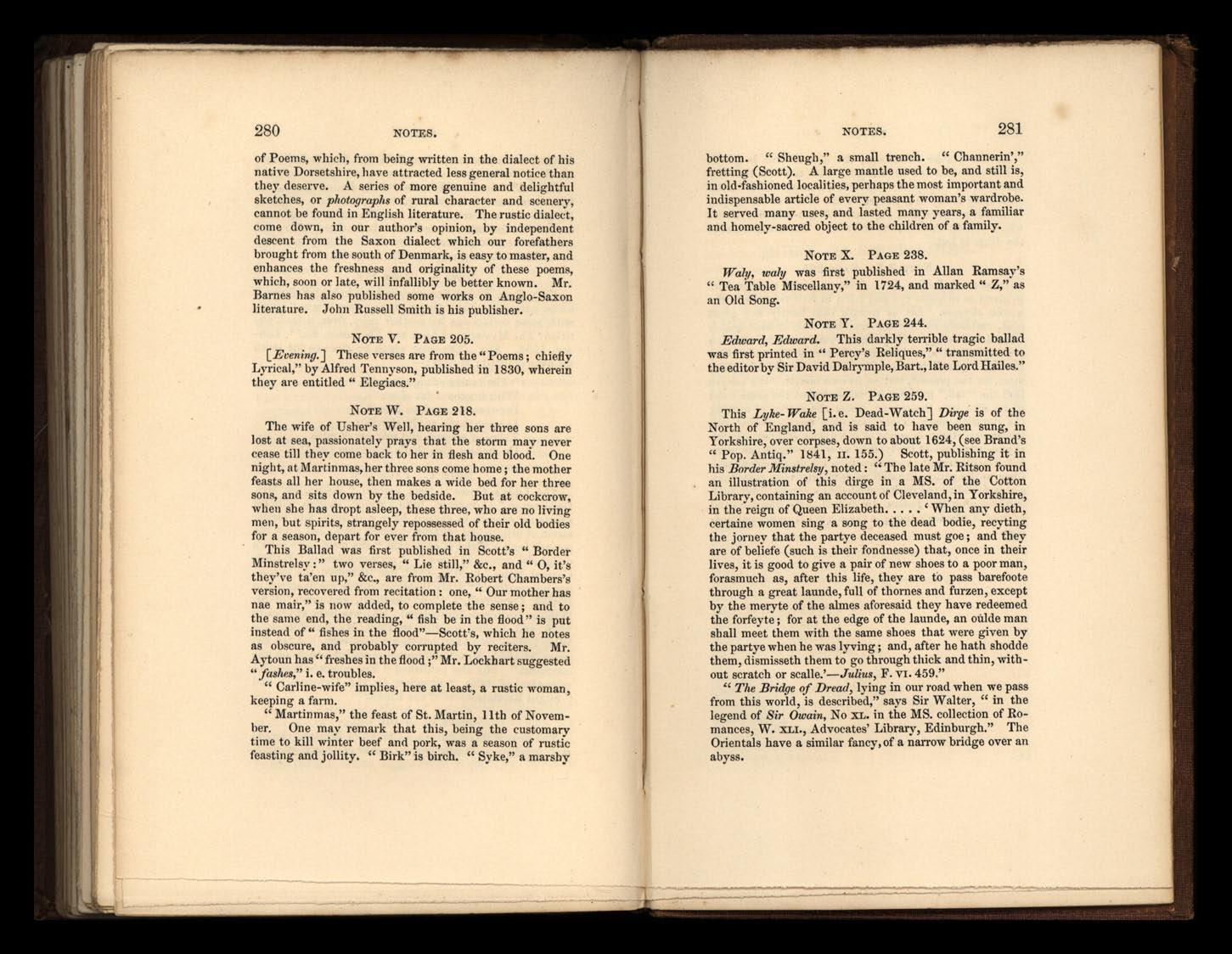
NOTES. 281
bottom. "Sheugh," a small trench. " Cbannerin'," fretting (Scott). A large mantle used to be, and still is, in old·fashioned localities. perhaps the most important and indispensable article of every peasant woman's wardrobe. It served many uses, and lasted many years, a familiar and homely-sacred object to the children of a family.
NOTE X. PAGE 238.
Waly, waly was first published in Allan Ramsay's " Tea Table Miscellany," in 1724, and marked" Z," as an Old Song.
NOTE Y. PAGE 244.
Edward, Edward. This darkly ten-ible tragic ballad was first printed in .. Percy's Reliques," " transmitted to the editor by Sir David DaJrymple,Bart., late Lord Hailes."
NOTE Z. PAGE 259.
This Lyke-Wake [i.e. Dead-Watch] Di,·g' is of the North of England, and is said to have been sung, in Yorkshire, over corpses, down to about 1624, (see Brand's " Pop. Antiq." 11;41, n.155.) Scott, publishing it in his Border Minstrelsy, noted: "The late Mr. Ritson found an illustration of this dirge in a MS. of the Cotton Library, containing an account of Cleveland,in Yorkshire, in the reigu of Queen Elizabeth •..•. ' When any dieth, certaine women sing a song to the dead bodie, recyting the jorney that the partye deceased must goe; and they are of beliefe (such is their fondnesse) that, once in their Jives, it is good to give a pair of new sboes to a poor man, forasmuch as, after this life, they are to pass barefoote through a great launde, full of thornes and furzen, except by the meryte of the aImes aforesaid they have redeemed the forfeyte; for at the edge of the launde, an oulde man shall meet them with the same shoes that were given by the partye when he was Iyving; and, after he hath shodde them, dismisseth them to go through thick and thin, without scratch or scalle.'-Julius, F. VI. 459."
" The Bridge of Dread, lying in our road when we pass from this world, is described," says Sir Waiter, " in the legend of Sir Owain, No XL. in the MS. collection of Romances, W. XLI., Advocates' Library, Edinburgh." The Orientals have a similar fancy. of a narrow bridge over an abyss.
County Library Service
282 NOTES.
In the Bortkr Minso'elsy, the second line is given, " Fire and sleet and candlelight," with the note that sleet seems to be corrupted from selt, i. e. salt, wbich it was customary to lay in a platter on the breast of the corpse. In Brand we have fleet, i. e. water (Anglo-Saxon), but the whole version there seems inferior. The sixth verse of the dirge is lost.
NOTE Z Z. PAGE 265.
Lines to an Indian Air. This exquisite song is here so given as to assist eye and mind in following the interwoven rhymes. Let us remark that hardly any great poet, certainly no modern one, has been so inaccurately printed as Shelley. Helps to the very necessary revision are in existence, and ought quickly to be used. The reading" pine," in the second verse, instead of " fail," must, for the present, rest on its own merits. We believe that the" fail," in the third verse, caused the same word to be slipt into the second, under the notion of making the iteration more exact; but such merely verbal anel mechanical iteration is not in place here, and destroys the rhymic structure of the lyric in a very un-Shelleyan manner. The other slight variations from the usual version bave come to the editor, through an eminent living poet, from a copy fonnd in the pocket of Sbelley's corpse We have inquired after the Indian Air, but, if tbere was one (and a friend of Shelley's thought there was), it seems untraceaole.
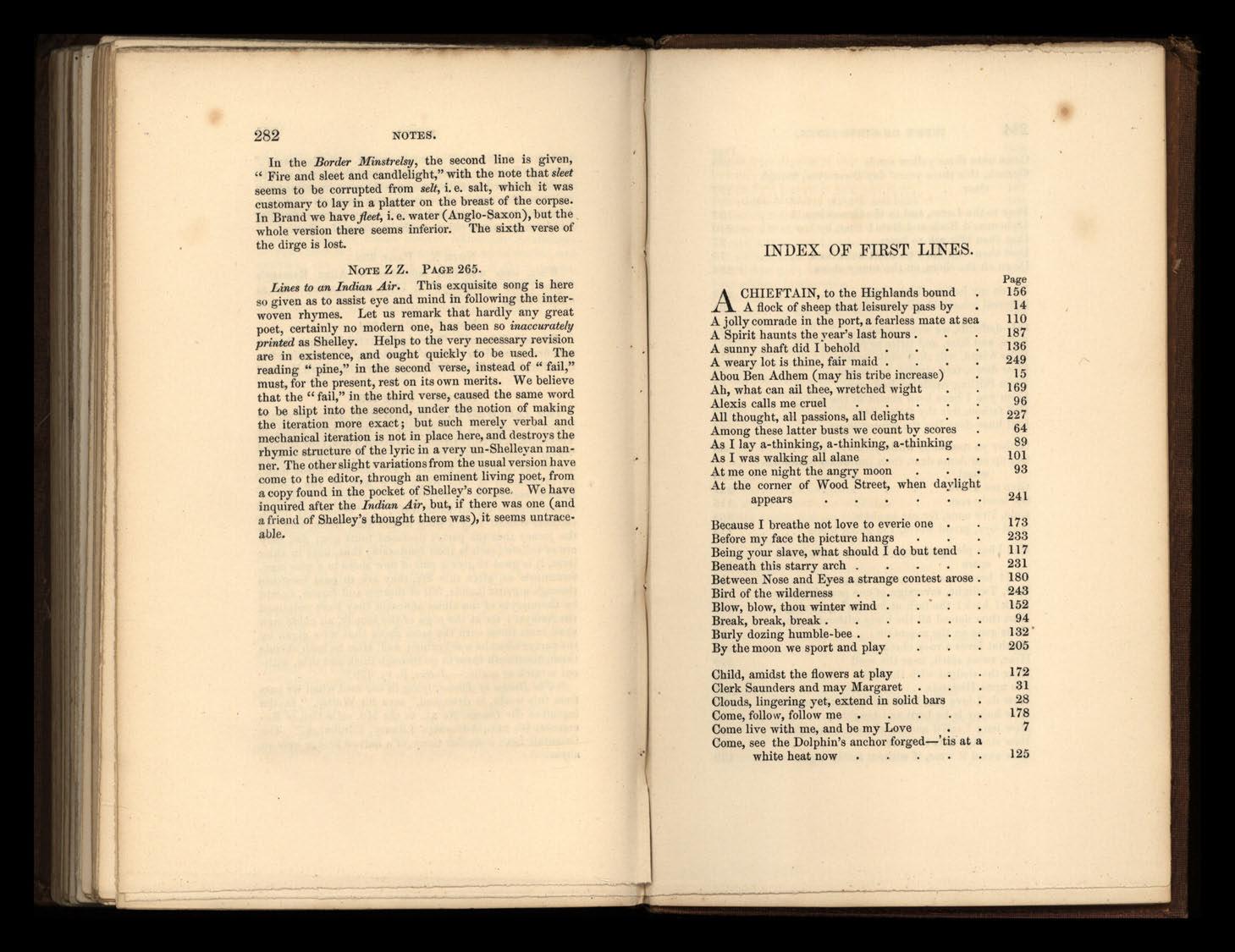
ACHIEFTAIN, to the Highlands bound
A flock of sheep tbat leisurely pass by •
A jolly comrade in the port, a fearless mate at sea
A Spirit baunts the year's last hours.
A sunny shaft did I behold
A weary lot is thine, fair maid. .
Abou Ben Adhem (may his tribe increase)
Ah, what can ail thee, wretched wight
Alexis caUs me cruel
All thought, all passions, aU delights
Among these latter busts we count by scores
As I lay a-thinking, a-thinking, a-thinking
As I was walking all alane
At me one night the angry moon
At the corner of Wood Street, when daylight appears
Because I breathe not love to everie one
Before my face the picture hangs .
Being your slave, what should I do but tend
Beneath this starry arch.
Between Nose and Eyes a strange contest arose.
Bird of the wilderness
Blow, blow, thou winter wind
Break, break, break.
Burly dozing humble-bee.
the moon we sport and play
Come live with me, and be my Love • . 7
Come, see the Dolphin's anchor forged-'tis at

2 6 Th'DEX OF FmST LTh"ES.
No, no I go not to Lethe, neither twist
Now fades the last long streak of snow
ow hands to seed'sheet, boys.
Now thut T, tying thy glass mask tightly.
ow the bright Morning-Star, day's harbinger.
Now the hungry lion roars
Nuns fret not at their convent's narrow room
o blithe new-comer I I have heard
o give me, from this heartIe scene released
o Maryanne, you pretty girl
o lIbry, go and call the cattle home
o nightingale, that on yon bloomy spray
o saw ye not fair Ines
o Tibbie, I hae seen the day
o unknown BeJov'd one I to the mellow season
o waly, waly, up the bank
0, where hae ye been, Lord Randal, my son
o whistle, and I'll come to you, my lad
0, young Lochinvar is come out of the west
Oh friend, whom glad or grave we seek
Oh, lovely Mary Donnelly, it's you I love the best
Once upon a midnight dreary, while I ponder'd, weak and weary
One more unfortunate
On Linden, when the sun was low
Orphan hours, the year is dead
Our bugles sang truce, for the night-cloud had lower'd.
Over hill, over dale.
Ov all the housen 0' the pliace.
Piping down the valleys wild
Poor Jenny were her Roberd's bride. and huntress, chaste and fair
Rest I this little fountain •
Season of mists and mellow frnitfulness
Seven daughters had Lord Archibald
Shall I wasting, in despair
She dwelt among the ulltrodden
Shepherds all, and maidens fair
She's up and gone, the gracele s girl
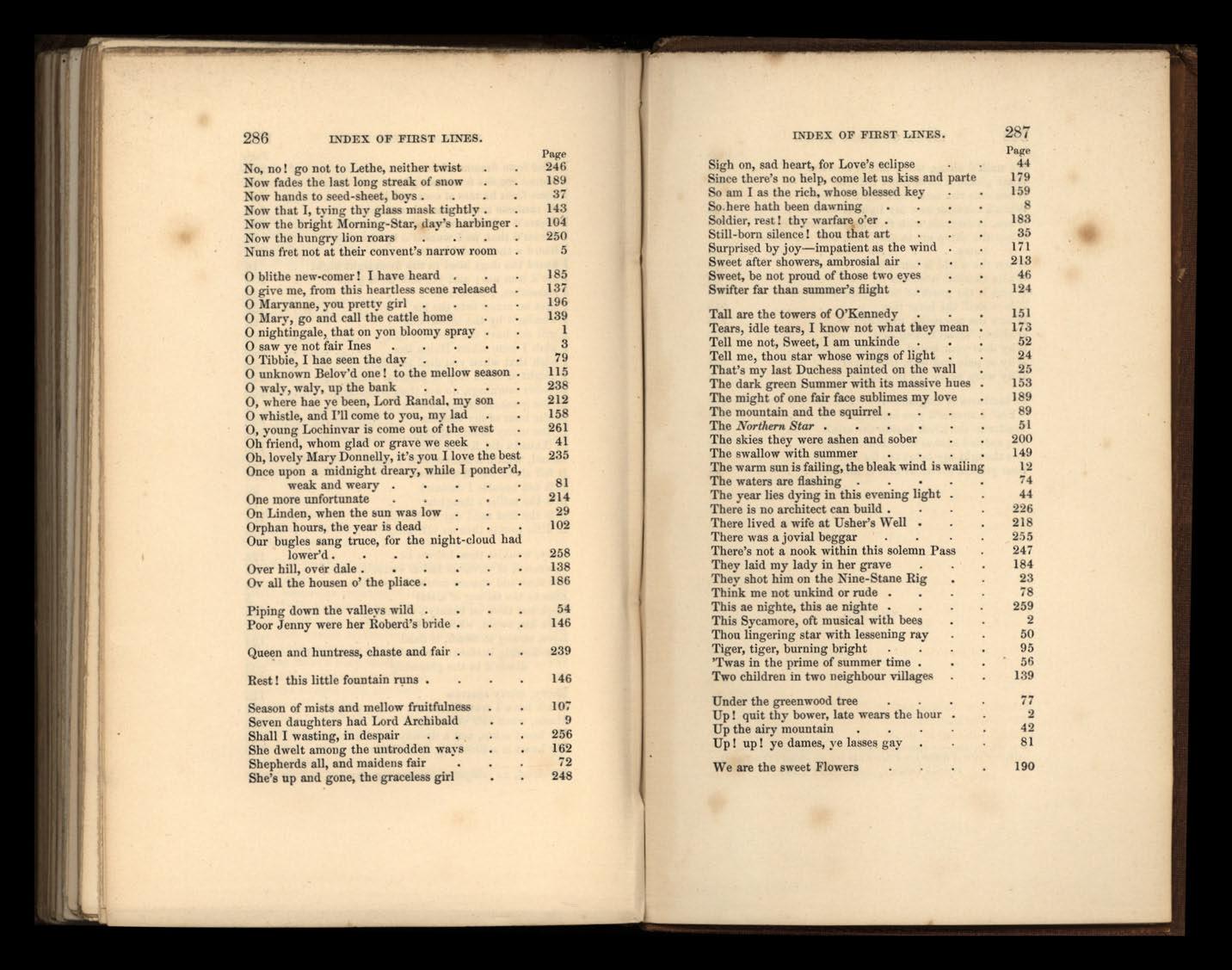
Th'DEX OF FmST LINES.
Sigh on, sad heart, for Love's eclipse
Since there's no help, come let us kiss and parte
So am I as the rich, whose hlessed key
So . here hath been dawning
Soldier, rest I thv warfare o'er
Still-born silence! thou that art
Surprised by joy-impatient us the wind
Sweet after showers, ambrosial air
Sweet, be not proud of tho e two eyes
Swifter far than summer's flight
Tall are the towers of O'Kennedy
Tears, idle tears, I know not what tlaey mean
Tell me not, Sweet, 1 am unkinde
Tell me, thou star whose wings of light
That's my last Ducbess painted on the wall
The dark green Summer with its massive hues
The might of one fair face sublimes my love
The mouutain and the sqnirrel .
The Northern Star
The skies they were ashen and sober
The swallow with summer
The warm sun is failing, the bleak wind is wailing
The waters are Hashing. •
The year lies dying in this evening Iigbt
There is no architect can build.
There lived a wife at Usher's Well
There was a jovial beggar
There's not a nook within this solemn Pass
They laid my lady in her grave
They shot him on the 'ine- tane Rig
Think me not unkind or rude
This ae nighte, this ae nigbte
This Sycamore, oft musical with bees
Thou lingering star with lessening ray
Tiger, tiger, burning bright
'Twas in the prime of summer time •
Two children in two neighbour villages
Under the greenwood tree
Up! quit thy bower, late wears the hour
Up the airy mountain
Up I up I ye dames, ye lasses gay
We are the sweet Flowers
288 INDEX OF FmST LINES. Page
We walk'd along, while bright and red 154
What pleasure have great Princes 251
When cats run home and light is come 55
When I consider how my light is spent 104
When, in disgrace with fortune and men's eyes . 150
'Vhen the sheep are in the fauld, and the kye at hame . 134
When the world is burning 263
Where Claribel low-lieth 36
Where is the grave of Sir Arthur o'Kellyn 220
Where shall the lover rest 148
Where the bee sucks, there suck I 198
Whither, 'midst falling dew 195
Why does your brand sae drap wi' blude 244
Why so pale and wan, fond lover 38
Why weep ye by the tide ladye 6
Ye mariners of England . 176
" Yes" I answer'd you last night 123
Yonder to the kiosk beside the creek 114
You spotted snakes with double tongue 232
You thought my heart too far diseased 122
Your picture smiles as first it smiled. 13

I'Rl<:SS :-I'IUNTED UY C. WElITTHWH.UI, TUOKS COURT, CUANCEI>Y LANE.
